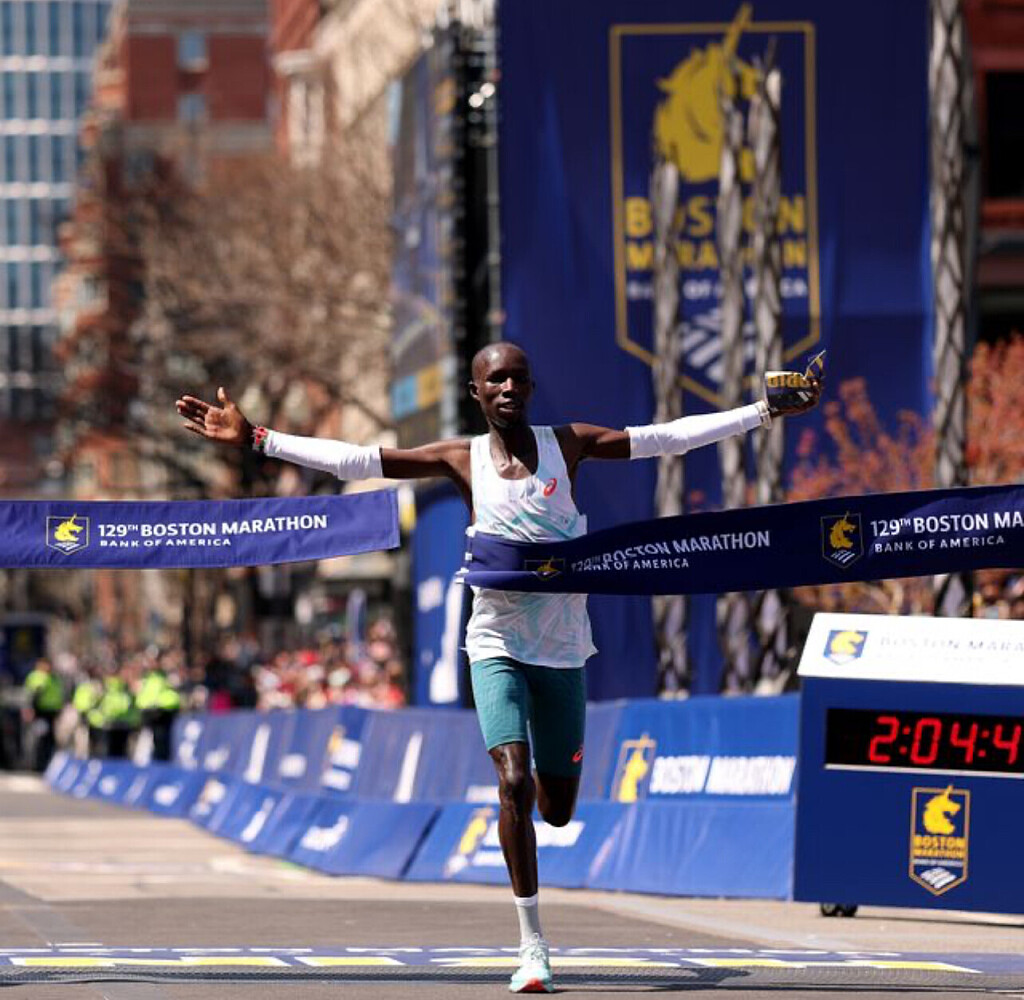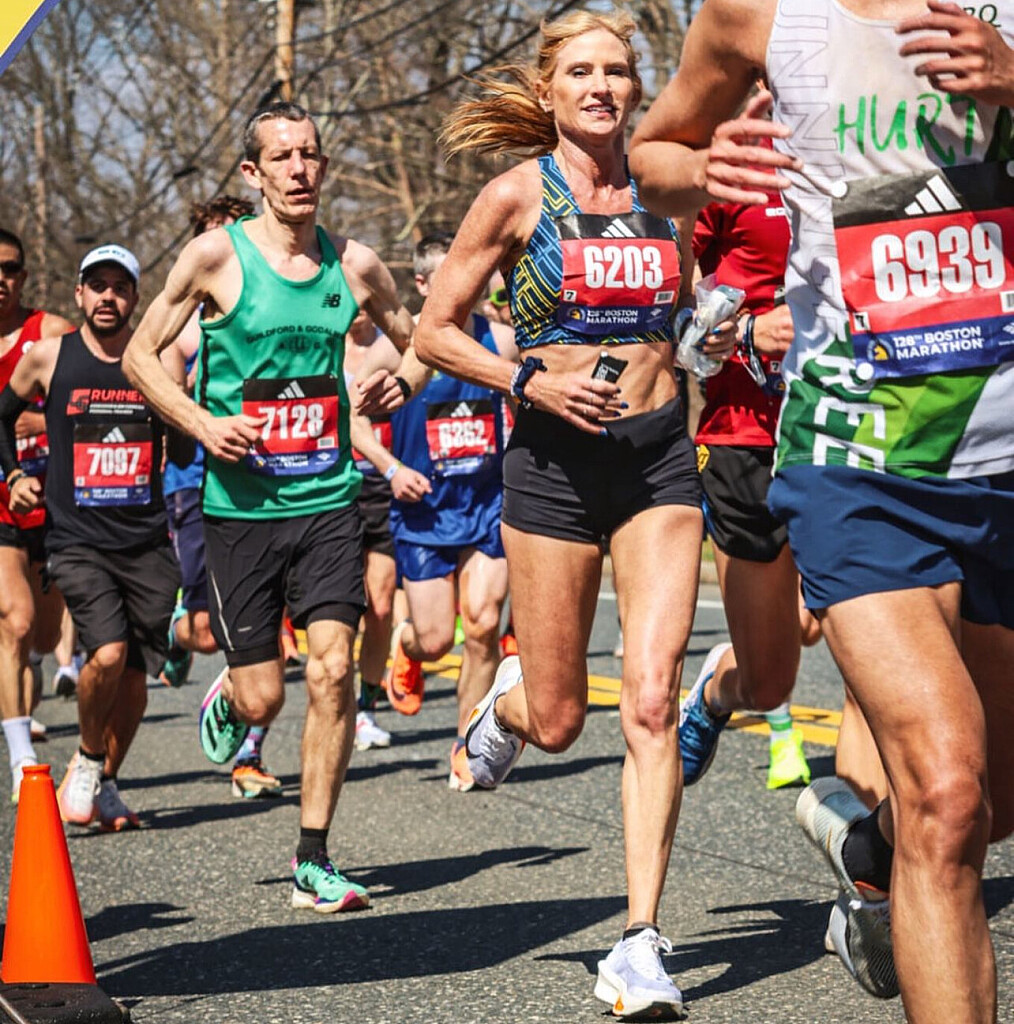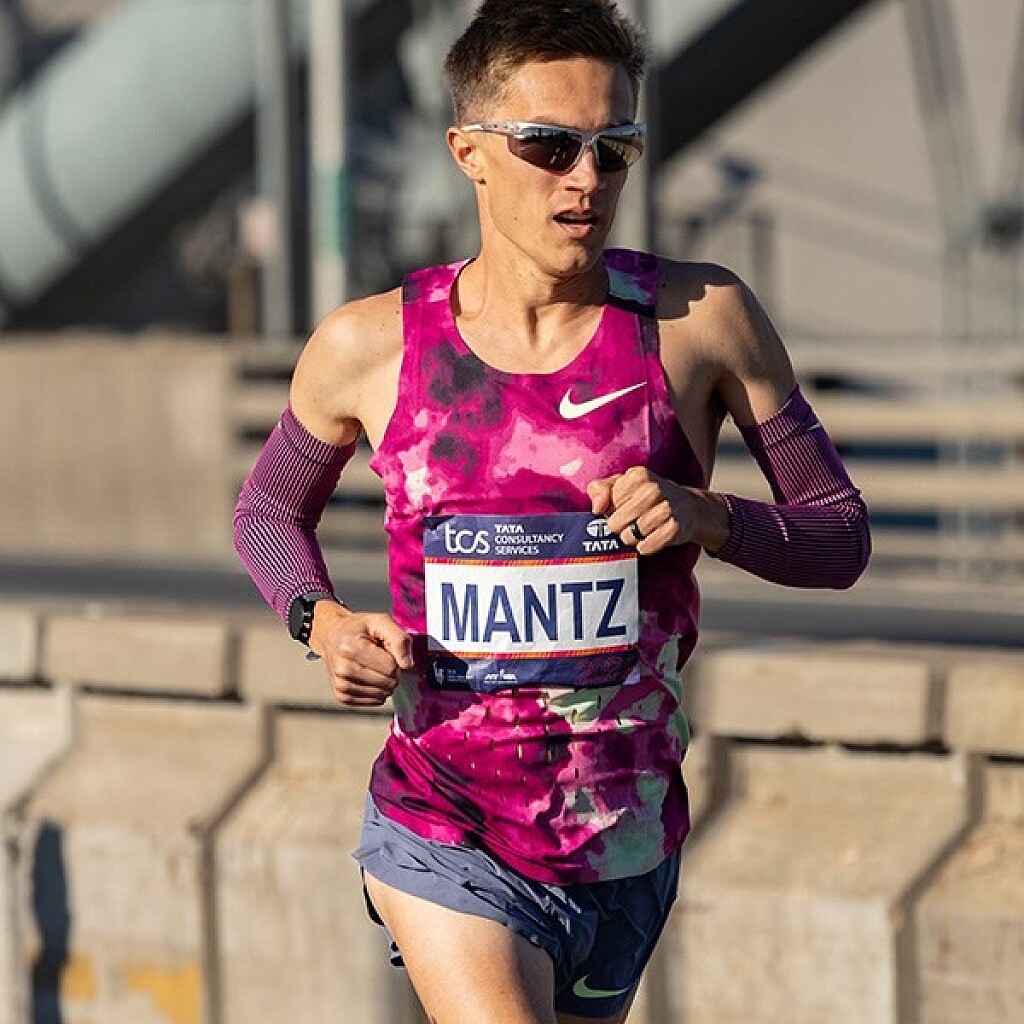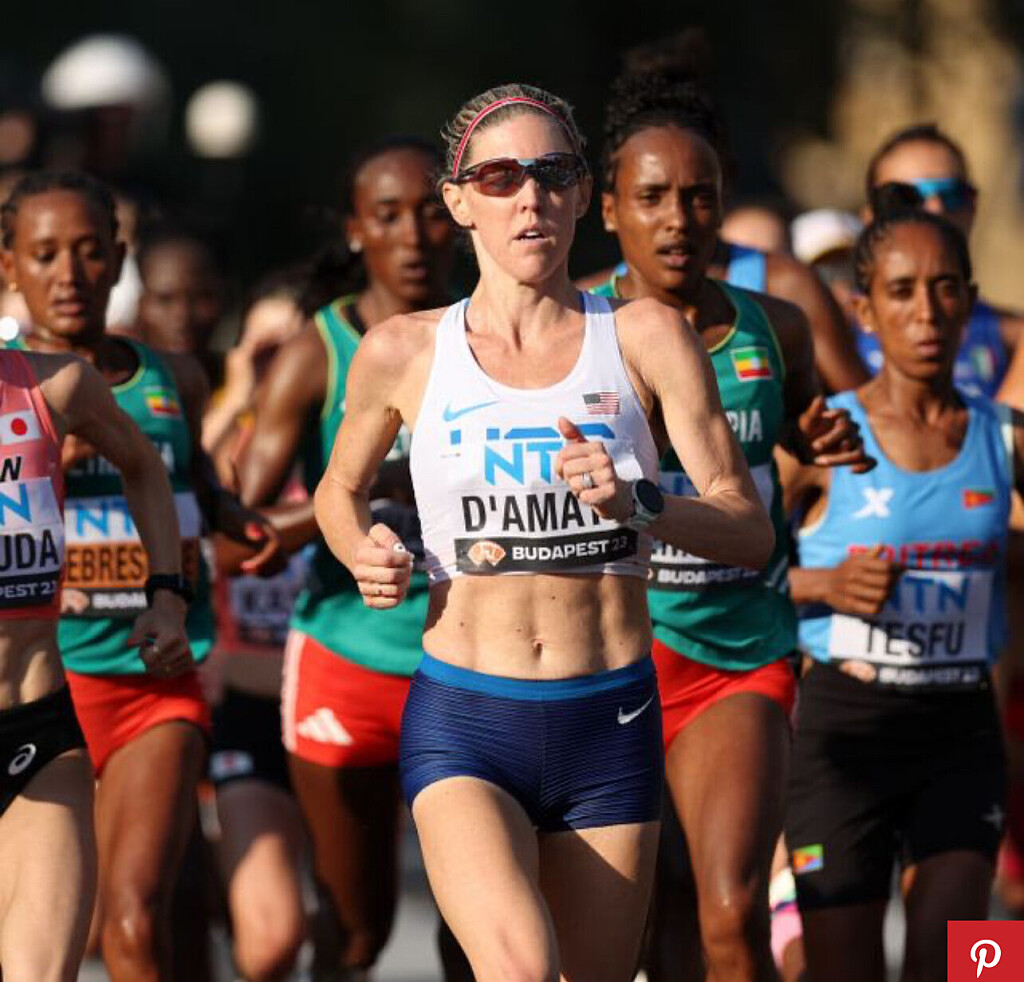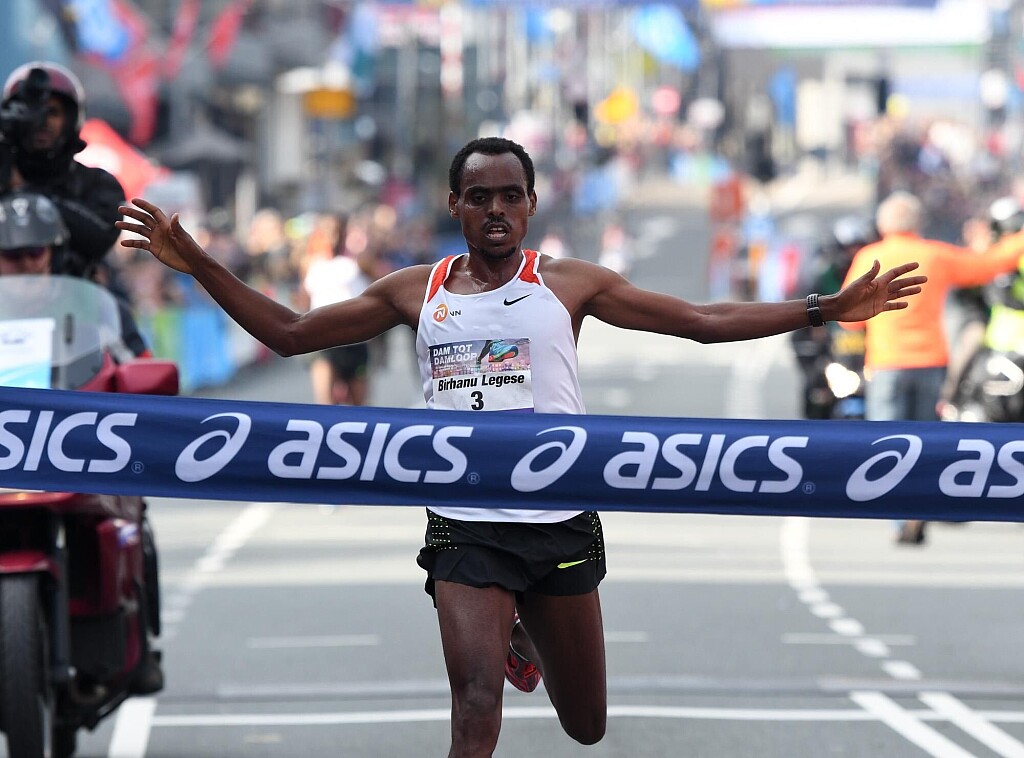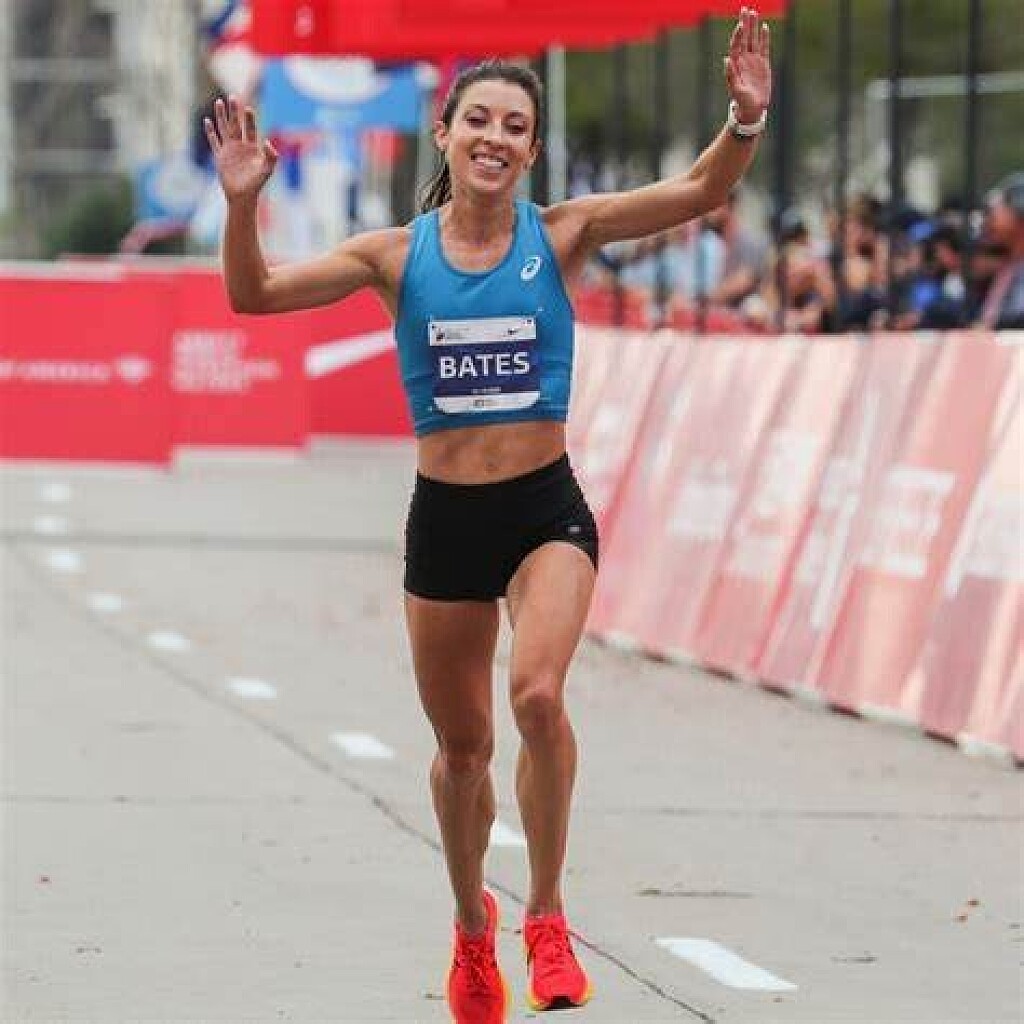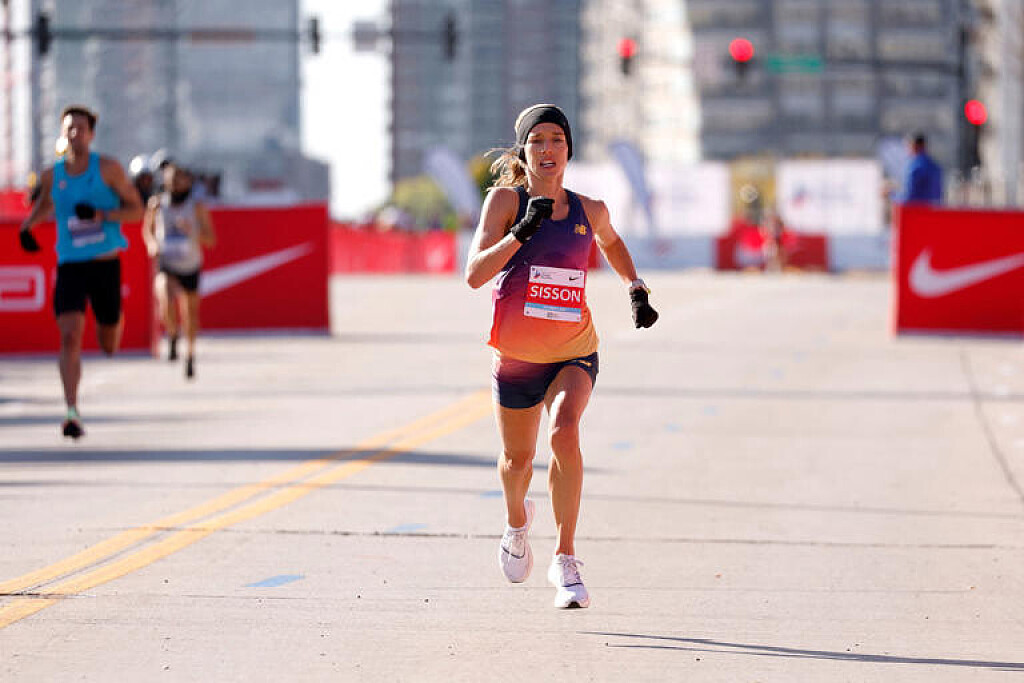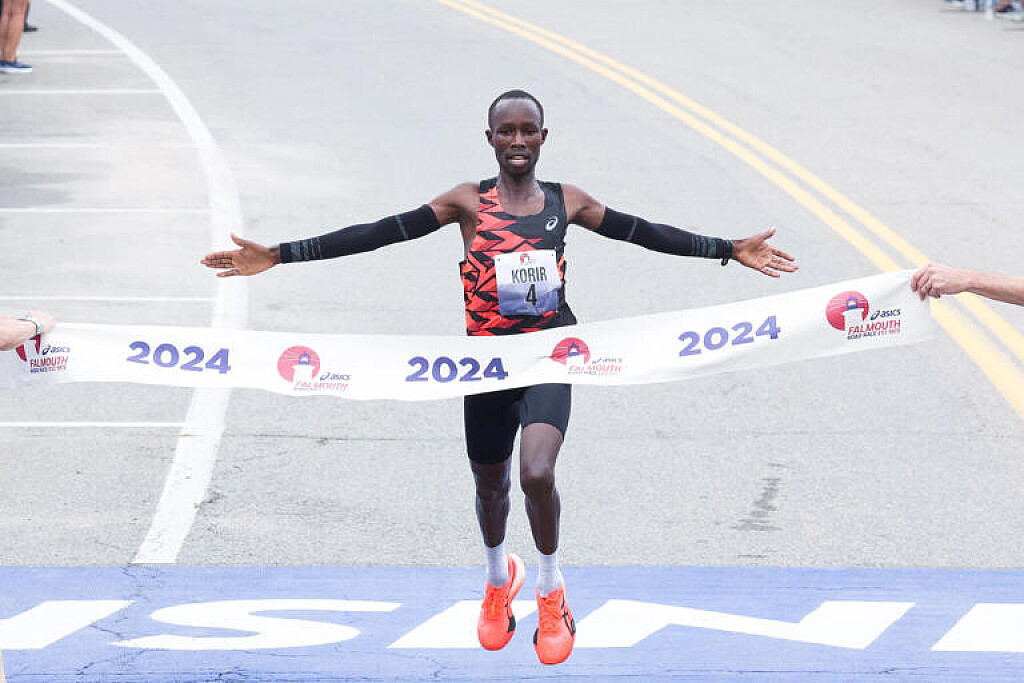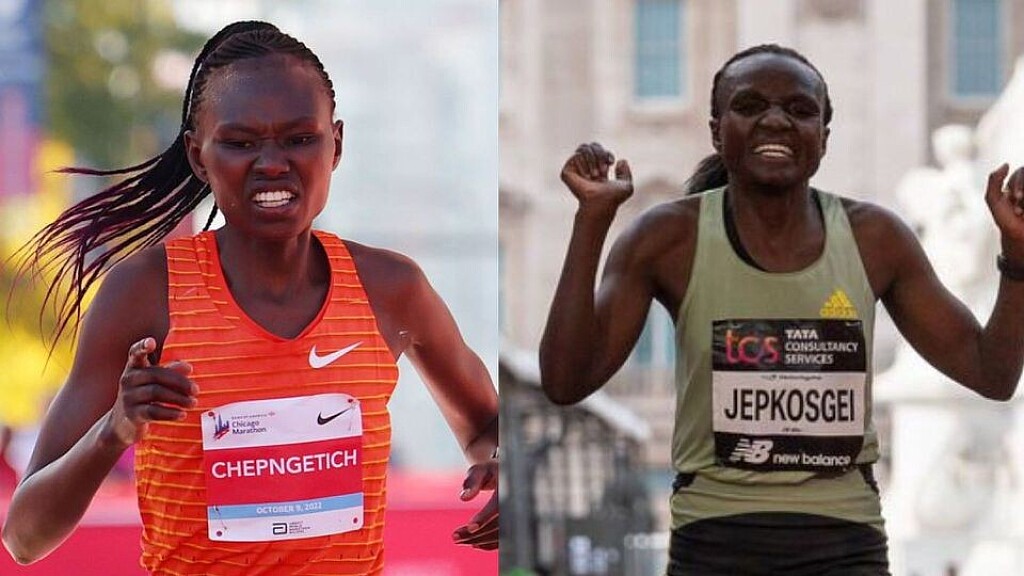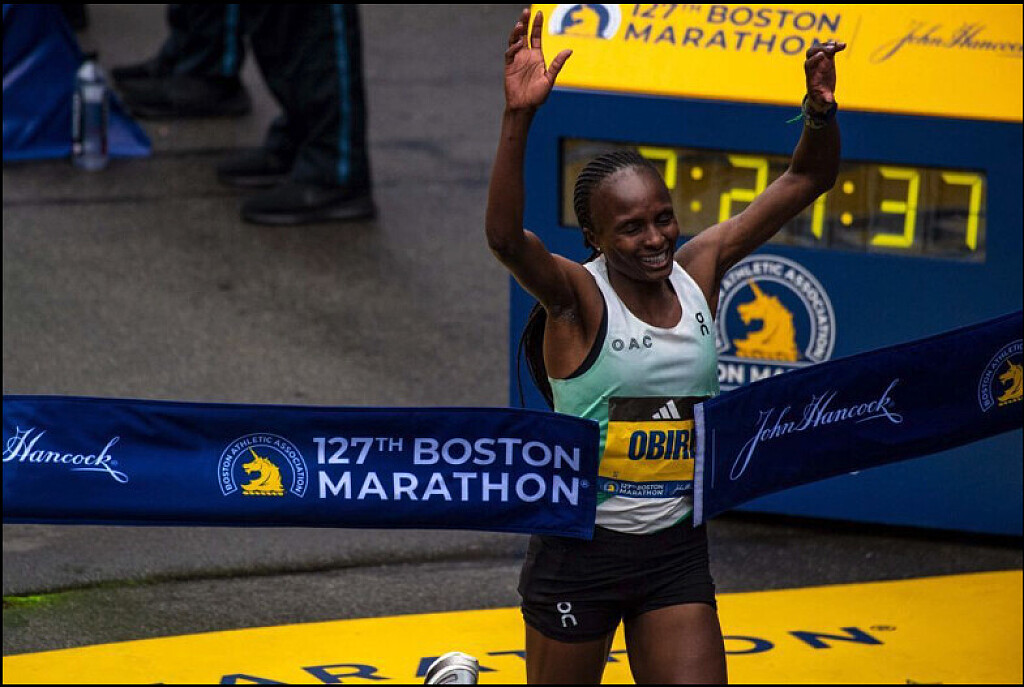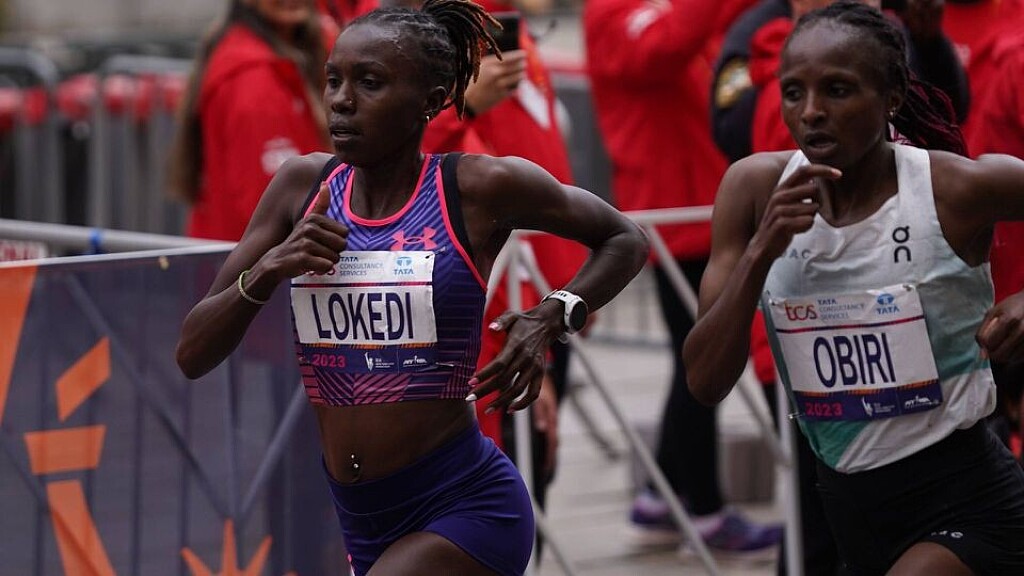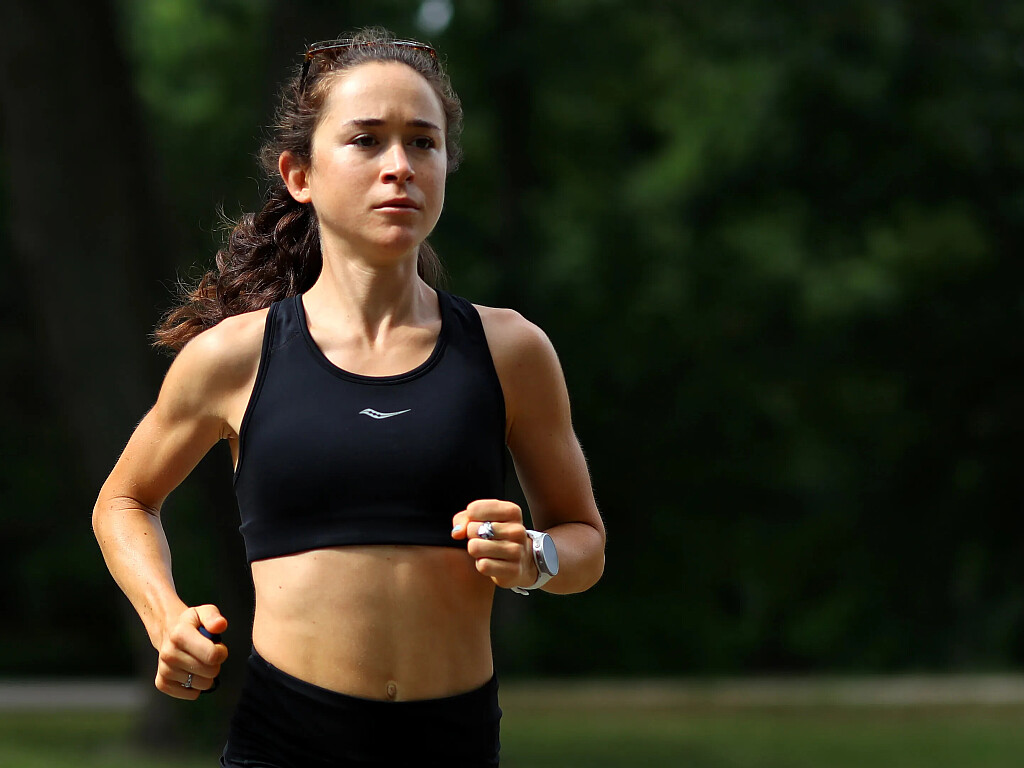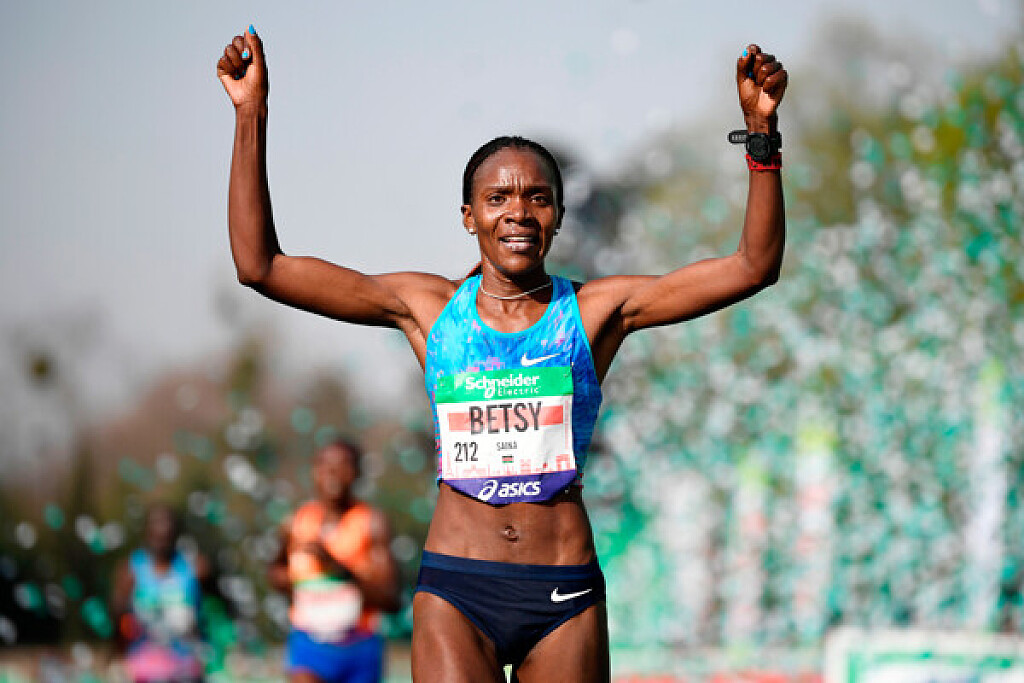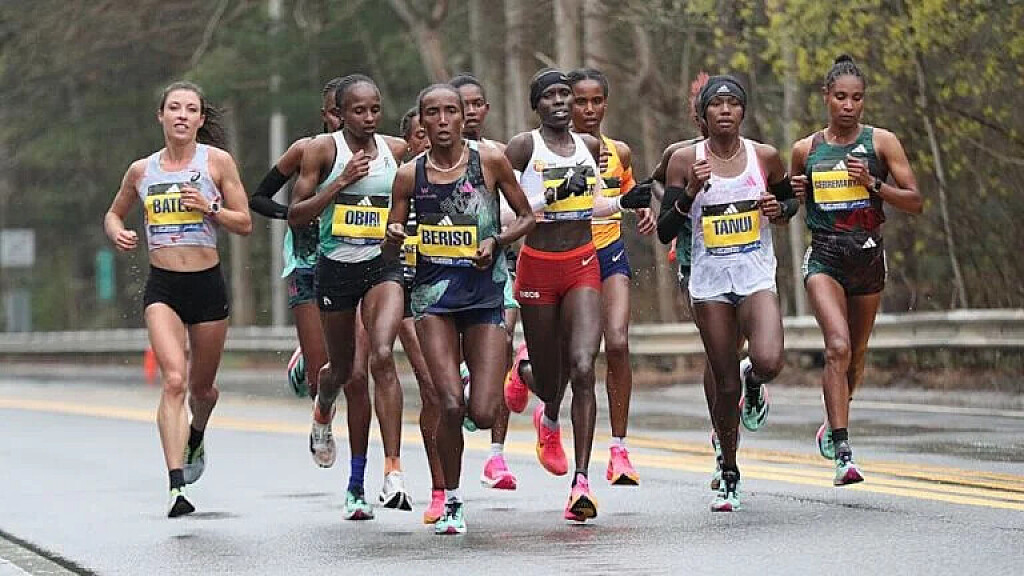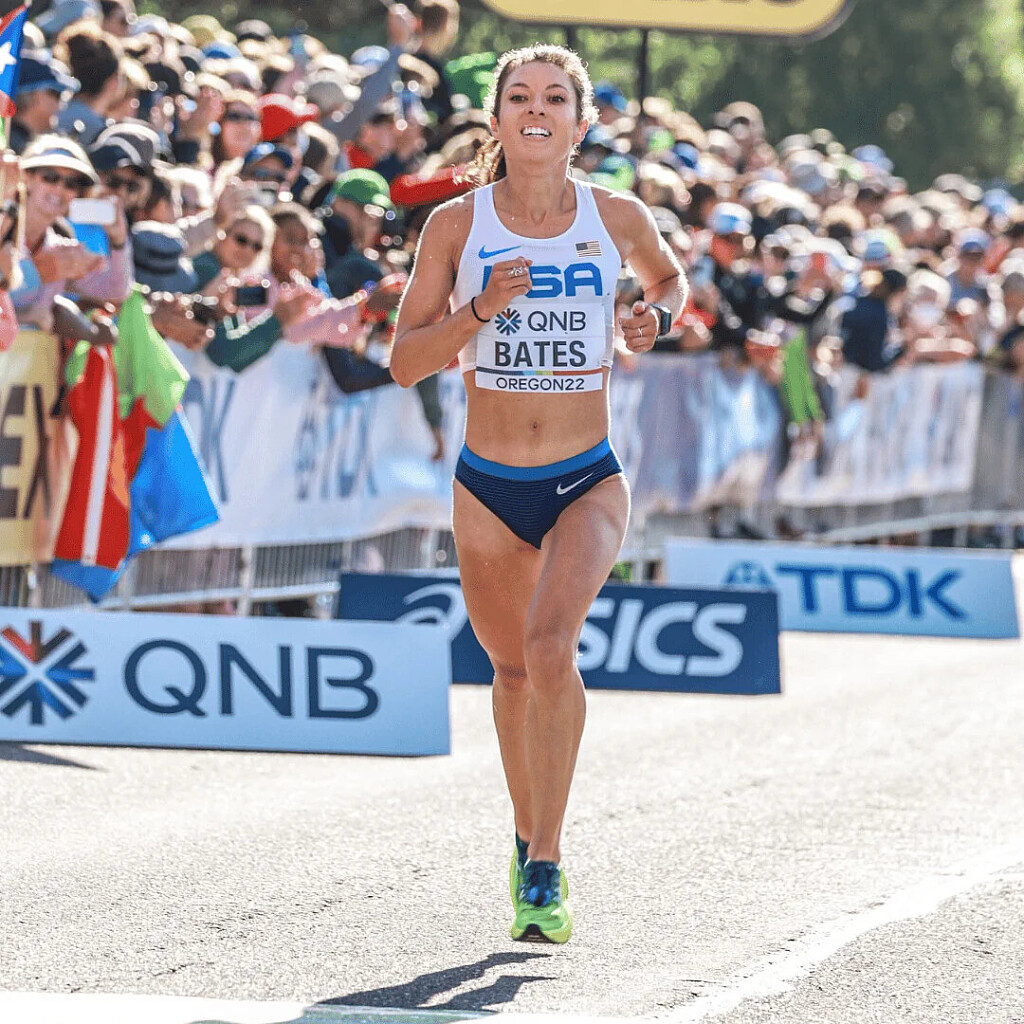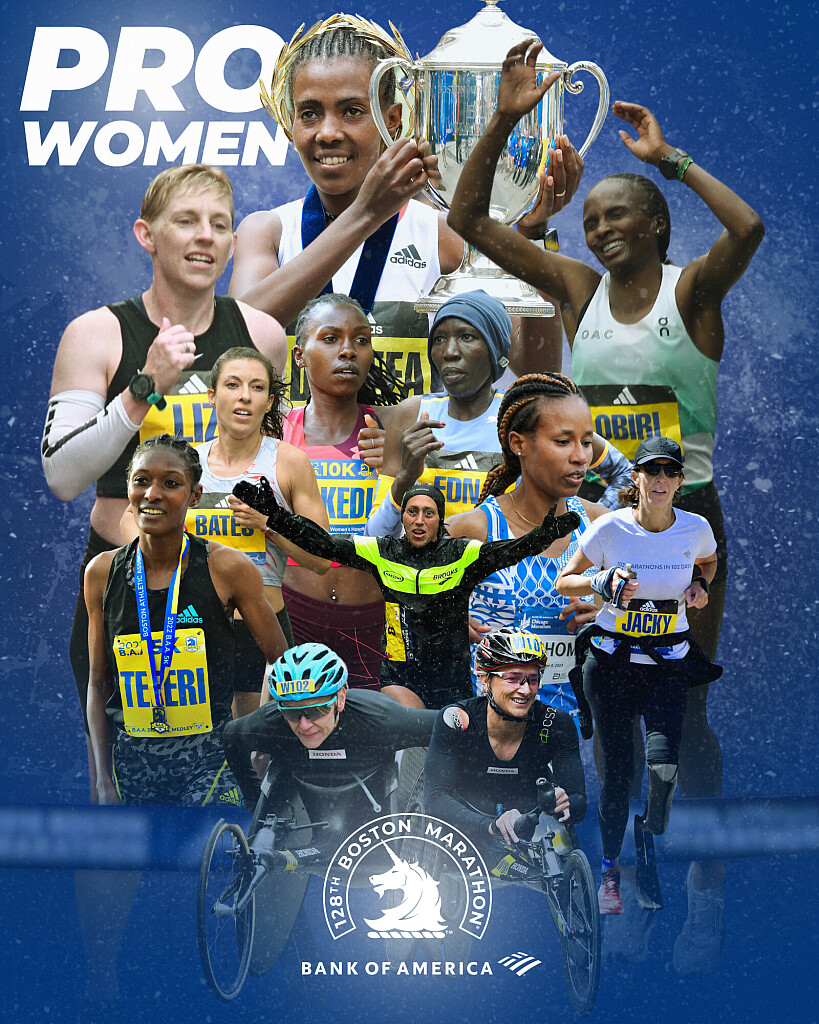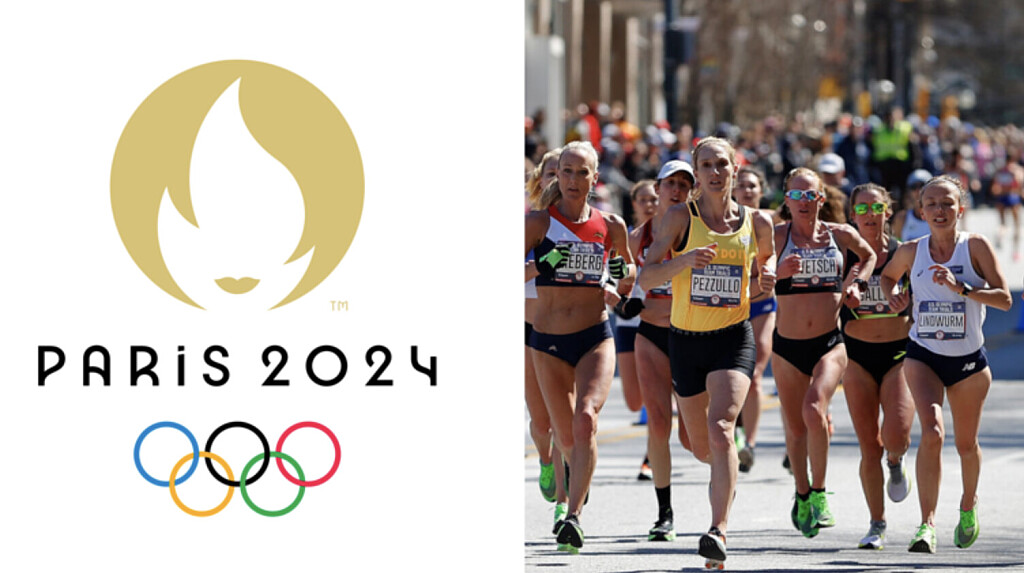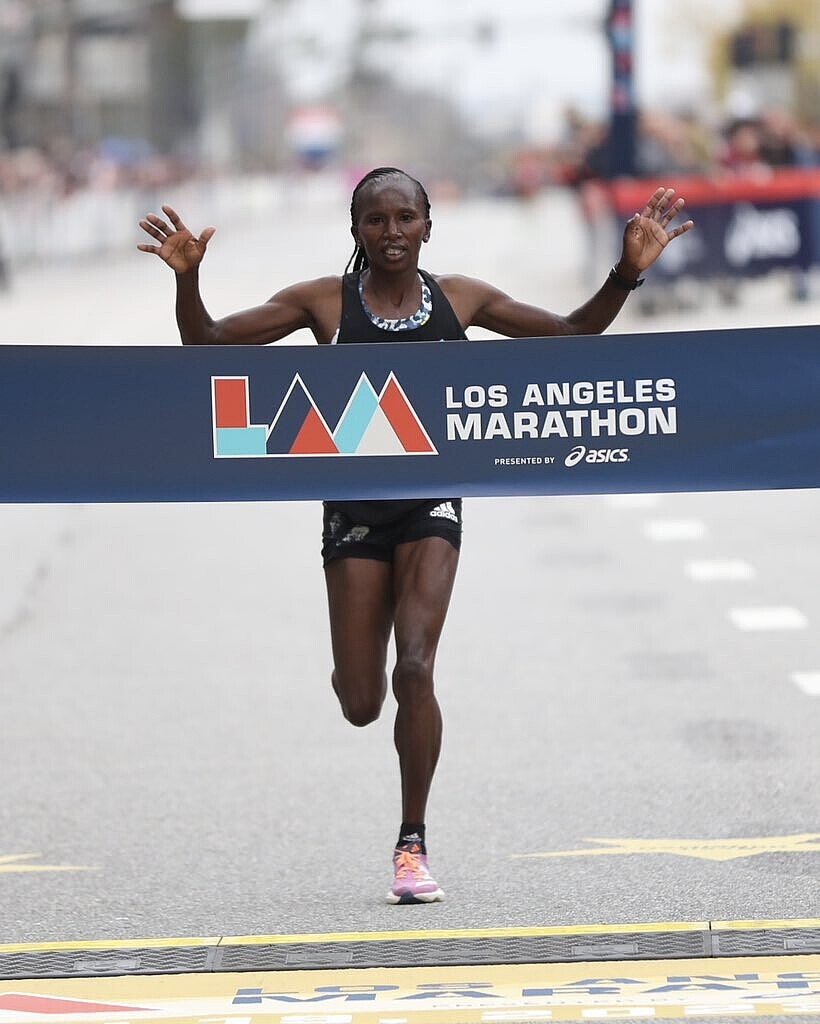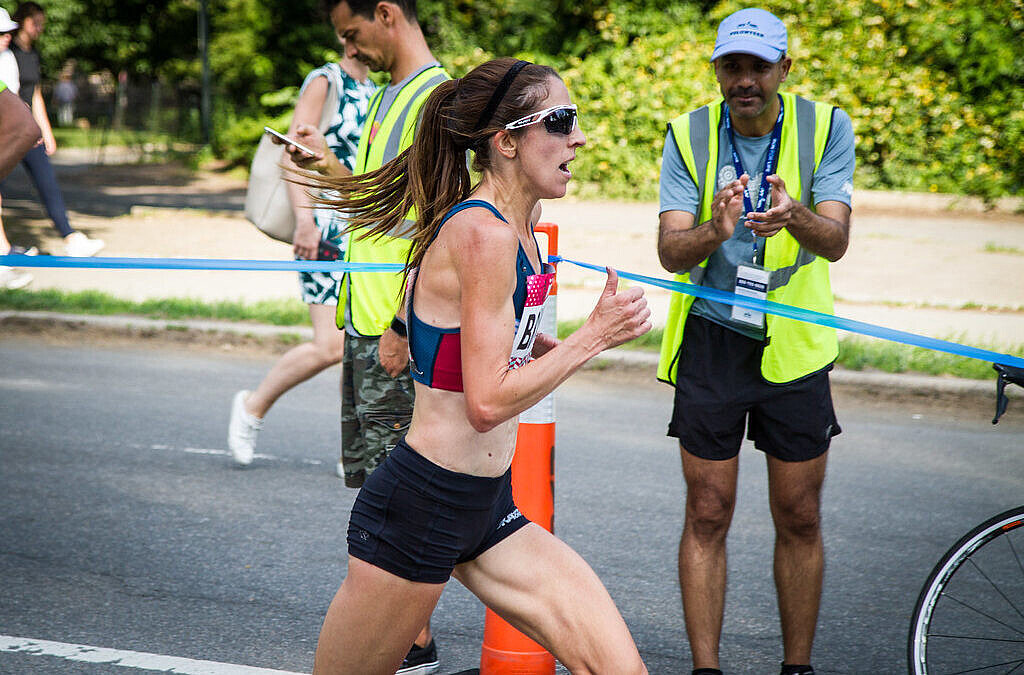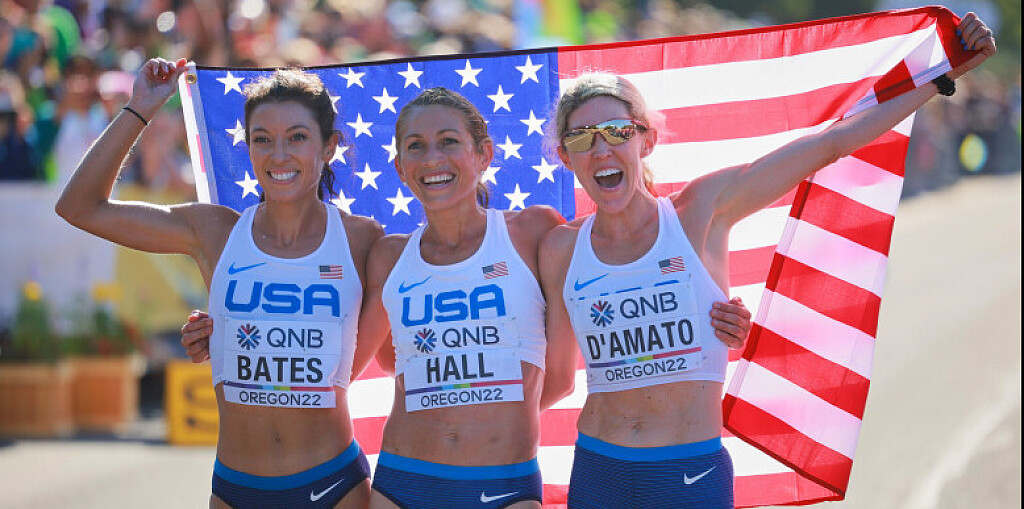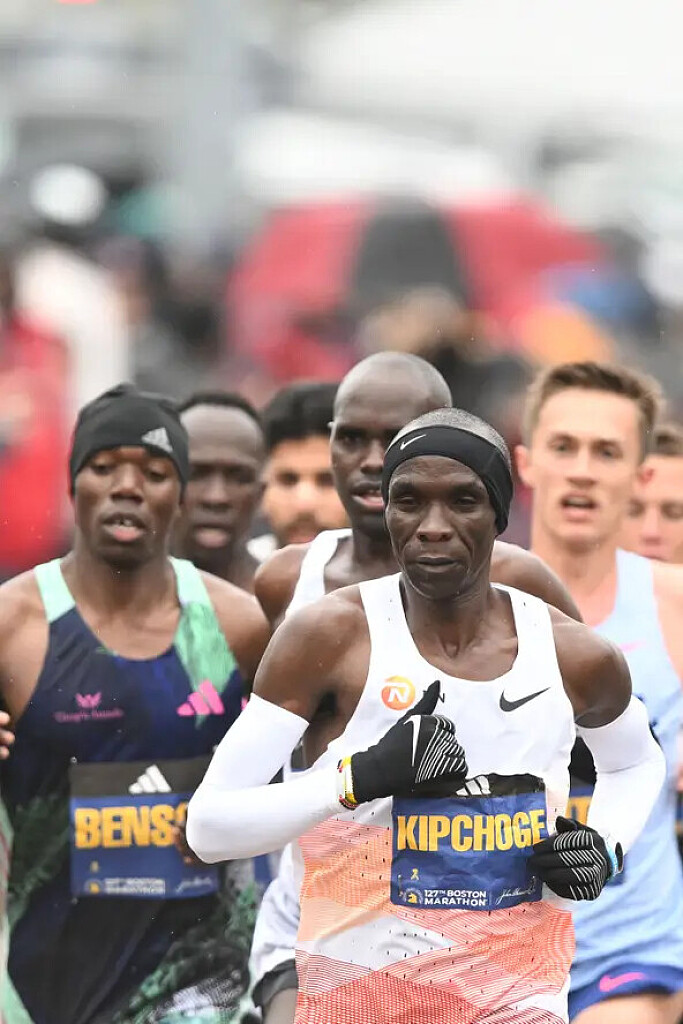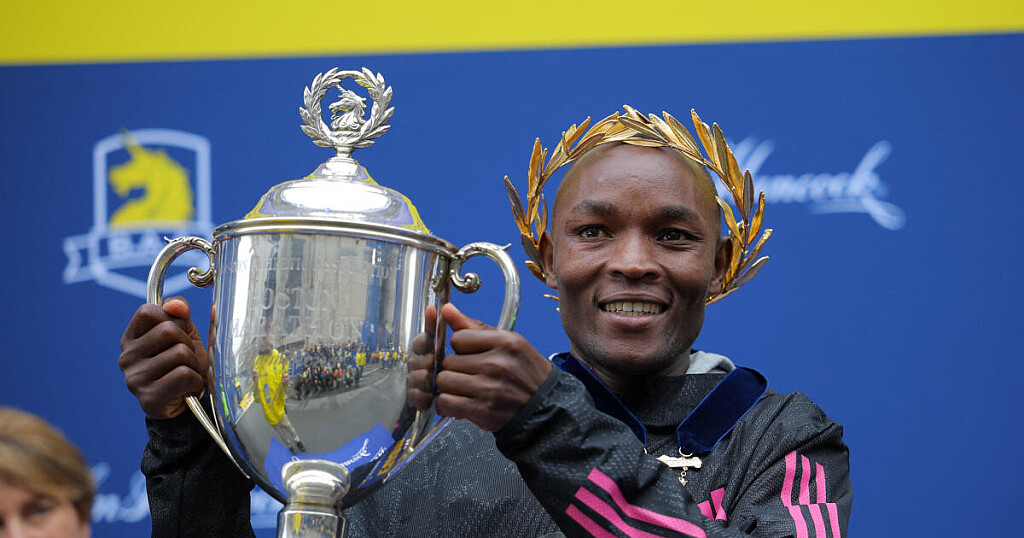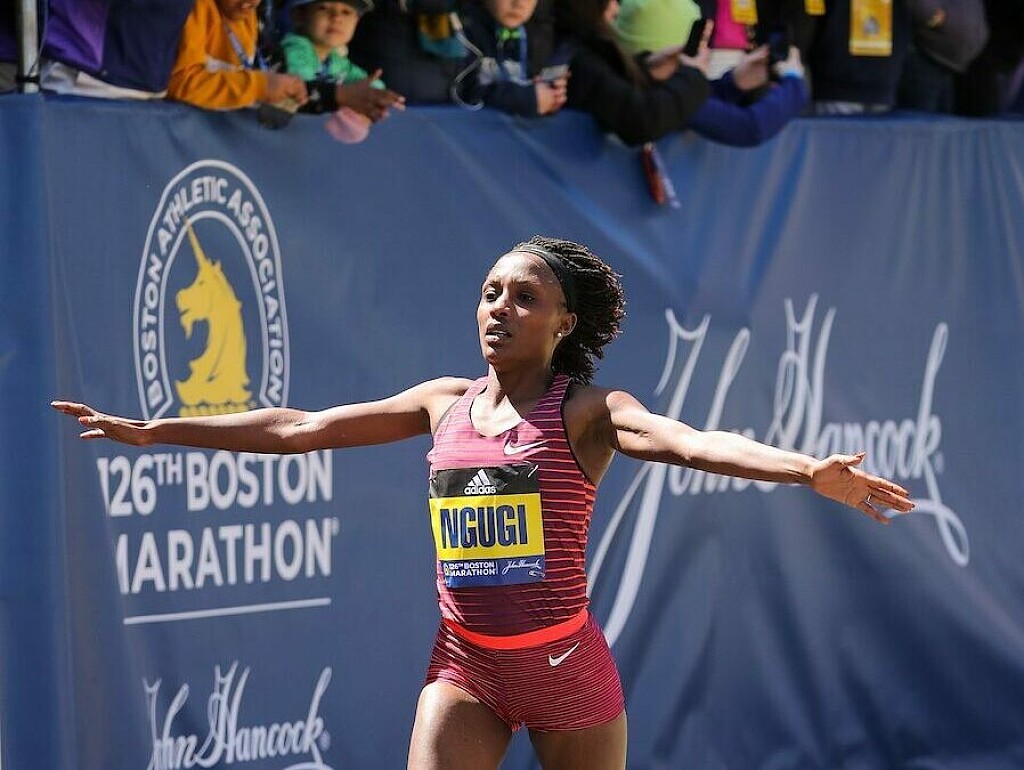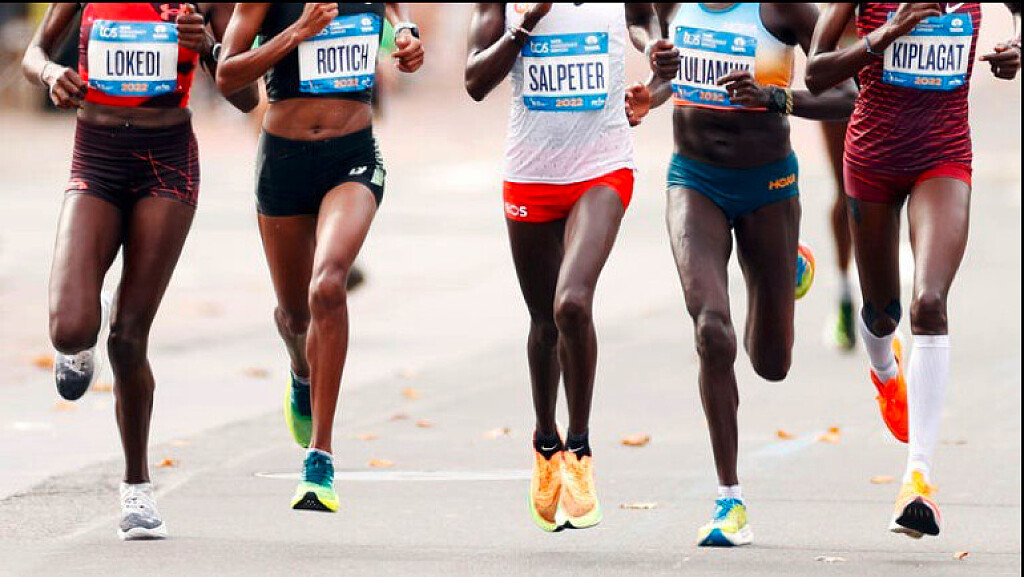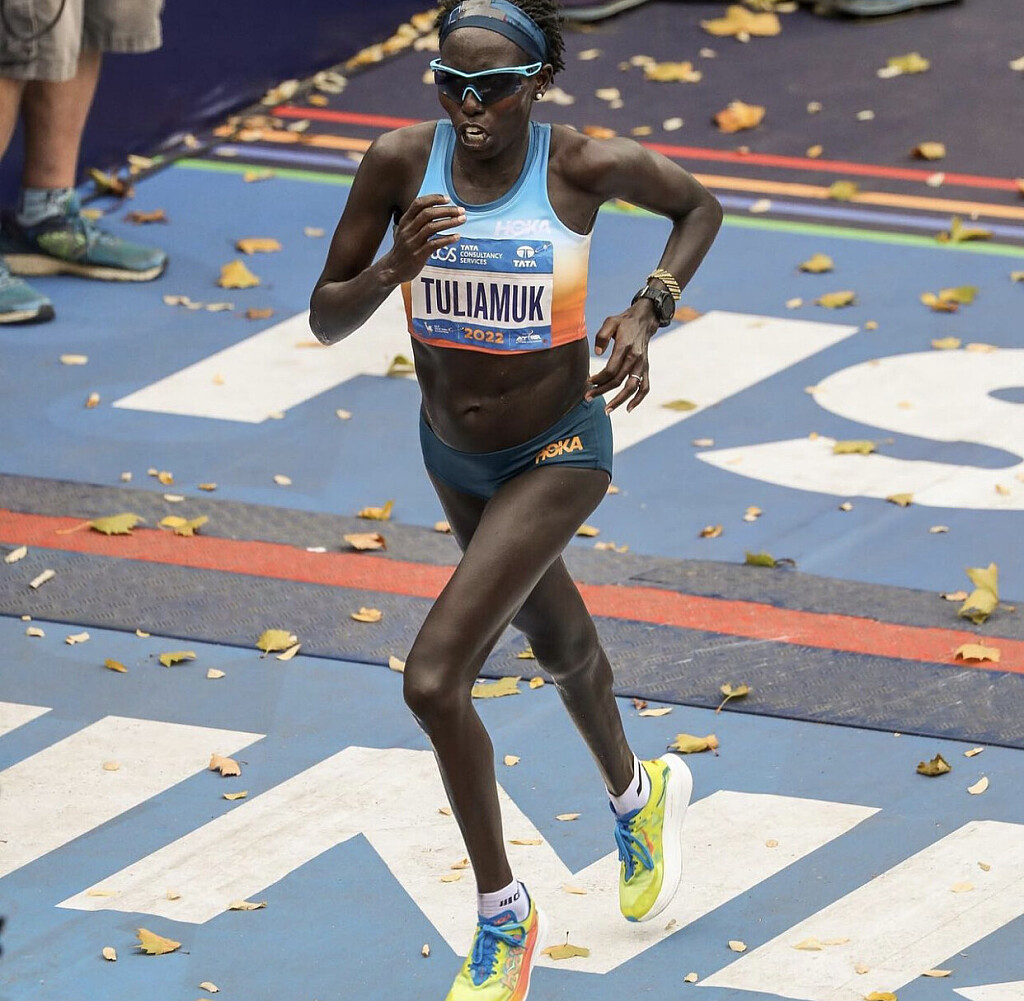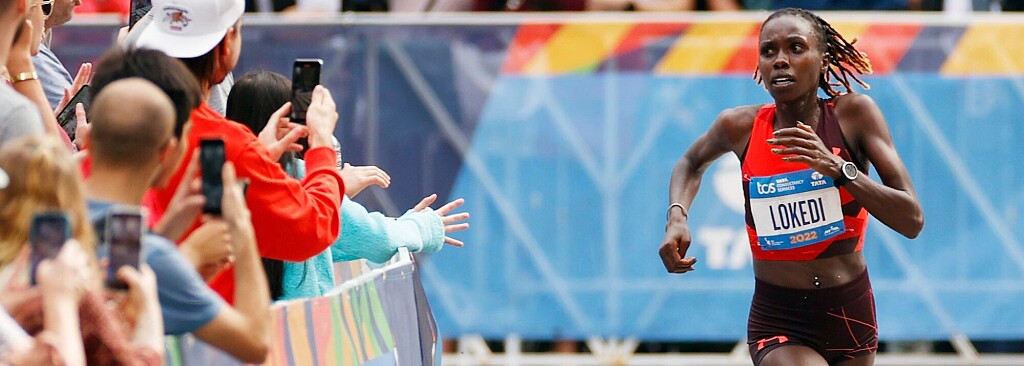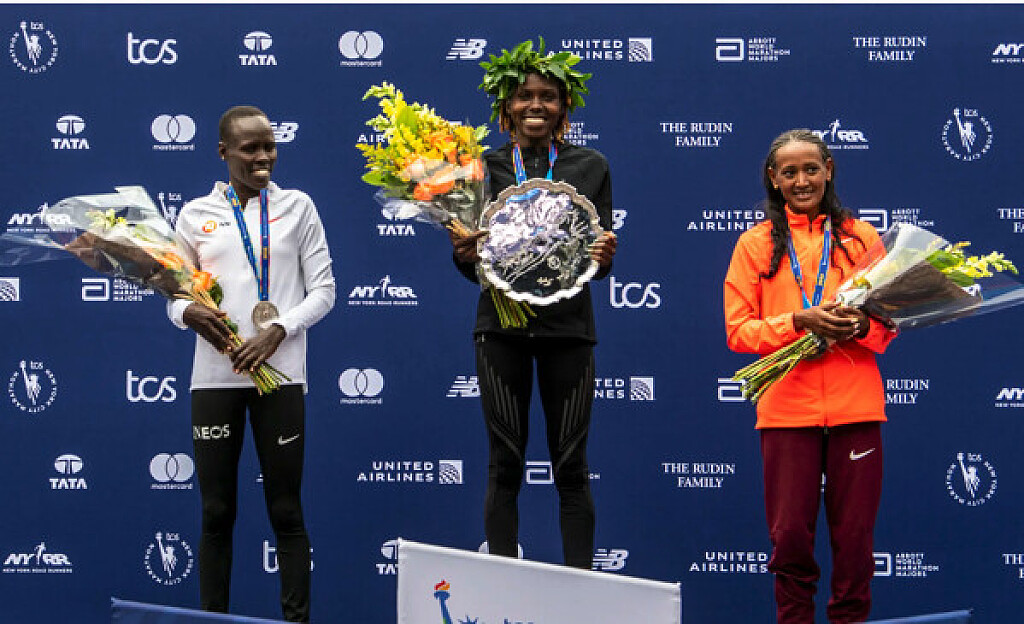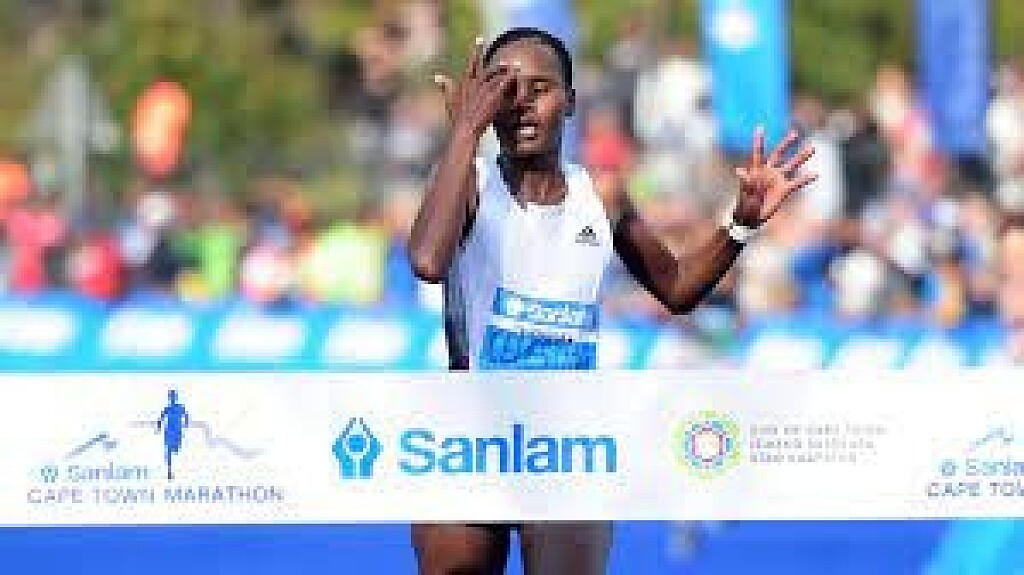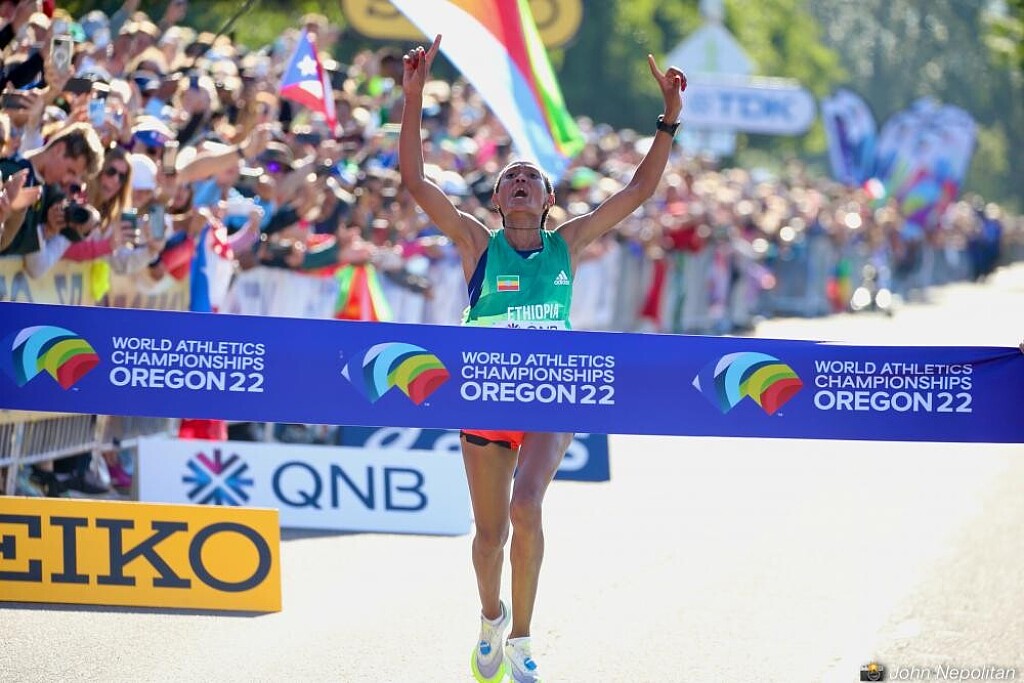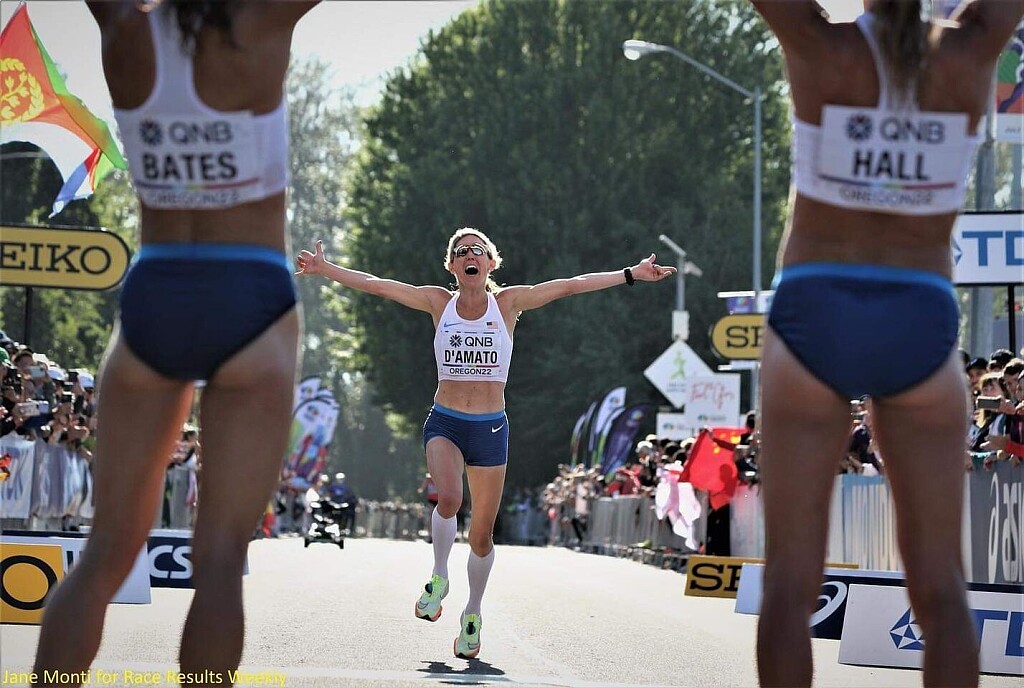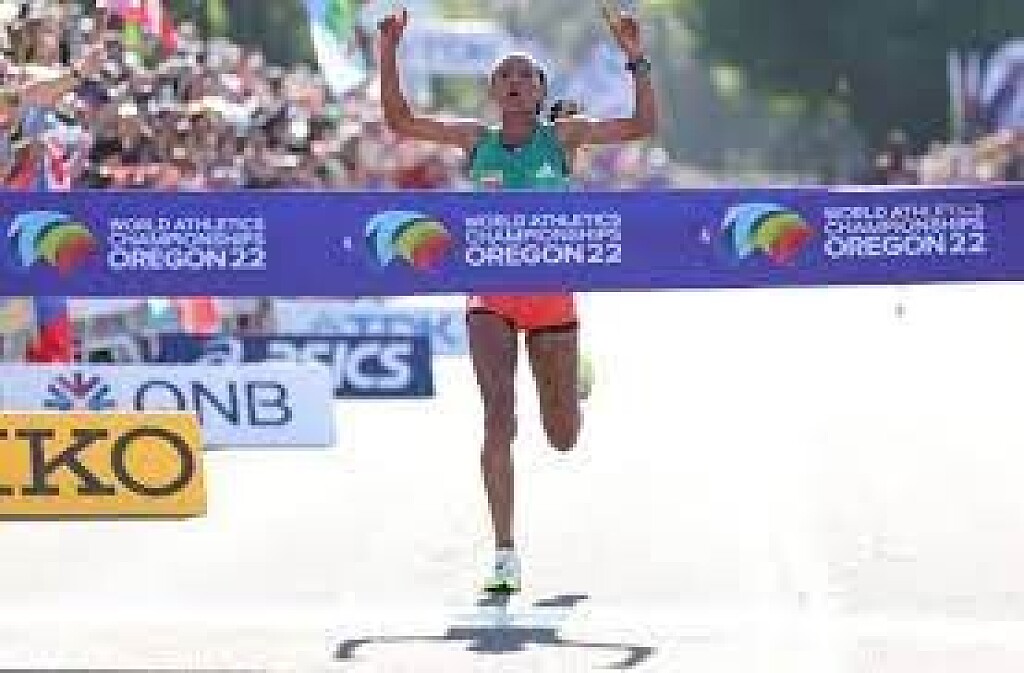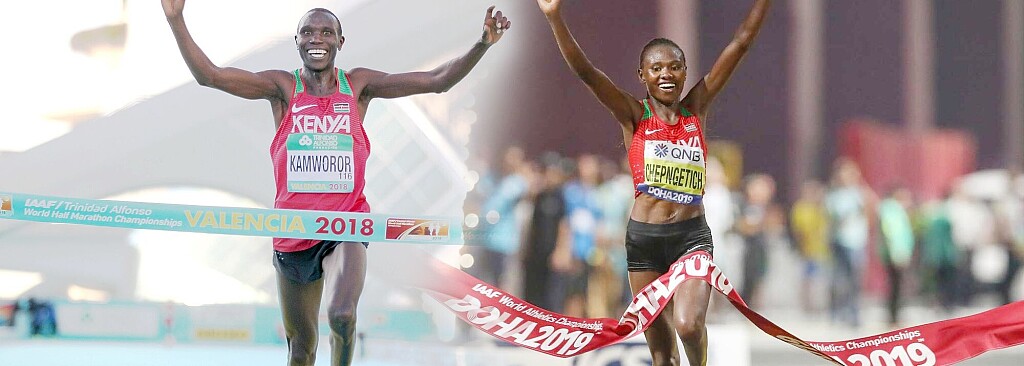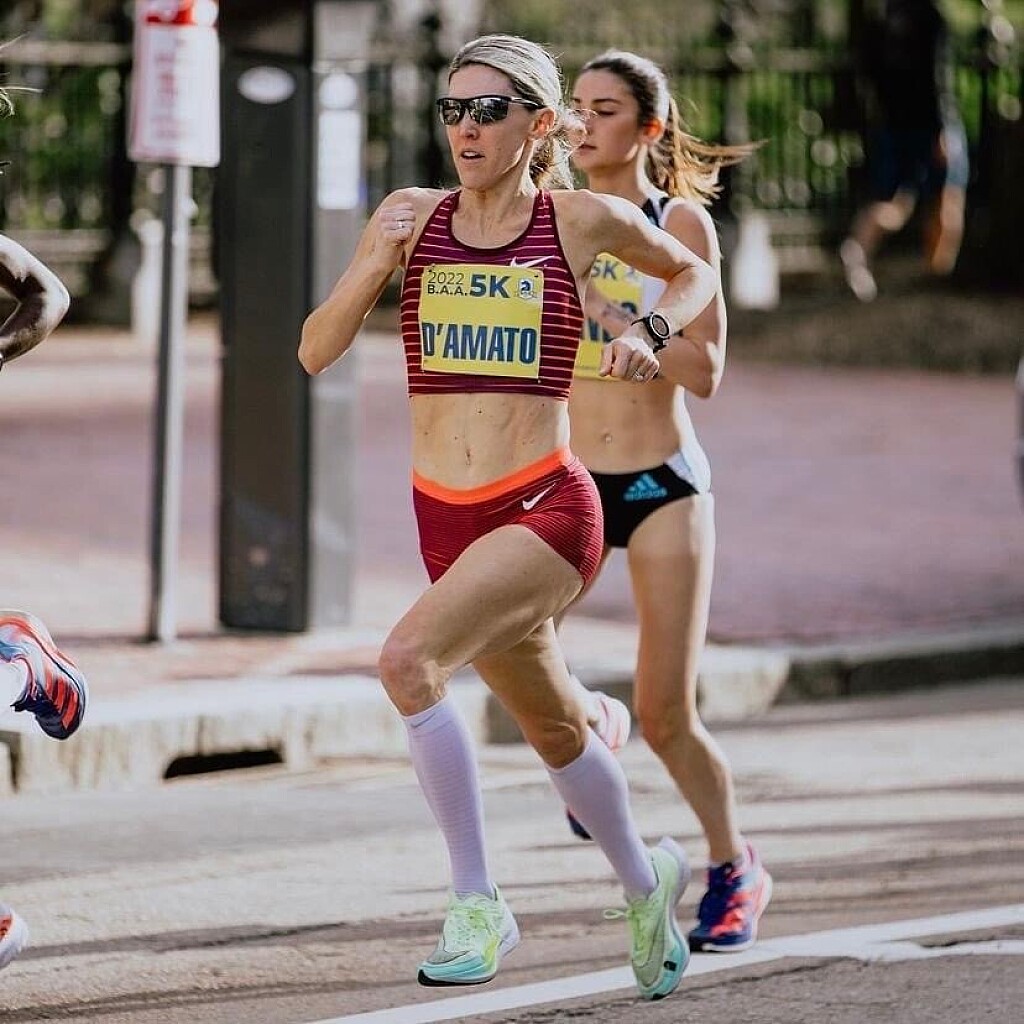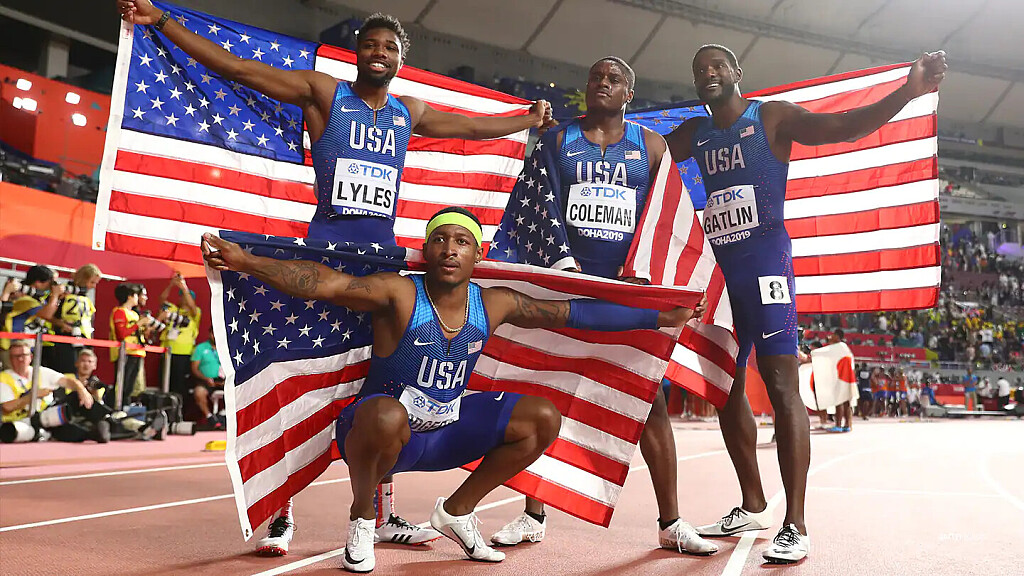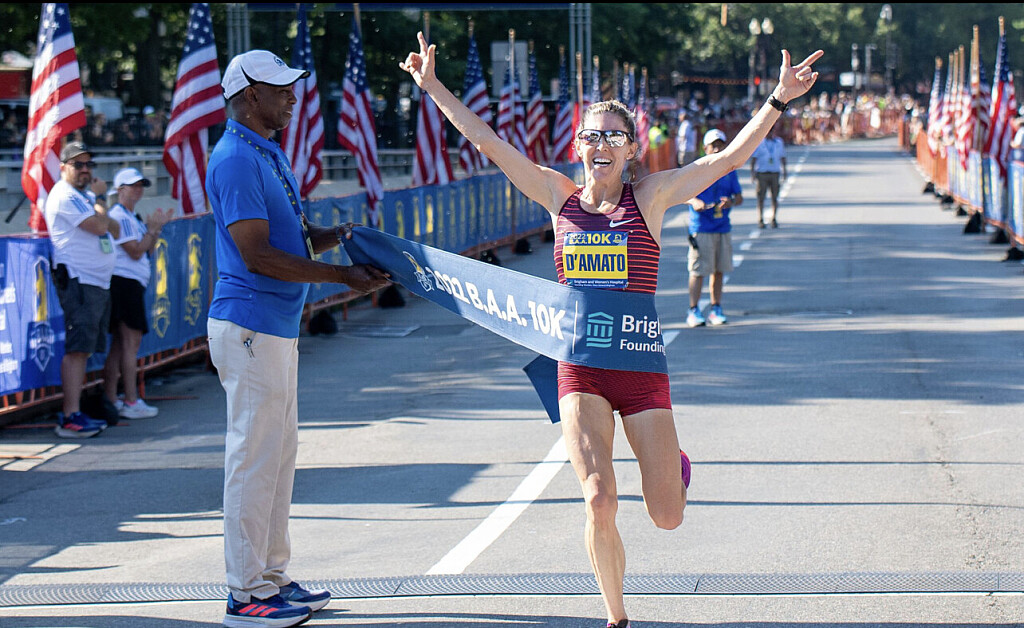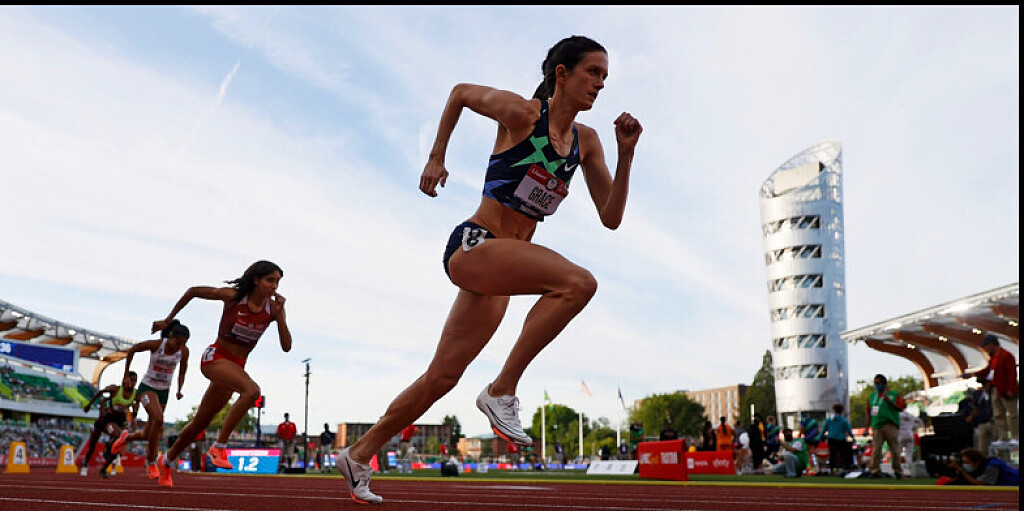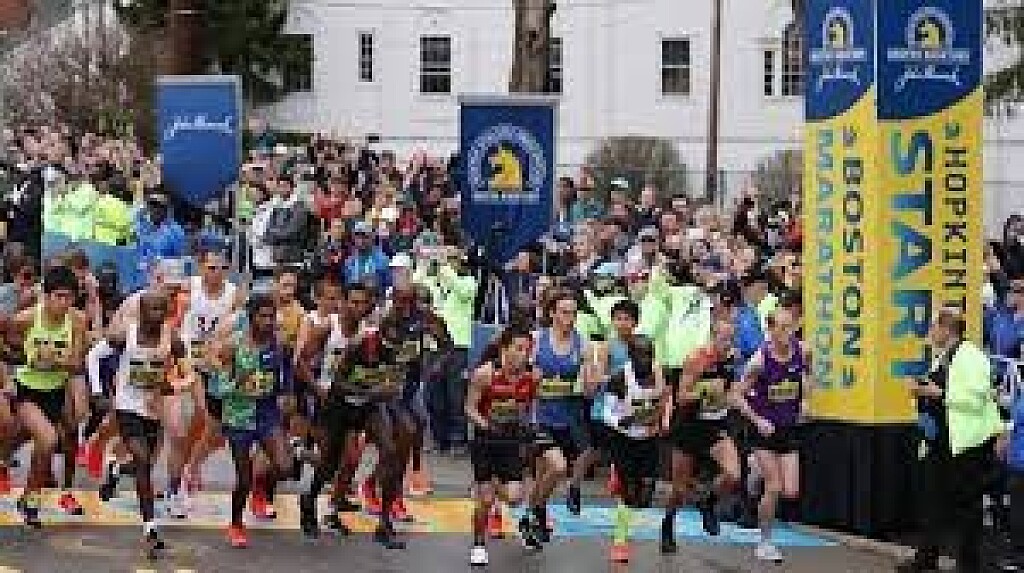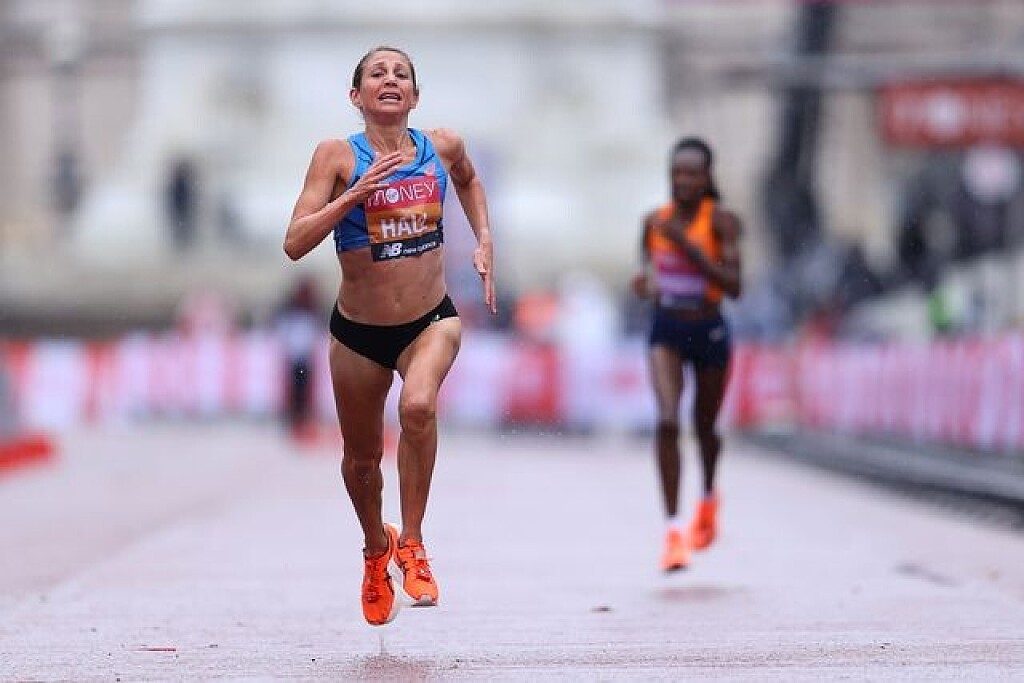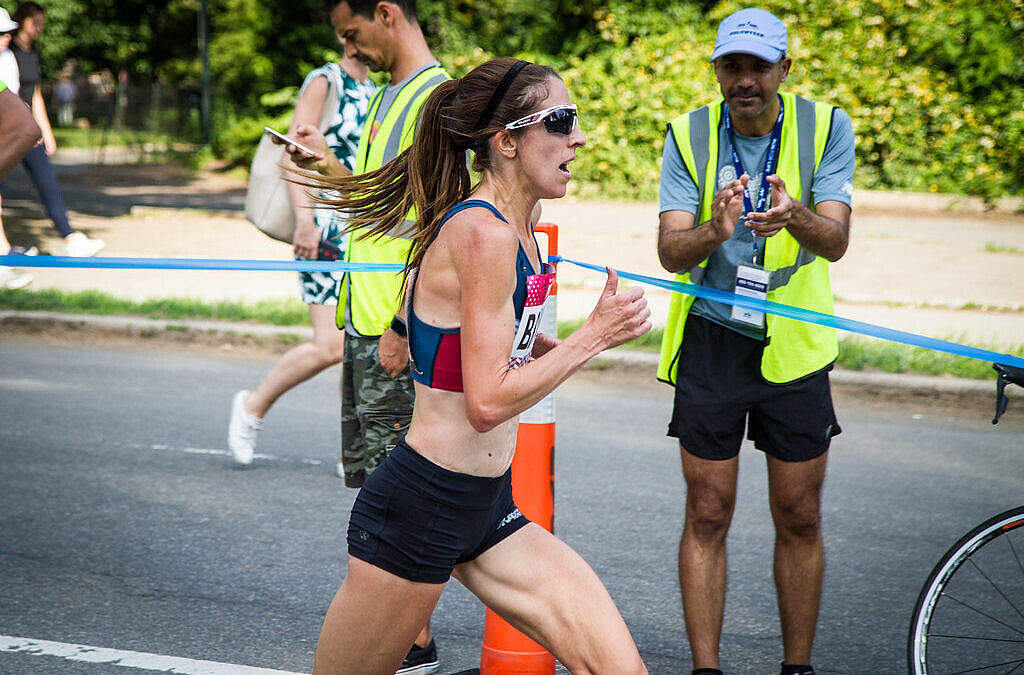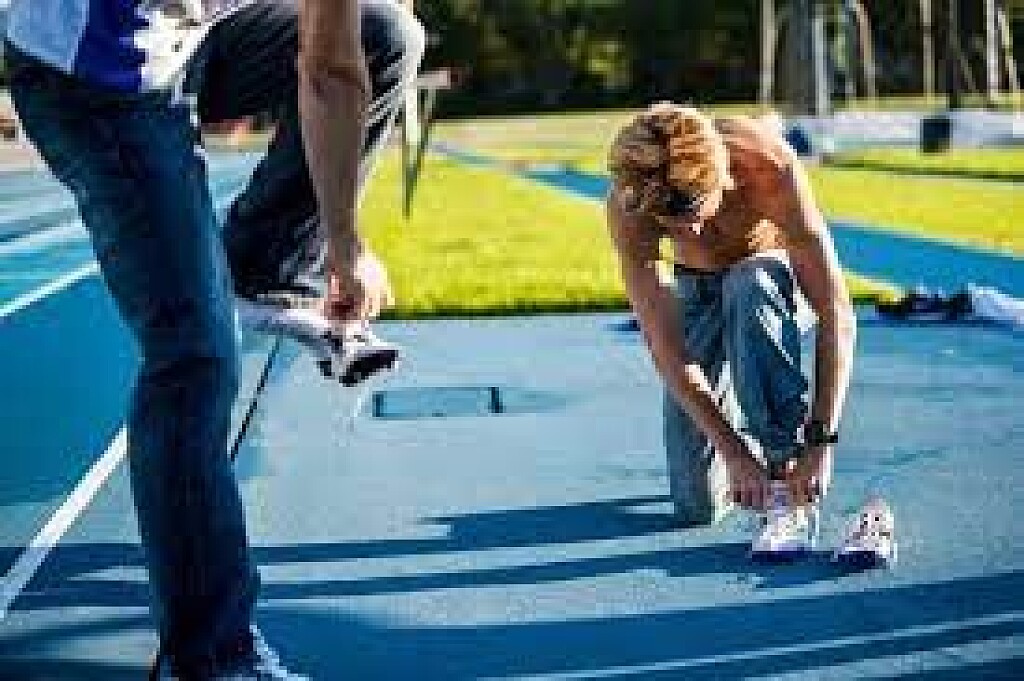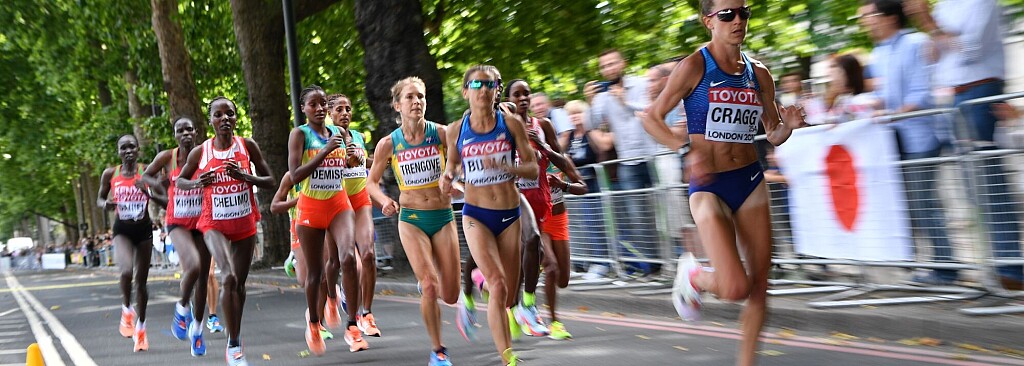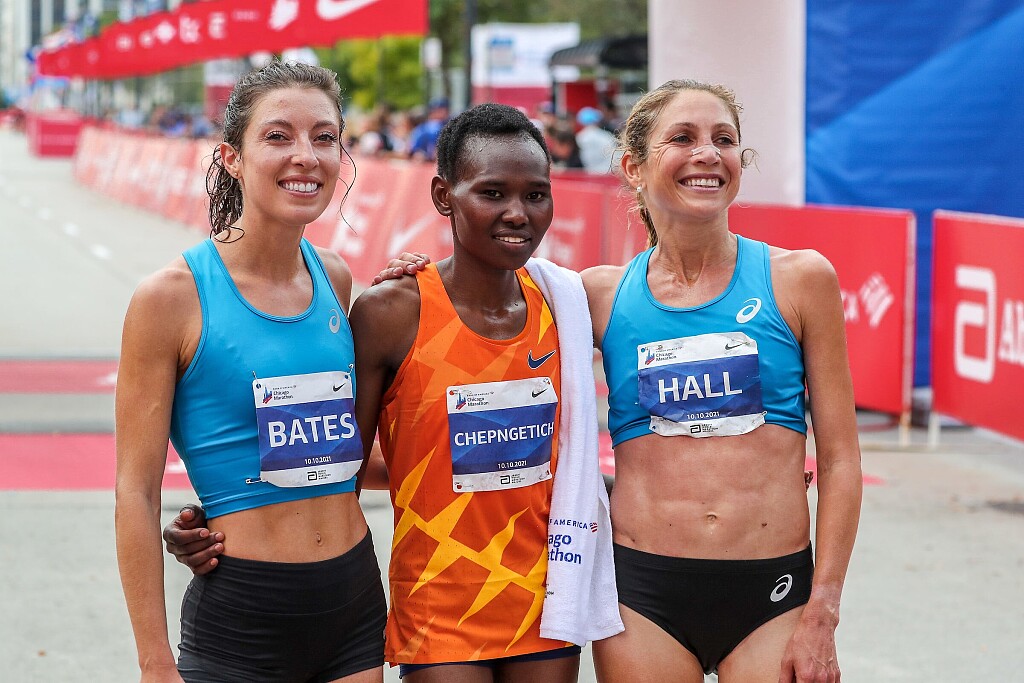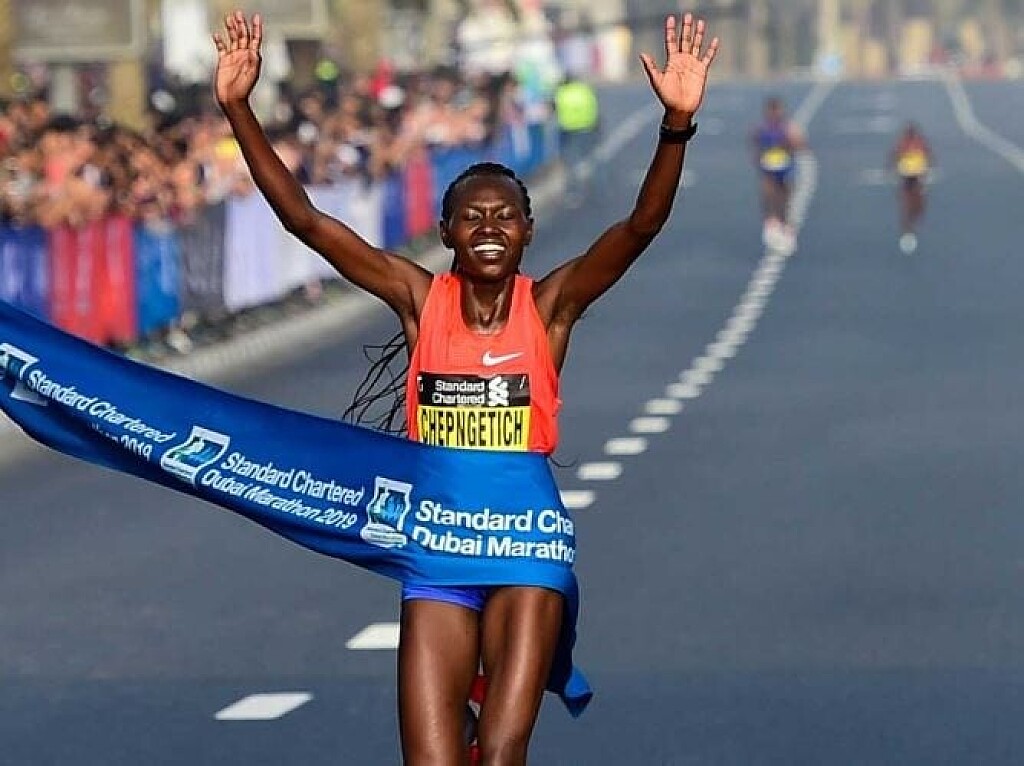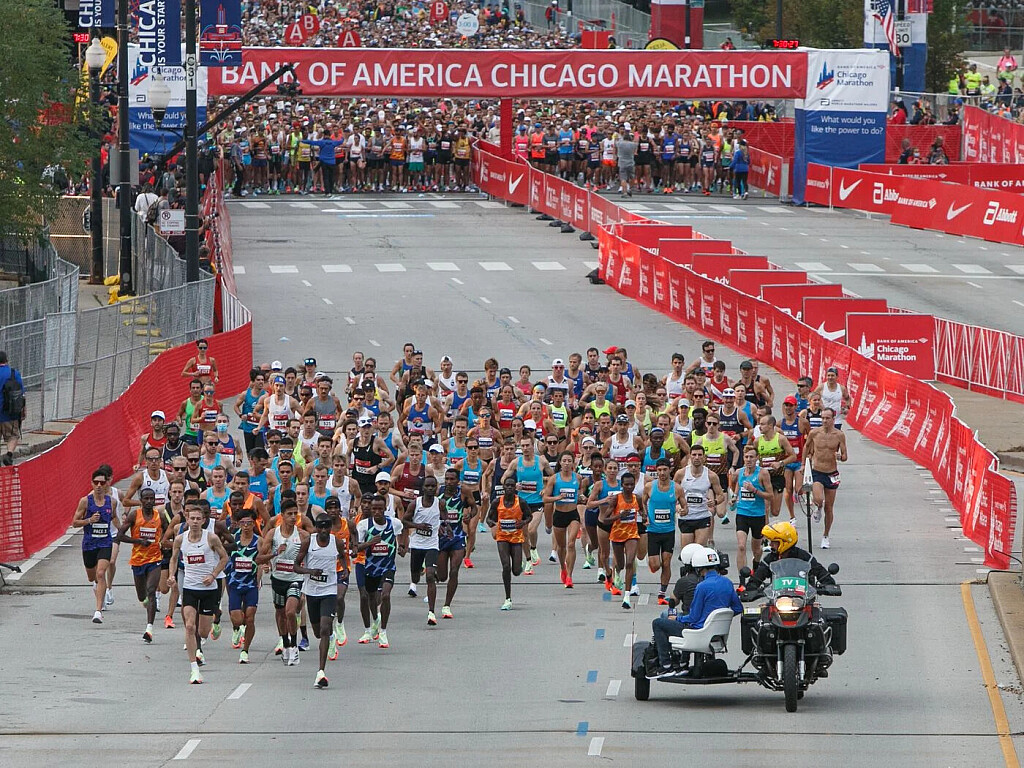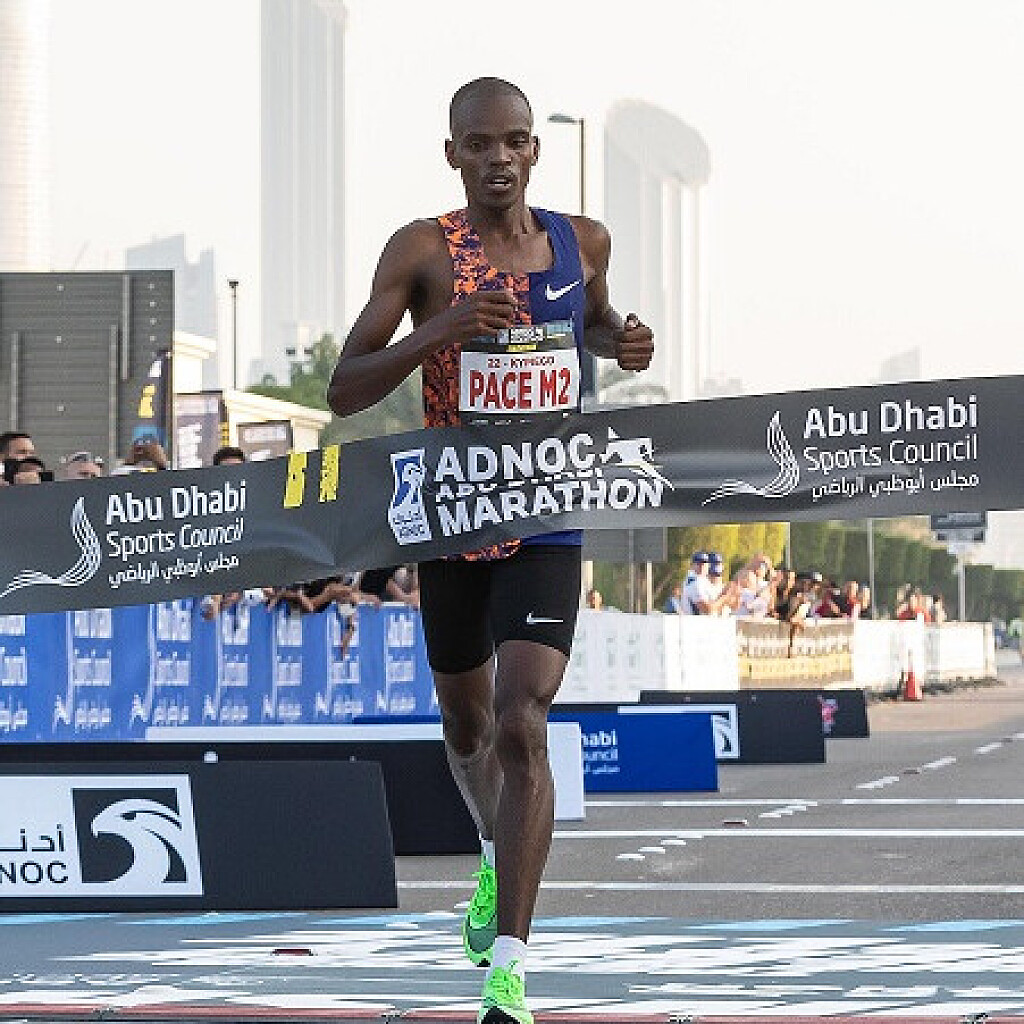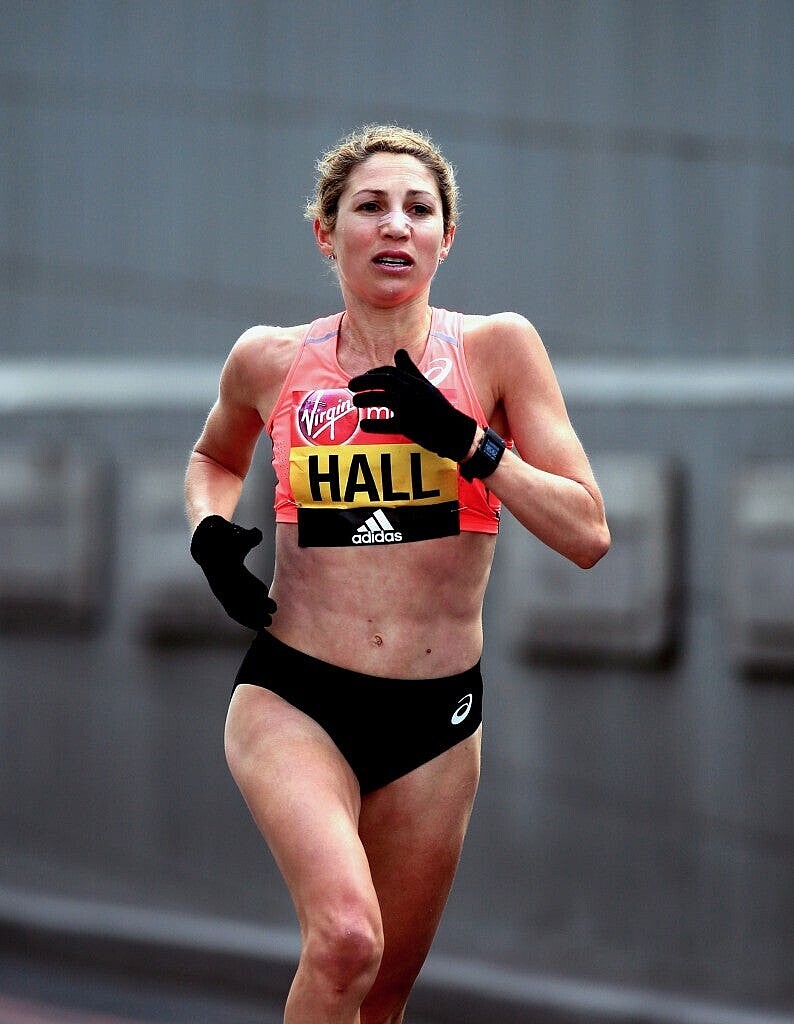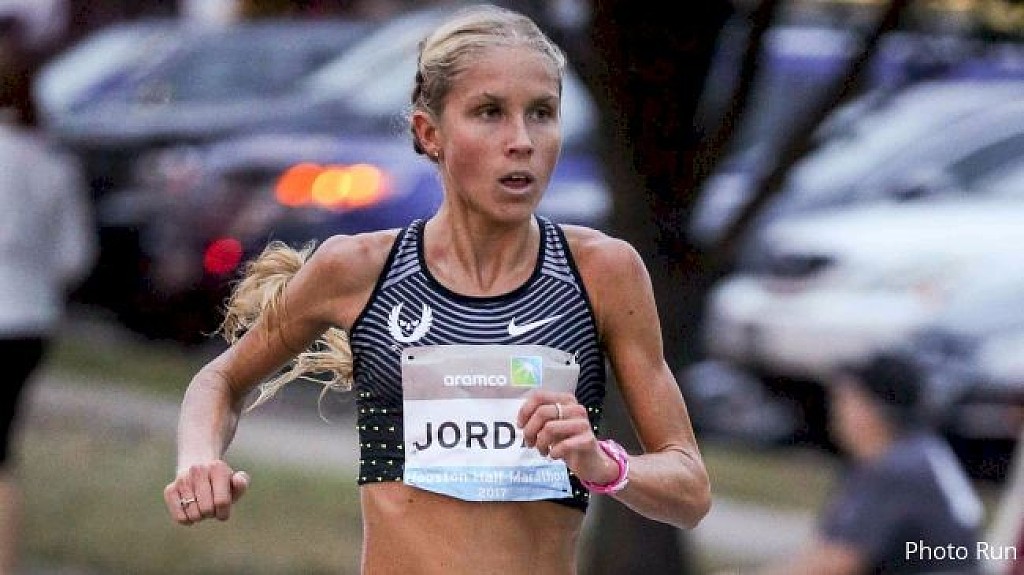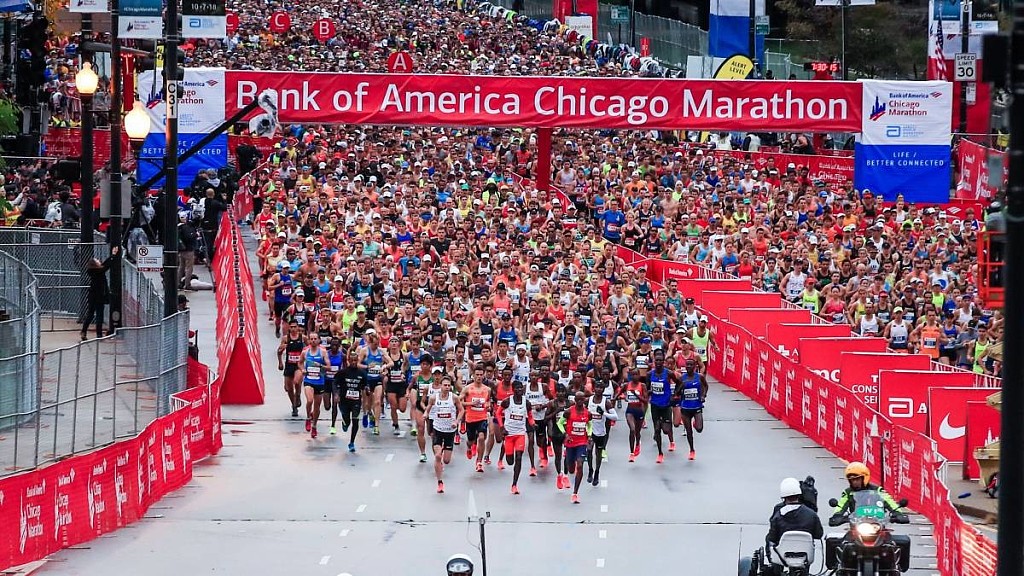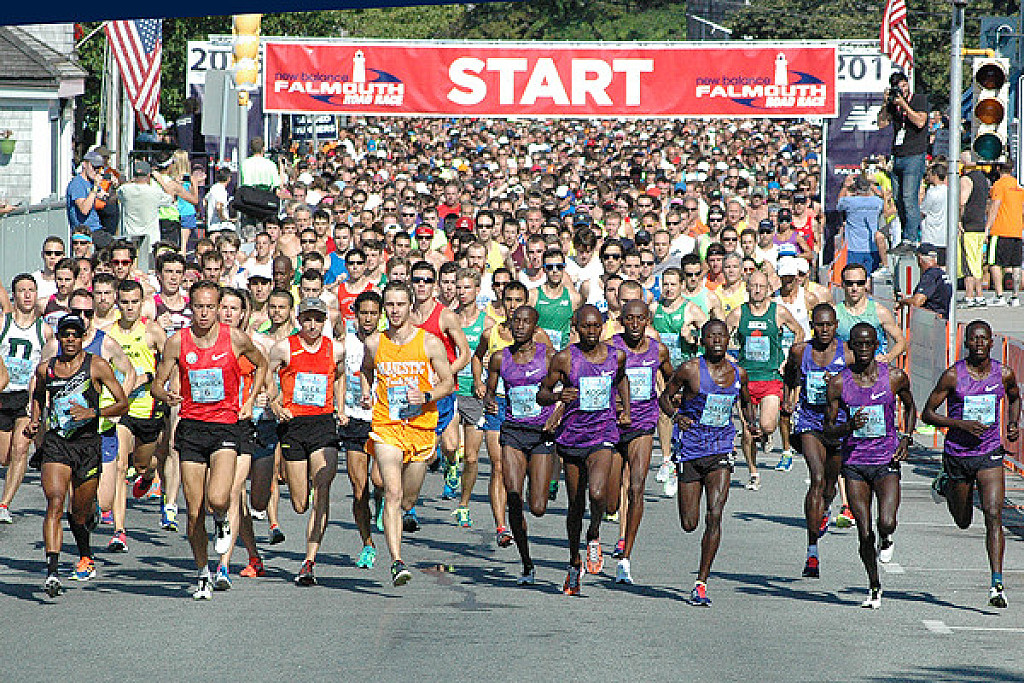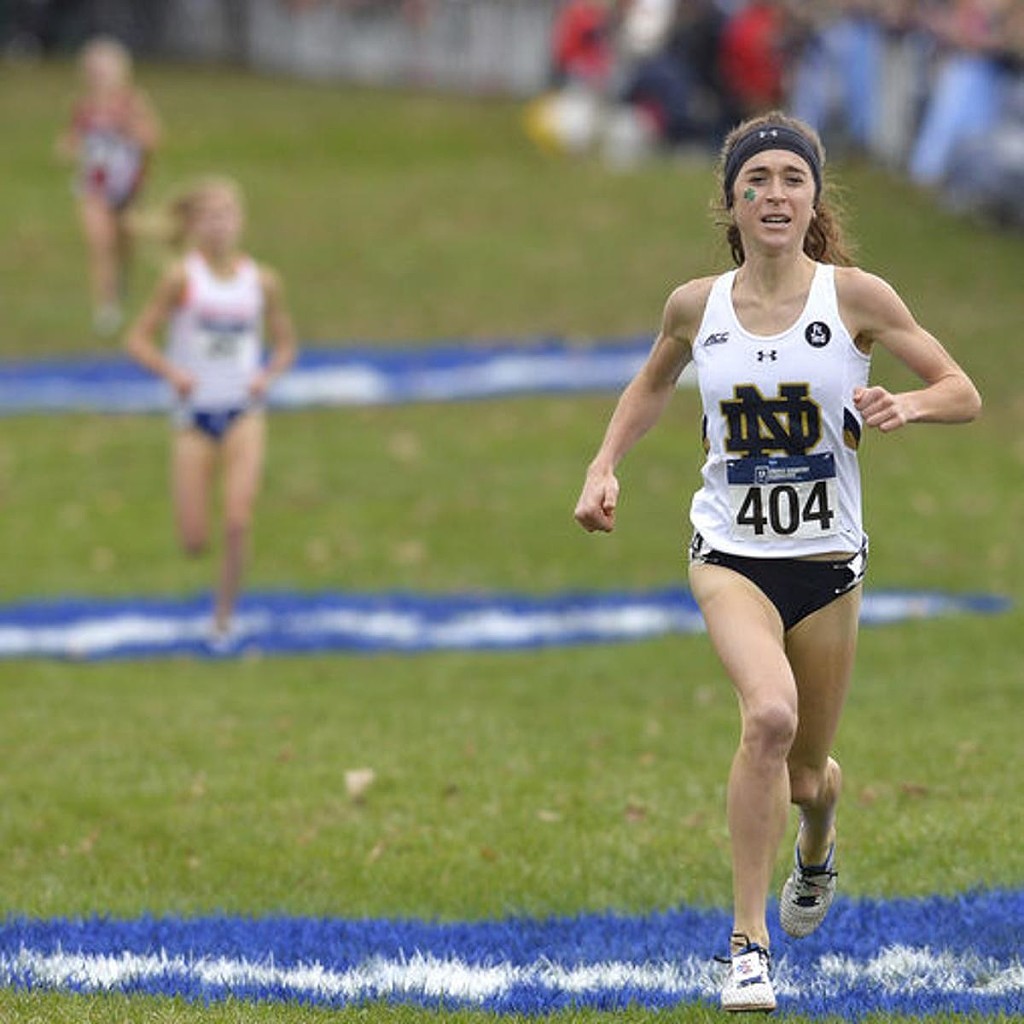Running News Daily
Running News Daily is edited by Bob Anderson. Send your news items to bob@mybestruns.com Advertising opportunities available. Train the Kenyan Way at KATA Kenya and Portugal owned and operated by Bob Anderson. Be sure to catch our movie A Long Run the movie KATA Running Camps and KATA Potato Farms - 31 now open in Kenya! https://kata.ke/
Index to Daily Posts · Sign Up For Updates · Run The World Feed
Articles tagged #Emma Bates
Today's Running News
A Day for the History Books: Korir and Lokedi Shine at the 2025 Boston Marathon
The 129th edition of the Boston Marathon, held Monday, April 21, 2025, delivered unforgettable drama and record-setting performances on the iconic route from Hopkinton to Boylston Street. Under near-perfect running conditions—mid-50s temperatures, low humidity, and a light tailwind—elite runners took full advantage, producing some of the fastest times in race history.
John Korir Claims His Crown and Continues a Family Legacy
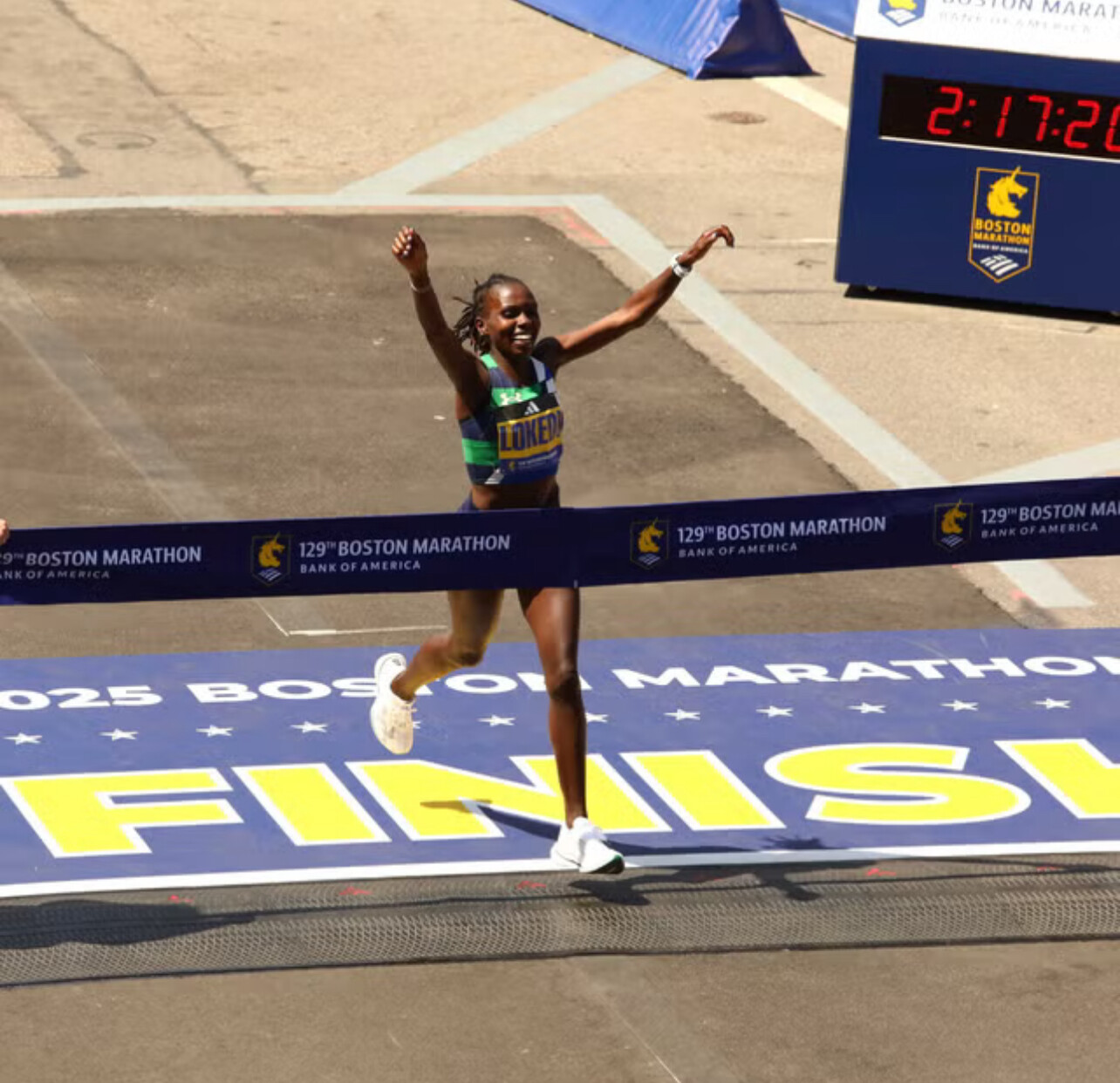
Kenya’s John Korir won the men’s race in a sensational 2:04:45, the second-fastest time ever run on the Boston course. The younger brother of 2012 Boston champion Wesley Korir, John added another chapter to his family’s Boston legacy by not only conquering the challenging course but doing so in dominant fashion.
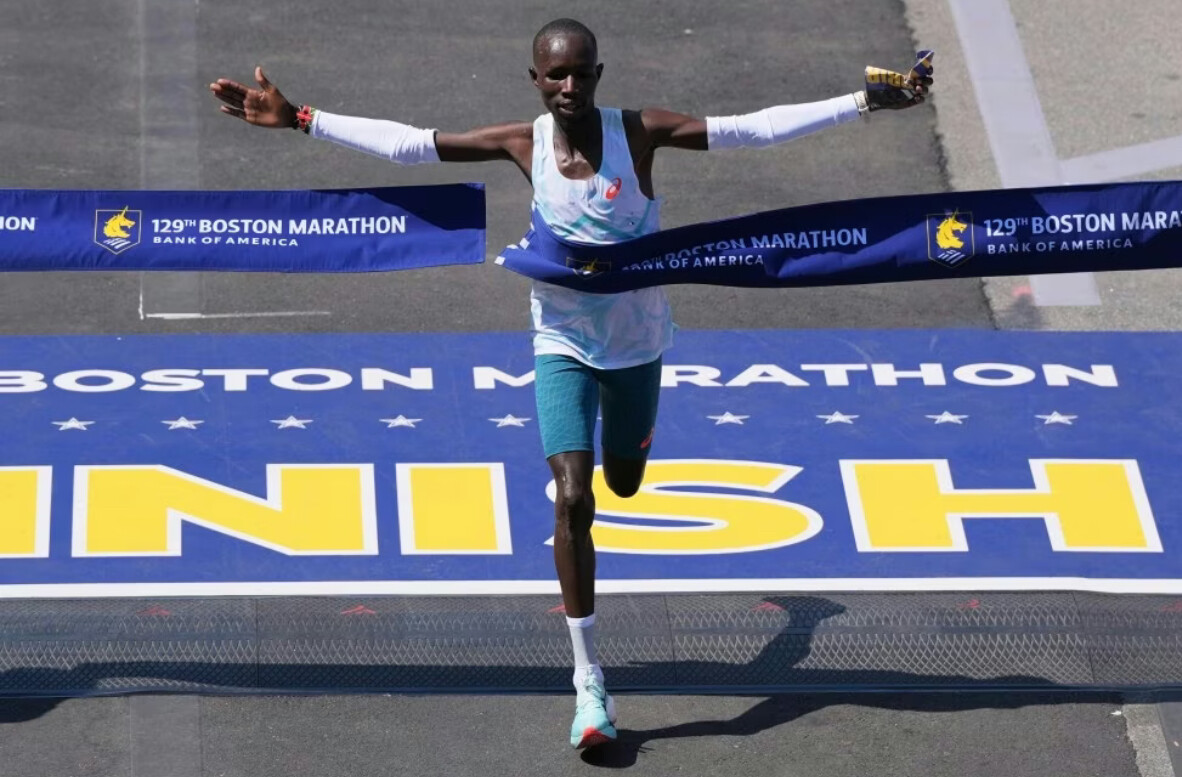
Despite a minor fall early in the race, Korir surged away from a deep international field after 20 miles, building a gap that no one could close. His finishing time was just over a minute shy of Geoffrey Mutai’s legendary 2:03:02 from 2011—the fastest time ever run in Boston but not eligible as a world record due to the course layout.
“I knew I was ready for something big,” Korir said post-race. “To follow in my brother’s footsteps and win Boston means everything.”
American hopes were high coming into the race, and Conner Mantz did not disappoint. Running a massive personal best of 2:05:08, he placed fourth overall and became the second-fastest American ever on the Boston course, behind only Ryan Hall’s 2:04:58 (set in 2011).
Sharon Lokedi Breaks the Tape—and the Record
The women’s race was equally historic. Sharon Lokedi, who won the 2022 New York City Marathon, delivered the performance of her life to win in 2:17:22, a new Boston Marathon course record, smashing the previous mark of 2:19:59 set by Buzunesh Deba in 2014.
Lokedi ran a smart, strategic race. She stayed tucked in a lead pack through the Newton Hills and then launched a powerful surge at mile 24, dropping two-time Boston champion Hellen Obiri and the rest of the field. Obiri finished second in a personal best 2:18:10, making it a Kenyan 1-2 sweep on the women’s podium.
“This course is tough, but I felt strong the whole way,” Lokedi said. “To run a course record here—it’s just unbelievable.”
Top 10 Elite Men – 2025 Boston Marathon
1. John Korir (Kenya) – 2:04:45
2. Alphonce Simbu (Tanzania) – 2:05:04
3. Cybrian Kotut (Kenya) – 2:05:04
4. Conner Mantz (USA) – 2:05:08
5. Muktar Edris (Ethiopia) – 2:05:59
6. Rory Linkletter (Canada) – 2:07:02
7. Clayton Young (USA) – 2:07:04
8. Tebello Ramakongoana (Lesotho) – 2:07:19
9. Daniel Mateiko (Kenya) – 2:07:52
10. Ryan Ford (USA) – 2:08:00
Top 10 Elite Women – 2025 Boston Marathon
1. Sharon Lokedi (Kenya) – 2:17:22 (Course Record)
2. Hellen Obiri (Kenya) – 2:17:41
3. Yalemzerf Yehualaw (Ethiopia) – 2:18:06
4. Irine Cheptai (Kenya) – 2:21:32
5. Amane Beriso (Ethiopia) – 2:21:58
6. Calli Thackery (Great Britain) – 2:22:38
7. Jess McClain (USA) – 2:22:43
8. Annie Frisbie (USA) – 2:23:21
9. Stacy Ndiwa (Kenya) – 2:23:29
10. Tsige Haileslase (Ethiopia) – 2:23:43
Notable American Performances
• Emma Bates finished 13th with a time of 2:25:10.
• Dakotah Popehn secured 16th place in 2:26:09.
• Des Linden completed her 28th and final professional marathon, finishing 17th in 2:26:19.
• Sara Hall placed 18th with a time of 2:26:32.
Looking Ahead
The 2025 Boston Marathon reaffirmed its place as one of the world’s premier races—not just for its history and prestige, but for its ability to showcase incredible athletic achievement. With deep American performances and Kenyan dominance at the front, it sets the stage for an exciting year.
For fans, runners, and historians, this year’s Boston will go down as one of the most memorable ever.
My Best Runs
Your front row seat to the world of running
by Boris Baron
Login to leave a comment
Boston Marathon
Among the nation’s oldest athletic clubs, the B.A.A. was established in 1887, and, in 1896, more than half of the U.S. Olympic Team at the first modern games was composed of B.A.A. club members. The Olympic Games provided the inspiration for the first Boston Marathon, which culminated the B.A.A. Games on April 19, 1897. John J. McDermott emerged from a...
more...American Stars Ready to Shine at the 2025 Boston Marathon
The 129th Boston Marathon, set for Monday, April 21, 2025, promises to be a historic showdown between international champions and a formidable field of elite American runners. With defending champions Hellen Obiri and Sisay Lemma returning to defend their titles, the depth of competition will be among the strongest in recent memory.
Elite American Men
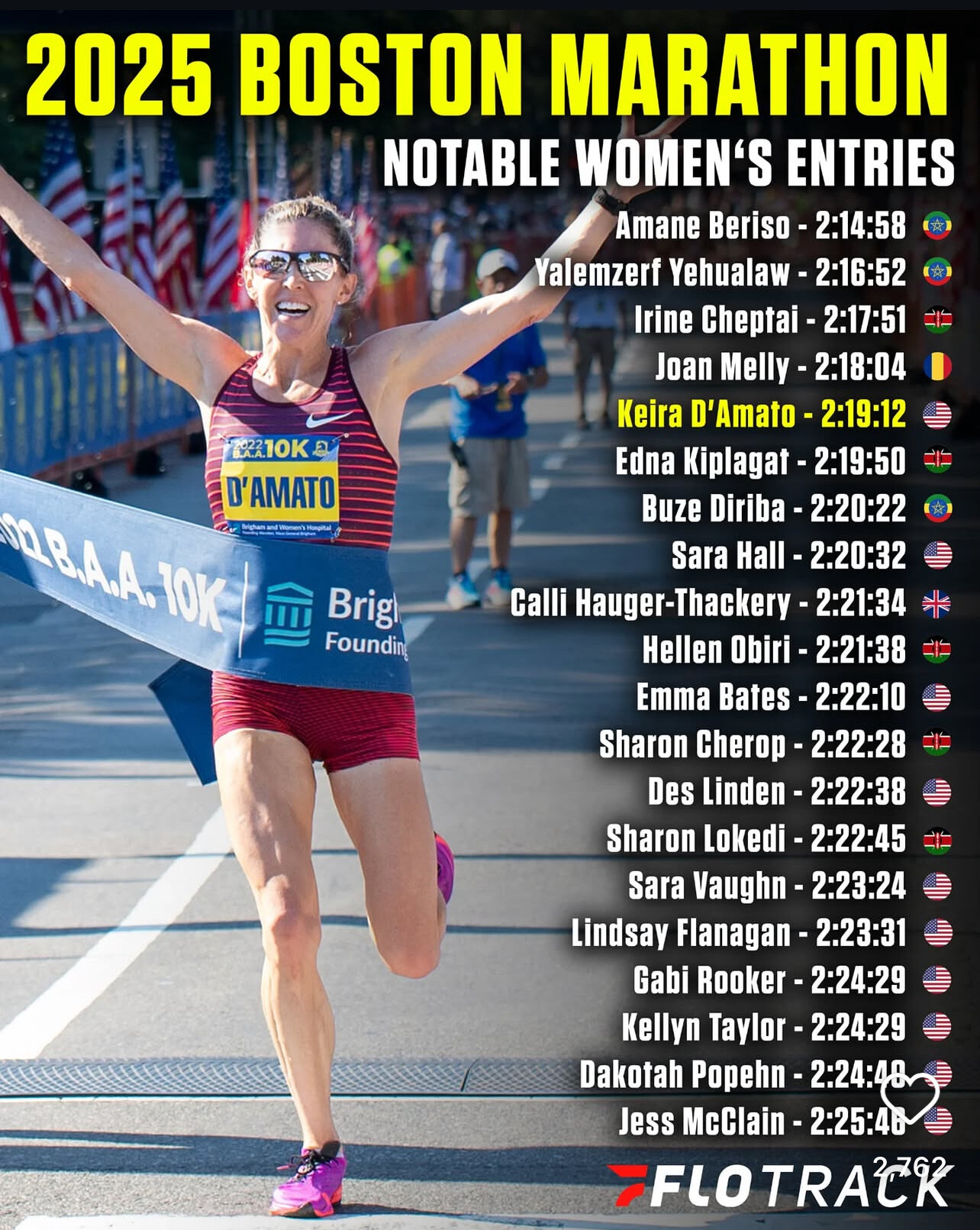
• Conner Mantz – PB: 2:07:47
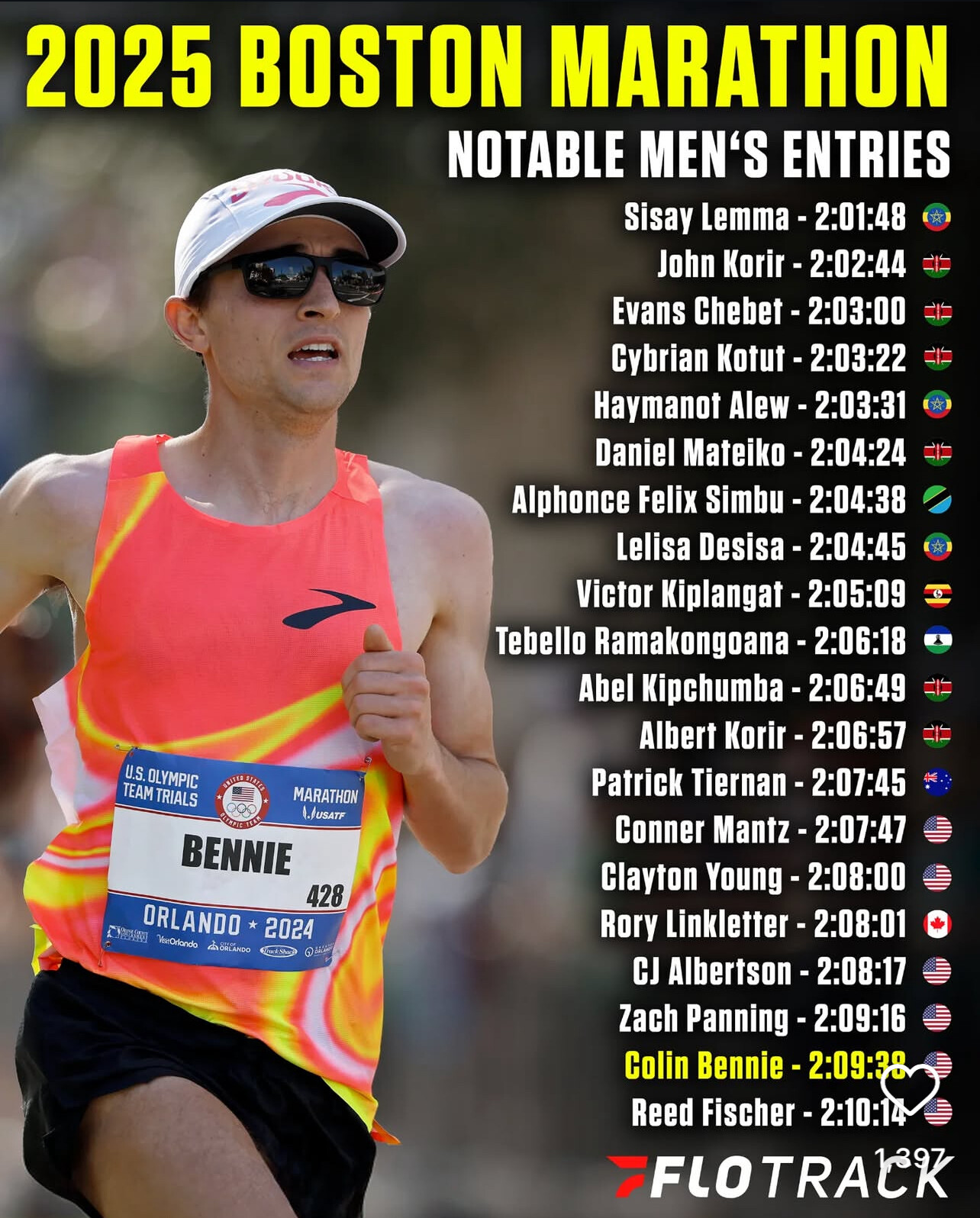
Mantz enters Boston as one of the top American hopes, fresh off an 8th-place finish at the Paris Olympics and 6th in New York City.
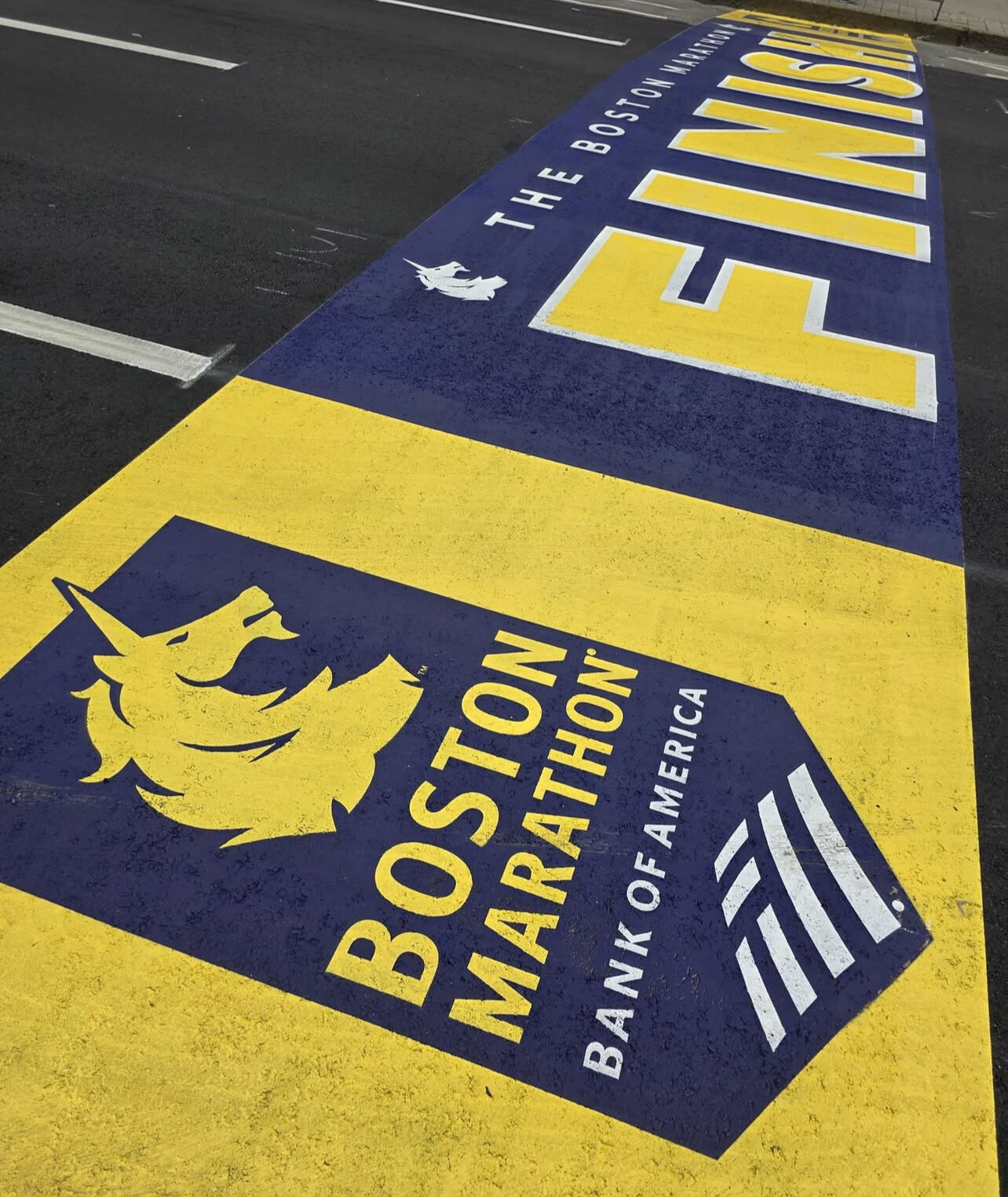
• Clayton Young – PB: 2:08:00
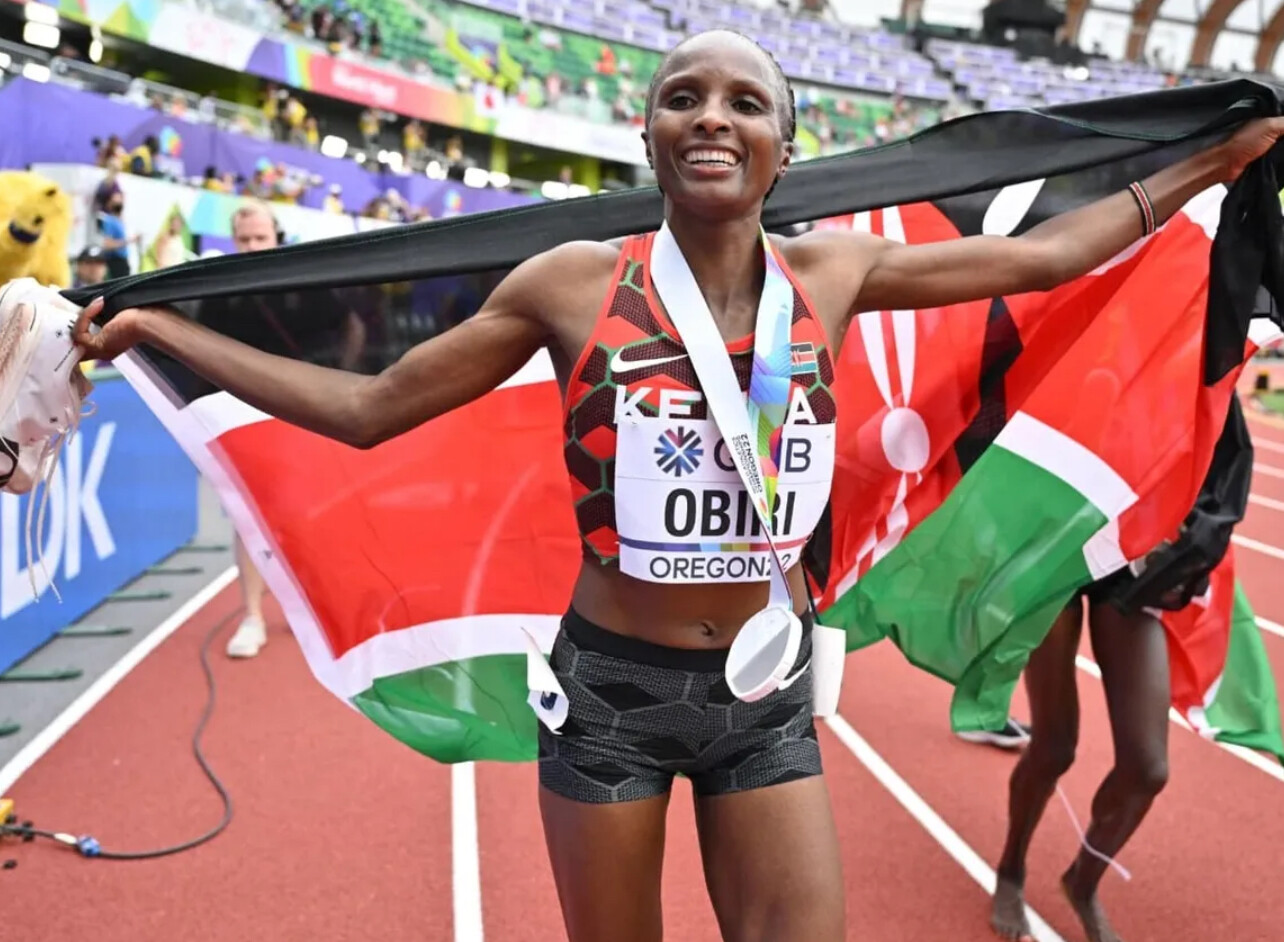
Training alongside Mantz, Young placed 9th in Paris and 7th in NYC, and continues to close the gap with the world’s best.
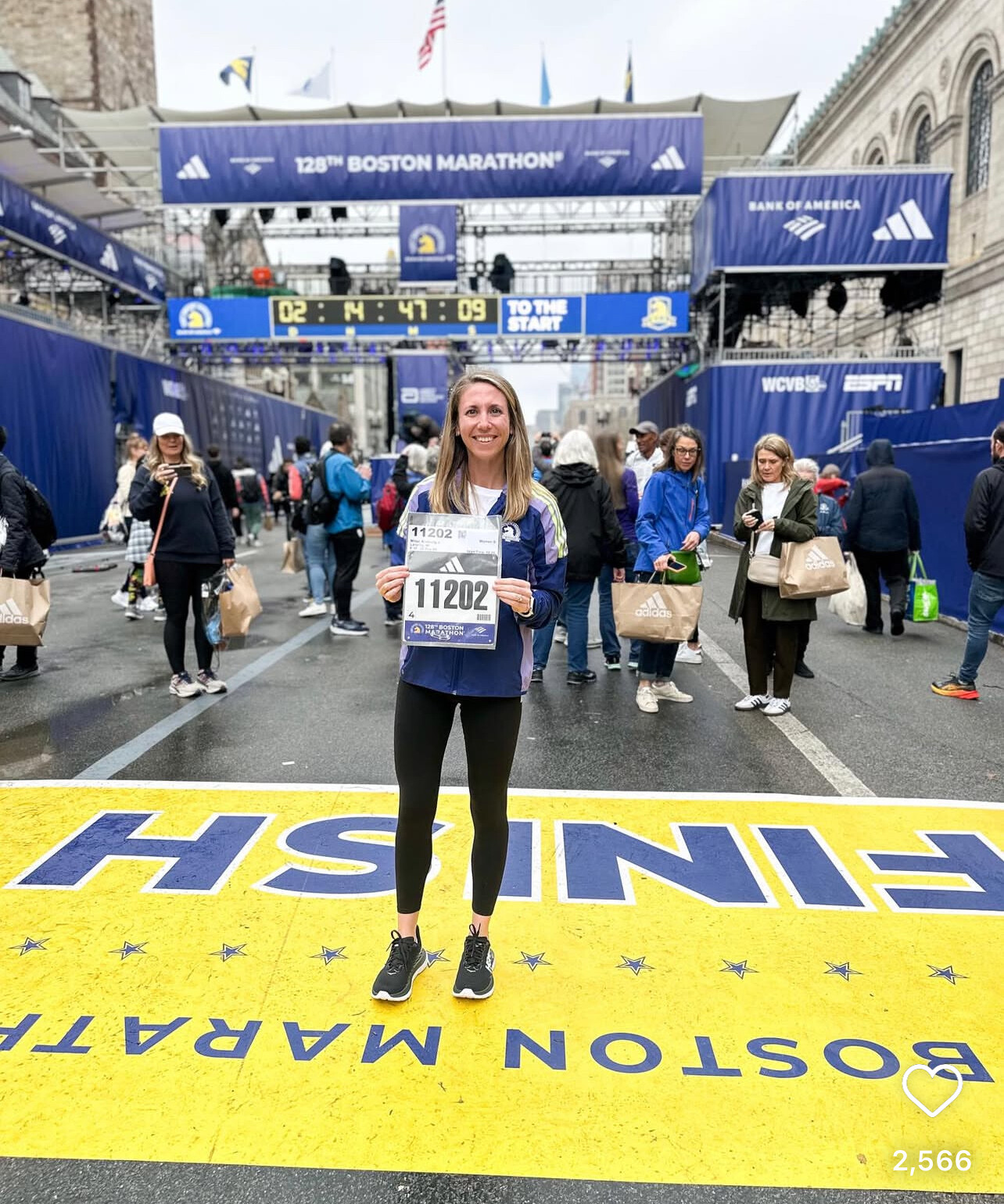
• CJ Albertson – PB: 2:08:17
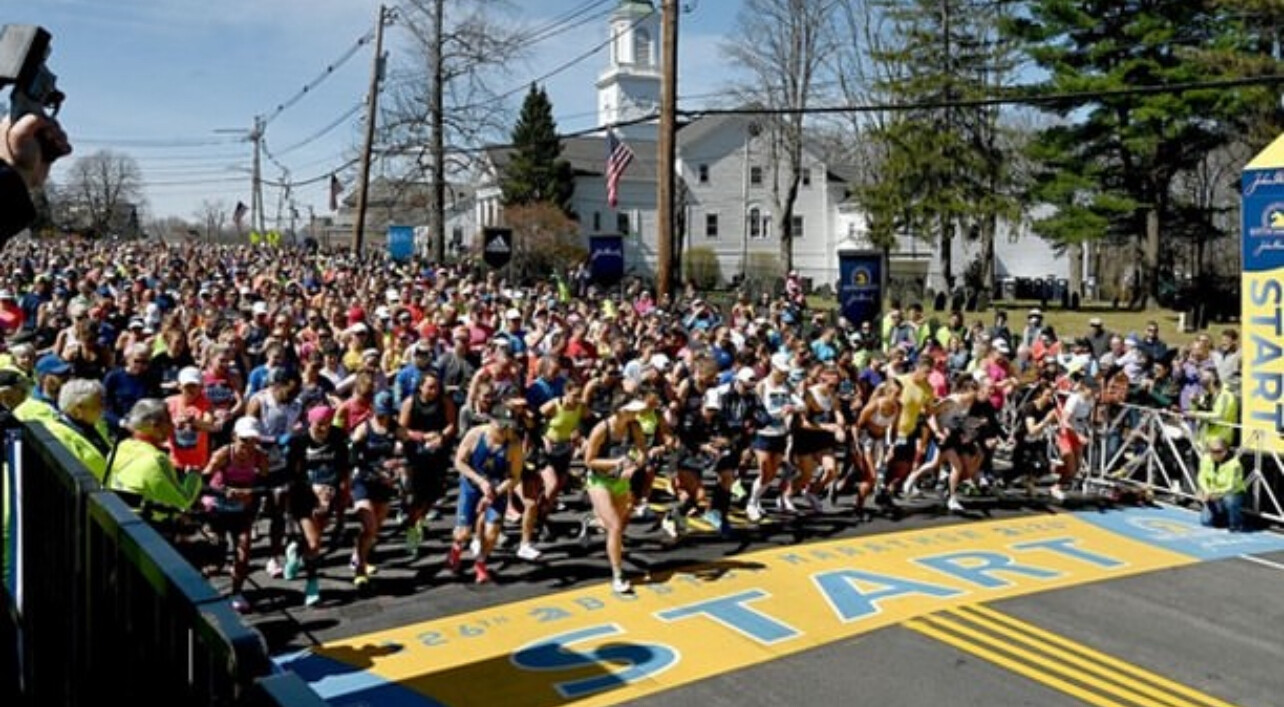
Known for his fearless tactics and high mileage, Albertson ran his personal best at the 2024 Chicago Marathon.
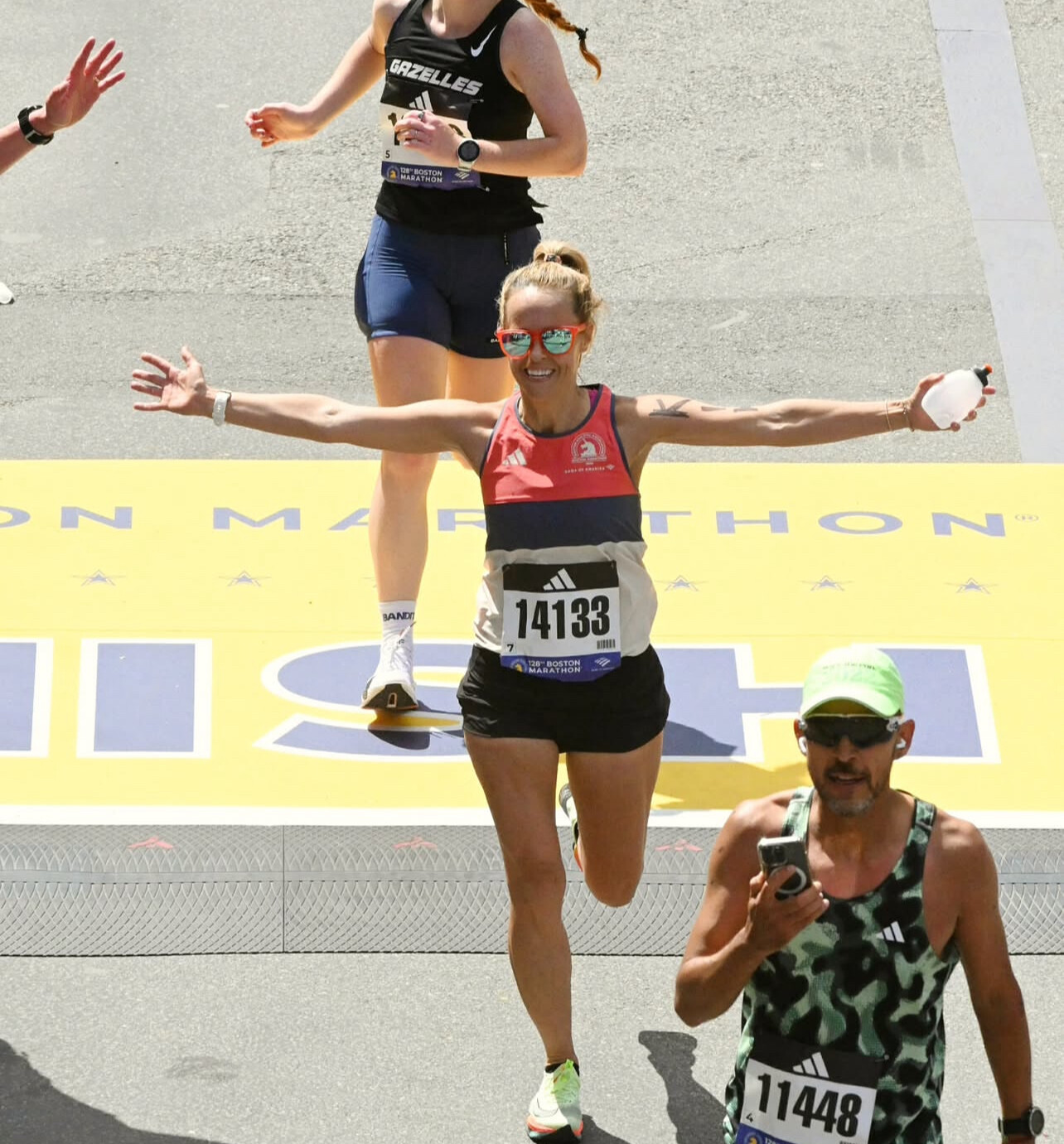
• Zach Panning – PB: 2:09:16
The 5th-place finisher at the U.S. Olympic Trials, Panning brings aggressive racing and consistent progress to Boston.
• Colin Bennie – PB: 2:09:38
The Massachusetts native and 2021 top American finisher returns with home course advantage and renewed focus.
Elite American Women
• Keira D’Amato – PB: 2:19:12
The former American record holder returns from injury with momentum and the experience to contend.
• Emma Bates – PB: 2:22:10
Bates was the top American at the 2024 Boston Marathon and continues to improve with every outing.
• Sara Hall – PB: 2:20:32
One of the most experienced American marathoners, Hall posted a 2:23:45 in Berlin last fall.
• Desiree Linden – PB: 2:22:38
The 2018 Boston champion returns for her 12th Boston start, a fan favorite with unmatched experience.
• Dakotah Popehn – PB: 2:24:40
Popehn was the top American finisher at the Paris Olympics and brings strong international credentials.
• Jess McClain – PB: 2:25:46
McClain placed fourth at the U.S. Trials and will be making her Boston debut as a rising star.
International Elite Field
Men’s Division:
• Sisay Lemma (ETH) – PB: 2:01:48
The defending champion and one of the fastest marathoners in history, Lemma seeks to repeat in Boston.
• John Korir (KEN) – PB: 2:02:44
The 2024 Chicago Marathon champion is a serious threat in any race he enters.
• Evans Chebet (KEN) – PB: 2:03:00
Boston champion in 2022 and 2023, Chebet looks to reclaim his title and join the three-time winners’ club.
Women’s Division:
• Amane Beriso (ETH) – PB: 2:14:58
The fifth-fastest woman in history is making her Boston debut.
• Yalemzerf Yehualaw (ETH) – PB: 2:16:52
Still just 25, Yehualaw adds tremendous firepower to the field.
• Hellen Obiri (KEN) – PB: 2:21:38
The two-time defending champion is chasing history with a potential third straight victory on Boylston Street.
Race Day Details
• Date: Monday, April 21, 2025
• Start Times:
• Wheelchair Division – 9:02 AM
• Handcycle & Duo Participants – 9:05 AM
• Elite Women – 9:32 AM
• Elite Men & Wave 1 – 10:00 AM
• Wave 2 – 10:25 AM
• Wave 3 – 10:50 AM
• Wave 4 – 11:15 AM
• Tracking & Coverage: Available through the B.A.A. Racing App with live updates, leaderboards, and interactive course maps.
“I’ve run over a thousand races in my life, and nothing compares to Boston,” says My Best Runs editor Bob Anderson. “When I ran 3:32:17 here at age 65, I felt like a rock star the entire way. The crowd was unbelievable—cheering, encouraging, lifting every runner forward. Boston isn’t just about the elites—it’s about the thousands of others out there chasing their dreams on the same course.”
With a deep American field and some of the fastest runners on the planet, the 2025 Boston Marathon is shaping up to be one of the most competitive in history. Whether it’s a breakout run or a hard-fought defense, fans can expect something unforgettable from this year’s race.
by Boris Baron
Login to leave a comment
Boston Marathon
Among the nation’s oldest athletic clubs, the B.A.A. was established in 1887, and, in 1896, more than half of the U.S. Olympic Team at the first modern games was composed of B.A.A. club members. The Olympic Games provided the inspiration for the first Boston Marathon, which culminated the B.A.A. Games on April 19, 1897. John J. McDermott emerged from a...
more...Boston Marathon 2025 Race Preview and Predictions - Can one of the Americans pull off an upset?
The 129th Boston Marathon is set for Monday, April 21, 2025 in just over a month, once again taking place on Patriots’ Day in Massachusetts. This year’s edition marks the first under the sponsorship of Bank of America, signaling a new chapter for the world’s oldest annual marathon. With an elite field packed with world-class runners and unpredictable spring weather, the race promises another thrilling showdown from Hopkinton to Boston.
Race Details & Course Overview
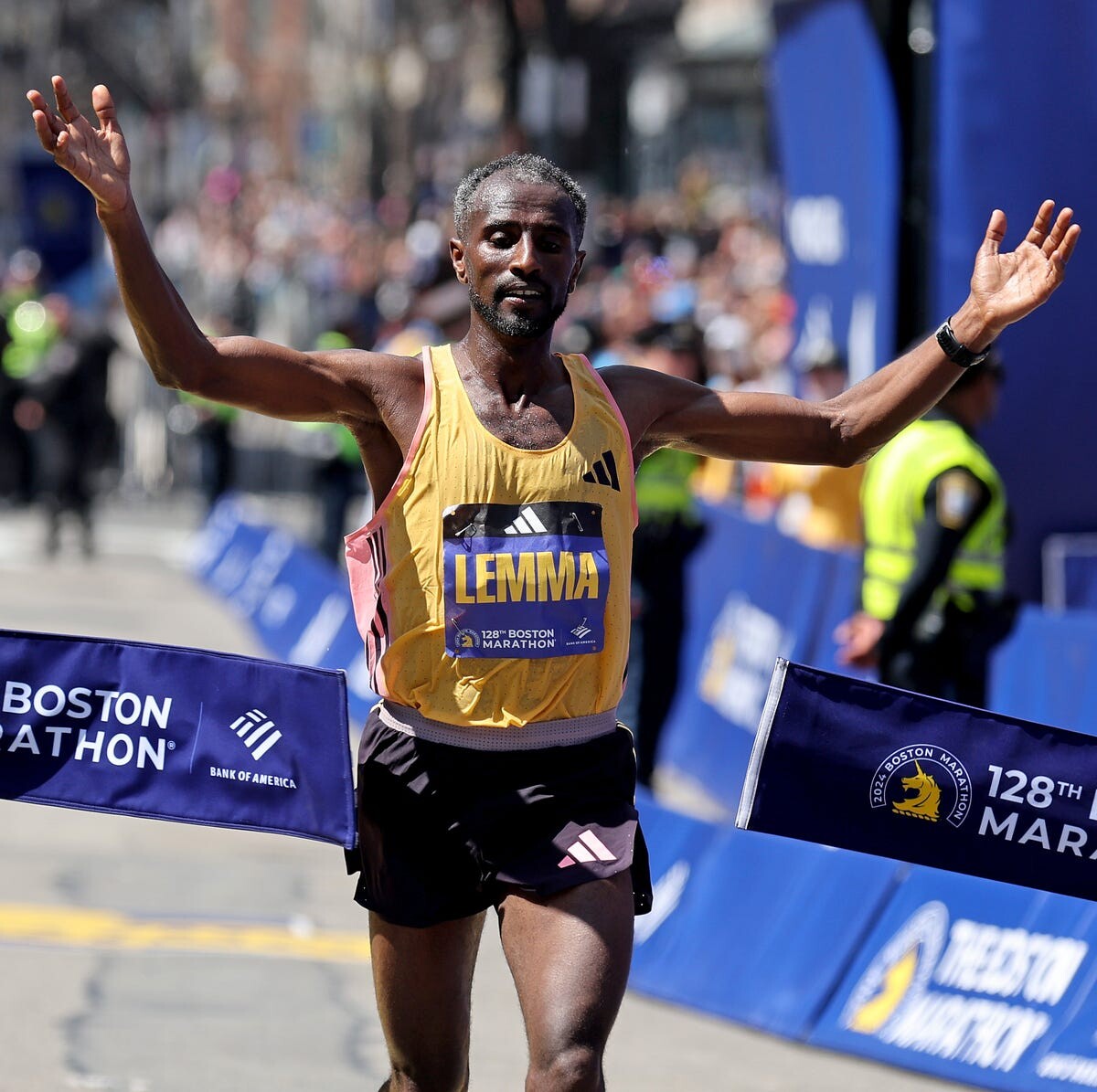
The Boston Marathon’s iconic point-to-point course spans 26.2 miles, starting in Hopkinton and ending on Boylston Street in Boston’s Copley Square. Runners will navigate rolling hills, including the challenging Newton Hills and the infamous Heartbreak Hill at mile 21. The course favors experienced runners who can manage both the early downhill sections and the later climbs.
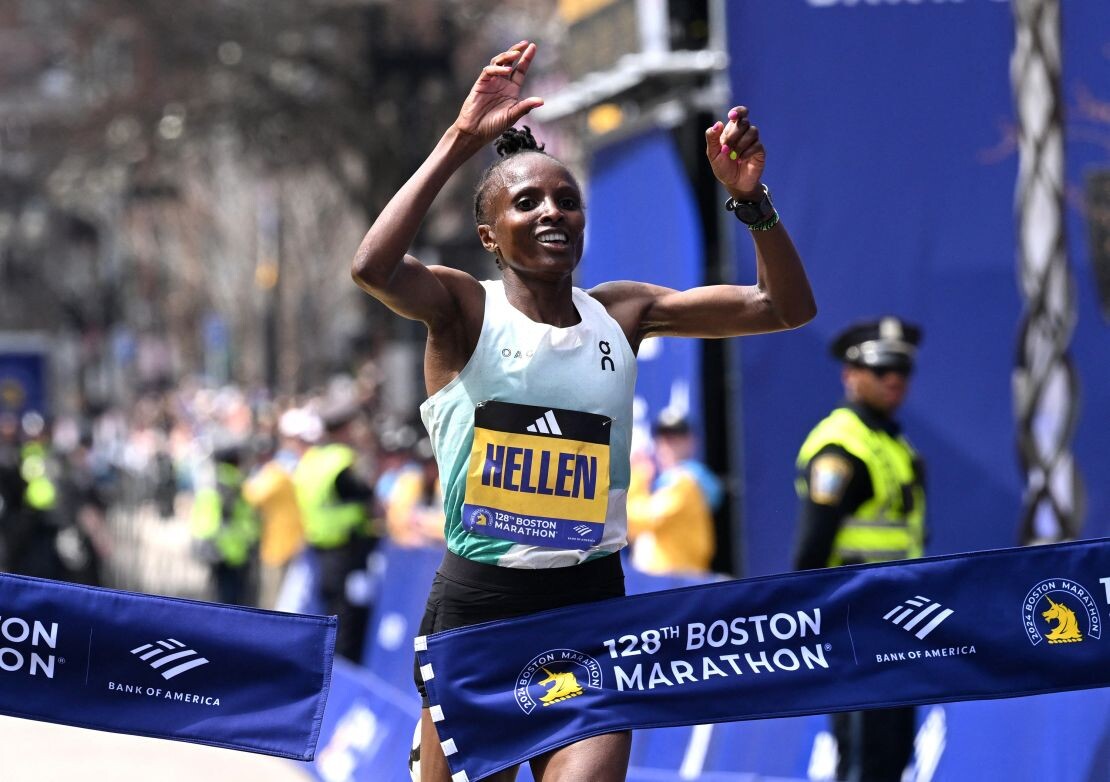
Weather will be a key factor, as New England’s spring climate is unpredictable. Ideal conditions for runners would be cool temperatures around 45–50°F with overcast skies and a tailwind, but past races have seen everything from heatwaves to freezing rain. Early forecasts suggest favorable conditions, but as always, runners must be prepared for anything.
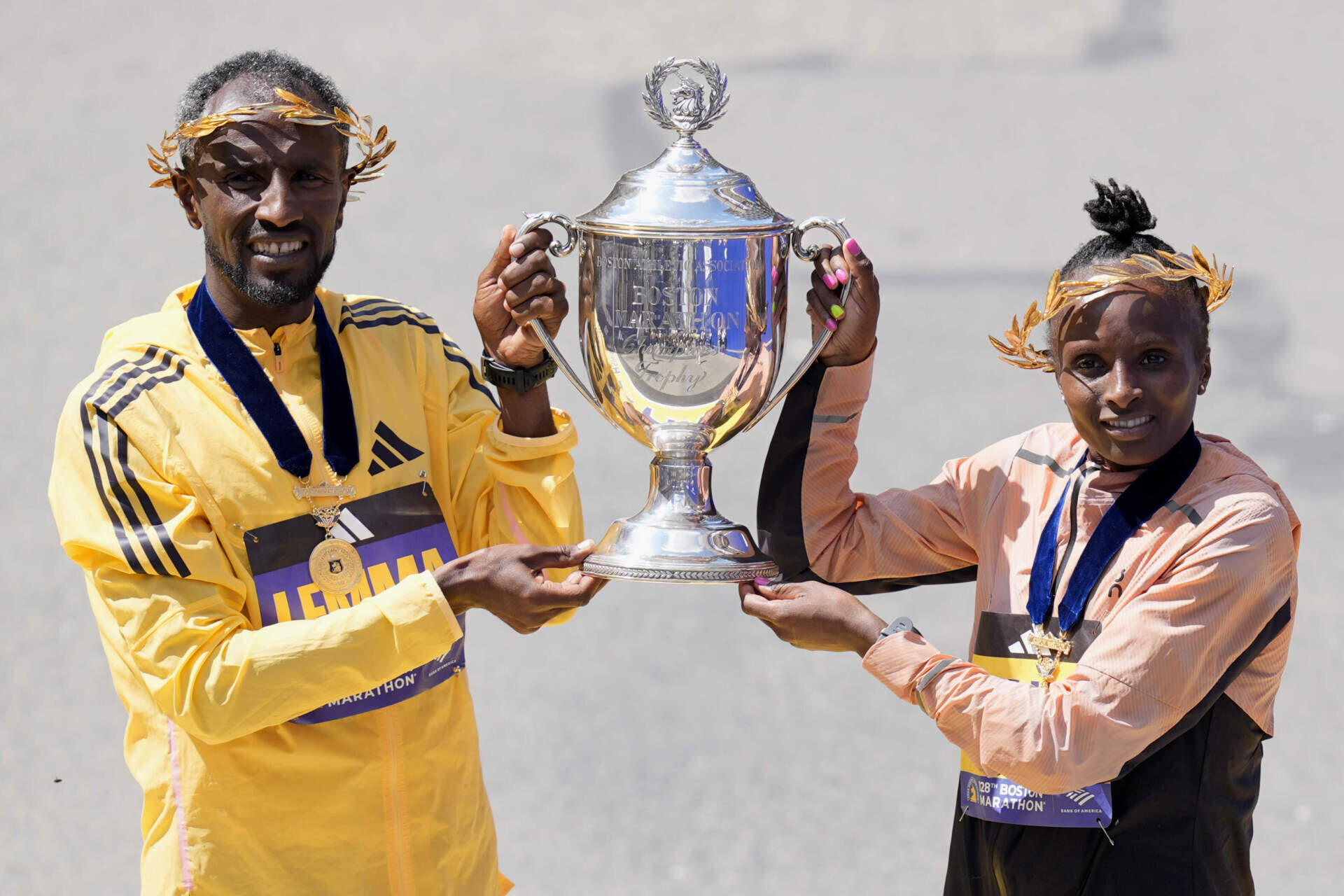
Men’s Elite Field
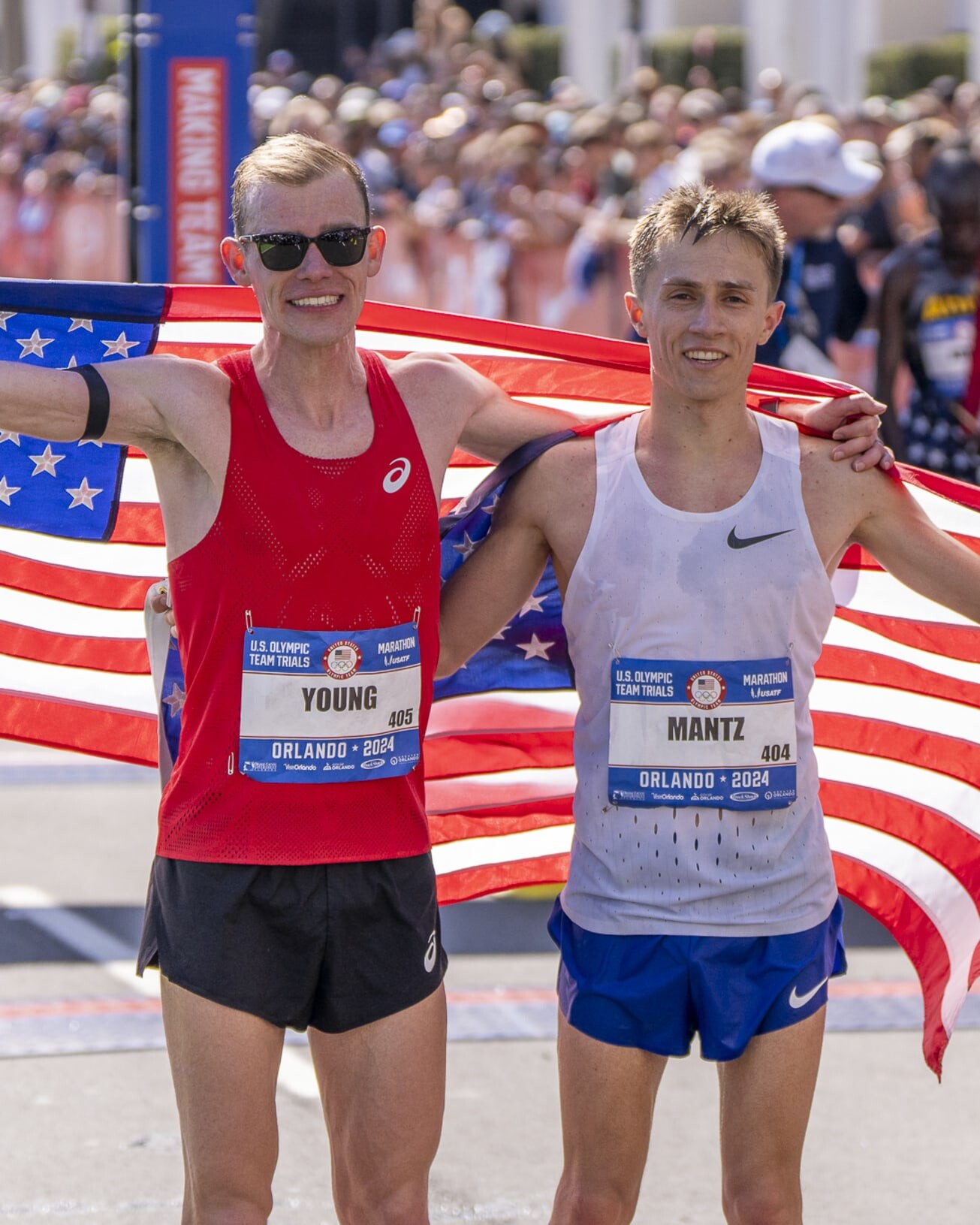
The men’s race features defending champion Sisay Lemma, who is aiming to retain his title after a dominant performance last year. Evans Chebet, the 2022 and 2023 champion, returns hungry to reclaim the crown. John Korir, fresh off a victory at the Chicago Marathon, brings world-class speed that could shake up the competition.
A strong American contingent is headlined by Conner Mantz and Clayton Young, both of whom finished in the top ten at the Olympic marathon. Mantz, in particular, has shown outstanding form, recently breaking the American half marathon record. CJ Albertson, a familiar name in Boston for his bold racing tactics, will also be in the mix, potentially pushing the early pace.
The race is expected to be tactical, with the Newton Hills playing a decisive role. If the pack remains tight through Heartbreak Hill, it could come down to a late-race battle along Boylston Street.
Women’s Elite Field
Hellen Obiri returns seeking a historic third consecutive Boston Marathon title, a feat not accomplished in over two decades. Known for her lethal finishing speed, Obiri has mastered the Boston course and will be the woman to beat.
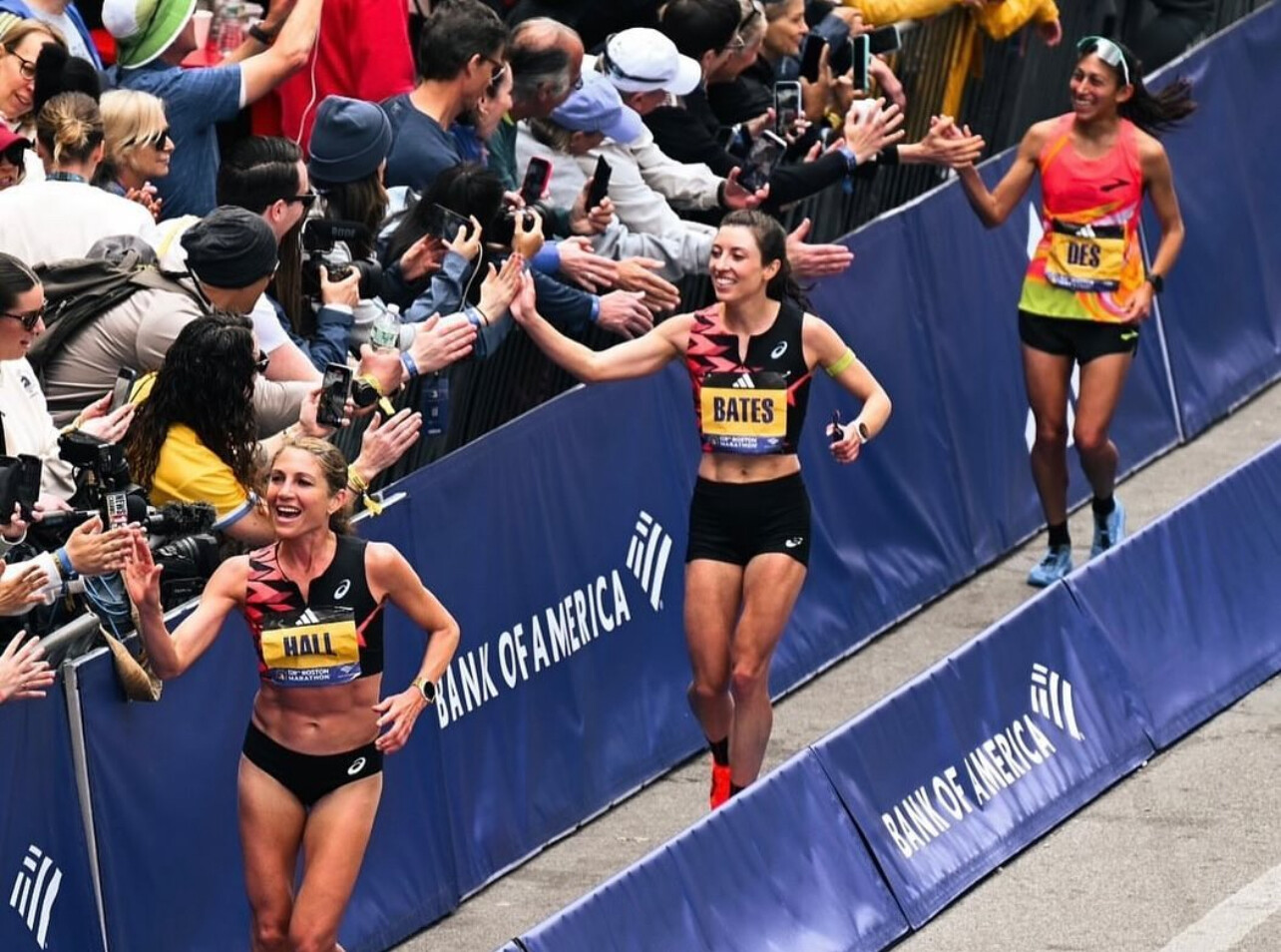
Challenging her will be Amane Beriso, the reigning world marathon champion, and Yalemzerf Yehualaw, a former London Marathon winner with sub-2:17 speed. Sharon Lokedi, last year’s runner-up, will also be in contention, having nearly edged out Obiri in a dramatic finish.
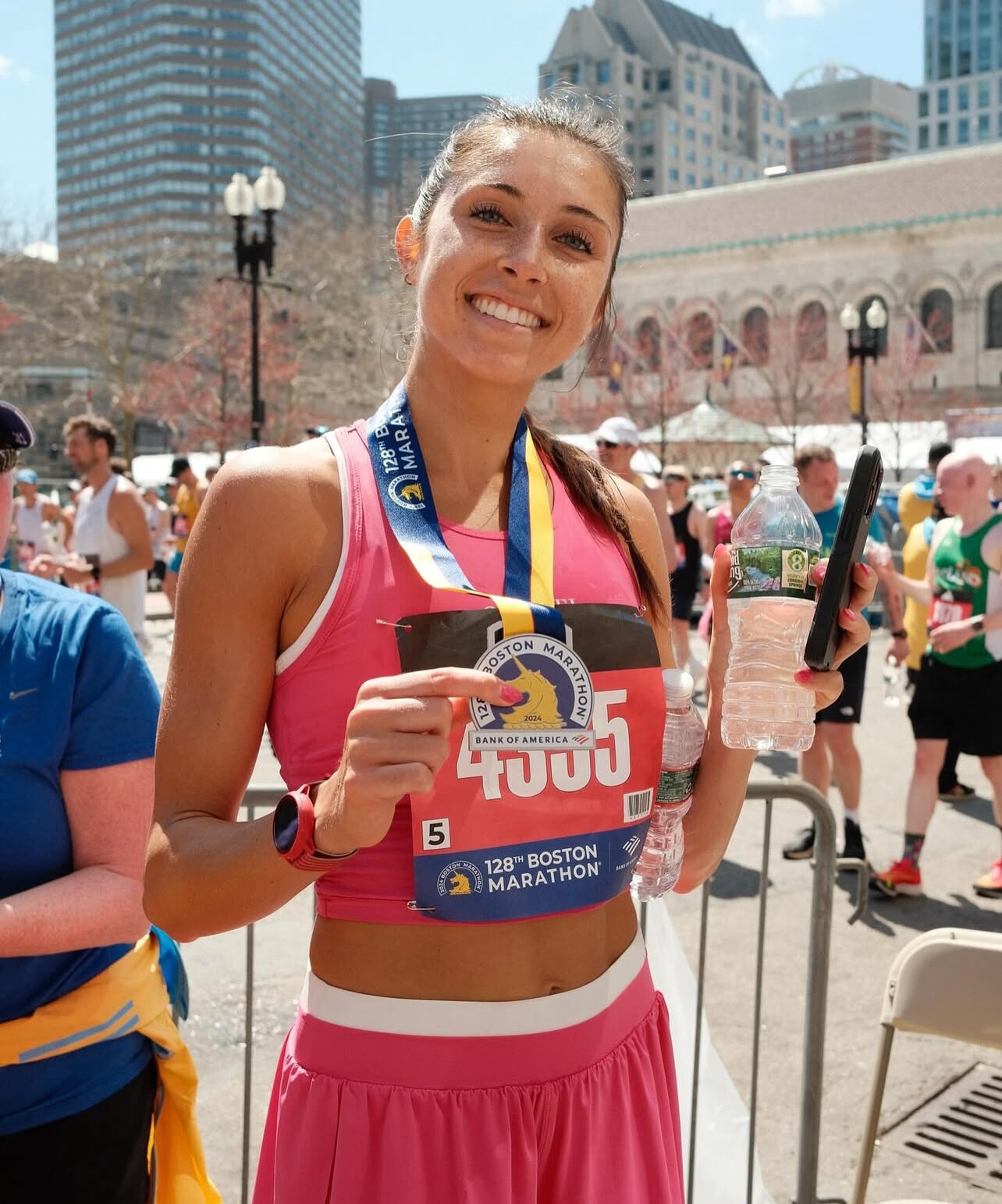
The American field is deep, with contenders including Sara Hall, Keira D’Amato, Emma Bates, and former champion Des Linden. While breaking into the top three will be a challenge, a top-five finish is within reach for the top U.S. women.
Predictions & Final Thoughts
The men’s race is expected to be a battle between the experienced champions and rising American stars. If the race is fast from the start, runners like Korir and Lemma may have the edge. However, if it becomes a strategic affair, Mantz and Young could position themselves for a breakthrough performance.
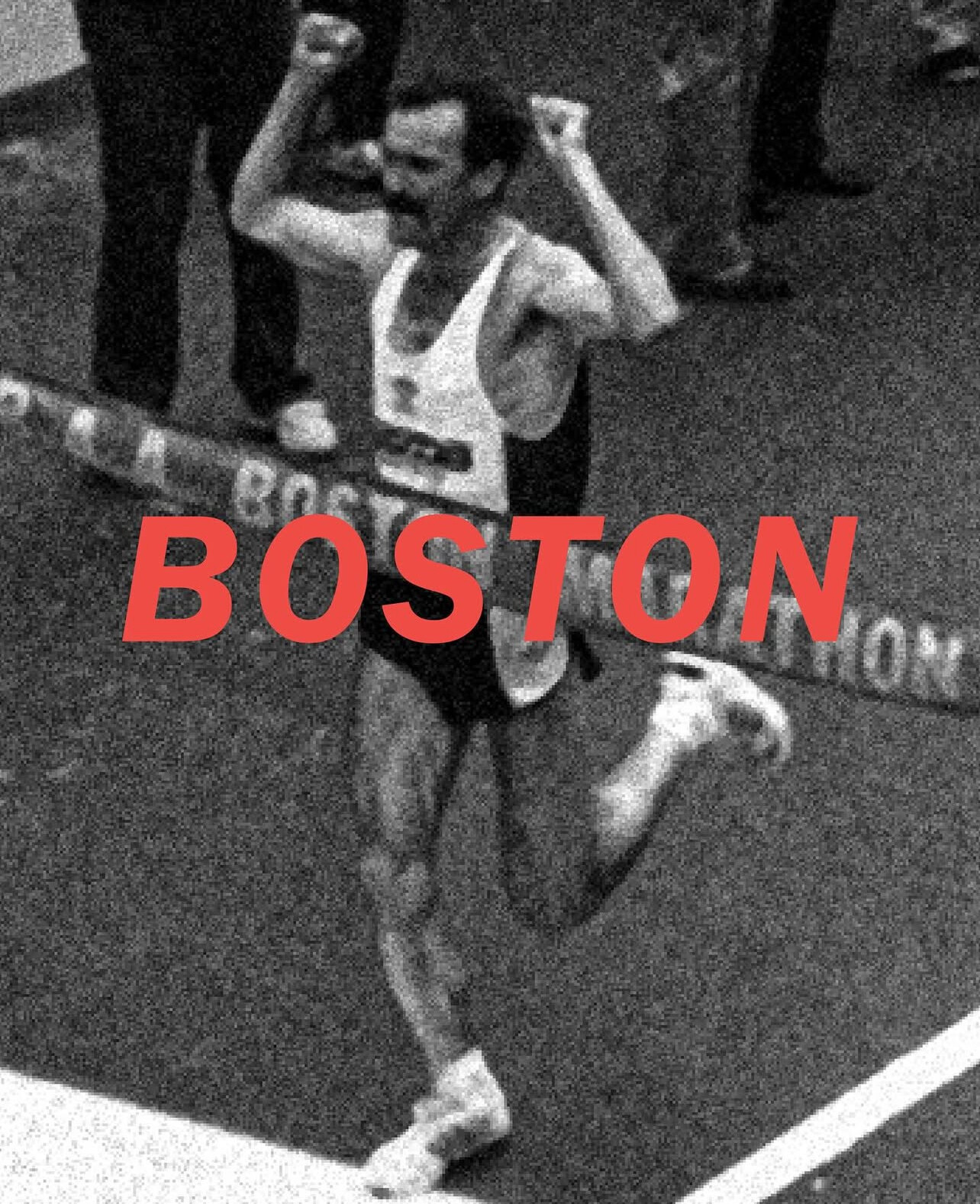
On the women’s side, Obiri’s experience and closing speed make her the favorite, but the depth of the field suggests another closely contested race. If Beriso or Yehualaw can push the pace early, it could disrupt Obiri’s plans for a late kick.
With a historic Patriots’ Day celebration and an elite field ready to compete, the 2025 Boston Marathon is shaping up to be an unforgettable race. Whether defending champions hold their ground or new winners emerge, all eyes will be on Boylston Street this April.
by Boris Baron
Login to leave a comment
Boston Marathon
Among the nation’s oldest athletic clubs, the B.A.A. was established in 1887, and, in 1896, more than half of the U.S. Olympic Team at the first modern games was composed of B.A.A. club members. The Olympic Games provided the inspiration for the first Boston Marathon, which culminated the B.A.A. Games on April 19, 1897. John J. McDermott emerged from a...
more...Hellen Obiri of Kenya will return to the Boston Marathon in April and attempt to win for the third time in a row.
In the race’s history, only four other women (Bobbi Gibb, Sara Mae Berman, Uta Pippig, and Fatuma Roba) have won three times a row, according to race organizers, who released the elite field today. The race is set for April 21.
Last year, Obiri broke the race open by covering the 24th mile in 4:41 and won in 2:22:37, 8 seconds ahead of her countrywoman Sharon Lokedi, who will also return to Boston.
Obiri, 35, trains in Boulder, Colorado, with the On Athletics Club, and she has been on the podium in five of the six marathons she has run. In addition to her two Boston titles, she won the New York City Marathon in 2023, finished second there in 2024, and won the Olympic bronze medal in Paris. (The only blemish on her marathon record was her sixth-place finish at her debut in New York in 2022.)
Obiri and Lokedi will be challenged by Amane Beriso and Yalemzerf Yehualaw of Ethiopia. Beriso has a personal best of 2:14:58 from the Valencia Marathon in 2022. She’s currently the fifth-fastest woman of all time.
Sisay Lemma of Ethiopia, the defending men’s champion, will also return to Boston. Lemma’s 2:01:48 from Valencia in 2023 makes him the fourth-fastest man in history.
Last year in Boston, Lemma got out to a large early lead, and the course record seemed almost certain to fall. But by the Newton hills, Lemma was feeling his hot early pace and slowed considerably. He held on to win in 2:06:17.
His challengers at the 2025 race will include Evans Chebet of Kenya, who has won the race twice (2022 and 2023) and was third in 2024. John Korir of Kenya, who won the 2024 Chicago Marathon in a fast 2:02:44, will also be back to race in Boston. He was fourth last year.
A Strong American Field
Many top Americans are entered into Boston. On the women’s side, they include Keira D’Amato, who briefly held the American record of 2:19:12 in 2022, and Sara Hall, who had a strong race at last fall’s Berlin Marathon, where she ran 2:23:45. She’ll turn 42 the week before the race.
D’Amato told Runner’s World in a text message that she is recovering from the injury in her left foot—stress reactions in her calcaneus and talus—that caused her to drop out of Chicago. “Hoping all the cross training has made me Boston Strong,” she wrote. “I’m building up conservatively to have a killer 2025.”
Olympians Dakotah Popehn and Des Lindenwill run (Linden for the 12th time), as will Emma Bates, the top American at Boston last year, Olympic Marathon Trials fourth-place finisher Jess McClain, and notables Sara Vaughn, Kellyn Taylor, and Lindsay Flanagan.
On the men’s side, Olympians and training partners Conner Mantz and Clayton Young, who finished eighth and ninth at the Games, respectively, will run Boston. They’ll be joined by CJ Albertson, who runs several fast marathons each year (five in 2024, including his PR of 2:08:17 in Chicago) and Zach Panning, who was fifth at the Olympic Marathon Trials.
by Runner’s World
Login to leave a comment
Boston Marathon
Among the nation’s oldest athletic clubs, the B.A.A. was established in 1887, and, in 1896, more than half of the U.S. Olympic Team at the first modern games was composed of B.A.A. club members. The Olympic Games provided the inspiration for the first Boston Marathon, which culminated the B.A.A. Games on April 19, 1897. John J. McDermott emerged from a...
more...Legese and Chepngetich lead Chicago Marathon fields
Ruth Chepngetich heads to the Bank of America Chicago Marathon on the hunt for a hat trick, while Birhanu Legese is the fastest in the men’s field for the World Athletics Platinum Label road race on Sunday (13).
The women’s race features a clash between Chepngetich, her Kenyan compatriot Joyciline Jepkosgei and Ethiopia’s Sutume Kebede – three sub-2:17 runners who form part of a field that includes another six women to have dipped under 2:20.
Chepngetich, the 2019 world marathon champion, won in Chicago in 2021 and 2022, and followed that with a runner-up finish to Sifan Hassan last year. She clocked 2:14:18 on that occasion, while her PB of 2:14:18 set in Chicago in 2022 makes her the fourth fastest women’s marathon runner in history.
She ran 2:24:36 for her most recent marathon, in London in April, and placed ninth, but then clocked 1:05:58 to win the 21k Buenos Aires half marathon in August.
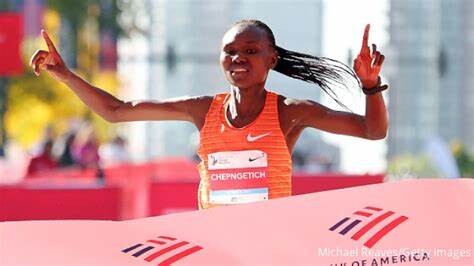
Jepkosgei, who won the London Marathon in 2021 and New York City Marathon in 2019, finished fourth in Chicago last year in 2:17:23.
She improved by one place when returning to marathon action in London in April, setting a PB of 2:16:24.
It’s Kebede who leads this season’s top list, thanks to the PB of 2:15:55 she set to win the Tokyo Marathon in March. That puts her at No.8 all time and she will be hoping to make the most of the fast course in Chicago.
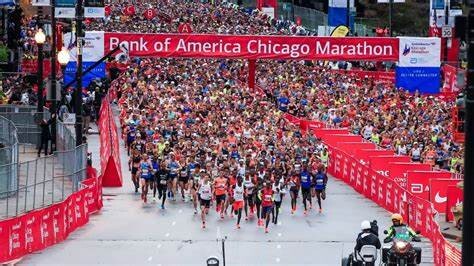
“After seeing what my teammate Kelvin Kiptum did last year, I want to come to Chicago to do something great,” said Kebede, who finished 15th in last year’s race.
Kiptum, who was part of Kebede’s training group, died in a road traffic accident in February, just four months after he set his world marathon record of 2:00:35 in Chicago. This year, the event will honour Kiptum’s legacy with a moment of silence at the start line.
Joining Chepngetich, Jepkosgei and Kebede on that start line will be three more women with PBs under 2:18 – Ethiopia’s Degitu Azimeraw, Ashete Bekere and Hiwot Gebrekidan – plus Kenya’s Irine Cheptai, who ran 2:18:22 in Hamburg in April.
The field also features the second and third fastest ever US women’s marathon runners, Keira D’Amato and Betsy Saina, who have also dipped under 2:20. They are joined in this competitive field by their compatriots Sara Hall and Emma Bates.
Ethiopia’s Legese leads the men’s field with the PB of 2:02:48 he ran in Berlin in 2019. That performance puts him sixth on the men’s world marathon all-time list but since then his highest marathon finish has been a third place, achieved in Rotterdam with a 2:05:16 run in April.
The two-time Tokyo Marathon champion will want to return to winning ways when he heads back to Chicago, where he placed 10th when making his World Marathon Majors debut in 2018, but he faces tough opposition.
Six other men in the field have PBs faster than 2:06, including Kenya’s Amos Kipruto, Vincent Ngetich and John Korir, and Ethiopia’s Dawit Wolde, Amedework Walelegn and Mohamed Esa.
Kipruto, the 2019 world bronze medallist, and Ngetich have matching PBs of 2:03:13. Kipruto won the London Marathon in 2022 and trains with Benson Kipruto, who won that year’s Chicago Marathon, while Ngetich was second in the Berlin Marathon last year, five places ahead of Kipruto. He was also third at this year’s Tokyo Marathon.
Korir ran his PB of 2:05:01 when finishing third in Chicago in 2022, while Wolde ran 2:03:48 in Valencia last year, Esa has a best of 2:05:05 from Amsterdam in 2022 and Walelegn clocked 2:04:50 in Rotterdam in April, finishing runner-up – one place ahead of Legese.
Looking to join them at the front of the field will be Kenya’s Daniel Ebenyo, the world 10,000m and half marathon silver medallist who makes his marathon debut. The 29-year-old ran a 59:30 half marathon in Berlin in April, 26 seconds off his PB set in Manama in 2022.
Ethiopia’s Jemal Yimer Mekonnen, who finished fourth in the half marathon at last year’s World Road Running Championships behind runner-up Ebenyo, is back in marathon action after his win in Seoul in March.
Among the athletes racing on home soil are USA’s Zach Panning, CJ Albertson and Brian Shrader.
Elite fields
WomenRuth Chepngetich (KEN) 2:14:18Sutume Kebede (ETH) 2:15:55Joyciline Jepkosgei (KEN) 2:16:24Degitu Azimeraw (ETH) 2:17:58Ashete Bekere (ETH) 2:17:58Hiwot Gebrekidan (ETH) 2:17:59Irine Cheptai (KEN) 2:18:22Keira D'Amato (USA) 2:19:12Betsy Saina (USA) 2:19:17Sara Hall (USA) 2:20:32Emma Bates (USA) 2:22:10Buze Diriba (ETH) 2:23:11Sara Vaughn (USA) 2:23:24Susanna Sullivan (USA) 2:24:27Gabi Rooker (USA) 2:24:35Lindsay Flanagan (USA) 2:24:43Stacey Ndiwa (KEN) 2:25:29 Lauren Hagans (USA) 2:25:56Annie Frisbie (USA) 2:26:18Jackie Gaughan (USA) 2:27:08Dominique Scott (RSA) 2:27:31Diane Nukuri (USA) 2:27:50Makena Morley (USA) 2:30:25Anne Marie Blaney (USA) 2:30:43Amy Davis-Green (USA) 2:33:09Aubrey Frentheway (USA) debut
MenBirhanu Legese (ETH) 2:02:48Amos Kipruto (KEN) 2:03:13Vincent Ngetich (KEN) 2:03:13Dawit Wolde (ETH) 2:03:48Amedework Walelegn (ETH) 2:04:50John Korir (KEN) 2:05:01Mohamed Esa (ETH) 2:05:05Jemal Yimer (ETH) 2:06:08Kyohei Hosoya (JPN) 2:06:35Toshiki Sadakata (JPN) 2:07:05Tatsuya Maruyama (JPN) 2:07:50Yuichi Yasui (JPN) 2:08:48Jorge Castelblanco (PAN) 2:09:24Zach Panning (USA) 2:09:28Brian Shrader (USA) 2:09:46CJ Albertson (USA) 2:09:53Tomoki Yoshioka (JPN) 2:10:03Reed Fischer (USA) 2:10:34Nathan Martin (USA) 2:10:45Colin Mickow (USA) 2:11:22Kevin Salvano (USA) 2:11:26Jacob Thomson (USA) 2:11:40Turner Wiley (USA) 2:11:59Shadrack Kipchirchir (USA) 2:13:02JP Flavin (USA) 2:13:27Charlie Sweeney (USA) 2:13:41Ben Kendell (USA) 2:15:49Phil Parrot-Migas (CAN) 2:15:53Aaron Gruen (USA) 2:15:56Daniel Ebenyo (KEN) debutPeter Lynch (IRL) debutAlex Maier (USA) debutAlex Masai (USA) debut
by World athletics
Login to leave a comment
Bank of America Chicago
Running the Bank of America Chicago Marathon is the pinnacle of achievement for elite athletes and everyday runners alike. On race day, runners from all 50 states and more than 100 countries will set out to accomplish a personal dream by reaching the finish line in Grant Park. The Bank of America Chicago Marathon is known for its flat and...
more...Emma Bates will return for the 2024 Bank of America Chicago Marathon
American marathoner Emma Bates will return for the 2024 Bank of America Chicago Marathon after finishing 13th in last year's race.
Bates finished 13th in last year's Chicago Marathon, running 2:25:04. However, she partially tore her plantar fascia in the process of that race, setting her back and forcing her to withdraw from the U.S. Olympic Trials in February.
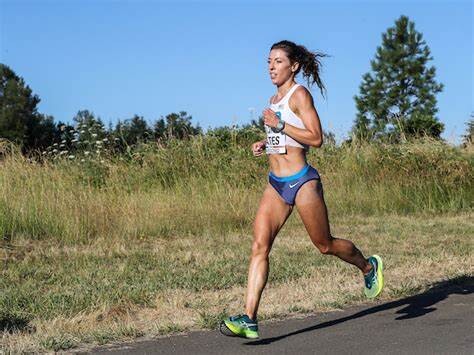
Bates' bounceback from her plantar fascia tear has been solid. She's run one race since then, finishing 12th in the 2024 Boston Marathon in April. She ran 2:27:14 and finished as the top American in the race.
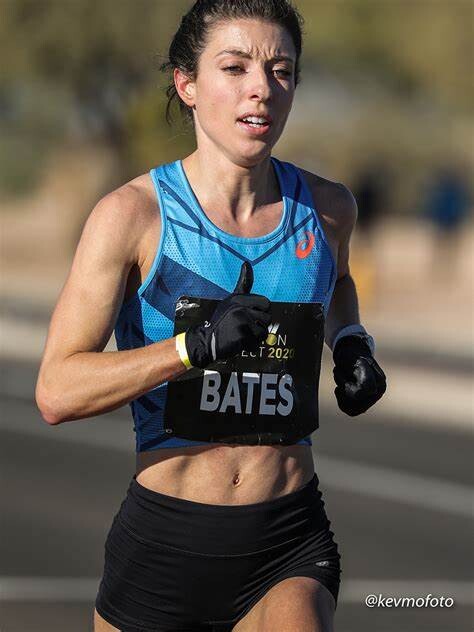
This will be Bates' fourth Chicago Marathon of her career. She finished fourth in 2019, running 2:28:19. In 2021, she finished second, running 2:24:20.
Her marathon best comes from the 2023 Boston Marathon, where she ran 2:22:10; Bates is the second-fastest woman in Boston Marathon history.
by NBC Sports Chicago Staff
Login to leave a comment
Bank of America Chicago
Running the Bank of America Chicago Marathon is the pinnacle of achievement for elite athletes and everyday runners alike. On race day, runners from all 50 states and more than 100 countries will set out to accomplish a personal dream by reaching the finish line in Grant Park. The Bank of America Chicago Marathon is known for its flat and...
more...Could the women's American marathon record fall at this year's Chicago Marathon?
The 2024 Bank of America Chicago Marathon on Oct. 13 poses an exciting opportunity for elite runners to capture record-breaking times -- and this year is no different. Could a women's record fall during the race?
The lineup, which was released earlier this summer, is highlighted by two of the "10 fastest women of all time" and the the second and third fastest American women of all time.
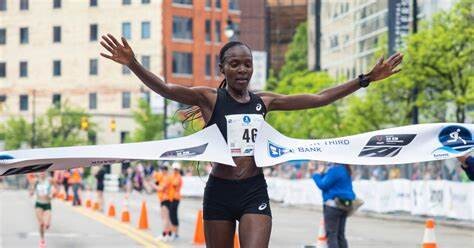
“We are accustomed to making history at the Bank of America Chicago Marathon,” Executive Race Director Carey Pinkowski said in a statement. “With some of the fastest athletes in the world joining us this fall, we are hopeful to build on the tradition of great performances this year.”
For the Americans, Keira D'Amato and Betsy Saina headline the country's best.
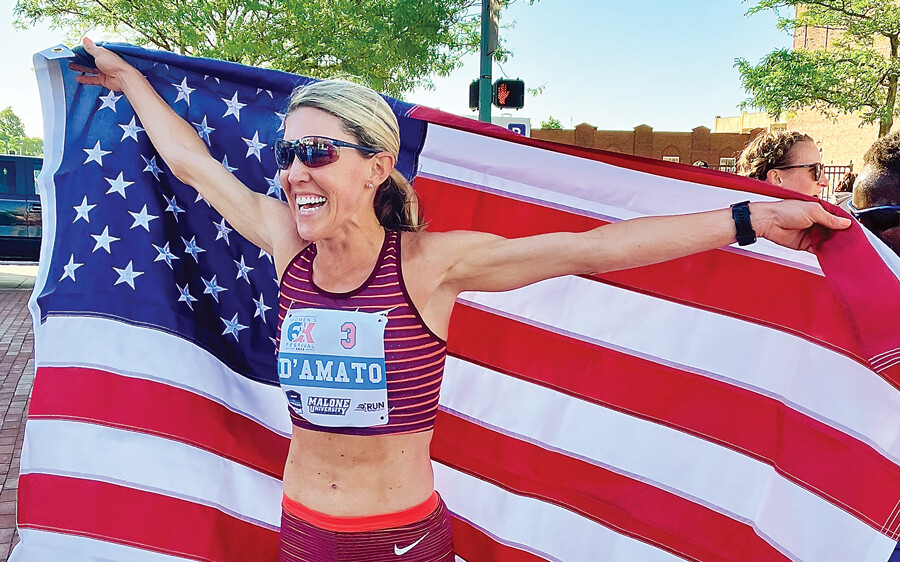
D'Amato, the former American marathon record holder, will return to the starting line after being part of the broadcast team for the past two years.
“I have a special history with the Chicago Marathon,” said D’Amato who finished fourth in 2021. “The past two years I’ve run my mouth in the lead vehicle for NBC. I’m excited to get back to running my legs.”
D'Amato first broke the American marathon record in 2022 in Houston, topping a time that had stood for 16 years.
Emily Sisson broke that same record shortly after during the 2022 Chicago Marathon. D'Amato was among the long line of legendary female runners celebrating Sisson at the Chicago finish line that year.
Saina, who placed fifth in this year’s Tokyo Marathon, will look to record her first Chicago finish after dropping out of the race in 2019 due to illness. She's run the third-fastest marathon time of any American woman, one spot behind D'Amato.
Sara Hall and Emma Bates are also in the field for the Americans. Hall's best time of 2:20:32 comes from Chandler in 2020. Bates ran her best time in 2022 at the Boston Marathon with a 2:22:10 finish.
Among the most notable names at the starting line will be Sutume Kebede, of Ethiopia, who holds the fastest marathon in the women's field and whose finish at the 2024 Tokyo Marathon made her the eighth fastest of all time.
“I am extremely happy to come back to Chicago and run on a course that has proven to be very fast,” Kebede, who had a disappointing finish in the 2023 Bank of America Chicago Marathon, said in a statement. “After seeing what my teammate Kelvin Kiptum did last year, I want to come to Chicago to do something great.”
Kenya's Ruth Chepngetich will also return to the start line in October. She won the race in both 2021 and 2022 while finishing runner-up during last year's 2023 race. Her 2:14:18 from the 2022 Chicago Marathon stands as the fourth-fastest time by a woman in history.
Here is the lineup for the women's elite division.
Bank of America Chicago Marathon Professional Field – Women’s Open Division
The Chicago Marathon is not immune to seeing record-breaking times.
Kenya's Kelvin Kiptum obliterated the men's marathon world record at the 2023 Chicago Marathon, running it in 2 hours and 35 seconds. He overcame Eliud Kipchoge's previous record by 30 seconds with his time. Tragically, Kiptum later died shortly after in a car accident in February. He was 24.
At the 2022 Chicago Marathon, Emily Sisson defeated the women's American marathon record in 2 hours, 18 minutes and 29 seconds. She finished second place in the race to Kenya's Ruth Chepngetich, who ran 2:14:18; the second-fastest marathon time by a woman in history.
Let's not also forget Joan Benoit Samuelson broke the women's American marathon record in 1985 with a time of 2:21:21. The time still stands as the seventh-fastest time by an American woman today.
Three of the four fastest marathon times in women's history were run at the Chicago Marathon. Will spectators see another on Oct. 13?
by NBC Sports Chicago Staff
Login to leave a comment
Bank of America Chicago
Running the Bank of America Chicago Marathon is the pinnacle of achievement for elite athletes and everyday runners alike. On race day, runners from all 50 states and more than 100 countries will set out to accomplish a personal dream by reaching the finish line in Grant Park. The Bank of America Chicago Marathon is known for its flat and...
more...Kenya’s John Korir claims dominant men’s win at Falmouth Road Race, while Fentaye Azale takes women’s in sprint finish
Kenya’s John Korir flirted with the course record at the Falmouth Road Race on Sunday, dominating the men’s field to win by 51 seconds in 31 minutes, 15 seconds over the seven miles.
Korir took control early and never relented, opening a 23-second gap by the 5K mark. That lead stretched to over a minute through 10K, and the field closed ever so slightly as Korir missed the course record, set last year by Wesley Kiptoo, by just seven seconds. Korir ran the third-fastest winning time in the race’s 52-year history.
“I was confident. I knew I was going to win because I am in very good shape,” said Korir. “I was feeling good, so I decided to go and see how it went.”
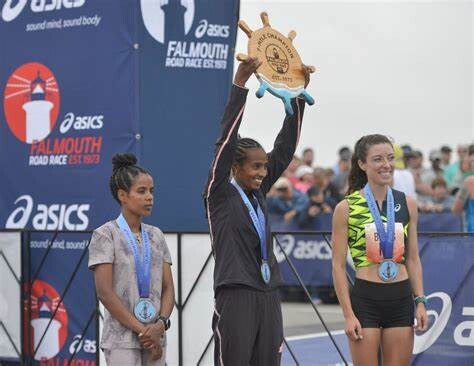
It was an entirely different race on the women’s side, where Ethiopia’s Fentaye Azale needed every yard from Woods Hole to Falmouth Heights to put away the competition. In the end, Azale edged countrywoman Melknat Wudu by just a second with a winning 36:10. The two came flying down the final hill side by side, but Azale had an extra gear in the final steps.
Emma Bates, the top American woman at back-to-back Boston Marathons, was just six seconds behind the dueling Ethiopians. Another American, Emma Grace Hurley, led a trio across the line just behind Bates.
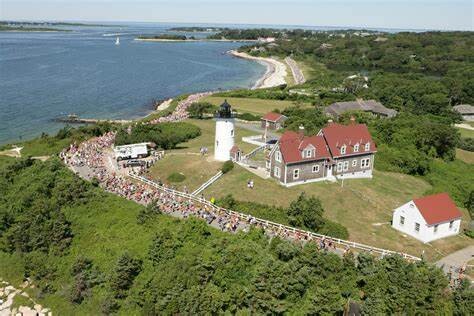
“It’s always so welcoming here,” said Bates. “People were shouting ‘Emma’ the entire way and I was running with Emma Grace Hurley, so both of us were just soaking up the energy from the crowd.”
Morgan Beadlescomb was the top American on the men’s side, finishing fifth, 66 seconds behind Korir. Three-time champion Ben Flanagan of Canada was seventh.
More than 11,000 runners participated in both races this year.
by y Amin Touri
Login to leave a comment
Falmouth Road Race
The Falmouth Road Race was established in 1973 and has become one of the premier running events of the summer season. Each year the race draws an international field of Olympians, elite runners and recreational runners out to enjoy the scenic 7-mile seaside course. The non-profit Falmouth Road Race organization is dedicated to promoting health and fitness for all in...
more...Ruth Chepng’etich, Joyciline Jepkosgei confirmed for 2024 Chicago Marathon
Ethiopians will challenge Kenyan stars Ruth Chepng’etich and Joyciline Jepkosgei at the 2024 Chicago Marathon, promising a thrilling race.
Two of Kenya's marathon luminaries Ruth Chepng’etich and Joyciline Jepkosgei have been confirmed to compete in the 2024 Chicago Marathon on October 13.
This news comes with a mix of excitement and high expectations as they prepare to face formidable Ethiopian opposition in a race that promises thrilling competition.
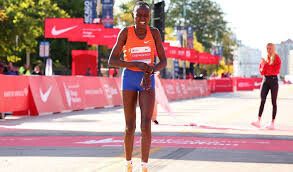
Chepng’etich, a two-time Chicago Marathon winner, returns to the Windy City with hopes of reclaiming her title.
She previously stunned the running world by clocking a phenomenal 2:14:18 in 2021, securing her a spot as the fourth fastest woman in marathon history.
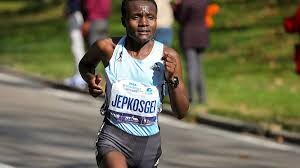
Despite her non-selection for the Paris Olympics, Chepng’etich's record speaks volumes about her resilience and prowess.
Her participation in Chicago marks a significant step as she aims for a hat-trick of wins in a city that has witnessed some of her greatest triumphs.
On the other hand, Joyciline Jepkosgei, the 2019 New York City Marathon champion and a seasoned competitor with a personal best of 2:16:24, is no stranger to the pressures of big city marathons.
With victories in both New York and London, Jepkosgei's strategic racing and endurance will be key assets as she navigates the Chicago course alongside Chepng’etich.
However, the Kenyan duo’s ambitions will be tested by strong Ethiopian contenders, including Sutume Kebede the reigning Tokyo Marathon champion with an impressive personal best of 2:15:55.
Kebede's entry adds a layer of intensity to the race, setting the stage for a gripping showdown among some of the world’s elite marathoners.
Further adding to the international flavor of this year's Chicago Marathon are other Kenyan runners like Mary Ngugi-Cooper, who posted a 2:20:22 at the 2022 London Marathon, and Stacey Ndiwa, who recently finished with a time of 2:25:29 in Los Angeles.
The American contingent is led by Keira D’Amato, who has a personal best of 2:19:12 and is transitioning from her 10th place finish in the 10,000m at the U.S. Olympic trials to her first marathon of the season.
Sara Hall and Emma Bates who have shown strong performances in past Chicago Marathons will also return aiming to capitalize on their familiarity with the course and local support.
by Festus Chuma
Login to leave a comment
Bank of America Chicago
Running the Bank of America Chicago Marathon is the pinnacle of achievement for elite athletes and everyday runners alike. On race day, runners from all 50 states and more than 100 countries will set out to accomplish a personal dream by reaching the finish line in Grant Park. The Bank of America Chicago Marathon is known for its flat and...
more...How to Watch the 2024 Boston Marathon
The world’s oldest annual marathon is back for its 128th edition.
On Monday, April 15, the World Marathon Majors will return stateside to the 2024 Boston Marathon. In its 128th year, the world’s oldest annual marathon features must-see storylines, including the return of defending women’s champion Hellen Obiri and two-time men’s winner Evans Chebet.
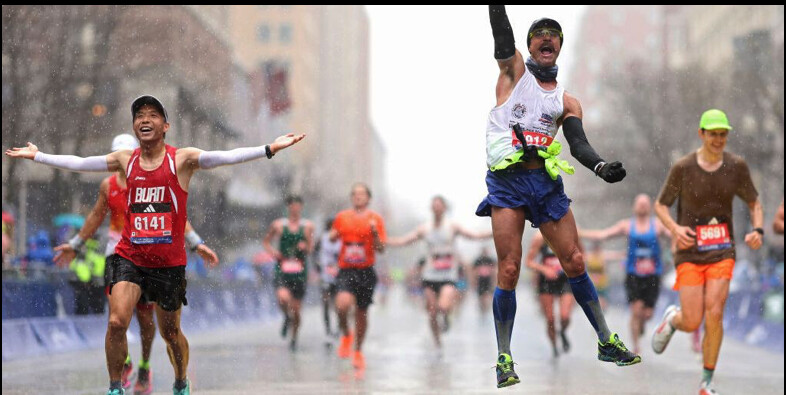
The point-to-point race is scheduled to begin in Hopkinton, Massachusetts, and ends in the Back Bay neighborhood of Boston. The weather forecast for Patriots’ Day is showing slightly warmer temperatures than average in the city. The conditions could make race day more challenging on a course famous for its hills (we ranked Boston as the second-toughest of the six World Marathon Majors).
Here’s everything you need to know about this year’s race.
How to watch the 2024 Boston Marathon
ESPN2 will broadcast the Boston Marathon from 8:30 a.m. ET to 12:30 p.m. ET. You can also live stream the race with an ESPN+ subscription, which costs $10.99 a month.
For those tuning in from Boston, live coverage will be provided by WCVB beginning at 4:00 a.m. ET and lasting throughout the day.
Boston Marathon start times (ET)
Men’s wheelchair division—9:02 a.m.
Women’s wheelchair division—9:05 a.m.
Men’s elite race—9:37 a.m.
Women’s elite race—9:47 a.m.
Para athletics division—9:50 a.m.
First wave—10 a.m.
Second wave—10:25 a.m.
Third wave—10:50 a.m.
Fourth wave—11:15 a.m.
Race preview
This year’s elite race comes with added high stakes for many international athletes. Countries that don’t host Olympic Trials for the marathon are currently in the national team selection process. A standout performance in Boston could be a game-changer for athletes looking to represent their country in Paris this summer.
Women’s race
On the women’s side, Boston podium contenders Hellen Obiri and Sharon Lokedi were included in the shortlist of marathoners under national team consideration by Athletics Kenya.
Obiri, 34, is set to return to Boston after a stellar 2023 campaign. Last year, the On Athletics Club runner won the Boston Marathon and the New York City Marathon. A former track standout with two world championship titles, Obiri aims to continue her winning streak on Monday.
Lokedi, 30, is looking to top the podium at a key moment in her career. The University of Kansas graduate is set to run her first 26.2 since finishing third at the New York City Marathon last fall—a race she won in her marathon debut two years ago.
Kenya will also be represented by 2022 World Championship silver medalist Judith Korir and two-time Boston Marathon champion Edna Kiplagat, among other standouts.
The Ethiopian contingent should be strong as well. Ababel Yeshaneh finished second at Boston in 2022 and fourth in 2023. Plus, 2:17 marathoner Tadu Teshome will be one to watch in her Boston debut.
In the weeks after the U.S. Olympic Marathon Trials in February, more Americans were added to the field. Sara Hall, 40, enters the race after finishing fifth in a new American masters record (2:26:06) at the Trials in Orlando, Florida. 2015 Boston champion Caroline Rotich, 39, joins the field after placing sixth at the Trials. Jenny Simpson, 37, also entered after dropping out in her marathon debut in Orlando. And keep an eye out for 2018 Boston Marathon champion Des Linden, 40, and Emma Bates, 31, who finished fifth in Boston last year.
Men’s race
Evans Chebet is looking for a hat trick. Last year, the Kenyan became the first athlete to repeat as men’s champion since Robert Kipkoech Cheruiyot won three in a row between 2006 and 2008. In the process, the 35-year-old took down two-time Olympic champion Eliud Kipchoge in Boston.
His biggest challenger will likely be Sisay Lemma of Ethiopia, who is returning after a breakthrough season in 2023. In December, Lemma, 33, won the Valencia Marathon in 2:01:48, making him the fourth-fastest marathoner in history. Lemma also won the Runkara International Half Marathon in 1:01:09, a new personal best.
Gabriel Geay, last year’s Boston runner-up, is returning to the field on Monday. The 27-year-old from Tanzania is coming off a fifth-place finish at the Valencia Marathon.
Other runners to watch include 2023 New York City runner-up Albert Korir; Shura Kitata, who placed third in New York last year; and Zouhair Talbi, who finished fifth in Boston last year.
The American men’s field also grew after the Olympic Trials with the addition of Elkanah Kibet and Sam Chelanga. Kibet finished fourth in Orlando in a 2:10:02 personal best, and after dropping out after mile 18 of the Trials, Chelanga will aim for redemption in Boston. They join 50K world record-holder CJ Albertson and the BAA’s Matt McDonald in the elite race.
by Runner’s World
Login to leave a comment
Sharon Lokedi: How the Kenyan marathon star is sketching her strategy for victory at Boston Marathon
Sharon Lokedi is aiming for victory at the Boston Marathon where she will be facing elite rivals.
2022 New York City Marathon champion Sharon Lokedi has rapidly ascended to the pinnacle of long-distance running with her sights firmly set on the 128th Boston Marathon.
Amidst a field brimming with talent, Lokedi's journey from her marathon debut to becoming a favorite in Boston illustrates not only her athletic prowess but also her unique approach to managing the pressures of elite competition.
"Before I get to a race, there’s so much tension and anxiety. I try to remain present," Lokedi shared as per Run.
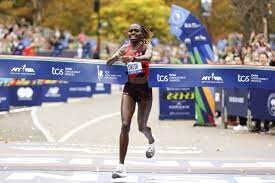
This practice, recommended by her sports psychologist in July 2023, has helped her maintain calm and focus, vital for someone whose career in running has been anything but typical.
Surprising herself and the athletic world, she clinched victory at her first marathon attempt in New York in 2022 with a time of 2:23:23, joining the ranks of debut winners in the storied race.
Despite facing an injury that sidelined her from the Boston Marathon last April she returned to the global marathon scene last November, securing a third-place finish in New York, a testament to her resilience and tenacity.
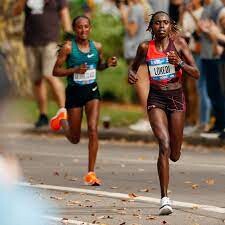
The 30-year-old Kenyan runner's story is a blend of innate talent and serendipity having never envisioned a professional career in athletics.
From her humble beginnings running at age 12 to training alongside Olympic champions in Kaptagat, Kenya, Lokedi's ascent in the sport is, by her own admission, "a miracle."
Training at altitudes close to 8,000 feet, Lokedi has pushed her limits, clocking upwards of 140 miles a week in preparation for Boston.
Under the guidance of her coach Haas, she has emphasized hill training, a crucial component for tackling the notoriously challenging Boston course.
"I think she’ll be in the mix," said Haas, highlighting Lokedi's diligent preparation and positive mindset.
Lokedi's connection to the running community, both in Kenya and her second home in Flagstaff, Arizona, has been a source of strength and inspiration.
The camaraderie she shares with competitors, including close friend and fellow Kenyan Hellen Obiri underscores a spirit of mutual respect and friendship that transcends rivalry.
"Racing with Sharon, it’s really good for me," Obiri remarked.
The Boston Marathon promises a historic showdown in the women's elite field, featuring luminaries such as Obiri, Tadu Teshome, Hiwot Gebremariam, and Edna Kiplagat, alongside promising American contenders like Emma Bates and Sara Hall.
"Sharon has been my good friend since 2019. She’s a lovely girl," Obiri added, highlighting the deep bonds formed between athletes at the highest levels of competition.
For Lokedi and Obiri, the Boston Marathon is not just another race, it is an opportunity to showcase their skills, support each other, and celebrate their friendship, irrespective of the outcome.
As she prepares to toe the line in Boston, her message is clear: "I know I’m strong. I want to come into the race knowing that anything is possible."
by Festus Chuma
Login to leave a comment
Boston Marathon
Among the nation’s oldest athletic clubs, the B.A.A. was established in 1887, and, in 1896, more than half of the U.S. Olympic Team at the first modern games was composed of B.A.A. club members. The Olympic Games provided the inspiration for the first Boston Marathon, which culminated the B.A.A. Games on April 19, 1897. John J. McDermott emerged from a...
more...Molly Seidel withdraws from Olympic Marathon Trials due to injury
Tokyo Olympic bronze medalist Molly Seidel announced she is withdrawing from Saturday’s U.S. marathon trials for the Paris Games due to a knee injury.
Seidel, 29, said in a video posted Thursday that she suffered a knee injury a month ago, couldn’t run on it and got an MRI that revealed a broken patella and a partially torn patella tendon.
“I have done everything in my power over this last month to try and get myself to the (starting) line,” she said. “I’ve had just the most incredible physios and doctors doing everything in their power to help me. I’ve been cross-training my (butt) off, but ultimately I got to this week, and my knee had not healed up enough, and I knew that I could not race a marathon hard on it in its current state without really, really injuring myself.”
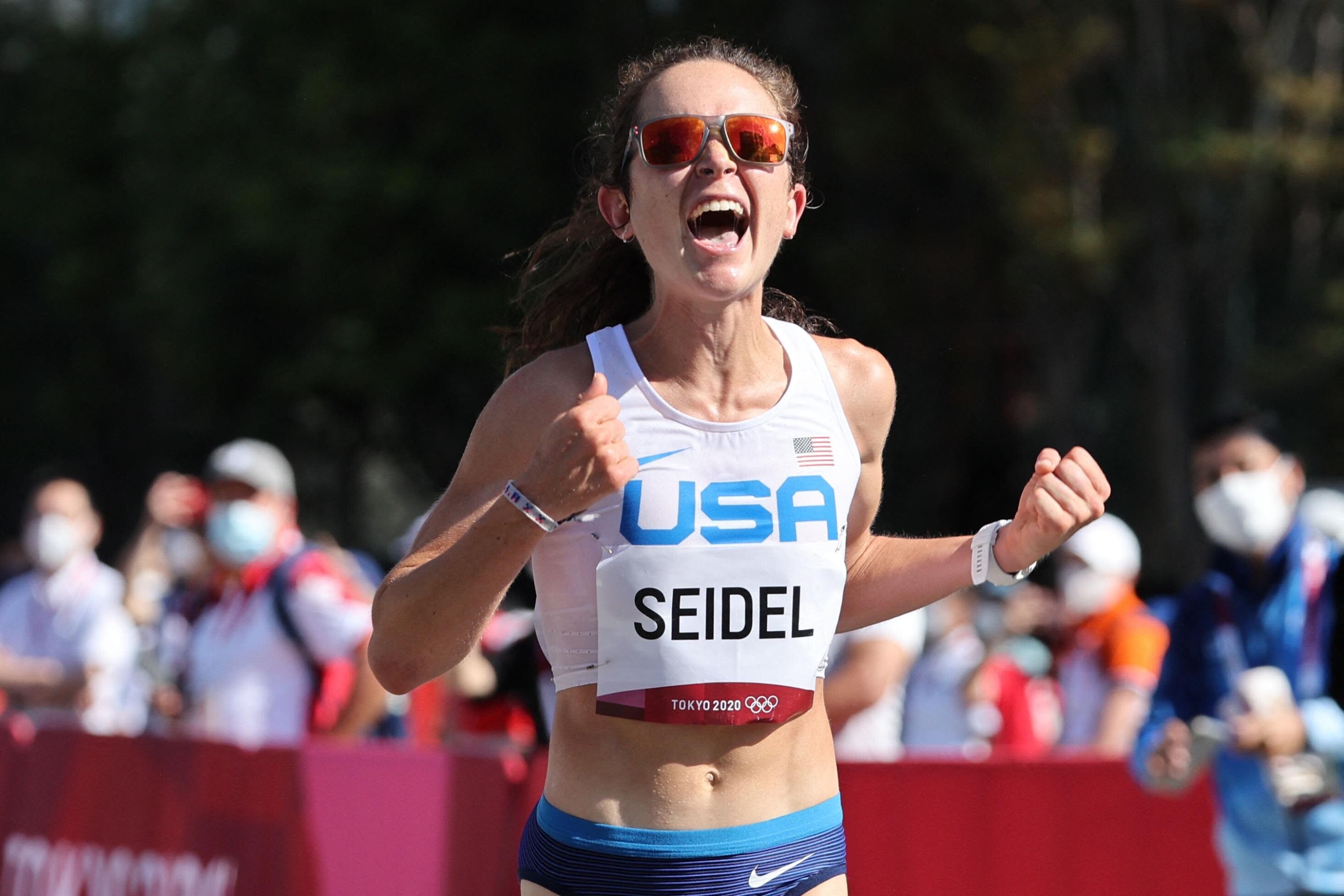
The trials are Saturday at 10 a.m. ET from Orlando, airing live on Peacock with coverage on NBC, NBCSports.com and the NBC Sports app at noon.
Four years ago, Seidel placed second in the trials in her marathon debut to make the three-woman Olympic team.
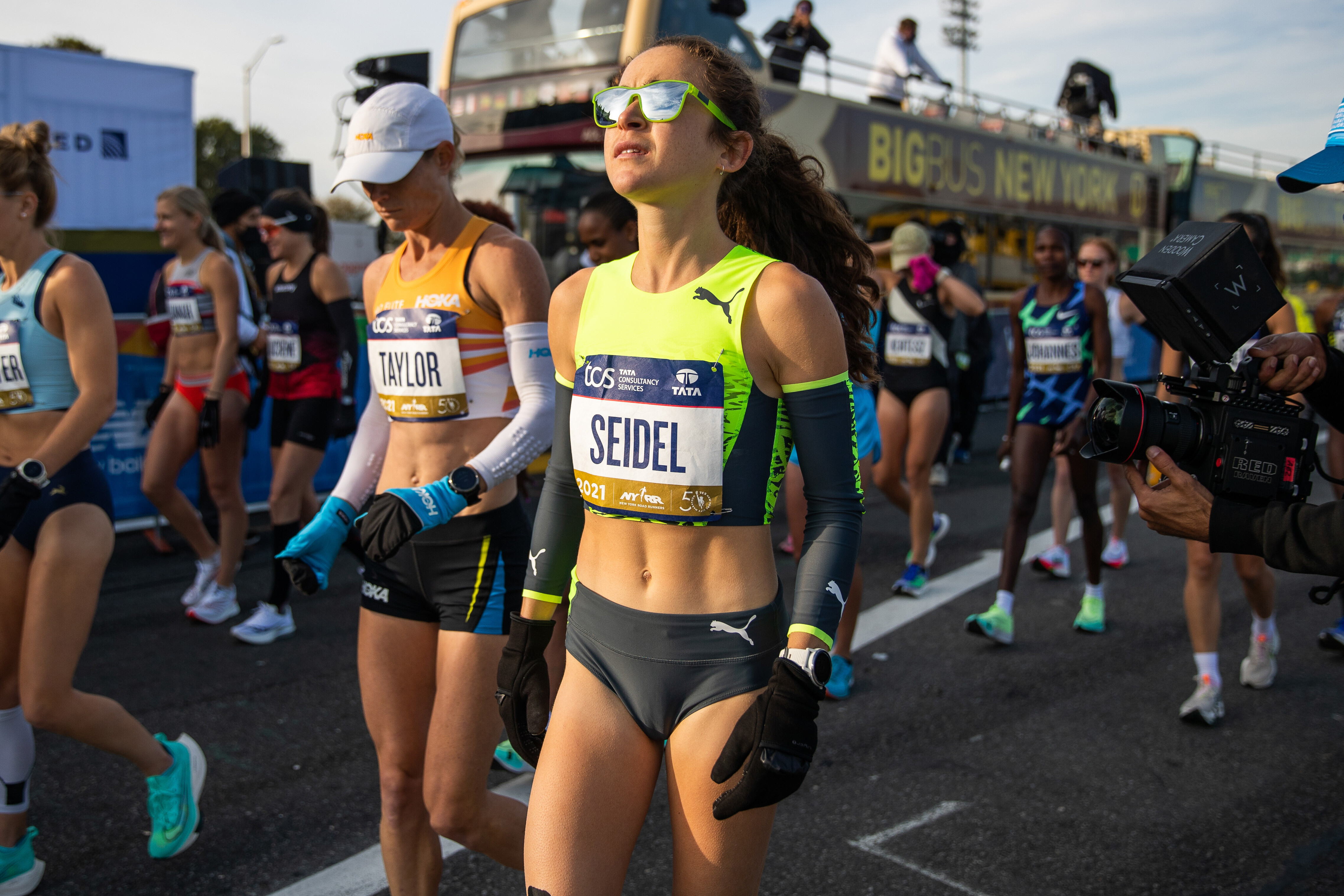
After the COVID-19 pandemic postponed the Tokyo Games by one year, Seidel finished third in the Olympic marathon held in Sapporo.
She became the third U.S. woman to win a marathon medal after Joan Benoit Samuelson, who won the first Olympic women’s marathon in 1984, and Deena Kastor, the 2004 bronze medalist.
After Tokyo, Seidel dealt with a hip injury and anemia, plus took time to focus on mental health after an eating disorder relapse.
Then last Oct. 8, Seidel finished a 26.2-mile race for the first time in two years. She was the second-fastest American woman at the Chicago Marathon, running a personal best and re-establishing herself as a prime candidate to make the Paris team of three at trials.
Seidel is the second contender to withdraw in the lead-up to trials.
Emma Bates, the third-fastest U.S. female marathoner of 2023, bowed out Jan. 7, saying then, “There’s just not enough time to be where I need to be.”
The field still includes three of the four fastest American women in history — American record holder Emily Sisson, former American record holder Keira D’Amato and Sara Hall, No. 4 on the all-time list.
Plus, former Iowa State teammates Betsy Saina (the fastest American in 2023) and Aliphine Tuliamuk (Tokyo Olympic Trials winner).
by Olympic Talk
Login to leave a comment
2028 US Olympic Trials Marathon
Most countries around the world use a selection committee to choose their Olympic Team Members, but not the USA. Prior to 1968, a series of races were used to select the USA Olympic Marathon team, but beginning in 1968 the format was changed to a single race on a single day with the top three finishers selected to be part...
more...For Betsy Saina, the U.S. Olympic Trials Marathon Presents a Chance to Represent Her Son
For much of last year, Betsy Saina had a plan. She would race the Chicago Marathon in October, eager to run alongside Emma Bates (who placed fifth at last year’s Boston Marathon in a new personal best of 2:22:10) in pursuit of breaking Emily Sisson’s American record of 2:18:29, set the previous year at that same race.
Saina, 35, a naturalized U.S. citizen who represented Kenya in the 2016 Olympics in Rio de Janeiro—she placed fifth in the 10,000 meters 30:07.78—had reason to be confident. Last spring, she set a new personal best of 2:21:40 with her fifth-place finish at the Tokyo Marathon, which wound up being the fastest marathon by an American woman in 2023 and made her the eighth-fastest U.S. female marathoner of all-time, solidifying her position as a top U.S. Olympic marathon team contender.
The Chicago Marathon had assured Saina’s agent, Tom Broadbent, that she was in for the race. But when the elite field was announced in August, Saina learned she had not been accepted, which not only threw a wrench in her fall training plans, but made for a lot of stress as she was planning her U.S. Olympic Marathon Team Trials buildup.
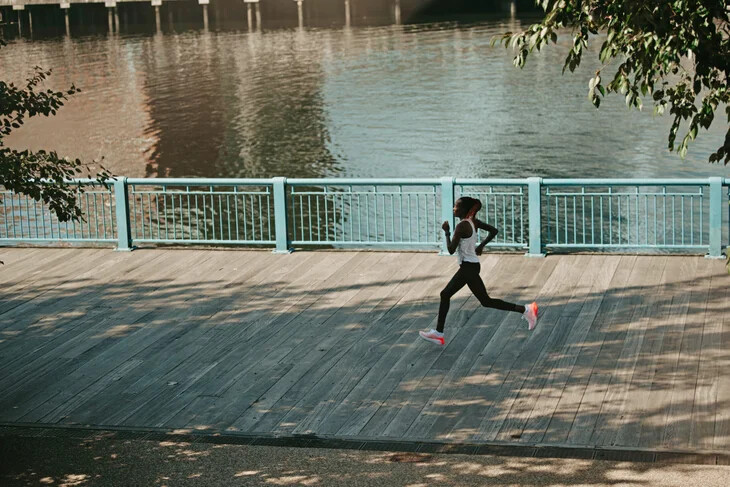
“I was shocked and spent three days looking at myself and trying to find any mistakes I made to not make the field, especially after running 2:21 in Tokyo,” Saina says. “I had never been rejected from a race before, and never got a response or an explanation as to why I didn’t make it. Being denied to run in Chicago honestly was one of the most disappointing things I’ve experienced in my career.”
Saina looked into entering the Berlin Marathon the following month, but had no such luck getting in with it being so late in the game. She was ultimately accepted into the Sydney Marathon (which shares its sponsor, ASICS, with Saina) on September 16. Unlike Chicago—with its fast, flat course that ended up having ideal racing conditions with temperatures in the 40s—Sydney has a hilly course and race-day weather was on the hotter side, with a starting temperature of 68 degrees.
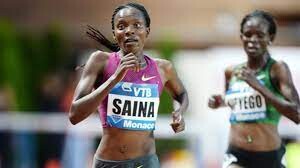
Despite the conditions, Saina proved herself once again, winning the race in 2:26:47. This sealed her confidence as she began to look ahead to the Olympic Trials in Orlando on February 3. If she’s one of the top three finishers in the women’s race in Florida, she’ll earn a spot on the U.S. team that will compete in the marathon at the Paris Olympics on August 11.
“Challenges make people strong, and running a good marathon on a harder course made me come back feeling motivated,” she says. “[Even though it wasn’t the faster time I originally wanted], it didn’t stop me from being a better version of myself.”
Transcendent Transplant
Despite her impressive performances in 2023, Saina has remained largely under the radar in terms of media coverage and fan predictions leading up to the Trials in Orlando, similarly to what fellow Kenyan-born marathoners Aliphine Tuliamuk and Sally Kipyego (both of whom made the last Olympic marathon team) experienced in 2020. The lack of attention relative to her competitors hasn’t fazed Saina, however.
“I know how to deal with pressure, having been in the sport since 2013, so as long as my training is going well, I don’t pay too much attention to what people say,” Saina says. “I’m just more excited to see many of the U.S. women [who are also] my friends, like Emily Sisson, Sara Hall, and Keira D’Amato, and to be racing so many amazing U.S. athletes for the first time.”
Saina’s result in Tokyo was only about a minute faster than her debut at the distance at the 2018 Paris Marathon, which she won in 2:22:56 (after dropping out of the 2017 Tokyo and New York City Marathons). It was also a confidence boost for Saina because it was also her first marathon since giving birth to her son, Kalya, now two, in December 2021, after previously running 2:22:43 and 2:31:51 at the 2019 Toronto Waterfront and Honolulu Marathons, respectively.
Saina—who originally came to the U.S. to attend Iowa State University where she trained alongside Tuliamuk and was a three-time individual NCAA champion and 11-time NCAA All-American—has remained in her hometown of Iten, Kenya, for the majority of the time since having her son, as her husband, Meshack Korir, is a doctor completing his postgraduate education there.
Although Saina became a U.S. citizen in late 2020 and has a home base in Colorado Springs, she made the decision to return to Kenya to have additional family support and childcare as she worked to come back from pregnancy and childbirth to prepare for the Olympic Trials, which she’ll return for just a few days before the race. Saina also keeps busy managing a couple of guesthouses, which she regularly rents out to visiting athletes and tourists. She also works with Cross World Africa, a nonprofit that sponsors underprivileged children in pursuing secondary and higher education.
“Before I came from Kenya, my family was struggling and we had to fundraise for my flight ticket to come to the U.S. Being here has changed my family in a different way—I have two sisters who are now nurses in the U.S., and my parents can now more easily fly to visit us, and while it is not where I began running, the U.S. where I began competing at such a high level,” she says. “My son also gives me so much motivation and is my inspiration. When I see him, I see beauty in myself and see myself getting better when I’m running. So I am excited both to compete and represent my son, and to hopefully wear the U.S. uniform because it has so much meaning for me.”
Back in Iten, Saina has been training in a group with personal pacemakers alongside 2019 New York City Marathon champion Joyciline Jepkosgei, which she describes as game-changing for her progress in the marathon. Both Saina and Jepkosgei, who is also the former world-record holder in the half marathon and Saina’s best friend from high school, are coached by Jepkosgei’s husband, Nicholas Koech.
“Sometimes you will train with people who don’t want to help someone else get better, but [Jepkosgei], who has run 1:04 [in the half marathon] and 2:17 [in the marathon] is unique in that she has sacrificed a lot, which I don’t think a lot of women will ever do for each other, and I don’t think I would either,” Saina says. “But she has been pushing me a lot since the first day I joined her, and I think that’s the reason I came back and I’ve had better races. I have someone to chase and it’s like competition in training, but in a good way.”
American Original
Saina returned to the U.S. twice last year, to race the USATF 25K Championships in Grand Rapids, Michigan, (where she took the win in 1:24:32 for her first U.S. title, narrowly beating D’Amato) and to be inducted into Iowa State’s Athletics Hall of Fame in September. Saina had planned to do some shorter U.S. races, including the Bolder Boulder 10K in May and the NYRR Mini 10K in June, following her national championship title in the 25K. However, she ultimately decided she couldn’t bear to be away from her son any longer.
“As a mom, when you’re away, you are so worried because you’re like, ‘How is he doing right now? How can I handle the pressure, being away from him?’” Saina says. “This year, it’s really different for me because the only race I want to travel to without Kalya is the Olympic Trials. He is growing now and getting better, so I want to travel with him afterward to compete in the USATF circuit. That’s the biggest goal for 2024, to travel with my son.”
Later this year, Saina hopes to also run the April 7 Cherry Blossom 10-Miler in Washington, D.C., the Mini 10K on June 8 in New York City, and a fast spring half marathon to pursue the current American record (which was broken yet again by Weini Kelati on January 14 in Houston), before running another marathon in the fall. In the meantime, she noted that she is especially eager to compete in one of the deepest fields ever assembled for the Trials.
Although Bates withdrew from the Trials, Saina figures to be one of the favorites in Orlando along with Sisson, Hall, Tuliamuk, D’Amato, and Seidel. However, Lindsay Flanagan (ninth in last summer’s world championships), Sara Vaughn, Susanna Sullivan, Gabriella Rooker, Dakotah Lindwurm, and Nell Rojas are all sub-2:25 marathoners, and thus top contenders, too.
“The U.S. is no longer small and non-competitive. Look at Molly Seidel. She got bronze at the Tokyo Olympics, and I remember when Amy [Cragg] was a bronze medalist at the 2017 World Championships. If you put that in perspective, it has changed even more right now compared to that time,” she says. “The competition [to make the U.S. team] is no longer as easy as the way some people [thought], and I’m super excited to be competing with a lot of solid women. There is no difference between the U.S. and other countries right now—it’s not just to go compete at the Olympics; they’re going to compete for the medals, just like other countries.”
by Emilia Benton
Login to leave a comment
2028 US Olympic Trials Marathon
Most countries around the world use a selection committee to choose their Olympic Team Members, but not the USA. Prior to 1968, a series of races were used to select the USA Olympic Marathon team, but beginning in 1968 the format was changed to a single race on a single day with the top three finishers selected to be part...
more...Hellen Obiri faces tough field in Boston Marathon title defence
Hellen Obiri will defend her Boston Marathon title on April 15 in what the organizers say is the strongest elite women's field in the history of the race.
However, Obiri faces a Herculean task in a race where 19 athletes have personal bests under 2:23:00 including Olympians, World Marathon Majors winners and national stars.
Obiri, a two-time Olympic 5000m silver medalist — now living in Colorado, USA — won the 2023 edition thanks to a perfectly-timed sprint in the final kilometer.
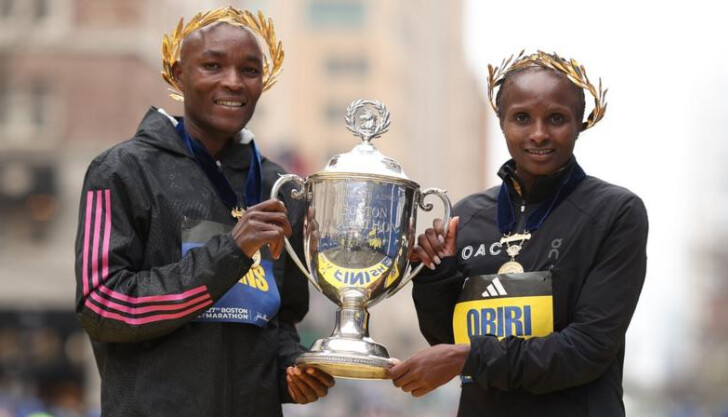
Obiri who has been named in Kenya’s marathon team for Paris Olympics is also the New York City Marathon champion.
“I am excited to return to the 2024 Boston Marathon to try to defend my title,” said Obiri, who finished last year’s race in 2:21:38.
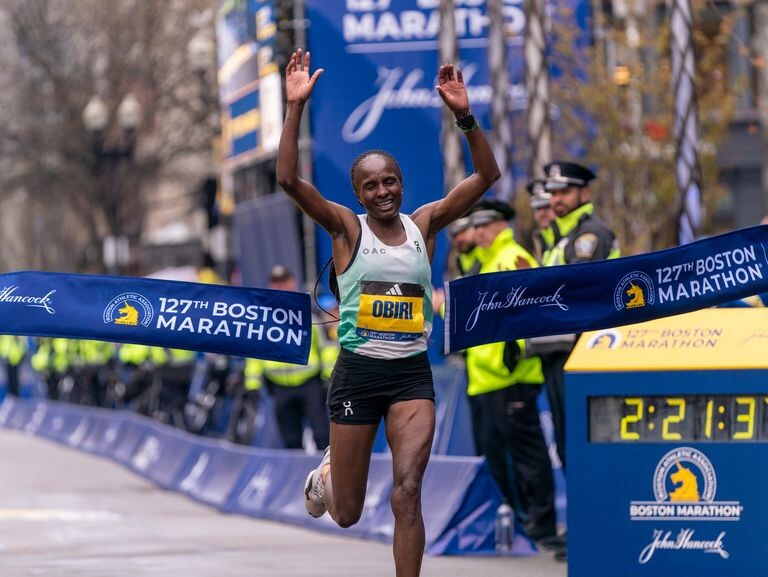
“Boston is an historic race and I would like to add my name further to its history on April 15. Winning such a historic marathon with my family waiting at the finish line was an amazing experience.”
A trifecta of Ethiopians with lifetime bests under 2:18:00 will take to the Boston course.
Worknesh Degefa, the 2019 Boston Marathon champion, returns, while 2:17:36 marathoner Tadu Teshome will make her Boston debut. Hiwot Gebremaryam aims to improve on her eighth-place finish last year.
World championships medallist Senbere Teferi who won the 2022 B.A.A. 5K in a course record of 14:49 is also in the mix.
Experienced marathoner Ababel Yeshaneh –second in 2022 and fourth in 2023— will try to become the seventh woman from Ethiopia to win the olive wreath in Boston.
Joining Obiri from Kenya are 2022 World Athletics Championships Marathon silver medalist Judith Korir, two-time Boston Marathon winner Edna Kiplagat, four-time top-ten finisher Mary Ngugi-Cooper and 2022 New York City Marathon champion Sharon Lokedi.
Helah Kiprop, who holds a silver medal in the marathon from the 2015 World Athletics Championships and has earned wins in Tokyo, Copenhagen and Paris, makes her second career Boston start. From Morocco is 2023 world marathon bronze medalist Fatima Gardadi.
Desiree Linden leads the American contingent six years after winning the title. Linden has finished in the top-five five times and holds the third-fastest time by an American ever on the Hopkinton-to-Boston route (2:22:38).
Linden will run her fifth U.S. Olympic Marathon Trials in February. Joining her is Emma Bates, who finished fifth last year in the second-fastest time ever by an American woman at Boston (2:22:10).
“At this point in my career it’s an easy decision to return to the Boston Marathon and make it my top priority race of the spring,” said Linden.
“I can’t wait to take on the iconic course for an 11th time and have the opportunity to mix it up with some of the best runners in the world.”
Jack Fleming, President and CEO of the Boston Athletic Association said: “The Boston Marathon is proud to showcase the world’s best athletes year in and year out on Patriots’ Day.”
“This year’s women’s field is exceptionally fast and showcases many who’ve been podium finishers on the global stage. It’ll make for an exciting race from Hopkinton to Boston, and we look forward to crowning our champions on April 15,” he added.
by Angwenyi Gichana
Login to leave a comment
Boston Marathon
Among the nation’s oldest athletic clubs, the B.A.A. was established in 1887, and, in 1896, more than half of the U.S. Olympic Team at the first modern games was composed of B.A.A. club members. The Olympic Games provided the inspiration for the first Boston Marathon, which culminated the B.A.A. Games on April 19, 1897. John J. McDermott emerged from a...
more...Emma Bates Withdraws from Olympic Marathon Trials 2024
Emma Bates was widely considered a top contender to make the U.S. Olympic team in the marathon this year. But over the weekend, she announced she won’t be lining up at the Olympic Marathon Trials in Orlando, Florida, on February 3.
Bates, 31, tore her plantar fascia during October’s Chicago Marathon. On December 12, she posted that she had been healing well and was back to running on the ground for an hour at a time when she developed another injury, posterior tibial tendonitis.
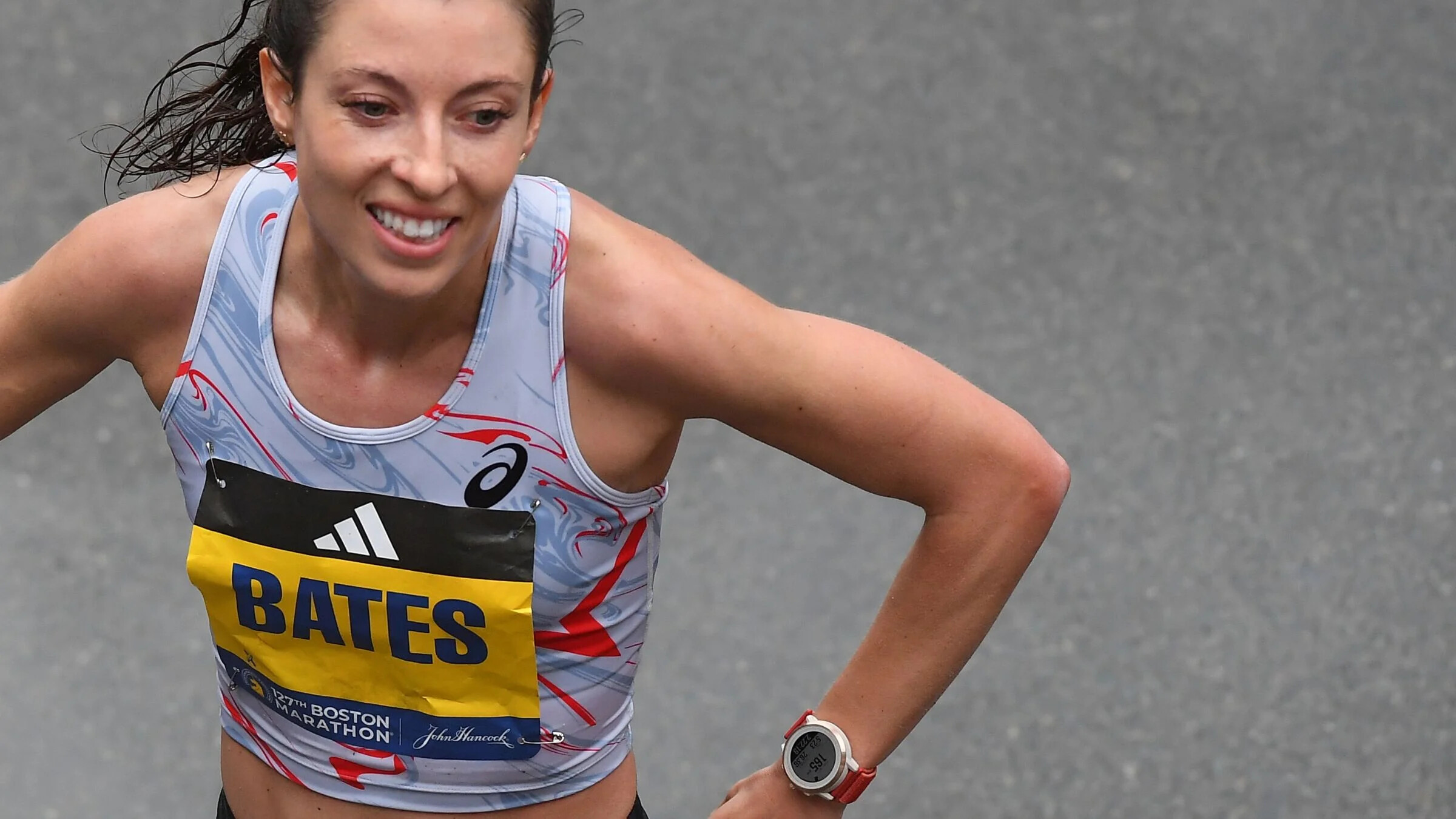
And in a tearful Instagram video posted Saturday night, Bates said that while she had returned to workouts with her Boulder-based training group, Team Boss, “we just know that there’s not enough time to be where I need to be.”
Bates’ personal best of 2:22:10 at the 2023 Boston Marathon, where she placed fifth, was the third-fastest time by an American last year.
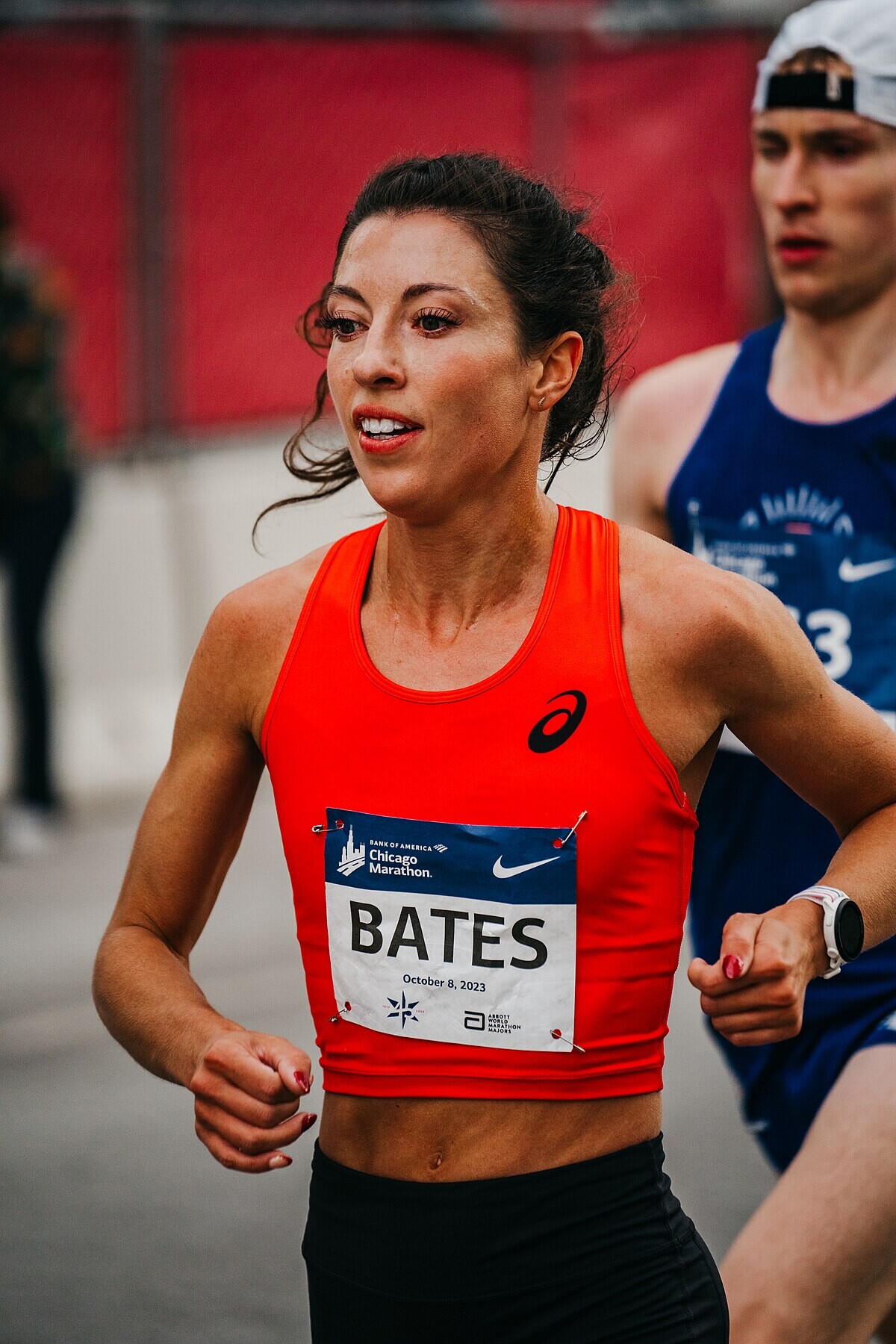
She headed into Chicago in the fall with high hopes—saying she was in shape to run 2:18 to 2:19 pace—but stepped in a pothole around mile 14. She finished 13th in 2:25:04 and left the finish line in a wheelchair. A week after the race, an MRI revealed a torn plantar fascia.
She put on a boot and began cross-training on the bike, knowing the buildup to the Trials wouldn’t be easy. With the new setback last month, she and coach Joe Bosshard decided it simply wouldn’t be possible.
Bates, a 2014 NCAA champion in the 10,000 meters at Boise State University, won her marathon debut and the USATF Marathon Championships with a 2:28:18 at the 2018 California International Marathon and has steadily improved since. In her second marathon, the 2019 Chicago Marathon, she finished fourth in 2:25:27.
Those performances made her a contender for the 2020 Olympic Marathon Trials, where she ran 2:29:35 to place seventh. But her next big breakthrough was around the corner. On a hot, humid day at the 2021 Chicago Marathon, she ran a personal-best 2:24:20 to place second.
And in 2022, she was part of a trio of Americans who produced top-10 finishes at the World Athletics Championships in Eugene, Oregon—she was seventh in 2:23:18, between Sara Hall (fifth in 2:22:10) and Keira D’Amato (eighth in 2:23:34).
Bates was clearly disappointed not to line up with the likes of Hall and D’Amato again in Orlando; “this one hurts a lot,” she wrote.
“It’s another four years to wait for another Olympic team,” she said in the accompanying video. “I’ll be OK. I’ll be OK.”
by Cindy Kuzma
Login to leave a comment
2028 US Olympic Trials Marathon
Most countries around the world use a selection committee to choose their Olympic Team Members, but not the USA. Prior to 1968, a series of races were used to select the USA Olympic Marathon team, but beginning in 1968 the format was changed to a single race on a single day with the top three finishers selected to be part...
more...Strongest Women’s Field in the race history at Boston Marathon 2024
The 128th Boston Marathon presented by Bank of America will feature the strongest women’s field in race history, led by defending champions Hellen Obiri and Susannah Scaroni. A total of 19 women with personal bests under 2:23:00 will line up in Hopkinton aiming to earn the Open Division crown, including Olympians, Abbott World Marathon Majors winners, and national stars. In the Wheelchair and Para Athletics Divisions, Paralympic hopefuls from around the world are set to compete.
“The Boston Marathon is proud to showcase the world’s best athletes year in and year out on Patriots’ Day,” said Jack Fleming, President and CEO of the Boston Athletic Association. “This year’s women’s field is exceptionally fast and showcases many who’ve been podium finishers on the global stage. It’ll make for an exciting race from Hopkinton to Boston, and we look forward to crowning our champions on April 15.”
Women from 20 countries will be competing as part of the Bank of America Professional Athlete Team.
“Each year, the Boston Marathon sets the bar higher with an unbelievable level of athletic talent, and its impact on communities around the world,” said David Tyrie, chief digital officer and chief marketing officer, Bank of America. “The 128th Boston Marathon builds on a rich history and will continue to be an inspiration for all athletes.”
HELLEN OBIRI SET TO DEFEND OPEN DIVISION TITLE
Hellen Obiri, a two-time Olympic silver medalist from Kenya now living in Colorado, won the 2023 Boston Marathon thanks to a perfectly-timed sprint in the final mile. Adding to her trophy case, Obiri also took home the 2023 B.A.A. 10K title in June and the TCS New York City Marathon crown in November.
“I am excited to return to the 2024 Boston Marathon to try to defend my title,” said Obiri, who finished last year’s race in 2:21:38. “Boston is an historic race and I would like to add my name further to its history on April 15. Winning such an historic marathon with my family waiting at the finish line was an amazing experience.”
A trifecta of Ethiopians with lifetime bests under 2:18:00 will take to the Boston course. Worknesh Degefa, the 2019 Boston Marathon champion, returns, while 2:17:36 marathoner Tadu Teshome will make her Boston debut and Hiwot Gebremaryam aims to improve upon her eighth-place finish last year. Also from Ethiopia is World championships medalist Senbere Teferi; she won the 2022 B.A.A. 5K in a course record 14:49 and has shown talent at the longer distances. Experienced marathoner Ababel Yeshaneh –second in 2022 and fourth in 2023— will try to become the seventh woman from Ethiopia to win the olive wreath in Boston.
Joining Obiri from Kenya are 2022 World Athletics Championships Marathon silver medalist Judith Korir; two-time Boston Marathon winner Edna Kiplagat; four-time top-ten finisher Mary Ngugi-Cooper; and 2022 TCS New York City Marathon champion Sharon Lokedi. Helah Kiprop, who holds a silver medal in the marathon from the 2015 World Athletics Championships and has earned wins in Tokyo, Copenhagen, and Paris, makes her second career Boston start. From Morocco is 2023 World Athletics Championships Marathon bronze medalist Fatima Gardadi.
Desiree Linden leads the American contingent six years after winning the 2018 title. Linden has finished in the top-five five times, and holds the third fastest time by an American ever on the Hopkinton-to-Boston route (2:22:38). Linden will run her fifth U.S. Olympic Marathon Trials in February. Joining her is Emma Bates who finished fifth last year in the second-fastest time ever by an American woman at Boston (2:22:10).
“At this point in my career it’s an easy decision to return to the Boston Marathon and make it my top priority race of the spring,” said Linden. “I can’t wait to take on the iconic course for an 11th time and have the opportunity to mix it up with some of the best runners in the world.”
128TH BOSTON MARATHON PROFESSIONAL WOMEN’S FIELDS
Women’s Open Division
Country
Personal Best
Worknesh Degefa
ETH
2:15:51 (Valencia, 2023)
Tadu Teshome
ETH
2:17:36 (Valencia, 2022)
Hiwot Gebremaryam
ETH
2:17:59 (Valencia, 2023)
Judith Korir
KEN
2:18:20 (Eugene, 2022)
Meseret Belete
ETH
2:18:21 (Amsterdam, 2023)
Tiruye Mesfin
ETH
2:18:47 (Valencia, 2022)
Worknesh Edesa
ETH
2:18:51 (Berlin, 2022)
Zeineba Yimer
ETH
2:19:07 (Berlin 2023)
Senbere Teferi
ETH
2:19:21 (Berlin, 2023)
Dera Dida
ETH
2:19:24 (Berlin, 2023)
Edna Kiplagat
KEN
2:19:50 (London, 2012)*
Mary Ngugi-Cooper
KEN
2:20:22 (London, 2022)
Nazret Weldu Gebrehiwet
ERI
2:20:29 (Eugene) NR
Ababel Yeshaneh
ETH
2:20:51 (Chicago, 2019)
Vibian Chepkirui
KEN
2:20:59 (Vienna, 2022)
Helah Kiprop
KEN
2:21:27 (Tokyo, 2016)
Hellen Obiri
KEN
2:21:38 (Boston, 2023)
Emma Bates
USA
2:22:10 (Boston, 2023)
Desiree Linden
USA
2:22:38 (Boston, 2011)*
Buze Diriba
ETH
2:23:11 (Toronto, 2023)
Sharon Lokedi
KEN
2:23:23 (New York City, 2022)
Malindi Elmore
CAN
2:23:30 (Berlin, 2023)*
Fatima Gardadi
MOR
2:24:12 (Xiamen, 2024)
Angie Orjuela
COL
2:25:35 (Berlin, 2023) NR
Fabienne Konigstein
GER
2:25:48 (Hamburg, 2023)
Jackie Gaughan
USA
2:27:08 (Berlin, 2023)
Dominique Scott
RSA
2:27:31 (Chicago, 2023)
Grace Kahura
KEN
2:29:00 (Sacramento, 2023)
Katie Kellner
USA
2:32:48 (Berlin, 2023)
Briana Boehmer
USA
2:33:20 (Sacramento, 2021)
Dylan Hassett
IRL
2:33:25 (Pulford, 2021)
Parley Hannan
USA
2:33:43 (Carmel, 2023)
Sara Lopez
USA
2:33:48 (Eugene, 2023)
Annie Heffernan
USA
2:34:33 (Lowell, 2023)
Nera Jareb
AUS
2:35:00 (Queensland, 2022)*
Johanna Backlund
SWE
2:35:10 (Hamburg, 2019)
Argentina Valdepenas Cerna
MEX
2:35:34 (Chicago, 2022)*
Ariane Hendrix Roach
USA
2:35:39 (Sacramento, 2022)
Michelle Krezonoski
CAN
2:36:39 (Sacramento, 2022)
Shannon Smith
USA
2:36:43 (Columbus, 2023)
Caroline Williams
USA
2:37:01 (Sacramento, 2022)
Gina Rouse
USA
2:37:10 (Sacramento, 2023)*
Kim Krezonoski
CAN
2:37:20 (Sacramento, 2022)
Abigail Corrigan
USA
2:37:45 (Sacramento, 2023)
Marissa Lenger
USA
2:38:41 (Chicago, 2022)
Emilee Risteen
USA
2:38:46 (Duluth, 2023)
Isabelle Pickett
AUS
2:38:46 (Valencia, 2023)
Allie Hackett
USA
2:38:52 (Duluth, 2023
Mary Christensen
USA
2:38:55 (Big Bear, 2023)
Olivia Anger
USA
2:39:13 (Indianapolis, 2023)
April Lund
USA
2:39:23 (Houston, 2022)*
Sarah Short
AUS
2:39:51 (Valencia, 2023)
Maura Lemon
USA
2:40:30 (Valley Cottage, 2023)
Sarah Sibert
USA
2:40:31 (Philadelphia, 2022)
Lauren Ames
USA
2:40:34 (Valley Cottage, 2023)
Kassie Harmon
USA
2:41:48 (Utah Valley, 2023)*
Elizabeth Camy
USA
2:42:51 (Sacramento, 2022)*
Alexandra Niles
USA
2:43:23 (Hartford, 2022)*
Amber Morrison
USA
2:43:50 (Sacramento, 2022)*
Mindy Mammen
USA
2:44:01 (Duluth, 2023)*
Ziyang Liu
USA
2:44:56 (Eugene, 2023)*
*Denotes Masters Division (40+)
Login to leave a comment
Boston Marathon
Among the nation’s oldest athletic clubs, the B.A.A. was established in 1887, and, in 1896, more than half of the U.S. Olympic Team at the first modern games was composed of B.A.A. club members. The Olympic Games provided the inspiration for the first Boston Marathon, which culminated the B.A.A. Games on April 19, 1897. John J. McDermott emerged from a...
more...The Road to the Paris Olympics and here is What You Need to Know.
American runners are about to begin training for the U.S. Olympic Trials Marathon
It’s early October, which means it’s the peak marathon season for many runners. But with an Olympic year on the horizon, it also means America’s top marathoners are about to hit the road to Paris.
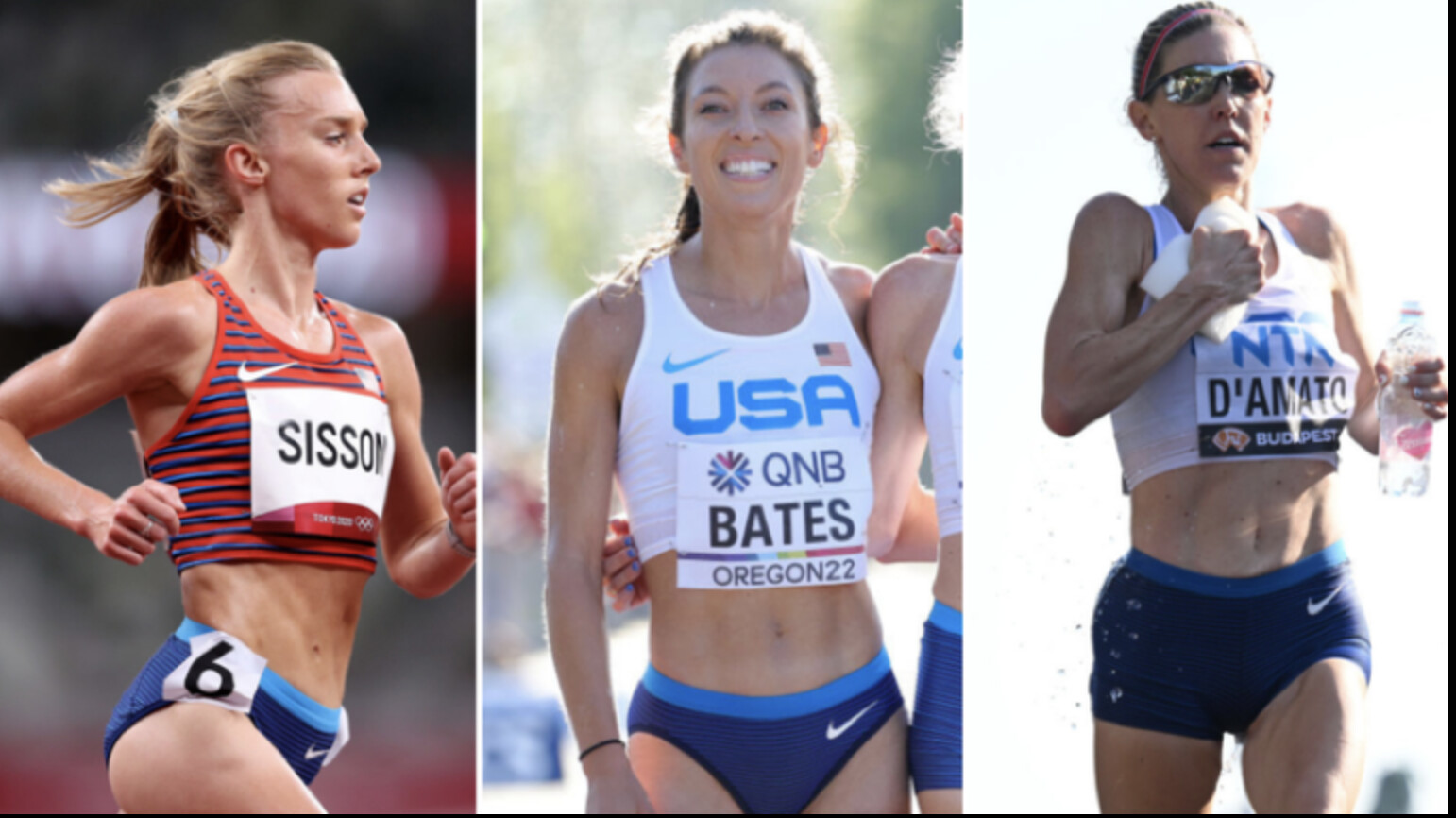
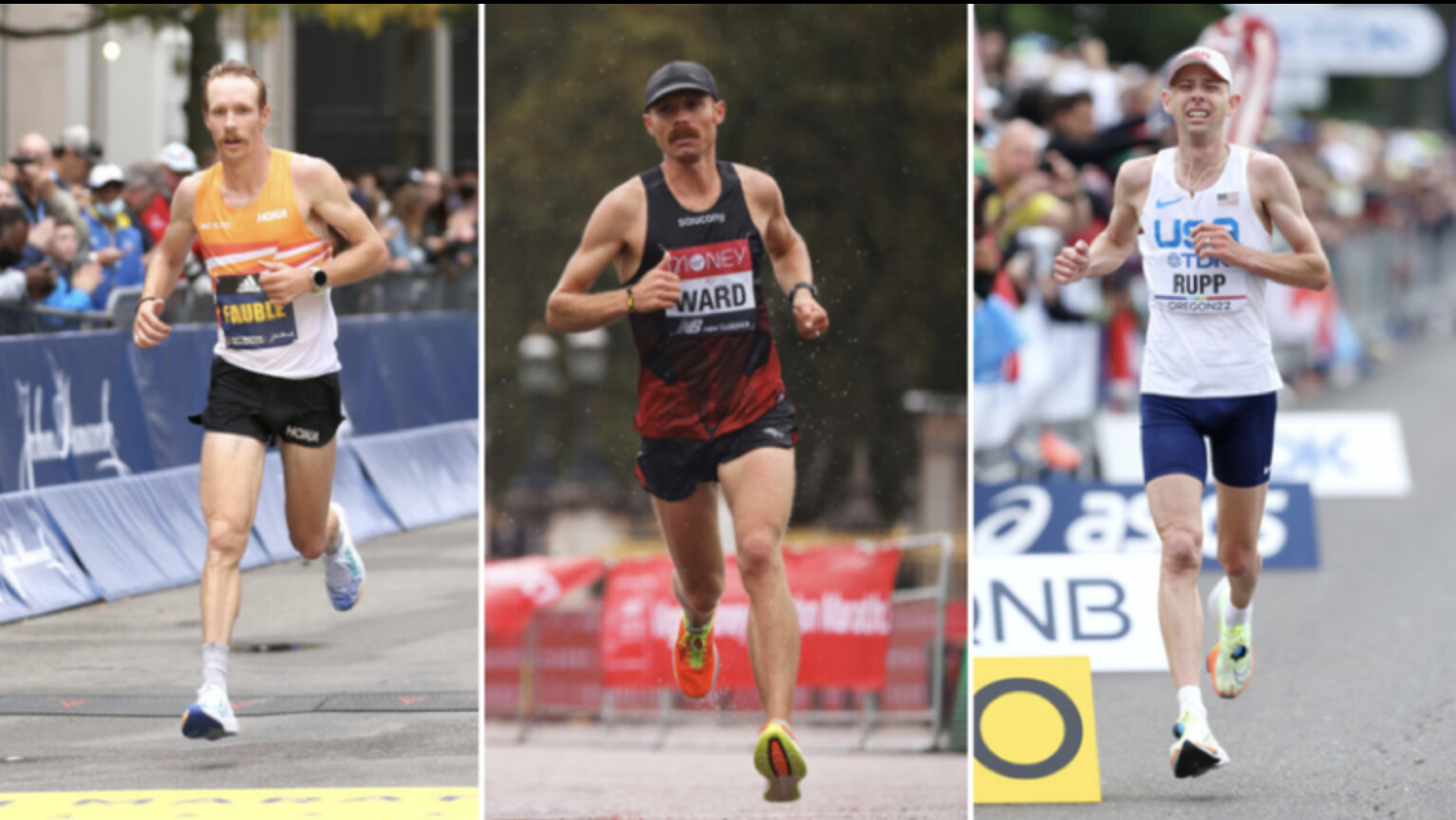
More specifically, the men’s and women’s 2024 U.S. Olympic Trials Marathon races—scheduled for February 3 in Orlando, Florida—are just four months away. And that means the top U.S. runners hoping to represent their country at next summer’s Olympics are about to begin preparing for the all-or-nothing qualifying race that decides which six runners will represent Team USA next summer on the streets of Paris.
Although several top American runners are racing the Chicago Marathon on October 8, even they have their eyes on a much bigger prize next February.
“There’s nothing in my mind that compares with being an Olympian and being in the Olympic Games,” says 26-year-old Utah-based Nike pro Conner Mantz, who returns to Chicago after finishing seventh last year in 2:08:16 in his debut at the distance. “So putting that first has been the plan for a long time. We’re just putting that first and we’re working backwards through the season with other races.”
Registration will open for the U.S. Olympic Trials Marathon in early November for runners who have surpassed the qualifying times in the marathon (2:18:00 for men, 2:37:00 for women) or half marathon (1:03:00 for men, 1:12:00 for women). The qualifying window extends through December 3—the race date of the last-chance California International Marathon, which for decades has been one of the most popular Olympic Trials qualifying races.
In 2020, a record 708 runners—465 women and 243 men—qualified for the U.S. Olympic Trials Marathon in Atlanta just before the onset of the Covid-19 pandemic. But USA Track & Field lowered the women’s qualifying standard by eight minutes from the more attainable 2:45:00 plateau, which means there will most likely be a much smaller women’s field this year.
But even so, amid the handful of runners who have a legitimate shot at making the Olympic team, there will also be dozens of dreamers, wannabes, and just-happy-to-be-there elite amateurs who have worked hard, put in the miles, and earned the chance to be on the start line of the deepest and most competitive U.S. distance-running races that only happen once every four years.
The men’s and women’s races will run simultaneously with the men beginning at 12:10 P.M. EST. and the women starting 10 minutes later. Runners have complained that a high noon start means they will be forced to race in hot, humid conditions. Over the past decade, the average temperature on February 3 in Orlando has been 69.6 degrees Fahrenheit at noon, rising to 73.3 at 4 PM. But actual temperatures have varied drastically, from 81 degrees Fahrenheit at 2 P.M. last year to 56 at the same time the year before. USATF officials have responded by saying that the start times are to accommodate live coverage on NBC and to match the expected conditions in Paris.
Here’s an update and overview of what’s next, who the top contenders are, the course, and what to expect in the next four months.
The 26.2-mile U.S. Olympic Trials course runs through downtown Orlando and consists of one 2.2-mile loop and three eight-mile loops. The marathon course will run through several neighborhoods, main streets, and business districts in Orlando, including Central Business District, City District, South Eola, Lake Eola Heights Historic District, Lake Cherokee Historic District, Lake Davis Greenwood, Lake Como, North Quarter, Lawsona/Fern Creek, SoDo District, and the Thornton Park neighborhood. It will then head east to and around The Milk District neighborhood and Main Street. (Notably, the course will come close to Disney World, which is about 15 miles to the southwest.)
Unlike the Olympic Marathon course in Paris, which will challenge runners with significant hills in the middle, the Orlando course is mostly flat. Each loop has a few minor variations in pitch, but only 38 feet separate the high and low points on the course. Ultimately, though, it’s a spectator-friendly route with chances for family, friends, and fans of runners to see the action several times.
The top women—based on personal best times and recent race results—are Emily Sisson, Emma Bates, Keira D’Amato, Betsy Saina, and Lindsay Flanagan. But the U.S. Olympic Trials races almost always produce surprises with a few great runners having off days and a few good runners having exceptional days, so there is reason to expect the unexpected.
Sisson lowered the American record to 2:18:29 last year when she finished second in the Chicago Marathon. She’s running Chicago again on October 8 along with Bates, who has said she’s hoping to break the American record. In January, Sisson, 31, chopped her own American record in the half marathon in Houston with a 1:06:52 effort, and most recently won the U.S. 20K Championships (1:06:09) on September 4 in New Haven, Connecticut. Bates, also 31, hasn’t raced at all since her sterling fifth-place effort at the Boston Marathon in April, when she slashed her personal best to 2:22:10.
While Chicago will be another good place to test themselves, both have unfinished business after Bates was seventh at the 2020 Trials and Sisson dropped out near the 21-mile mark.
The same goes for Flanagan, 32, who has been one of America’s best and most consistent marathoners for the past five years. She placed 12th at the trials in 2020. She had a breakthrough win (2:24:43) at the Gold Coast Marathon in 2022 followed by a strong, eighth-place finish (2:26:08) at the Tokyo Marathon earlier this year. In August, she ran perhaps the best race of her career, when she finished ninth (2:27:47) at the world championships in Budapest amid hot, humid conditions.
The 38-year-old D’Amato, meanwhile, just capped off another strong season with a 17th-place showing (2:31:35) at the World Athletics Championships in Budapest, a year after finishing eighth in the world championships and setting an American record 2:19:12 at the 2022 Houston Marathon. She was 15th at the Trials in 2020 in 2:34:24, just two years into her competitive return to the sport after having two kids and starting a career in real estate in her early 20s.
“It’s such a huge goal of mine to become an Olympian,” says D’Amato, who lowered Sisson’s U.S. record in the half marathon with a 1:06:39 effort at the Gold Coast Half Marathon on July 1 in Australia. “It’s really hard for me to put words into this because my whole life, wearing a Team USA jersey has been like a huge dream. And when I left the sport (temporarily), I felt like I said goodbye to that dream and I kind of mourned the loss of being able to represent my country. I feel like it’s the greatest honor in our sport to be able to wear our flag and race as hard as possible.”
Saina, a 35-year-old Kenya-born runner who ran collegiately for Iowa State University, became a U.S. citizen in late 2021. She placed fifth in the 10,000-meters at the 2016 Olympics in Rio de Janeiro while competing for Kenya. She’s spent the past several years splitting time between Kenya and Nashville, Tennessee, where she gave birth to a son, Kalya, in December 2021.
She’s returned with a strong fourth-place 1:11:40 result at the Tokyo Half Marathon last October and a fifth-place 2:21:40 showing at the Tokyo Marathon in February. In May, Saina won the U.S. 25K Championships in Michigan. Two weeks ago she broke the tape at the Blackmores Sydney Marathon in Australia in 2:26:47.
Other top contenders include but are not limited to Tokyo Olympics bronze medalist Molly Seidel (who’s personal best is 2:24:42), 2022 U.S. Olympic Trials champion Aliphine Tuliamuk (2:24:37, 11th in Boston this year), Susanna Sullivan (2:24:27 personal best, 10th in London this year), two-time Olympian and 2018 Boston Marathon winner Des Linden (2:22:38), and Sara Hall (2:20:32, fifth at last year’s world championships), plus Kellyn Taylor (2:24:29), Nell Rojas (2:24:51), Sarah Sellers (2:25:43), Lauren Paquette (2:25:56), Dakotah Lindwurm (2:25:01), Annie Frisbie (2:26:18), Sara Vaughn (2:26:23), Tristin Van Ord (2:27:07), and Jacqueline Gaughan (2:27:08).
The list of potential men’s top contenders isn’t as clear-cut, partially because there are so many sub-2:11 runners and several fast runners who are relatively new to the marathon. But all that suggests a wide-open men’s race where more than a dozen runners are legitimately in the mix for the three Olympic team spots. That said, the top runners on paper, based on both time and consistent results over the past few years, are Scott Fauble, Jared Ward, Galen Rupp, Conner Mantz, Leonard Korir, Matt McDonald, and C.J. Albertson.
The 31-year-old Fauble, who was 12th in the Olympic Trials in 2020 and owns a 2:08:52 personal best, has finished seventh in the Boston Marathon three times since 2019 and also finished seventh in the New York City Marathon in 2018. Ward is a 2016 U.S. Olympian and has three top-10 finishes at the New York City Marathon and a 2:09:25 personal best from Boston in 2019. He’s 35, but he just ran a 2:11:44 (27th place) at the Berlin Marathon in late September.
Rupp, who won the past two U.S. Olympic Trials Marathons and earned the bronze medal in the marathon at the 2016 Olympics, is nearing the end of his competitive career. He boasts a 2:06:07 personal best and has run under 2:10 more than any American in history, including when he finished 19th at the world championships (2:09:36) last year. He’s a bit of a wild card because he’s 37 and hasn’t raced since his lackluster 17th-place showing at the NYC Half Marathon (1:04:57) in March, but the world will get a glimpse of his fitness in Chicago this weekend.
Mantz followed up his solid debut in Chicago last fall with a good Boston Marathon in April (11th, 2:10:25) and solid racing on the track and roads all year, including his recent runner-up showings at the Beach to Beacon 10K in August and the U.S. 20K Championships in September.
McDonald, 30, who was 10th in the 2020 U.S. Olympic Trials, has quietly become one of the best marathoners in the U.S. while serving as a postdoctoral associate in chemical engineering at M.I.T. His last three races have clocked in at 2:10:35 (Boston 2022), 2:09:49 (Chicago 2022), and 2:10:17 (Boston 2023). The only other runner who rivals that kind of consistency is Albertson, 29, who has run 2:10:23 (Boston 2022), 2:10:52 (Grandma’s Marathon 2022) and 2:10:33 (Boston 2022) in his past three marathons and was seventh in the U.S. Olympic Trials in 2020 (2:11:49).
The men’s race will likely have a mix of veteran runners and newcomers who have run in the 2:09 to 2:10 range since 2022. Among those are 2020 U.S. Olympic Trials runner-up Jake Riley (2:10:02 personal best), who is returning from double Achilles surgery; 2016 U.S. 10,000-meter Olympian Leonard Korir (2:07:56), who ran a 2:09:31 in Paris in April; Zach Panning (2:09:28, plus 13th at the world championships in August); U.S. 25K record-holder Parker Stinson (2:10.53); Futsum Zienasellassie who won the California International Marathon last December in his debut (2:11:01) and then doubled-back with a new personal best (2:09:40) at the Rotterdam Marathon in the spring; Abbabiya Simbassa, who ran a solid debut marathon (2:10:34) in Prague this spring; and Eritrean-born Daniel Mesfun (2:10:06) and Ethiopian-born Teshome Mekonen (2:10:16), who both received U.S. citizenship within the past year; and solid veterans Nico Montanez (2:09:55), Elkanah Kibet (2:10:43) and Nathan Martin (2:10:45).
Additional sub-2:12 runners who will be in the mix are Andrew Colley (2:11:26), Clayton Young (2:11:51), Brendan Gregg (2:11:21), Josh Izewski (2:11:26), Jacob Thompson (2:11:40), and Kevin Salvano (2:11:49).
As noted previously, some top contenders will season their marathon legs one final time at the flat and fast Chicago Marathon on October 8. An even more select few will opt for the New York City Marathon on November 5. After that, nearly every American with eyes set on an Olympic berth will double-down over the holiday season for that one final, critical marathon training cycle. Expect to see a wide range in heat training, from sauna protocols, to warm weather training trips, to simply an adjusted race day strategy.
Of course, with the Olympic Marathon falling under the purview of World Athletics, qualifying for the U.S. Olympic Marathon team is not quite as simple as finishing on the podium in Orlando. Any American looking to have a breakout performance and finish within the top three at the U.S. Olympic Trials Marathon will need to have run under 2:11:30 for men and 2:29:30 for women within the qualification window, which spans from November 1, 2022 to April 30, 2024. Given the possibility of oppressively hot and humid temps on February 3 in Orlando, they’re best bet is to secure that time now.
These qualification standards are in accordance with a new rule from World Athletics, which allows national Olympic committees to circumvent the typical Olympic qualification process of running under 2:08:10 for men and 2:26:50 for women, or being ranked among the top 65 in the world on a filtered list of the top three athletes from each country. The catch, though, is that three other runners from said country must have met one of these two standards. If this sounds complicated, that’s because it is.
For the hundreds of elite amateurs on the cusp of hitting that coveted U.S. Olympic Trials qualifying time, it’s do or die mode. While a few made the cut at the Berlin Marathon on September 24, one of those opportunities was lost when the Twin Cities Marathon was canceled on October 1 because of excessive heat. Temperatures are shaping up for an auspicious day in Chicago this weekend, and many more will give it a final shot at the Columbus Marathon on October 15; Indianapolis Monumental Marathon on October 28; the Philadelphia Marathon on November 18; and the last-call California International Marathon, a point-to-point race ending in Sacramento, California on December 3.
Ultimately, only six American runners will likely continue on along the road to Paris and earn the chance to run in the men’s and women’s Olympic marathons next August 10-11. For a handful of younger runners, the 2024 U.S. Olympic Trials will be a motivation to reinvigorate the Olympic dream or keep a faint hope alive, at least until the 2028 U.S. Olympic Trials that will determine the team for the Los Angeles Olympics. But for many runners, the journey to the U.S. Olympic Trials in Orlando will lead to the end of their competitive road running careers as new jobs, young families, a switch to trail running, and other priorities will take hold.
“I think the Olympic Trials is an important part of American distance running,” says Kurt Roeser, 36, a two-time U.S. Olympic Trials Marathon qualifier who works full-time as a physical therapist in Boulder, Colorado. “I’m glad that they kept it the same event for this cycle and hopefully for future cycles because it gives people like me a reason to keep training. I’m older now and I’m not going to actually have a chance to make an Olympic team, but for somebody that’s fresh out out of college and maybe they just barely squeak in under the qualifying time, maybe that’s the catalyst they need to start training more seriously through the next cycle. And maybe four years from now, they are a serious factor for making the team.”
by Outside Online
Login to leave a comment
Stacy Ndiwa debuts World Marathon Majors in Chicago
Seven months after winning the Los Angeles Marathon, Stacy Ndiwa will be returning to American soil in search of her first World Marathon Majors title at the Chicago Marathon on October 8.
The former Commonwealth Games 10,000m silver medalist, will be up against top marathon runners across the world led by the defending champion Ruth Chepngetich.
Chepngetich has a personal best of 2:14:18. Another Kenyan Joyciline Jepkosgei (2:17:43) will also be competing.
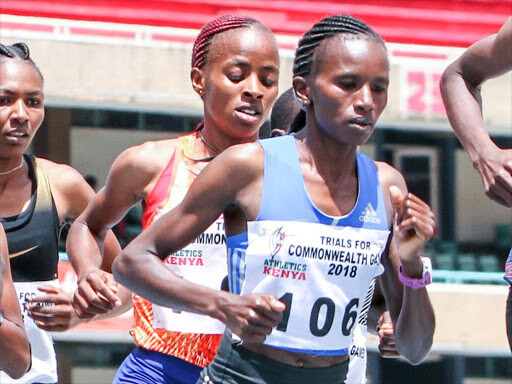
Ndiwa, who is now training in Iten, said her preparations are in top gear and she is hoping to return good results.
“This will be my first time to compete in World Marathon Majors and I am ready for the world,” she said.
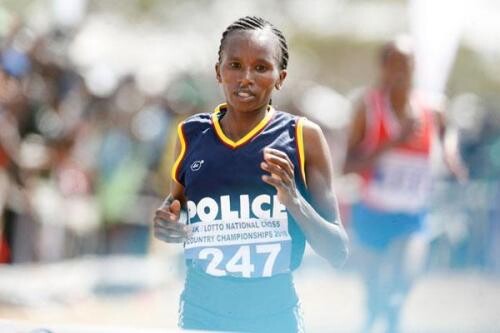
The former Africa 10,000m champion made her debut in the 42km race last year, placing fourth at the Istanbul Marathon in 2:31.53 and went ahead to win the Los Angeles Marathon in 2:31.00 in March last year.
In May, Ndiwa won the second edition of the Iten 15km Road race and went ahead to finish second at the Boston 10km in 31:25 behind champion Hellen Obiri (32:21) with Sheila Chepkirui (31:27) third in an all-podium Kenyan sweep.
“This time, I have had a very busy schedule and I need to crown it all by posting better results in Chicago,” said the athlete who compete for the National Police Service.
“This will be an avenue for me to enter into the big marathon big league. Competing at the World Majors Marathon is not a walk in the park and I really need to work hard,” she said.
Others in the race will be the Ethiopian quartet of Genzebe Dibaba (2:18:05), Tigist Girma (2:18:52), Sutume Kebede (2:18:12) and Ababel Yesheneh (2:20:51).
Emily Sisson (2:18:29) will lead the home team consisting of Des Linden (2:22:38), Emma Bates (2:23:18), Aliphine Tuliamuk (2:24:37), Nell Rojas (2:24:51), Molly Seidel (2:24:42), Dakotah Lindwurm (2:25:01), Sara Vaughn (2:26:23), Gabriella Rooker ( 2:27:38), Diane Nukuri (2:27:50) and Maggie Montoya (2:28:07).
Reigning London Marathon champion Sifan Hassan (2:18:33) from the Netherlands will also be in the contest.
by Emmanuel Sabuni
Login to leave a comment
Bank of America Chicago
Running the Bank of America Chicago Marathon is the pinnacle of achievement for elite athletes and everyday runners alike. On race day, runners from all 50 states and more than 100 countries will set out to accomplish a personal dream by reaching the finish line in Grant Park. The Bank of America Chicago Marathon is known for its flat and...
more...Stephanie Bruce on running while pregnant: “It doesn’t have to make sense to everyone”
"This is a gift–to be out doing what I love while growing a baby," Bruce says.
American marathoner Stephanie Bruce is not letting pregnancy slow her down. In May, 18 weeks into her third pregnancy, Bruce was the top female finisher at the Big Sur 12K in 45:41, coming in second overall, only a minute behind first place.
Known for her upfront talk about post-pregnancy running after the birth of her other two children, Bruce has been sharing social media updates chronicling the joys and challenges of running (and racing) while pregnant, noting, “It doesn’t have to make sense to everyone.”
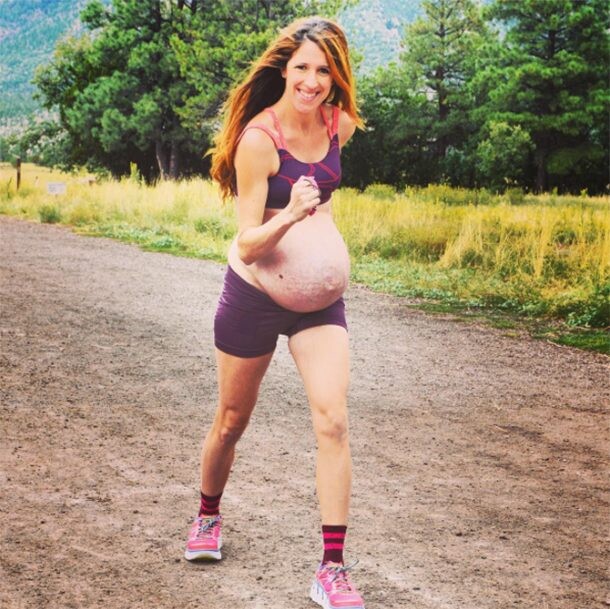
Bruce has had a prolific career in cross-country, representing the U.S. twice at the World Cross Country Championships, in 2017 and 2019. Bruce was the second American behind Emma Bates at the 2019 Chicago Marathon, where she ran her personal best time of 2:27:47, and she had a 10th place finish at the NYC Marathon in November (2:31:05). She has spent the last decade training with Ben Rosario’s Hoka NAZ Elite team in Flagstaff, Ariz.
In January 2022, Bruce announced she would be retiring at the end of the season, after she was diagnosed with a congenital heart condition called bicuspid aortic valve disease (BAVD), a dysfunction of the aorta valve limiting the amount of blood flowing from your heart to the body.
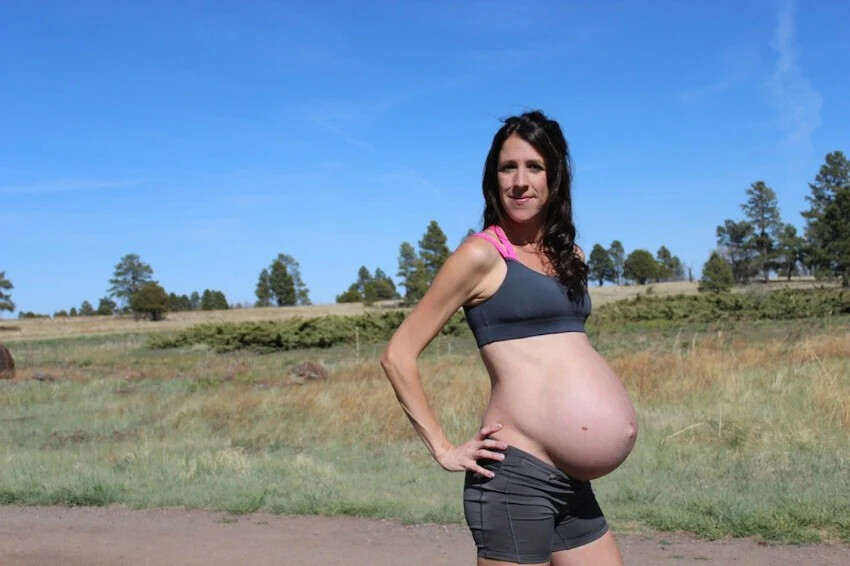
A few months later, in what she called “the pivot,” she changed her mind, sharing on her blog that “after a period of deep reflection–now I have had a change of heart. I am not ready to hang up my racing shoes.”
A few months later, Bruce announced her pregnancy. The athlete plans to return to racing competitively after her baby is born and has been documenting her journey to inspire others. Bruce says still she can still run reps between a 3:00 and 3:30 min/km pace, but is finding turning over in bed is becoming difficult. In her third trimester, she says that she misses competing.
Bruce explains her goal in sharing her pregnant running experience: “To show women our bodies can handle it, if we choose, not everyone and that’s ok if we stay on the couch and don’t feel motivated. Every pregnancy experience is different and I am simply sharing how mine is playing out.”
Bruce recently published a book, written with Rosario, titled Follow Your Heart, The Story of Stephanie Bruce’s Not-So-Final Season.
by Keeley Milne
Login to leave a comment
Who Will Run the World Championships Marathon for the U.S. This Summer?
The three men and three women are selected by a descending order time list. But not everyone accepts their spot. Over 9 days in August, the World Athletics Championships will take place in Budapest, Hungary. The women’s marathon is scheduled for August 26, and the men’s is August 27, the last day of competition.
USA Track and Field (USATF) uses different selection procedures for this event than it does for the Olympic Games. Instead of using a Trials race, as it does for the Olympics, USATF offers spots to athletes using a descending order time list for certain marathons run between December 1, 2021, and May 30, 2023, as long as those athletes have met the qualifying criteria set by World Athletics. (The rules are complicated. For instance, the Boston Marathon is not on the list of “World Athletics approved” courses, but USATF is allowing times run at Boston in 2022 and 2023 for the descending order list.)
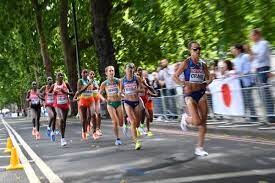
Not every American athlete will accept a spot, if offered. Some instead will choose to focus on a fall marathon, where they can earn substantial appearance fees and prize money that aren’t offered at worlds. Others won’t race at all this summer or fall, and instead they’ll train for the Olympic Marathon Trials in February 2024. How is it likely to shake out? Runner’s World reached out to the top seven men and women currently on the list or their coaches or agents to inquire about their plans. The window to run a qualifying time, however, remains open until the end of May. So a top performance in the next month could shake up the list.
Here’s what they said:
Women
Emily Sisson, 2:18:29, 2022 Chicago Marathon: Not likely, per her agent, Ray Flynn
Keira D’Amato, 2:19:12, 2022 Houston Marathon: Yes, if offered a spot
Betsy Saina, 2:21:40, 2023 Tokyo Marathon: No, she is focusing on a fall marathon
Sara Hall, 2:22:10, 2022 World Championships marathon: Has not yet decided
Emma Bates, 2:22:10, 2023 Boston Marathon: Not likely, per her agent, Ray Flynn
Susanna Sullivan, 2:24:27, 2023 London Marathon: Yes, if offered a spot
Aliphine Tuliamuk, 2:24:37, 2023 Boston Marathon: Will consider if offered a spot, per her agent, Hawi Keflezighi
Wild card: Will Molly Seidel run a May marathon?
Men
Conner Mantz, 2:08:16, 2022 Chicago Marathon: Not likely, per his agent, Ray Flynn
Scott Fauble, 2:08:52, 2022 Boston Marathon: No Elkanah Kibet, 2:09:07, 2022 Boston Marathon: Yes, currently deployed with the U.S. Army in Poland but will accept a spot if offered
Zachery Panning, 2:09:28, 2022 Chicago Marathon: Yes, per coach Kevin Hanson
Leonard Korir, 2:09:31, 2023 Paris Marathon: Did not immediately respond to a message from Runner’s World
Galen Rupp, 2:09:36, 2022 World Championships marathon: No, will run a fall marathon, per his agent, Ricky Simms
Futsum Zeinasellassie, 2:09:40, 2023 Rotterdam Marathon: Will consider if offered a spot, per his agent, Hawi Keflezighi
Wild card: Biya Simbassa runs the Prague Marathon, his debut, on May 7.
by Runner’s World
Login to leave a comment
Eliud Kipchoge is human afterall
Eliud Kipchoge came to Boston seeking to add the world’s most storied annual marathon to his unrivaled trophy case. He will leave with a sixth-place result and questions about whether he can achieve two outstanding, unprecedented goals.
“I live for the moments where I get to challenge the limits,” was posted on Kipchoge’s social media four hours after he finished. “It’s never guaranteed, it’s never easy. Today was a tough day for me. I pushed myself as hard as I could but sometimes, we must accept that today wasn’t the day to push the barrier to a greater height.”
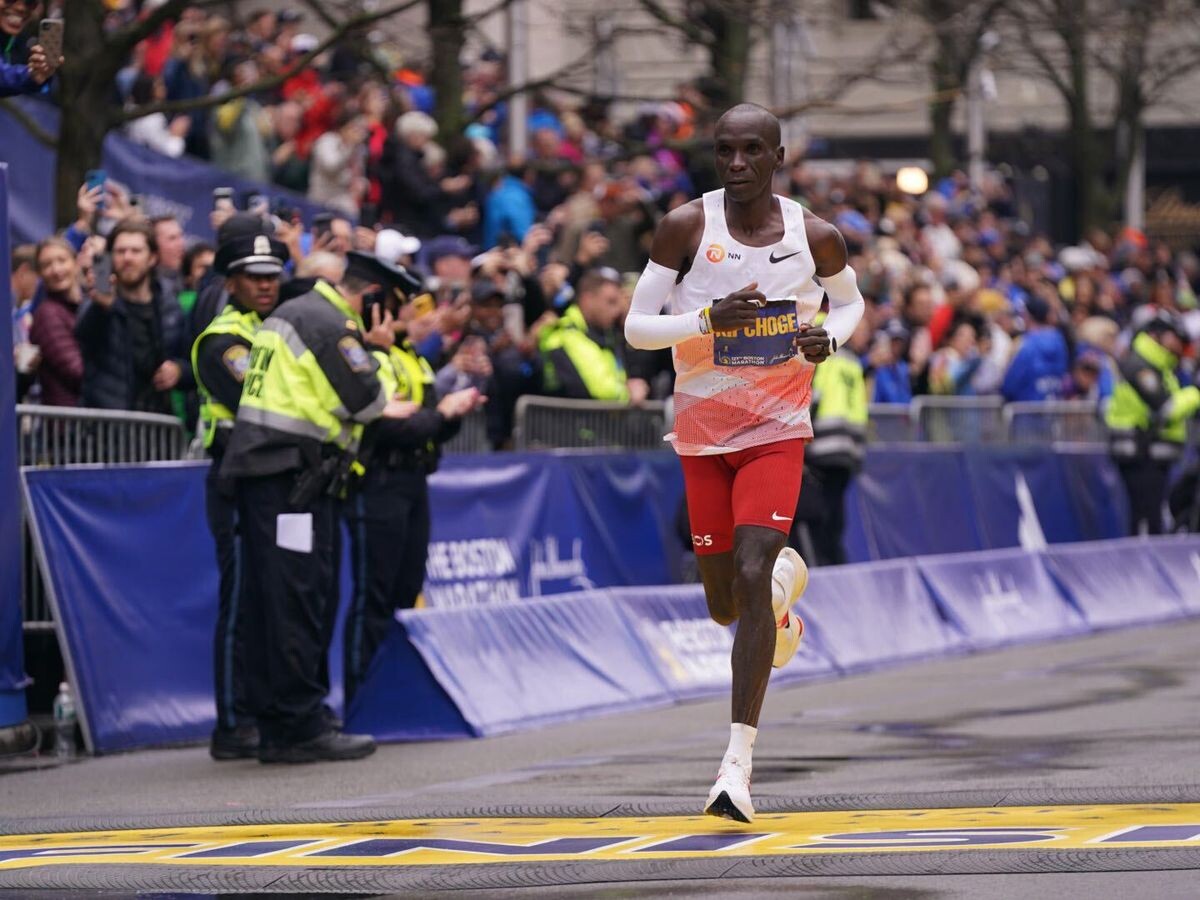
Kipchoge was dropped in the 19th mile in his Boston Marathon debut in the middle of the race’s famed hills. He finished 3 minutes, 29 seconds behind fellow Kenyan Evans Chebet, who clocked 2:05:54 and became the first male runner to repeat as Boston champion since 2008.
“I did not observe Kipchoge,” Chebet said of what happened, according to the Boston Athletic Association. “Eliud was not so much of a threat because the bottom line was that we trained well.”
It marked just Kipchoge’s third defeat in 18 career marathons, a decade-long career at 26.2 miles that’s included two world record-breaking runs and two Olympic gold medals.
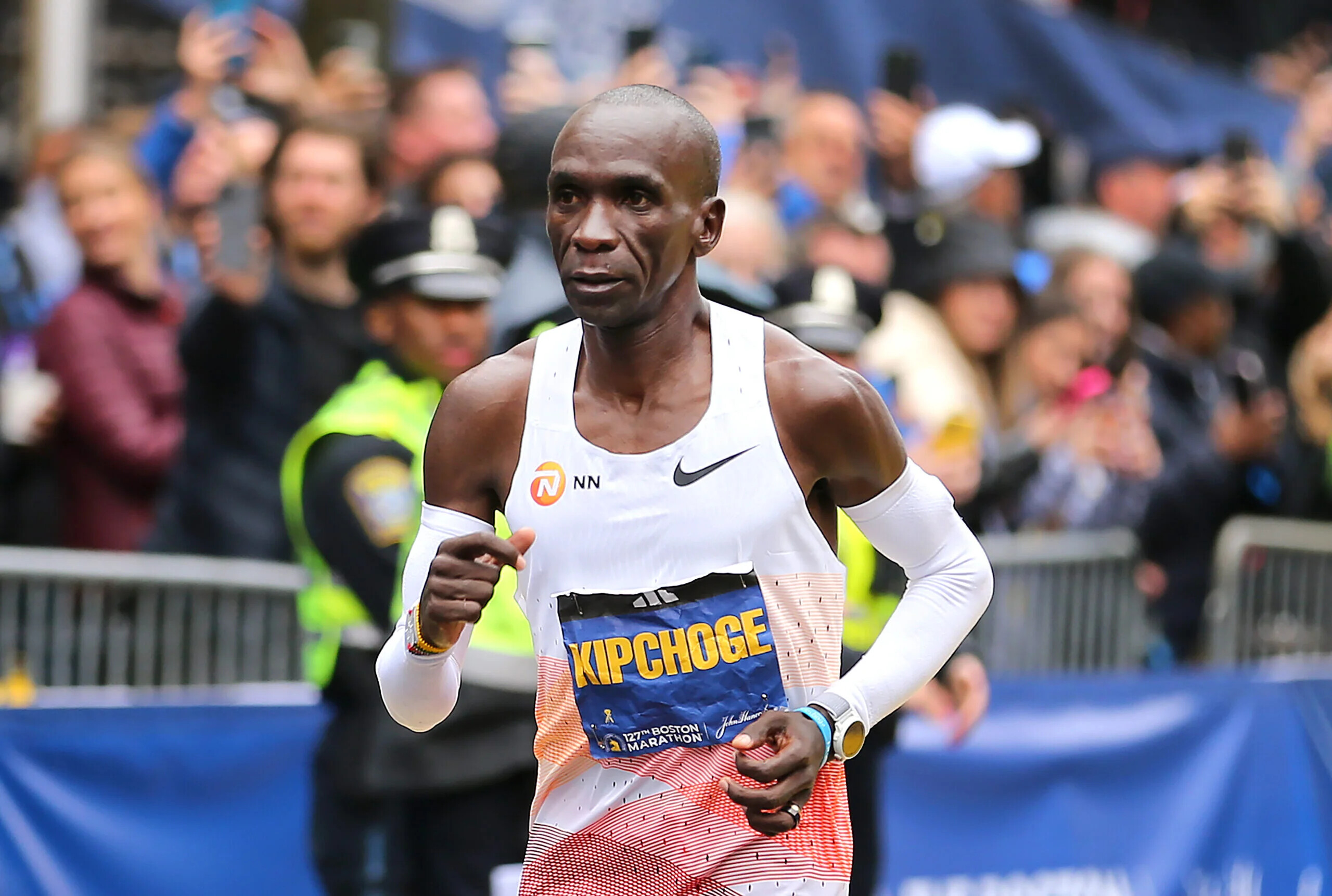
Kipchoge, 38, hopes next year to become the first person to win three Olympic marathons, but major doubt was thrown on that Monday, along with his goal to win all six annual World Marathon Majors. Kipchoge has won four of the six, just missing Boston and New York City, a November marathon that he has never raced.He skipped his traditional spring marathon plan of racing London to go for the win in Boston, the world’s oldest annual marathon dating to 1897.
Kipchoge has yet to speak to media, but may be asked whether a failed water bottle grab just before he lost contact with a leading pack of five contributed to his first defeat since he placed eighth at the 2020 London Marathon. Boston’s weather on Monday, rainy, was similar to London in 2020.
Kipchoge’s only other 26.2-mile loss was when he was runner-up at his second career marathon in Berlin in 2013.
He is expected to race two more marathons before the Paris Games. Kipchoge will be nearly 40 come Paris, more than one year older than the oldest Olympic champion in any running event, according to Olympedia.org. Kenya has yet to name its three-man Olympic marathon team.
“In sports you win and you lose and there is always tomorrow to set a new challenge,” was posted on Kipchoge’s social media. “Excited for what’s ahead.”
Kenyan Hellen Obiri won Monday’s women’s race in 2:21:38, pulling away from Ethiopian Amane Beriso in the last mile.
Obiri, a two-time world champion and two-time Olympic medalist in the 5000m on the track, made her marathon debut in New York City last November with a sixth-place finish. She was a late add to the Boston field three weeks ago after initially eschewing a spring marathon.
“I didn’t want to come here, because my heart was somewhere else,” said Obiri, who is coached in Colorado by three-time U.S. Olympian Dathan Ritzenhein. “But, my coach said I should try and go to Boston.”
Emma Bates was the top American in fifth in the second-fastest Boston time for an American woman ever, consolidating her status as a favorite to make the three-woman Olympic team at next February’s trials in Orlando. Emily Sisson and Keira D’Amato, who traded the American marathon record last year, didn’t enter Boston.
“I expected myself to be in the top five,” said the 30-year-old Bates, who feels she can challenge Sisson’s American record of 2:18:29, if and when she next races on a flat course.
The next major marathon is London on Sunday, headlined by women’s world record holder Brigid Kosgei of Kenya, Tokyo Olympic champion Peres Jepchirchir of Kenya and Olympic 5000m and 10,000m champion Sifan Hassan of the Netherlands in her 26.2-mile debut.
by Olympic Talk
Login to leave a comment
Boston Marathon
Among the nation’s oldest athletic clubs, the B.A.A. was established in 1887, and, in 1896, more than half of the U.S. Olympic Team at the first modern games was composed of B.A.A. club members. The Olympic Games provided the inspiration for the first Boston Marathon, which culminated the B.A.A. Games on April 19, 1897. John J. McDermott emerged from a...
more...Evans Chebet successfully defended his title at the Boston Marathon and fellow Kenyan Hellen Obiri triumphed in the women’s race at the World Athletics Platinum Label road race on Monday
The big sub-plot of the race, however, was the performance of Eliud Kipchoge, who headed to Boston in the hopes of taking one step closer to completing his set of World Marathon Majors victories but trailed home in sixth place in 2:09:23, the slowest time of his glittering career and more than three minutes behind the winner.
But the day belonged to Chebet and Obiri, both of whom dropped their final opponents in the last few minutes of the race, winning in 2:05:54 and 2:21:38 respectively. Chebet’s mark is the third-fastest winning time ever recorded in the men’s race in Boston and Obiri’s performance is the fourth-fastest women’s winning mark.
Kipchoge looked comfortable in the early stages and was part of a lead pack of 11 men that passed through 10km in 28:52 before reaching the half-way point in 1:02:19.
Chebet and Kipchoge were still together in the lead group through 30km, reached in 1:29:23, but the double Olympic champion and world record-holder started to lose contact with the leaders just a minute or two later, having missed picking up his bottle at a water station.
At 35km, with 1:44:19 on the clock, the lead pack was down to five men – Chebet, 2021 Boston winner Benson Kipruto, Tanzanian record-holder Gabriel Geay, Kenya’s John Korir and Ethiopia’s Andualem Belay. Kipchoge, meanwhile, was more than a minute behind the leaders and no longer in contention for a podium spot.
Evans Chebet wins the 2023 Boston Marathon (© Getty Images)
With three miles to go, and Korir and Belay no longer in the running, the race was down to three men: Geay, Chebet and Kipruto. They ran together as a trio for the best part of two miles before Geay’s challenge eventually faded, leaving the Kenyan duo out in front. Chebet then gradually pulled ahead of his compatriot and training partner Kipruto, going on to cross the finish line in 2:05:54.
Geay recovered enough to pass Kipruto in the closing stages, claiming the runner-up spot in 2:06:04, two seconds ahead of Kipruto. 2021 New York winner Albert Korir finished strongly to take fourth place in 2:08:01 and Morocco’s Zouhair Talbi was fifth (2:08:35). Kipchoge followed a further 48 seconds in arrears.
“I train with Benson; he’s my friend and like a brother to me,” said Chebet, who became the sixth man to win back-to-back Boston titles. “With one kilometre to go, I said to him, ‘let’s go’.”Obiri wins in final mile thriller
Five months after making her marathon debut with a sixth-place finish in New York, two-time world 5000m champion Hellen Obiri triumphed in her second race over the classic distance.
In an incredibly close race that wasn’t decided until the final few minutes, Obiri disposed of one of the strongest women’s fields ever assembled for the Boston Marathon.
In contrast to the men’s race, the women’s contest started off at a cautiously steady pace and gradually picked up as the race went on. A large lead pack of more than 20 runners passed through 10km in 34:46, but they had been whittled down to 11 contenders by the half-way mark, reached in 1:11:29.
By this point, the lead pack still included Obiri, world marathon champion Gotytom Gebreslase, Ethiopian record-holder Amane Beriso, Amsterdam course record-holder Angela Tanui, 2020 Tokyo champion Lonah Salpeter, Eritrean record-holder Nazret Weldu and 2021 London champion Joyciline Jepkosgei.
Gebreslase and Weldu had fallen out of the pack with five miles to go, and the lead pack was reduced further to just six women at 23 miles: Obiri, Salpeter, Beriso, Jepkosgei, Ethiopia’s Ababel Yeshaneh and USA’s Emma Bates.
Jepkosgei and Bates started to fade in the last few miles, while Yeshaneh tripped and fell, only to rejoin the lead pack soon after. Salpeter was the next to fade, leaving just Obiri, Beriso and Yeshaneh to battle it out for the victory.
Hellen Obiri wins the 2023 Boston Marathon (© Getty Images)
With 2:17 on the clock, Obiri and Beriso had broken free from Yeshaneh. About 90 seconds later, Obiri embarked on a long drive for the finish line. With occasional glances over her shoulder, the Olympic silver medallist maintained a healthy gap ahead of Beriso and went on to finish in 2:21:38.
Beriso took second place in 2:21:50 and Salpeter overtook Yeshaneh in the closing stages to claim third place in 2:21:57, three seconds ahead of the Ethiopian. Bates was fifth in 2:22:10, making her the top US finisher in either of the races.
“I’m so happy,” said Obiri. “I was undecided about which marathon to do this year, but eventually I decided to do Boston. My coach (Dathen Ritzenhein) told me, ‘you have trained well, you’re ready to do Boston’. I’m very, very happy I chose to do it.”
Leading results
Women1 Hellen Obiri (KEN) 2:21:382 Amane Beriso (ETH) 2:21:503 Lonah Salpeter (ISR) 2:21:574 Ababel Yeshaneh (ETH) 2:22:005 Emma Bates (USA) 2:22:106 Nazret Weldu (ERI) 2:23:257 Angela Tanui (KEN) 2:24:128 Hiwot Gebremaryam (ETH) 2:24:30
Men1 Evans Chebet (KEN) 2:05:542 Gabriel Geay (TAN) 2:06:043 Benson Kipruto (KEN) 2:06:064 Albert Korir (KEN) 2:08:015 Zouhair Talbi (MAR) 2:08:356 Eliud Kipchoge (KEN) 2:09:237 Scott Fauble (USA) 2:09:448 Hassan Chahdi (FRA) 2:09:46
by World Athletics
Login to leave a comment
Boston Marathon
Among the nation’s oldest athletic clubs, the B.A.A. was established in 1887, and, in 1896, more than half of the U.S. Olympic Team at the first modern games was composed of B.A.A. club members. The Olympic Games provided the inspiration for the first Boston Marathon, which culminated the B.A.A. Games on April 19, 1897. John J. McDermott emerged from a...
more...B.A.A. announces women’s elite field for 127th Boston Marathon
The Boston Athletics Association (B.A.A.) has revealed the women’s elite field for the 127th Boston Marathon on Monday, April 17. The field features 16 women who have run under 2:21, including the 2022 world marathon champion Gotytom Gebreslase and two-time Boston champion Edna Kiplagat.
Three other notable athletes who are making their Boston debuts are 2022 world championship bronze medallist Lonah Salpeter of Israel, 2022 NYC Marathon champion Sharon Lokedi, and 2022 Valencia Marathon champion (and third fastest woman of all-time 2:14:58) Amane Beriso of Ethiopia.
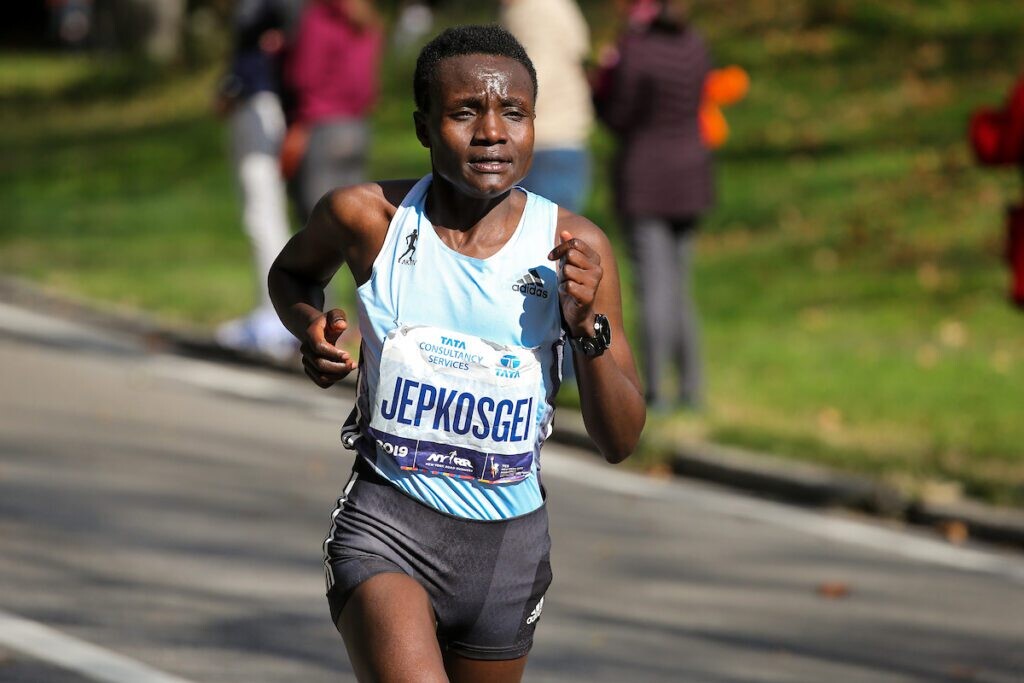
“I am very excited to run the B.A.A. Boston Marathon this year,” said Salpeter in a press release. “It has always been my dream to run on this course and to experience the incredible atmosphere.” Salpeter is coming off a second-place finish at the New York City Marathon in November and a bronze medal in the 10,000m at the European Championships in August.
Last year’s second and third-place finishers in Boston, Ababel Yeshaneh of Ethiopia and Mary Ngugi of Kenya, both return with hopes of claiming the top spot on the podium. Yeshaneh came within four seconds of victory, while Ngugi placed second and third in Boston in back-to-back years.
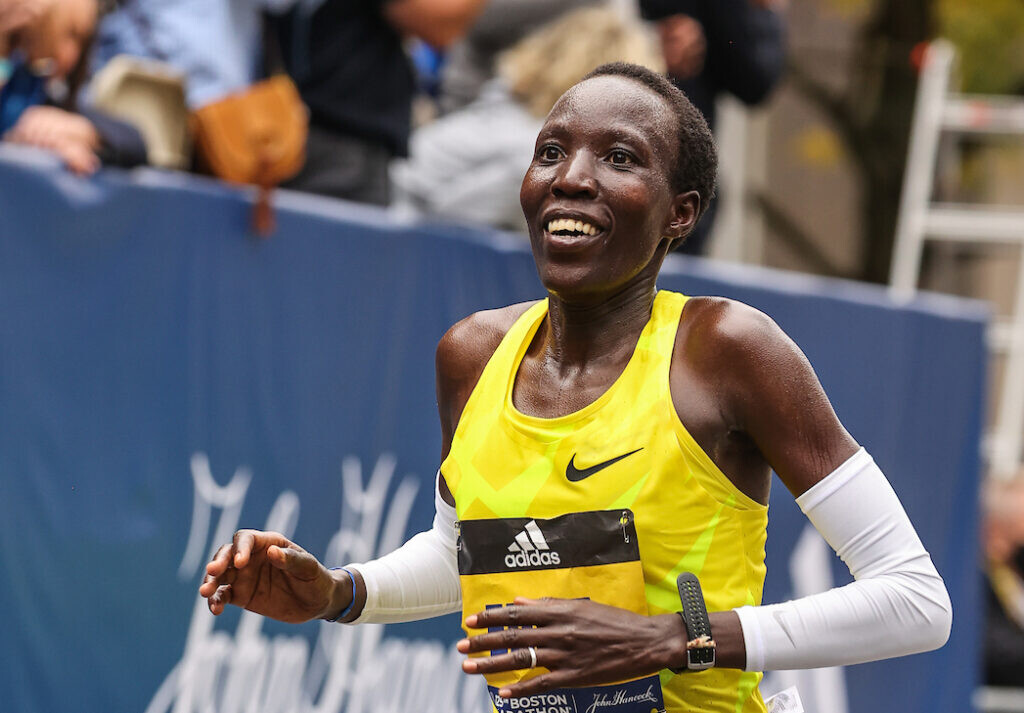
Also back is Joyciline Jepkosgei of Kenya, a past winner of the New York City and London Marathons. Jepkosgei fell shy of her expectations in her 2022 debut, with a seventh-place finish. She will look to better her time of 2:24:43 in 2023.
Among the American contingent are Sara Hall, Aliphine Tuliamuk, Emma Bates, Nell Rojas and 2018 champion Des Linden. Rojas has finished as the top American at Boston two years in a row (fifth in 2021 and 10th, 2:25:57 in April 2022), while Hall and Bates were fifth and seventh in the marathon at the 2022 World Athletics Championships in Eugene, Ore.
Canada will be well represented in Boston with three athletes on the elite list. Liza Howard, the top Canadian at the 2022 Chicago Marathon, will lead the way with the top qualifying mark of 2:35:29. Howard is an up-and-coming marathoner out of Toronto, who had a breakthrough 2022 with a 19th-place finish in Chicago and a 12th-place result at the Canadian 10K Championships in Ottawa last May.
Other Canadians on the elite list are 2004 1,500m Olympian and masters athlete Carmen Hussar, who has returned to racing recently, coming off a Boxing Day 10 Miler win in Hamilton, Ont., and Julie Lajeunesse of Montreal, with a personal best of 2:44:49 from the 2022 Chicago Marathon.
by Marley Dickinson
Login to leave a comment
Boston Marathon
Among the nation’s oldest athletic clubs, the B.A.A. was established in 1887, and, in 1896, more than half of the U.S. Olympic Team at the first modern games was composed of B.A.A. club members. The Olympic Games provided the inspiration for the first Boston Marathon, which culminated the B.A.A. Games on April 19, 1897. John J. McDermott emerged from a...
more...Who Wore Which Shoes at the New York City Marathon?
The running shoe hype train was high in New York City with a few fast yet-to-be-released shoes in the men’s and women’s elite fields.
For a few miles early in the New York City Marathon, Desi Linden surged into the lead of the women’s elite field. The two-time Olympian and 2018 Boston Marathon champion didn’t think she’d run away and win the race that way, but she was just trying to keep the pace honest.
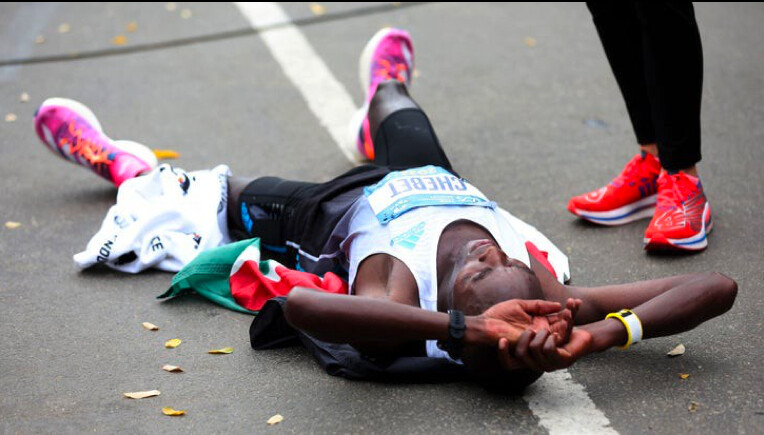
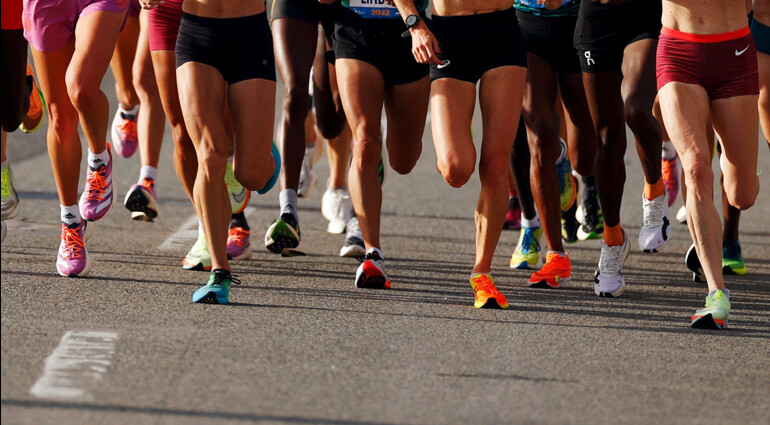
However, hiding in plain sight on her feet as she was off the front of the pack was a yet-to-be-released pair of orange, white and black Brooks prototype racing shoes. A day later, no one is willing to give up any details of the shoe, except that, like all of the other top-tier racing shoes in both the men’s and women’s elite fields, it features a carbon plate embedded in a hyper-responsive foam midsole. And although it’s all in accordance with World Athletics regulations, it won’t be released in Spring 2024 … so we’ll all have to wait a bit to see what that shoe is all about.
Linden’s shoes weren’t the only speedy outliers among the top 25 men’s and women’s finishers. While Nike, Adidas and ASICS shoes were the most prevalent brands among elite runners, there were several shoes that aren’t yet available to the public.
For example, the first runner to cross the finish line of this year’s New York City Marathon, women’s winner Sharon Lokedi, was wearing a pair of Under Armour Velociti Elite shoes. That’s notable for several reasons—because it was Lokedi’s first marathon, because the shoe won’t become available until early 2023 and because it’s the first podium finish at a major international marathon for a runner wearing Under Armour shoes.
There were also three pairs of yet-to-be-released Hoka Rocket X 2 shoes on the feet of three Hoka NAZ Elite runners — two of whom set new personal best times, Aliphine Tuliamuk (7th, 2:26:18) Matthew Baxter (12th, 2:17:15). Those fluorescent yellow shoes with orange, white and blue accents and blue laces were on the feet of Hoka pros at the Boston Marathon in April and Ironman World Championships in Hawaii in October, but they won’t be released to the public until late February or early March.
Meanwhile, the winner of the men’s race, Evans Chebet, was wearing a pair of Adidas Adizero Adios Pro 3, a shoe worn by four other runners in the top 25 of the men’s race and six among the women’s top 25, making it the second most prevalent model among the elites. Oddly, that was the same shoe worn by Brazil’s Daniel do Nascimento, who went out at record-setting sub-2:03 pace on his own, only to crumple to the ground at mile 21 after succumbing to fatigue and cramping.
The most common shoe among the top finishers was the Nike ZoomX Vaporfly Next% 2, which was on the feet of 11 of the 50 runners among the women’s and men’s top 25 finishers. There were eight runners wearing either the first or second version of the ASICS MetaSpeed Sky.
Six runners wore Nike Air Zoom Alphafly Flyknit shoes, three wore Nike Air Zoom Alphalfy NEXT% 2. There were two pairs of On Cloudboom Echo 3 in the field, including those worn by Hellen Obiri who finished sixth while running a 2:25:49 in her marathon debut, while three runners wore Puma Fast R Nitro Elite.
And what about actor Ashton Kutcher? He wore a pair of purple Nike Air Zoom Alphafly NEXT% Flyknit shoes and finished in a very respectable 3:54:01.
Matt James, the former lead of the Bachelor, finished in 3:46:45 with Shalane Flanagan as his guide wearing a pair of New Balance FuelCell Comp Trainer shoes. Flanagan wore Nike Air Zoom Alphafly Next% Flyknit shoes, as did Meghan Duggan, an Olympic gold medalist hockey player who ran a solid 3:52:03. Lauren Ridloff, actress from “The Walking Dead,” ran in a pair of Brooks Glycerin 20 and finished in 4:05:48, while Chelsea Clinton, daughter of Bill and Hillary Clinton finished in 4:20:34 wearing a pair of Brooks Ghost 14 and Tommy Rivers Puzey (aka “Tommy Rivs,” a former elite runner who survived a deadly bout of cancer in 2020, wore a pair of Craft CTM Ultra Carbon Race Rebel and finished in 6:13:54.
Here’s a rundown of what was on the feet of the top 25 women’s and men’s finishers in the Big Apple.
1. Sharon Lokedi (Kenya) 2:23:23 — Under Armour Velociti Elite
2. Lonah Salpeter (Israel) 2:23:30 — Nike ZoomX Vaporfly Next% 2
3. Gotytom Gebreslase (Ethiopia) 2:23:39 – Nike ZoomX Vaporfly Next% 2
4. Edna Kiplagat (Kenya) 2:24:16 — Nike ZoomX Vaporfly Next% 2
5. Viola Cheptoo (Kenya) 2:25:34 — Adidas Adizero Adios Pro 3
6. Hellen Obiri (Kenya) 2:25:49 — On Cloudboom Echo 3
7. Aliphine Tuliamuk (USA) 2:26:18 — Hoka Rocket X 2
8. Emma Bates (USA) 2:26:53 — ASICS MetaSpeed Sky+
9. Jessica Stenson (Australia) 2:27:27 – ASICS MetaSpeed Sky
10. Nell Rojas (USA) 2:28:32 — Nike Air Zoom Alphafly Flyknit
11. Lindsay Flanagan (USA) 2:29:28 – ASICS MetaSpeed Sky
12. Gerda Steyn (South Africa) 2:30:22 — Adidas Adizero Adios Pro 3
13. Stephanie Bruce (USA) 2:30:34 — Hoka Rocket X 2
14. Caroline Rotich (Kenya) 2:30:59 — ASICS MetaSpeed Sky+
15. Keira D’Amato (USA) 2:31:31 — Nike Air Zoom Alphafly Flyknit
16. Des Linden (USA) 2:32:37 — Brooks Prototype
17. Mao Uesugi (Japan) 2:32:56 — Adidas Adizero Adios Pro 3
18. Eloise Wellings (Australia) 2:34:50 — Adidas Adizero Adios Pro 3
19. Sarah Pagano (USA) 2:35:03 — Adidas Adizero Adios Pro 3
20. Grace Kahura (Kenya) 2:35:32 — Nike ZoomX Vaporfly Next% 2
21. Annie Frisbie (USA) 2:35:35 — Puma Fast R Nitro Elite
22. Molly Grabill (USA) 2:39:45 — Nike Air Zoom Alphafly NEXT% Flyknit
23. Kayla Lampe (USA) 2:40:42 — ASICS MetaSpeed Sky+
24. Maegan Krifchin (USA) 2:40:52 — Adidas Adizero Adios Pro 3
25. Roberta Groner (USA) 2:43:06 — Nike Air Zoom Alphafly NEXT% 2
1. Evans Chebet (Kenya) 2:08:41 — Adidas Adizero Adios Pro 3
2. Shura Kitata (Ethiopia) 2:08:54 — Nike ZoomX Vaporfly Next% 2
3. Abdi Nageeye (Netherlands) 2:10:31 — Nike ZoomX Vaporfly Next% 2
4. Mohamed El Aaraby (Morocco) 2:11:00 — ASICS MetaSpeed Sky+
5. Suguru Osako (Japan) 2:11:31 — Nike ZoomX Vaporfly Next% 2
6. Tetsuya Yoroizaka (Japan) 2:12:12 — Nike ZoomX Vaporfly Next% 2
7. Albert Korir (Kenya) 2:13:27 — Adidas Adizero Adios Pro 3
8. Daniele Meucci (Italy) 2:13:29 — ASICS MetaSpeed Sky+
9. Scott Fauble (USA) 2:13:35 — Nike Air Zoom Alphafly NEXT% 2
10. Reed Fischer (USA) 2:15:23 — Adidas Adizero Adios Pro 3
11. Jared Ward (USA) 2:17:09 — Saucony Endorphin Pro 3
12. Matthew Baxter (New Zealand) 2:17:15 — Hoka Rocket X 2
13. Leonard Korir (USA) 2:17:29 — Nike ZoomX Vaporfly Next% 2
14. Matthew Llano (USA) 2:20:04 — Under Armour Velociti Elite
15. Olivier Irabaruta (Burundi) 2:20:14 — On Cloudboom Echo 3
16. Hendrik Pfeiffer (Germany) 2:22:31 — Puma Fast R Nitro Elite
17. Jonas Hampton (USA) 2:22:58 — Adidas Adizero Adios Pro 3
18. Alberto Mena (USA) 2:23:10 — Nike ZoomX Vaporfly Next% 2
19. Jacob Shiohira (USA) 2:23:33 — Nike Air Zoom Alphafly Flyknit
20. Edward Mulder (USA) 2:23:42 — Nike Air Zoom Alphafly Flyknit
21. Jordan Daniel (USA) 2:24:27 — Nike ZoomX Vaporfly Next% 2
22. Nathan Martin (USA) 2:25:27 — ASICS MetaSpeed Sky+
23. Jeff Thies (USA) 2:25:45 — Nike Air Zoom Alphafly NEXT% 2
24. Shadrack Kipchirchir (USA) 2:28:15 — Puma Fast R Nitro Elite
25. Abi Joseph (USA) 2:29:16 — Nike Air Zoom Alphafly Flyknit
by Outside
Login to leave a comment
Aliphine Tuliamuk says the weather at the NYC marathon was not as bad as she expected as she finished first American in 7th place
It did not take long for Aliphine Tuliamuk to find air conditioning after finishing seventh as the top American in the warmest New York City Marathon since 1985.
She picked up her giggling 21-month-old daughter, Zoe, and placed her face directly in front of the cool air.
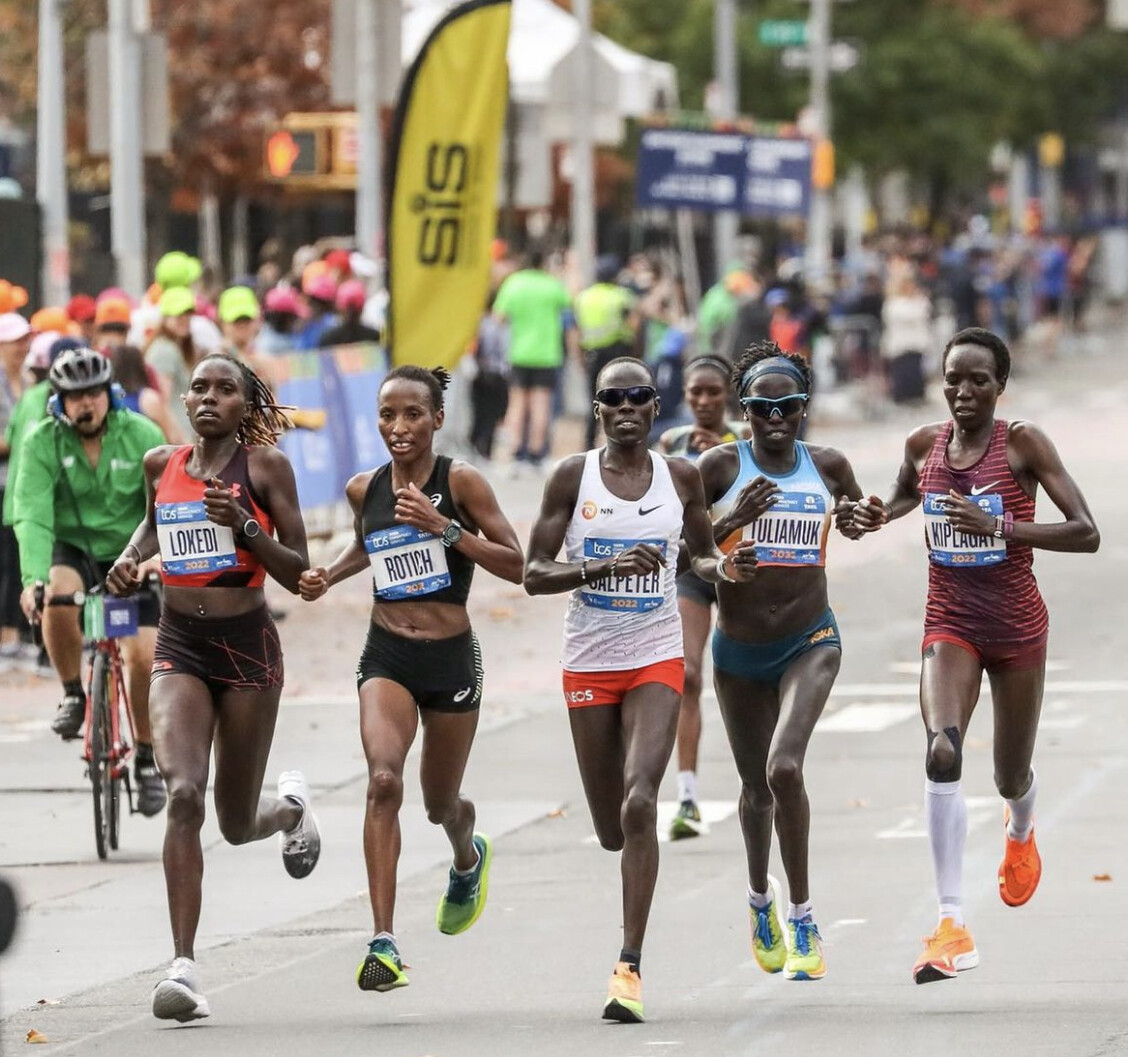
“To be honest with you, I don’t think it was actually as bad as I expected,” Tuliamuk said of the temperature, which reached 73 degrees when she crossed the Central Park finish line. “I was on point with my hydration.”
She clocked a personal-best 2:26:18, despite ankle swelling hampering her build up. She estimated that she only had five weeks of training before taking the last two weeks to taper.
“I excel when the conditions are not perfect,” she said. “I rise to the occasion, and I believe that today that was the case.”
Seventh was the lowest placing for the top American woman in New York City since 2015, when Laura Thweatt also finished seventh.
“I remember going into the race thinking, if I could get top seven, that would be really good,” Tuliamuk said. “I obviously wanted more.”
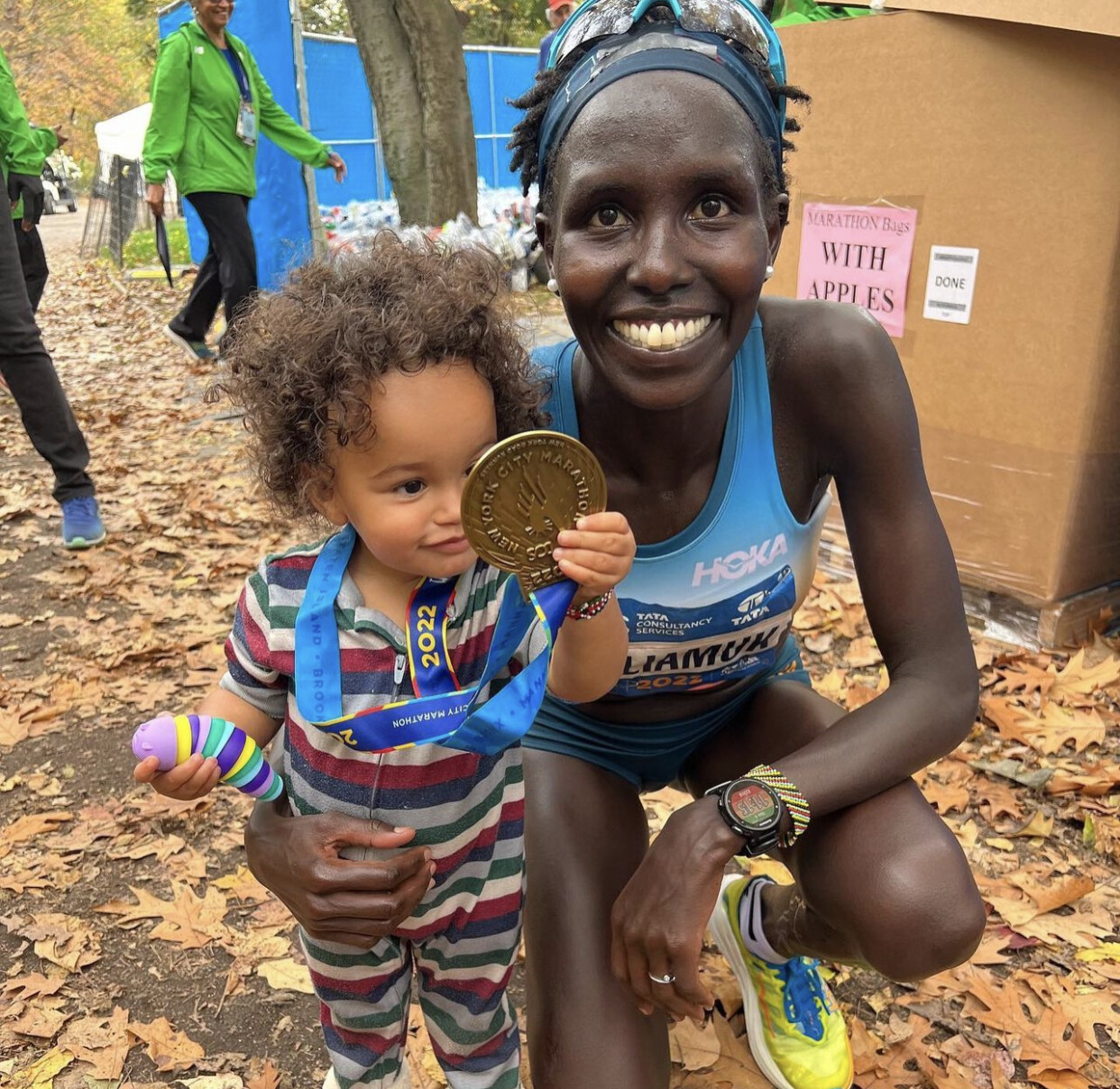
Tuliamuk is beginning to turn her attention to the Olympic Trials in the first quarter of 2024 at a to-be-announced site.
She plans on running a spring 2023 marathon, which could be her final marathon before trials, where the top three are expected to make up the team for the Paris Games.
“Once the [trials] schedule is out,” she said, “we’ll work backwards from that.
“I think that next Olympic team is going to be really, really hard to make.”
Tuliamuk identified Emma Bates, Keira D’Amato, Molly Seidel and Emily Sisson as her toughest competition. Sisson broke the American record at October’s Chicago Marathon, clocking 2:18:29 to lower D’Amato’s record from Jan. 16 by 43 seconds. Seidel claimed the bronze medal at the Tokyo Olympics.
“There’s so many Americans right now that are doing amazing,” Tuliamuk said. “It’s like you just have to have a perfect day.”
Tuliamuk made her Olympic debut at the Tokyo Games. She did not finish the race, seven months after she gave birth.
“I really want to make the next Olympic team,” she said. “The last one, the pandemic and having a child, I never really got to represent my country the way I wanted it.”
Tuliamuk will be 35 in 2024. The U.S. Olympic women’s marathon team included a 35-year-old at three of the last four Games.
“I really want a medal for my country,” she said. “I think that I have a lot of running in me. I have a lot of speed.”
Bates, 30, finished 35 seconds behind Tuliamuk for eighth place on Sunday.
“Those hills were a lot harder than I imagined,” said Bates, who revealed that she did not look at the course map before the race.
Bates wore a matching snake ring and earrings as she made her New York City debut, one year after placing second at the Chicago Marathon.
“I think I’m going to take some more risks next time,” she said. “Hopefully I’ll do better next time. I want to be top five.”
It was a big 48 hours for Bates, who was inducted into the Boise State Hall of Fame on Friday. She planned on celebrating with a Modelo beer.
Tuliamuk envisioned a tamer celebration, including showing Zoe around Central Park and other tourist attractions.
“I’m really grateful that I’m able to do all of it,” she said. “I’m able to run at the very highest level of our sport and be a mom at the same time.”
Login to leave a comment
TCS New York City Marathon
The first New York City Marathon, organized in 1970 by Fred Lebow and Vince Chiappetta, was held entirely in Central Park. Of 127 entrants, only 55 men finished; the sole female entrant dropped out due to illness. Winners were given inexpensive wristwatches and recycled baseball and bowling trophies. The entry fee was $1 and the total event budget...
more...The Kenyan duo won the elite races in 2:23:23 and 2:08:41 at the NYC Marathon having to make up significant ground on the long-time leaders
Sharon Lokedi displayed remarkable discipline to win the TCS New York City Marathon on her debut at the distance, while Evans Chebet’s patience paid off to win the men’s contest at the World Athletics Elite Platinum Label road race on Sunday March 6.
Lokedi flew under the radar heading into the women’s race as most of the focus was on world champion Gotytom Gebreslase, two-time world 5000m champion Hellen Obiri, who was making her marathon debut, and world bronze medallist Lonah Chemtai Salpeter.
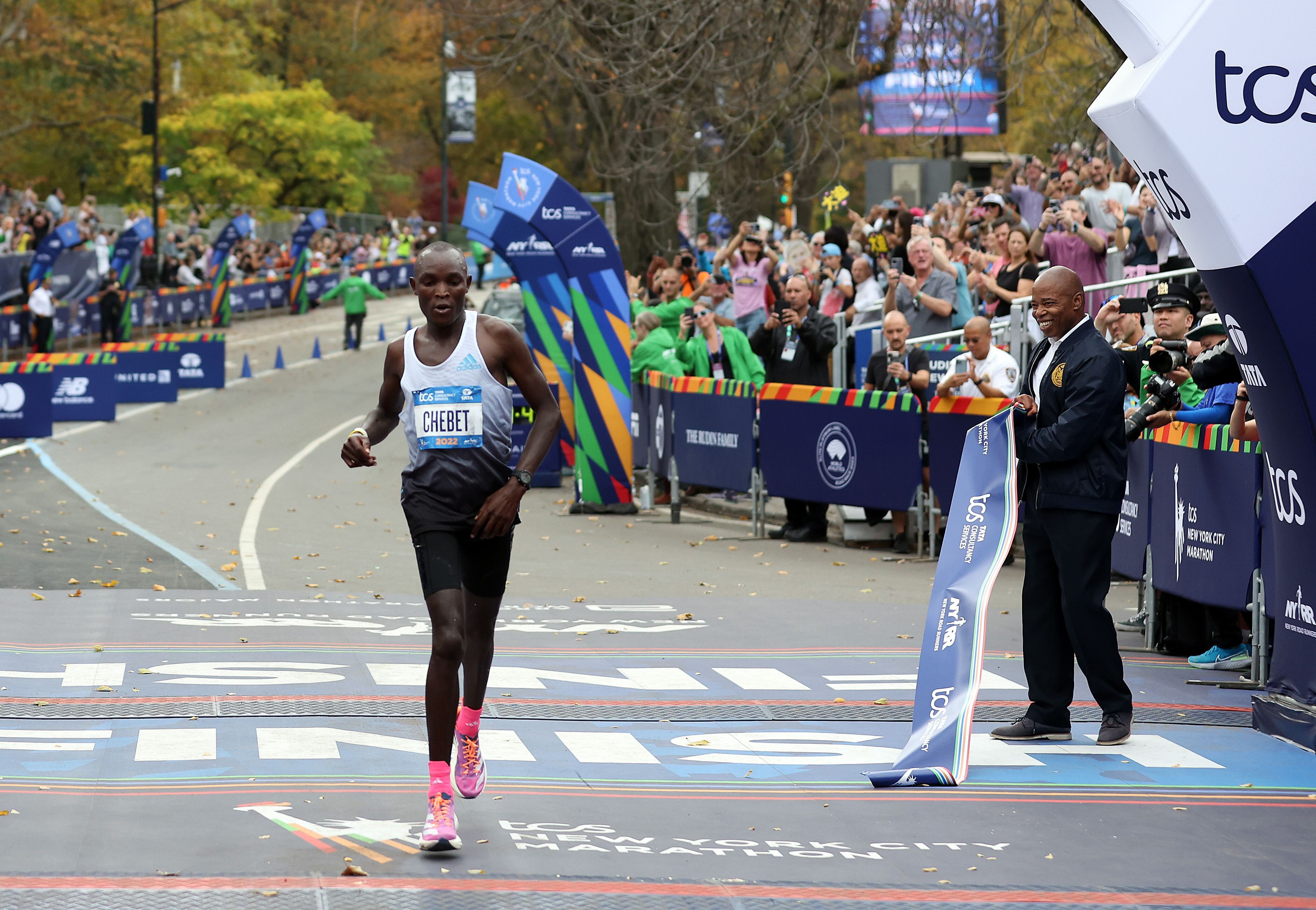
All four women featured in the large lead pack for the first half of the race as they passed through 10km in a conservative 34:24 before reaching the half-way point in 1:12:17. A few kilometres later, the pack had been whittled down to eight women, with two-time world champion Edna Kiplagat among them.
By 30km, however, three women had broken away from the rest of the field as Gebreslase, Obiri and Kenya’s Viola Cheptoo reached that checkpoint 1:42:27. At that point, Salpeter, Lokedi and Kiplagat were in a five-woman chase pack about 11 seconds adrift.
A few kilometres later, Salpeter and Lokedi caught the lead trio, then Cheptoo began to fade. It left Obiri, Gebreslase, Lokedi and Salpeter as the only four women in contention as they raced through Central Park in the closing stages.
Of those four, Obiri was the first to fall back, but she was far enough into the race to know that her debut marathon would not be a bad one. Somewhat surprisingly, Gebreslase was the next to slip out of contention, the world champion resigning herself to the third step on the podium.
It then left Salpeter and Lokedi to duel for the victory and for a moment it seemed as though Salpeter was the more comfortable. But with one mile to go, Lokedi dug deep and started to pull away from the Israeli runner.
Lokedi reached the finish line in 2:23:23 to win by seven seconds from Salpeter. Gebreslase took third place in 2:23:39 with Kiplagat, nine days shy of her 43rd birthday, coming through to take fourth place in 2:24:16 – more than four minutes quicker than her winning time in this race in 2010.
Cheptoo held on for fifth place in 2:25:34 and Obiri finished sixth in 2:25:49. Olympian Aliphine Tuliamuk was the top US finisher in seventh, 2:26:18.
“It was amazing,” said the US-based Lokedi. “I came in just wanting to be in the thick of the race. I knew I was strong and had really good training, so I wanted to go in and put myself in it and see where I ended up. I expected to run well, but it ended up being an even better outcome than I had hoped for.”
The men’s race played out quite differently, as South American record-holder Daniel Do Nascimento made an early break from the rest of the field.
The Brazilian led by 97 seconds at 10km, reached in 28:42 – just two seconds slower than his 10,000m track PB – and went on to reach half way in 1:01:22, more than two minutes ahead of the rest of the field and well inside course record pace.
A six-man chase pack – which included Chebet, Olympic silver medallist Abdi Nageeye, and 2020 London Marathon champion Shura Kitata – went through the half-way point in a more comfortable 1:03:35.
Do Nascimento continued to lead, although his lead started to wane – especially when he had to briefly take a visit to one of the road-side portable toilets. He passed through 30km in 1:29:09, now just over a minute ahead of Chebet, who had broken away from the rest of the chasers. By 20 miles, Do Nascimento’s lead was down to just 40 seconds. Not long after, and clearly struggling, he stopped running and crashed to the ground.
While medics helped Do Nascimento, Chebet cruised past. The Kenyan, who had won the Boston Marathon earlier this year, found himself with a 30-second lead over a three-man chasing group which included Kitata and Nageeye.
Despite a strong finish from Kitata, Chebet managed to hold on to the lead and crossed the finish line in 2:08:41. Kitata followed 13 seconds later, while Nageeye took third place in 2:10:31.
“The race was hard for me, but I was thankful for my team and have so much gratitude toward my coach,” Chebet said. “My team gave me motivation and I know that after winning Boston I could come to New York and also do well.”
Leading results
Women
1 Sharon Lokedi (KEN) 2:23:232 Lonah Salpeter (ISR) 2:23:303 Gotytom Gebreslase (ETH) 2:23:394 Edna Kiplagat (KEN) 2:24:165 Viola Cheptoo (KEN) 2:25:346 Hellen Obiri (KEN) 2:25:497 Aliphine Tuliamuk (USA) 2:26:188 Emma Bates (USA) 2:26:539 Jessica Stenson (AUS) 2:27:2710 Nell Rojas (USA) 2:28:32
Men
1 Evans Chebet (KEN) 2:08:412 Shura Kitata (ETH) 2:08:543 Abdi Nageeye (NED) 2:10:314 Mohamed El Aaraby (MAR) 2:11:005 Suguru Osako (JPN) 2:11:316 Tetsuya Yoroizaka (JPN) 2:12:127 Albert Korir (KEN) 2:13:278 Daniele Meucci (ITA) 2:13:299 Scott Fauble (USA) 2:13:3510 Reed Fischer 2:15:23
by World Athletics
Login to leave a comment
TCS New York City Marathon
The first New York City Marathon, organized in 1970 by Fred Lebow and Vince Chiappetta, was held entirely in Central Park. Of 127 entrants, only 55 men finished; the sole female entrant dropped out due to illness. Winners were given inexpensive wristwatches and recycled baseball and bowling trophies. The entry fee was $1 and the total event budget...
more...2022 New York City Marathon Sharon Lokedi and Evans Chebet Complete a Kenyan Sweep
In record heat for November, Kenyans dominate the New York City Marathon.
Evans Chebet was among the runners who watched as Daniel do Nascimento separated himself from the rest of the men’s field at the New York City Marathon on Sunday. Do Nascimento, a 24-year-old Brazilian who is known for being — what is the word? — assertive, was a blur as he surged into the lead, then a speck off in the distance, and then gone from view entirely.
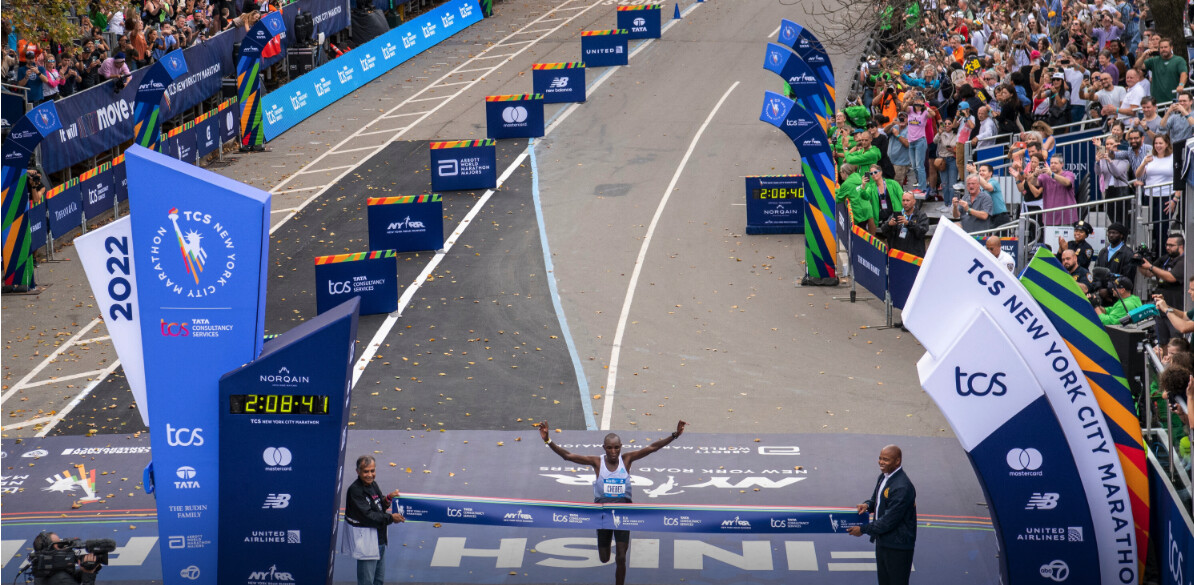
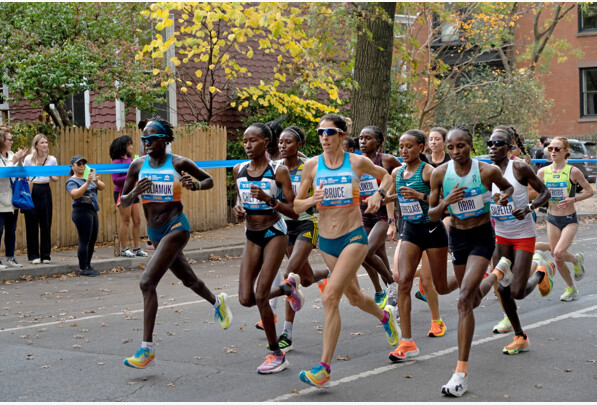
Chebet, a soft-spoken Kenyan who arrived in New York having already won the Boston Marathon this year, opted to exercise patience. Sure enough, as he approached the 21st mile of Sunday’s race, he saw do Nascimento again: face down by the side of the road, being tended to by medical personnel.
“I felt bad for him,” Chebet said in Swahili through a translator, “but I had to continue the race.”
On an unseasonably warm day, Chebet survived both the conditions and the competition, winning in 2 hours 8 minutes 41 seconds to complete a clean sweep for Kenyan men in all six of the world marathon majors this year. Chebet, 33, did his part by winning two of them — and two of the toughest. Of course, considering what Chebet had done in Boston, no one was surprised to see him tackle New York with great composure.
“Boston was actually harder,” said Chebet, who wore his laurel wreath to his news conference.
The women’s finish was much more unexpected. Sharon Lokedi, a Kenyan who raced in college at Kansas, was fearless in her marathon debut, breaking free from a celebrated field to win in 2:23:23.“Perfect weather for me,” said Lokedi, 28, who splits her time between Kenya and Flagstaff, Ariz., where she trains with the Under Armour-sponsored Dark Sky Distance group. “I didn’t expect to win. I expected to run well. But it ended up being a good outcome.”
Lokedi left an all-star cast in her wake. Lonah Chemtai Salpeter, a Kenyan-born Israeli who arrived in New York with the fastest time in the field, finished second. Gotytom Gebreslase of Ethiopia, the reigning world champion, was third. Edna Kiplagat of Kenya, who, at 42, is one of the world’s most decorated marathoners, was fourth. And Viola Cheptoo of Kenya, last year’s runner-up, was fifth.
“It was hot, but I was really prepared,” said Lokedi, who was the N.C.A.A. champion in the 10,000 meters in 2018. “I picked up water at every station to pour on myself.”Do Nascimento, who set a South American record when he finished third in the Seoul Marathon this year in 2:04:51, was the story in New York for much of the morning — until it all began to go poorly for him. Easily recognizable in his lavender tights and space-age sunglasses, he built a two-minute lead more than halfway through the race. But others in the field had seen him try that sort of bold strategy before.In brutal conditions at the Tokyo Olympics last year, do Nascimento was among the leaders when he collapsed in scenes that were vaguely horrifying and was forced to withdraw.
On Sunday, his superhuman pace was beginning to slow when he pulled off the course for an 18-second pit stop at a portable toilet. He emerged with his lead intact, albeit narrower, but it was clear that he was in trouble. About six miles short of the finish, he sank to the pavement and was forced to abandon the race.
“I want to feel sorry for him when I saw him on the ground,” said Abdi Nageeye of the Netherlands, who finished third. “But I was like, ‘Come on, man, this is the second time. You did that in the Olympics.’ ”
A spokesman for the marathon said do Nascimento was recovering at his hotel.
It was not an easy day for anyone. Galen Rupp, a two-time Olympic medalist who was making his long-awaited New York debut, dropped out about 18 miles into the race with a hip injury. And Shura Kitata of Ethiopia, who finished second behind Chebet, lumbered onto the stage for his news conference as if his legs were made of concrete. A race official handed Kitata a giant bag of ice, which he placed on his thighs.“It was very hot,” he said through a translator, “and that made it very tough.”
It was the warmest marathon on record since the race was moved to its traditional early November date in 1986. The temperature in Central Park was 73 degrees Fahrenheit at 11 a.m., shortly before the elite runners began to cross the finish line.
Scott Fauble, 31, was the top American on the men’s side, finishing ninth — a solid result coming the morning after he signed a new sponsorship deal with Nike. Fauble, who was also the top American finisher at the Boston Marathon this year, had been without a sponsor for months.
After agreeing to terms on a contract at dinner on Saturday night, Fauble took an Uber to the Nike store in Manhattan to pick up sneakers. The rest of his racing gear arrived at his hotel later that night.
“It’s quite a rush to get your singlet for the next day at 10 p.m. the night before the race,” he said.
On the women’s side, three Americans finished in the top 10. Aliphine Tuliamuk was seventh, Emma Bates was eighth and Nell Rojas was 10th. Tuliamuk, 33, who won the marathon at the U.S. Olympic trials in 2020 and gave birth to her daughter, Zoe, in January 2021, had not raced in a marathon since she injured herself at the Tokyo Games last year. On Sunday, she finished in a personal-best time of 2:26:18.
“I think that I excel when the conditions are not perfect,” Tuliamuk said. “I rise to the occasion, and I believe that today that was the case.”
Still, she had to overcome some adversity. In early September, she said, she experienced swelling in one of her ankles that forced her to take a couple of weeks off from training.
“In the back of my mind, I wished that I had a few more weeks” to train, she said. “But I also decided to focus on gratitude because I didn’t know that I was going to be here. And the fact that I was able to put in some solid training and had a chance to be competitive, I was just very grateful for that.”Gina Gregorio always watches the race from the corner of Warren Street and Fourth Avenue. This year she held signs that read, “Run to the Polls.”
“I love it when we’re right before the election because we can actually ask people to get out to vote, and it’s like nonpartisan, although I have had partisan signs before because I feel like it’s a great place to have your voice heard,” Gregorio said.
Login to leave a comment
TCS New York City Marathon
The first New York City Marathon, organized in 1970 by Fred Lebow and Vince Chiappetta, was held entirely in Central Park. Of 127 entrants, only 55 men finished; the sole female entrant dropped out due to illness. Winners were given inexpensive wristwatches and recycled baseball and bowling trophies. The entry fee was $1 and the total event budget...
more...Kenyan Celestine Chepchirchir will be targeting a first World Marathon Majors title when she makes her debut at the Chicago Marathon
Reigning La Rochelle Marathon champion Celestine Chepchirchir will be targeting a first World Marathon Majors title when she makes her debut at the Chicago Marathon on October 9.
Chepchirchir, who has competed in seven marathons across the world, said: “This is my first time competing at the World Marathon Majors, which are very competitive in nature but I want to give it my best and come home with something to smile about.”
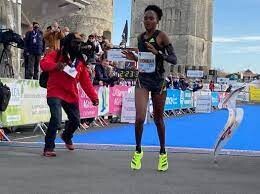
The former Cape Town marathon champion earned the Chicago Marathon nod following her fourth-place finish at the Seoul Marathon in April in a time of clocking 2:20:10.
“Despite not winning the Seoul Marathon title, I set a good time that earned me a call to the Majors. Majority of athletes I ran with are in the Majors now. As I head to Chicago, I am targeting even better times to pave way for more top races in the future,” she added.
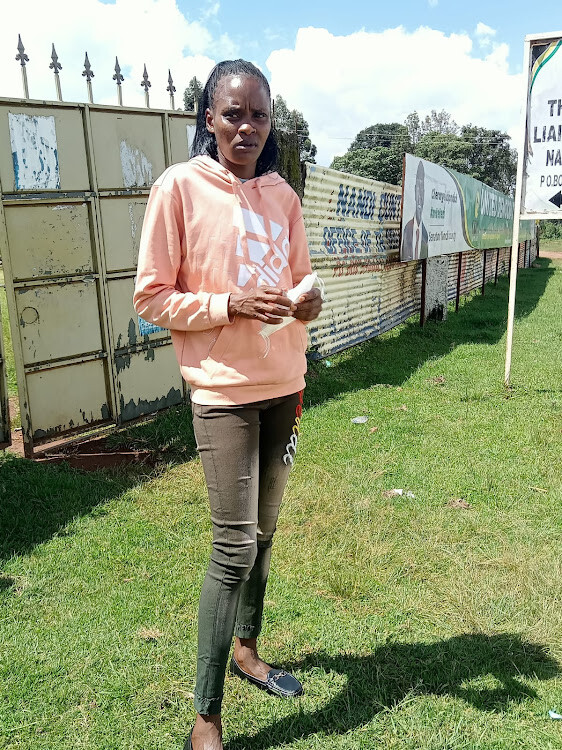
Chepchirchir said her training in Kapsabet has been top-notch and expects handsome rewards in one of the most congested and competitive races in the world.
“Looking at the names on the start list, I expect a very competitive race,” she added.
She will be up against compatriot Ruth Chepngetich, the defending champion and former world marathon champion.
Last year, Chepngetich won the title in 2:22:31 ahead of USA’s Emma Bates (2:24:20) and Sarah Hall in 2:27:19 for third.
Last year's third-place finisher Erick Kiptanui headlines the Kenyan contingent which also has Bernard Koech, Elisha Rotich, Benson Kipruto, and John Korir.
by Emmanuel Sabuni
Login to leave a comment
Bank of America Chicago
Running the Bank of America Chicago Marathon is the pinnacle of achievement for elite athletes and everyday runners alike. On race day, runners from all 50 states and more than 100 countries will set out to accomplish a personal dream by reaching the finish line in Grant Park. The Bank of America Chicago Marathon is known for its flat and...
more...World Championships Medalists Gotytom Gebreslase, Lonah Chemtai Salpeter, and Hellen Obiri to Join Women’s Field at 2022 TCS New York
Sara Hall, Emma Bates, Aliphine Tuliamuk, Des Linden, Nell Rojas, and Stephanie Bruce to anchor star-studded contingent of American women.
World Championships medalists Gotytom Gebreslase of Ethiopia, Lonah Chemtai Salpeter of Israel, and Hellen Obiri of Kenya will join previously announced New York City and Olympic champion Peres Jepchirchir in the women’s professional athlete division at this year’s TCS New York City Marathon on Sunday November 6. All three will make their TCS New York City Marathon debuts, with Obiri making her 26.2-mile debut across any course, and will line up against a star-studded contingent of American women that includes Sara Hall, Emma Bates, Aliphine Tuliamuk, Des Linden, Nell Rojas, and Stephanie Bruce. The 2022 TCS New York City Marathon women’s professional athlete field is presented by Mastercard®.
Women’s Open Division
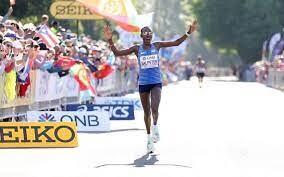
Fresh off her victory at the world championships marathon, where she finished the course in a championship-record time of 2:18:11, Gebreslase will make New York City her next stop. She will look to add a five-borough title to her resume, having previously won the 2021 Berlin Marathon and finished third at the 2022 Tokyo Marathon.
“Winning the World Championships was like a dream, and I am honored to run my next marathon in New York City,” Gebreslase said. “It’s home to the biggest marathon in the world, and many of the top athletes have run there. I understand it’s a challenging course, and I’m looking forward to seeing further success there.”
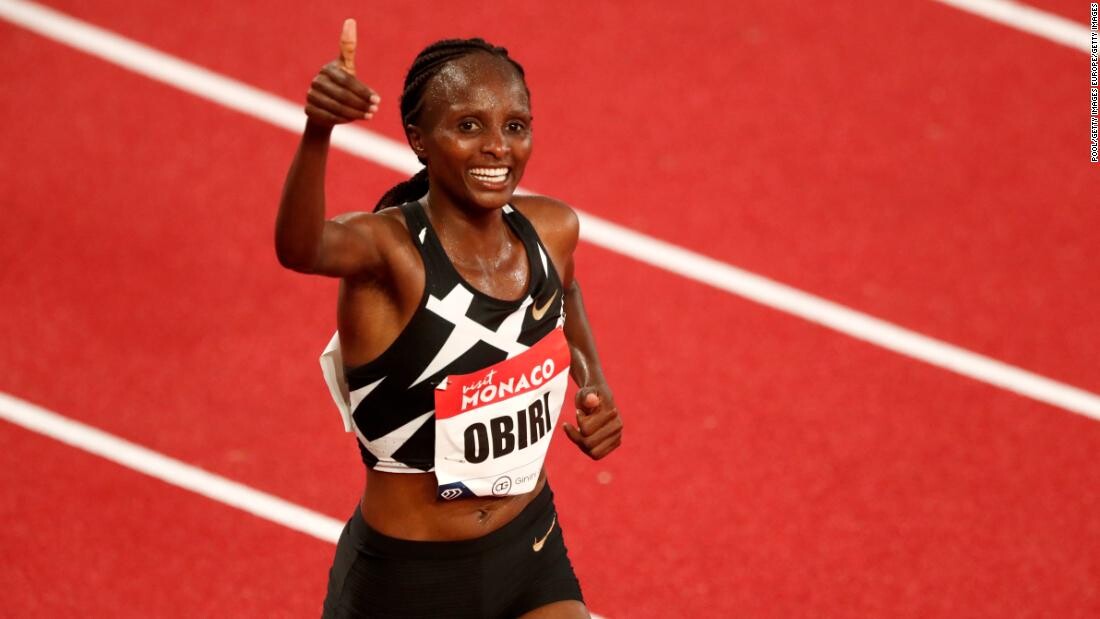
Two-time Olympian Salpeter, a Kenyan-born Israeli who won the bronze medal at the world championships marathon and was the 2020 Tokyo Marathon winner, will challenge Gebreslase once again. Obiri, a two-time Olympic medalist and seven-time individual world championships medalist, will make her highly anticipated marathon debut shortly after winning a world championships silver over 10,000 meters.
“I’m very excited to make my marathon debut at the TCS New York City Marathon,” Obiri said. “I have watched the race many times on TV and have seen my Kenyan colleagues compete there. I know New York is a tough course, but I hope my experience on track, road, and cross-country will help me navigate the ups and downs. I also plan to get advice and tips from coach Dathan Ritzenhein, who competed in the race several times in the past.”
In addition to Jepchirchir, the group will be racing against Ethiopia’s Senbere Teferi, who will look to become the first athlete to win the United Airlines NYC Half, Mastercard New York Mini 10K, and TCS New York City Marathon in one year. Three other Kenyans will also be strong contenders for podium places, including the 2010 New York City, 2014 London and 2017 Boston Marathon champion Edna Kiplagat, last year’s runner-up Viola Cheptoo, and newcomer Sharon Lokedi.
The American effort will be led by 10-time national champion Hall, who was the top world championships marathon finisher from the U.S. last month in Oregon, where she placed fifth. She is also the former half marathon national record holder, the runner-up from the 2020 London Marathon, and a two-time winner of the Mastercard New York Mini 10K. She will be joined at the Staten Island start line by Bates, who clocked a personal best to finish seventh at the world championships and was the runner-up at last year’s Chicago Marathon.
“From winning the Millrose mile to back-to-back Mini 10K wins, most of my favorite career moments have happened in NYC,” Hall said. “I’m all-in to add to that by having my best marathon yet at the TCS New York City Marathon. I can’t wait to be back racing my heart out in the five boroughs of my favorite city.”
Tokyo 2020 Olympian Aliphine Tuliamuk, and two-time Olympian and 2018 Boston Marathon champion Des Linden, will also return to New York, as will national champion Stephanie Bruce, who will race the five boroughs for the final time before retiring. The deep U.S. women’s group will additionally include Nell Rojas, the top American finisher from the last two Boston Marathons, Lindsay Flanagan, the top American finisher from the 2022 United Airlines NYC Half, Annie Frisbie, last year’s seventh-place finisher, and her training partner Dakotah Lindwurm, who won Grandma’s Marathon in June. Emily Durgin, the sixth-fastest U.S. half marathoner of all-time, will make her marathon debut.
by Running USA
Login to leave a comment
TCS New York City Marathon
The first New York City Marathon, organized in 1970 by Fred Lebow and Vince Chiappetta, was held entirely in Central Park. Of 127 entrants, only 55 men finished; the sole female entrant dropped out due to illness. Winners were given inexpensive wristwatches and recycled baseball and bowling trophies. The entry fee was $1 and the total event budget...
more...Americans Hall, Bates, D’Amato Shine in World Championships Marathon A team effort pushed the Americans to three top-eight finishes
Ethiopia’s Gotytom Gebreslase ran the fastest, but Sara Hall, Emma Bates, and Keira D’Amato got the biggest cheers from the crowd at Monday morning’s world championship marathon in Eugene, Oregon.
Running in front of the home crowd, Hall, Bates, and D’Amato smartly hung back in the chase back for the first half of the race and then began to work their way up as some of the runners in the original lead pack began to blow up.
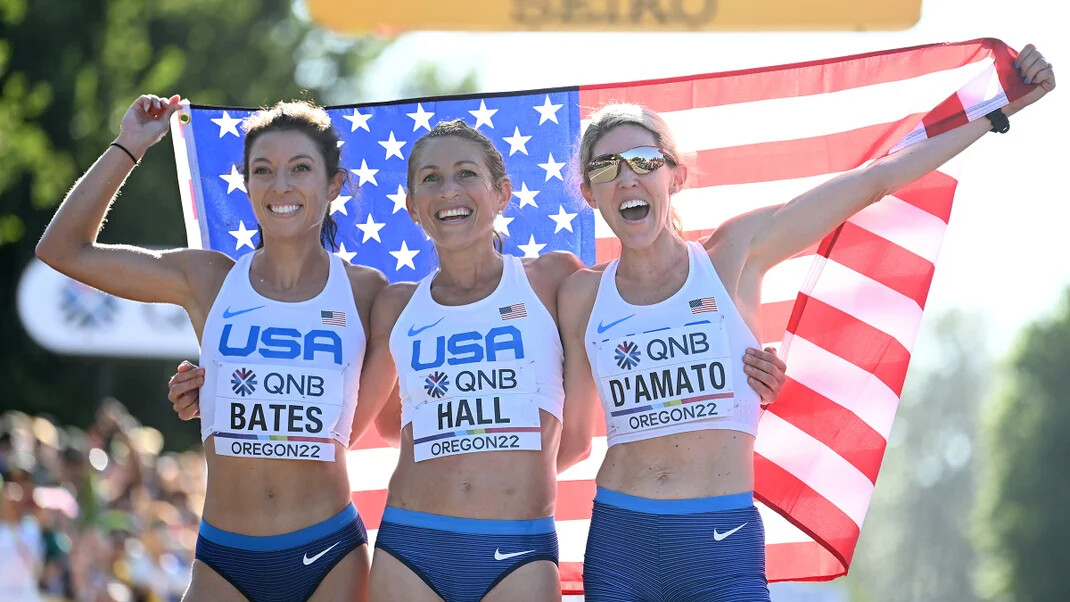
Hall (39, Crested Butte, Colorado) was the best of the bunch, surging throughout the final 8 miles of the race to place fifth in a season-best 2:22:10. She passed Kenya’s Angela Tanui (6th, 2:22:15) in the final mile but ran out of room in her pursuit of fourth-place finisher Nazaret Weldu of Eritrea (2:20:29). Hall’s finish was the best showing by an American woman in the world championships marathon since Amy Cragg earned the bronze in 2017 in London.
Bates (29, Boulder, Colorado) followed a similar strategy and wasn’t far behind in seventh in a new personal best of 2:23:18. D’Amato (37, Richmond, Virginia), who originally had gone out a bit harder only to get stuck in between the first two packs, eventually settled in with the chase pack alongside Hall, Bates, and British runner Jess Piasecki and Uganda’s Immaculate Chemutai.
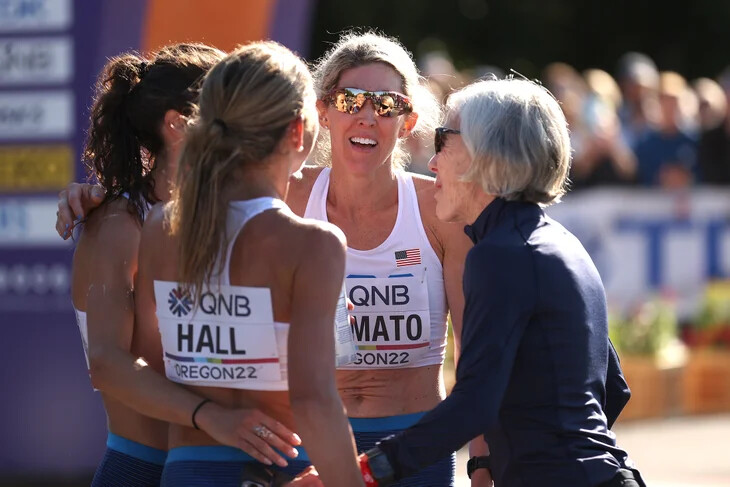
Hall, Bates, and D’Amato received roaring cheers from the crowd along the course that sent runners between Eugene and nearby Springfield, especially along the finish chute on Dr. Martin Luther King Drive. None had represented Team USA at a global outdoor championship before.
They were greeted at the finish line by American running legend Joan Benoit Samuelson, who won the 1984 Olympic marathon and served as the official starter of the women’s world championships race.
by BRIAN METZLER (Women's Running)
Login to leave a comment
World Athletics Championships Budapest23
Budapest is a true capital of sports, which is one of the reasons why the World Athletics Championships Budapest 2023 is in the right place here. Here are some of the most important world athletics events and venues where we have witnessed moments of sporting history. Throughout the 125-year history of Hungarian athletics, the country and Budapest have hosted numerous...
more...Gotytom Gebreslase Wins World Marathon Gold in Championship Record
With a strong downhill surge in the 41st kilometer, Gotytom Gebreslase of Ethiopia won the 2022 world marathon title in 2:18:11. The time set a new championship record; the previous mark of 2:20:57 was held by Paula Radcliffe.
Judith Korir of Kenya, who led Gebreslase by half a step for most of the closing miles, finished second in 2:18:18, and Lonah Salpeter of Israel took the bronze medal in 2:20:18.
Sara Hall was the top American finisher, placing fifth in 2:22:10. Emma Bates placed seventh in a personal best of 2:23:18, and U.S. record-holder Keira D’Amato finished eighth in 2:23:34. D’Amato was added to the team at the beginning of the month after Molly Seidel withdrew because of injury. The three ran together through the middle miles until Hall, ninth at halfway, pulled away and started picking off former members of the lead pack.
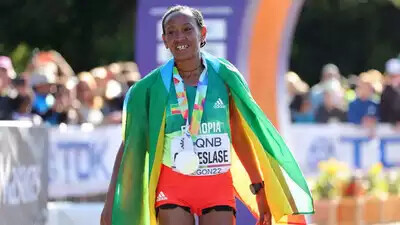
Today’s 5-7-8 is the best team performance by a U.S. squad, male or female, since the marathon world championship was first run in 1983. They succeeded thanks to just the right mixture of aggressiveness and patience.
“I went out with the leaders, but then I could tell it was a little too fast,” Hall said. “So fortunately I had talked to Emma and Keira and been like,‘Hey, I’d love to work with you guys. I don’t want to mess up your mojo, but if we’re together somewhere I’d love to work together.’ So thankfully Emma and I found each other.
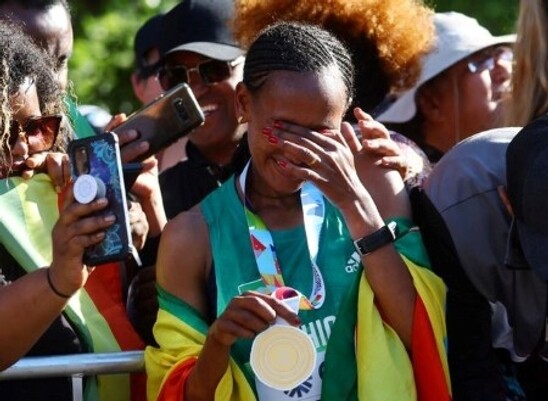
"I was checking our splits and we were running plenty fast out there, so I didn’t really want to run faster than that,” Hall continued. “It was awesome to get to work with [Emma] for so much of the race.”
Bates, who was the top American at Chicago last October, said, “My coach and I had decided that I go out in 70-minute pace for the first half. Which I had never done before, that’s close to my PR for the half marathon. We knew I could be in 2:20 range, fitness-wise.
“I went out with Sara. We were planning on working together before the race, so it was great the first lap to be with each other and then the second lap. Sara took off the later portion of the second lap. So proud of her today for going after it. She really pulled me along that first bit.
“I’m very happy,” Bates continued. “I always want more, we always want more. But to be top 10 in the world is something really really cool, especially on U.S. soil. And to run a PR doing it, it’s something that I won’t forget.”
Well past 30K, Hall was still acknowledging cheering spectators (including Olympian and fellow Flagstaff resident Rachel Schneider).
“I think this is the most fun I’ve ever had in a marathon,” Hall said. “I wanted to smile as much as I could early on, ’cause you know its gonna turn to a grimace eventually. But I was even smiling that last lap. I’m really thankful for everyone that turned out, ’cause I knew that this would be so special. I don’t know if I’ll ever get the opportunity to run a championship like this in the U.S. again.”
How the Race Was Won
Within the opening kilometer, it was obvious that the script for yesterday’s men’s marathon—a huge lead pack running cautiously for the first half—would be ignored. Headed by three Kenyans and three Ethiopians, the leaders took off at 2:17 marathon pace. D’Amato started with the pack but dropped back in the fifth kilometer; in the 12th kilometer, a chase pack led by Bates and Hall caught D’Amato, who then tucked in.
Toward the end of the first of three 14-kilometer loops, the chase pack got within 11 seconds of the leaders. Korir then spurted ahead just before an aid station. That reestablished a quicker tempo for the leaders, and the chase pack’s hope of joining the leaders was permanently ended.
The first significant event occurred in the 19th kilometer, when defending champion Ruth Chepngetich of Kenya stepped off the course, apparently looking for tall grass in which to make a pit stop. Sensing an opportunity, Gebreslase and fellow Ethiopian Ababel Yeshaneh surged on a downhill stretch. Subsequent kilometers of 3:05 and 3:09 (an average of roughly 5:00 mile pace) pared the group to four. They passed halfway in 69:01; the chase pack, including the three Americans, hit halfway in 70:17.
Toward the end of the second lap, Korir again surged approaching an aid station. Her teammate Angela Tanui briefly lost contact for the second time, clawed her way back, but was then dropped for good. In the 27th kilometer Yeshaneh started grabbing at her side and was left by the eventual gold and silver medalists.
Korir and Gebreslase ran within inches of each other for most of the third lap; the Ethiopian was usually just off of Korir’s right shoulder. Korir occasionally motioned to her rival to either help with the pace or back off a bit. It was hard to tell who was feeling more feisty or fatigued.
Or at least it was until the overpass over Route I-5. After cresting the summit, Gebreslase leaned into the long, gradual descent toward the finish. She almost immediately had two, then three, then five seconds on Korir. Gebreslase, who won Berlin last fall, had judged her effort perfectly. For the second day in a row, an Ethiopian won the world title in a championship record.
by Scott Douglas
Login to leave a comment
World Athletics Championships Budapest23
Budapest is a true capital of sports, which is one of the reasons why the World Athletics Championships Budapest 2023 is in the right place here. Here are some of the most important world athletics events and venues where we have witnessed moments of sporting history. Throughout the 125-year history of Hungarian athletics, the country and Budapest have hosted numerous...
more...World Athletics Championships Oregon22 preview: marathon
Kenya’s Geoffrey Kamworor, whose career was traumatized in June 2020 when he was hit by a motorbike during a training run and required surgery on a broken tibia, is due to contest his first major championship marathon in Eugene on July 17.
The 29-year-old from Nyen was named on the Kenyan team for the World Athletics Championships Oregon22 along with 33-year-old Lawrence Cherono – who missed a medal by one place in the marathon at last year’s Olympics – and 35-year-old Barnabas Kiptum.
Kamworor, confident and outgoing, was flying high when he had his accident.
Although he had performed to high levels on the track, where he earned 10,000m silver at the 2015 World Championships in Beijing, it was on grass and roads that he had excelled, winning the world cross-country senior titles in 2015 and 2017, and world half marathon titles in 2014, 2016 and 2018.
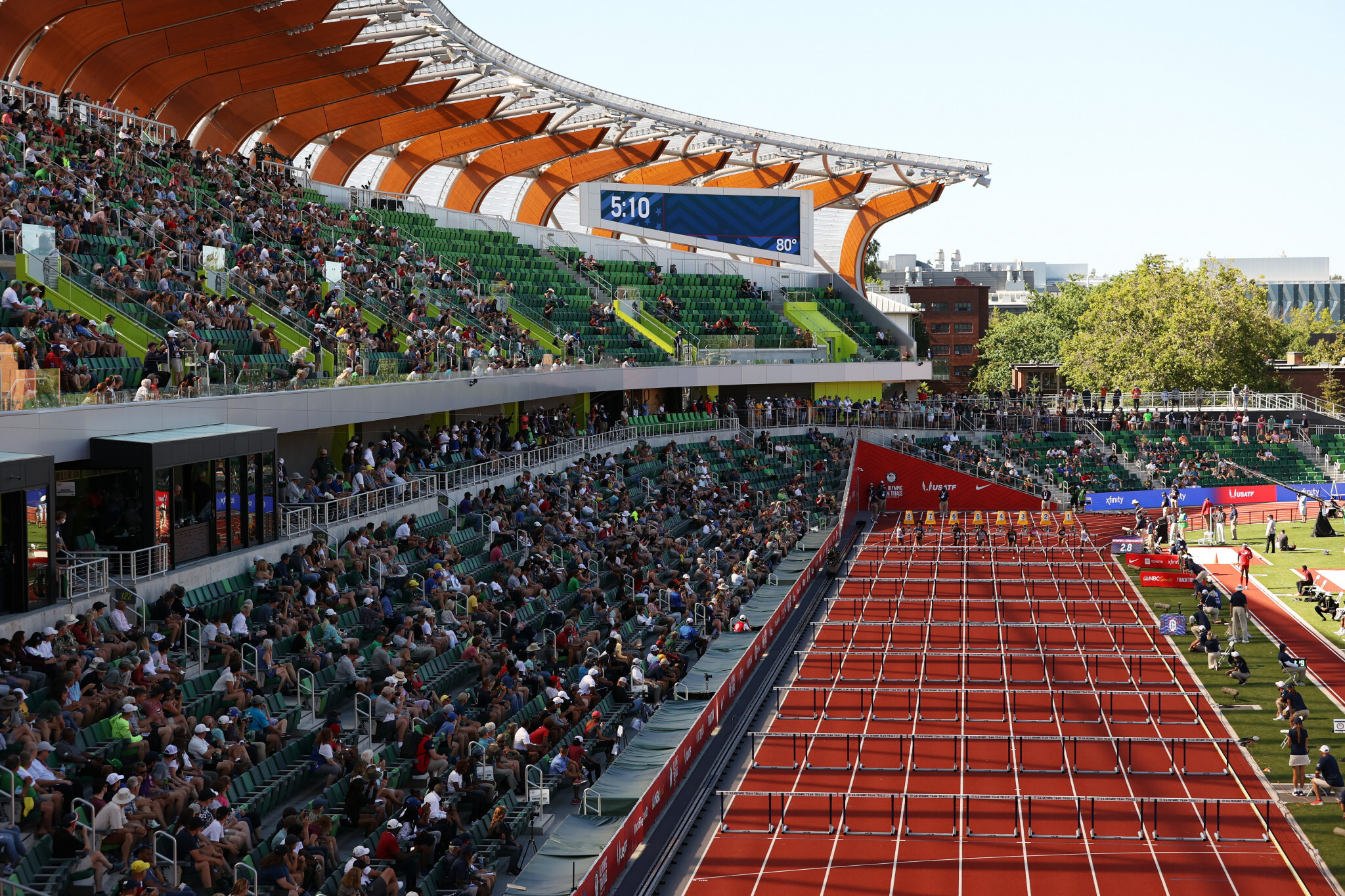
In his first competitive marathon in 2012 he finished third in Berlin in 2:06:12, and he was a consistent presence on the podium at World Majors Marathons thereafter, particularly in New York, where he finished second in 2015, first in 2017, third in 2018 and first again in 2019.
Kamworor ran his first race since the accident in January 2021, winning the Kenyan Police Cross Country Championships before going on to secure a place on Kenya’s Olympic 10,000m team after winning the national trials, only to have to pull out with an ankle injury.
But at the Valencia Marathon last December he was able to perform to the peak of his ability once more as he set a personal best of 2:05:23 in finishing fourth.
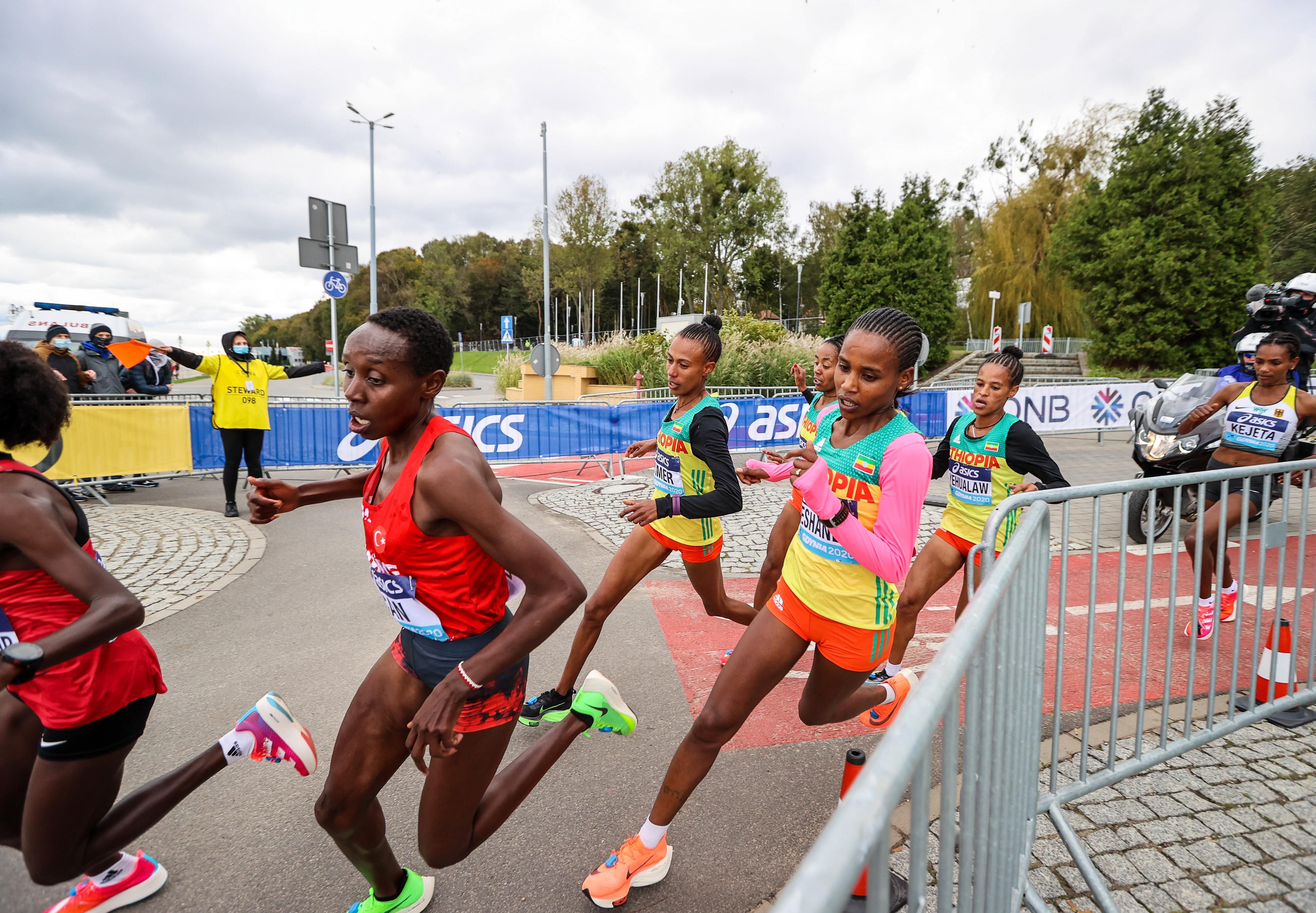
At the previous year’s running in Valencia, Cherono was second in a personal best of 2:03:04, putting him eighth on the world all-time list, having made his World Marathon Majors breakthrough in 2019 when he won in Boston in 2:07:57 and then Chicago in 2:05:45.
Like Kamworor, Kiptum also set a personal best last year as he clocked 2:04:17 in placing third at the Milan Marathon and he has a solid top-three record in virtually every race he has contested.
Such is the depth of Kenyan talent that they can name 2017 world champion Geoffrey Kirui as a reserve.
Meanwhile Kenya’s perennial rivals Ethiopia will be looking to their current world champion Lelisa Desisa, who found the way to win in the steamy heat of Doha three years ago, to make the most of his wild card entry to this year’s competition.
Desisa had early track success, winning the African U20 10,000m title in 2009, and he has since become a highly consistent performer at the highest level, achieving podium finishes four times in New York, including victory in 2018, and four times in Boston, where he won in 2013 and 2015.
He also has championship pedigree, having earned world silver in 2013 six years before his Doha gold, and has a personal best from 2013 of 2:04:45.
The formidable talent Ethiopia can call upon was made clear when it was confirmed that Desisa will have as teammates Tamirat Tola, Mosinet Geremew and Seifa Tura.
Tola earned Olympic 10,000m bronze in 2016 and world marathon silver in 2017. He set his personal best of 2:03:38 last year.
Geremew took silver behind Desisa at the 2019 World Championships, having finished second at that year’s London Marathon in 2:02:55, the third-fastest time in history.
Tura set his personal best of 2:04:29 last year in Milan before going on to win the Chicago Marathon in 2:06:12.
Uganda, the rising nation in distance running, earned this title in 2013 thanks to their 2012 Olympic champion Stephen Kiprotich. But the 33-year-old hasn’t been selected for Oregon, nor have Stephen Kissa, who ran a national record of 2:04:48 in Hamburg earlier this year, and Victor Kiplangat who was third in the second-fastest time ever by a Ugandan, 2:05:09.
Instead, Filex Chemonges, Fred Musobo and Jackson Kiprop will run the World Championships marathon, according to the Uganda Athletics Federation. So Kiprop, who helped Kiprotich to win the 2013 world title, is back at the World Championships for the first time since 2015.
Kissa, meanwhile, is due to be in Oregon in the 10,000m, where he will run with fellow Ugandan Joshua Cheptegei, the world 5000m and 10,000m record-holder, while Kiplangat is reported to be running the Commonwealth Games marathon.
Abdi Nageeye of the Netherlands and Belgium’s Bashir Abdi earned surprise silver and bronze medals respectively at the Olympics last year, but went on to confirm that their performance in Sapporo was anything but a fluke. Abdi set a European record of 2:03:36 to win the Rotterdam Marathon just two months later, while Nageeye was victorious at the Rotterdam Marathon earlier this year in a Dutch record of 2:04:56, finishing ahead of Abdi.
Both men will line up for the marathon in Oregon, only this time it will be less of a surprise if they reach the podium.
The United States will be looking to the highly consistent figure of Galen Rupp. After taking Olympic 10,000m silver in 2012, Rupp moved to the roads and earned Olympic bronze in 2016.
In 2017 he became the first US man to win the Chicago Marathon since 2002 and finished second at the Boston Marathon. He qualified for Oregon by finishing eighth at last year’s Olympics.
The championships will be in Rupp’s home state, in the same city where he made his first Olympic team in 2008 while he was a student at the University of Oregon.
The other US selections are Elkanah Kibet and Colin Mickow. Kibet, who is with the US military, finished 16th at the 2017 World Championships and set a personal best of 2:11:15 in finishing fourth at last year’s New York marathon.
Mickow is a 32-year-old full-time financial analyst for an organic and natural foods distributor who took up road running six years after finishing his college track career. He qualified for his first international vest after being the top US man home at last year’s Chicago Marathon, where he was sixth in 2:13:31.
Japan’s trio of male runners will be headed by Kengo Suzuki, who set a national record of 2:04:56 in February 2021 at the Lake Biwa marathon in Otsu. Daniel Do Nascimento of Brazil has run a 2:04:51 personal best this year and is another one to watch.
The three-loop World Athletics Championships marathon course only varies by about seven meters between its high and low points and the weather is likely to be considerably cooler than it was in Sapporo or Doha, where the men's marathon had to be held at midnight and the start time temperature was 29C/84F with 51% humidity.
Women's marathon
Ruth Chepngetich will defend her marathon title at the World Athletics Championships Oregon22 on July 18 by virtue of a wild card.
Chepngetich claimed the first gold medal of the 2019 World Championships, clocking 2:32:43 in the steamy heat to gain her first major gold.
She went on to finish third at the 2020 London Marathon before a roller coaster 2021, when she set a world record of 1:04:02 at the Istanbul Half Marathon, failed to finish the Tokyo 2020 Marathon in Sapporo but then won the Chicago Marathon.
At this year’s Nagoya Women's Marathon she won in 2:17:18, just 10 seconds off her personal best and the second-fastest ever women-only marathon.
She will be joined on the Kenyan team in Oregon by Judith Jeptum and Angela Tanui. Jeptum set a French all-comers’ record of 2:19:48 to win the Paris Marathon this year, while Tanui won the 2021 Amsterdam Marathon in 2:17:57.
Ethiopia will be represented by Gotytom Gebreslase, who won the 2021 Berlin Marathon on her debut and finished third in this year’s Tokyo Marathon in 2:18:18, Ababel Yeshaneh, second at the 2019 Chicago Marathon in a personal best of 2:20:51, and Ashete Bekere, third in last year’s London Marathon in 2:18:18, who has run 2:17:58 this year.
USA’s Keira D’Amato, who broke the North American record when winning January’s Houston Marathon in 2:19:12 – taking 24 seconds off the mark set by Deena Kastor in 2006 – has answered a late call to join the host nation’s team following the withdrawal of Olympic bronze medalist Molly Seidel.
Seidel has been suffering from a hip injury that forced her to drop out of the Boston Marathon in April and withdrew from the team after being unable to resolve her issue, giving the 37-year-old D’Amato, who only began serious marathon running in 2017, three weeks to prepare, but she is reported to be in “great shape”.
Her teammates will be Emma Bates, runner-up at last year’s Chicago Marathon, and Sara Hall, who finished second at the 2020 London Marathon and third at last year’s Chicago Marathon.
Japan has named Mizuki Matsuda, who has a personal best of 2:20:52, Mao Ichiyama, who has run 2:21:02, and Hitomi Niiya, who has a best of 2:21:17.
Britain will be represented by Rose Harvey, Olympian Jess Piasecki and Charlotte Purdue, who ran a personal best of 2:23:26 in finishing 10th at last year’s London Marathon.
Other names to watch out for are Bahrain’s Eunice Chumba, who ran 2:20:02 in Seoul in April this year, and Israel’s European 10,000m champion Lonah Salpeter, who won the 2020 Tokyo Marathon in 2:17:45 and was going well in the lead group at last year’s Olympic marathon before dropping down to 66th place in the closing stages.
After also dropping out of the 2019 World Championships marathon, Salpeter will be seeking to make the global impact her talent warrants.
Meanwhile Eritrea’s Nazret Weldu, who has run a personal best of 2:21:56 this year, is another one to watch.
by World Athletics
Login to leave a comment
World Athletics Championships Budapest23
Budapest is a true capital of sports, which is one of the reasons why the World Athletics Championships Budapest 2023 is in the right place here. Here are some of the most important world athletics events and venues where we have witnessed moments of sporting history. Throughout the 125-year history of Hungarian athletics, the country and Budapest have hosted numerous...
more...Keira D’Amato will be running the marathon in Eugene
How awesome is this!?! Keira D'Amato has been named to the team for the marathon at the World Track and Field Championships! She will be replacing Molly Seidel who unfortunately has an injury. Keira will be joining Sara Hall and Emma Bates to make up the U.S team. I wish Molly a speedy recovery. See you all in Eugene!
by Dave Ross
Login to leave a comment
USA names 151-strong team for World Championships in Oregon
A team of 151 athletes will represent the USA on home soil at the World Athletics Championships Oregon22 on July 15-24.
Multiple global champions and world record-holders feature in the squad as Eugene’s Hayward Field gets ready to welcome the world for the first-ever outdoor World Athletics Championships to be hosted in the USA.
World record-holder and Olympic champion Sydney McLaughlin will take on the former world record-holder and reigning world champion Dalilah Muhammad as they look to further cement the US women’s global dominance in the 400m hurdles final on July 22.
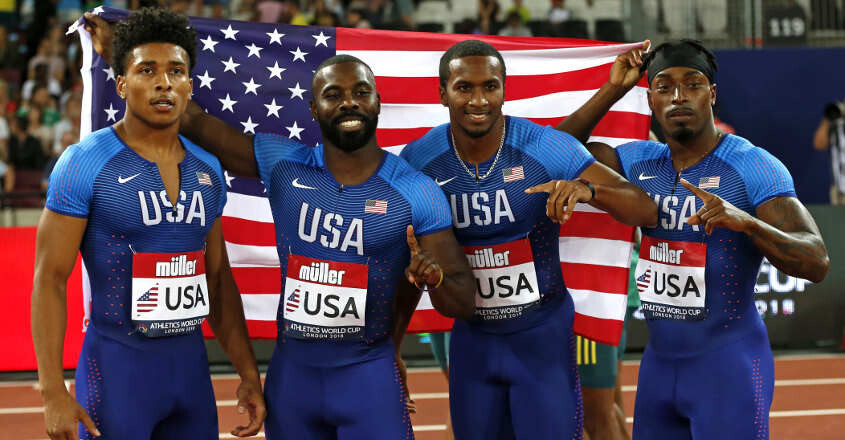
In the men’s shot put on July 17, world record-holder and Olympic champion Ryan Crouser will go after the one title that has so far eluded him – that of world champion – and will take on two-time world champion Joe Kovacs.
Such is the strength of the women’s 800m squad of Athing Mu, Ajee Wilson and Raevyn Rogers, as well as the men’s 200m team of Noah Lyles, Erriyon Knighton, Fred Kerley and Kenny Bednarek, that athletes will be aiming for USA medal sweeps.
Returning to defend the titles they won in Doha in 2019 are Nia Ali (women's 100m hurdles), Donavan Brazier (men's 800m), Christian Coleman (men's 100m), Grant Holloway (men's 110m hurdles), Kovacs (men's shot put), Lyles (men's 200m), Muhammad (women's 400m hurdles), DeAnna Price (women's hammer) and Christian Taylor (men's triple jump).
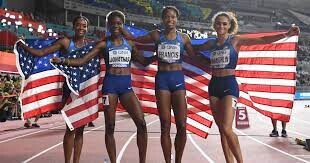
Making her 10th World Championships appearance will be Allyson Felix, who has 18 world medals, including 13 golds, to her name and will be in the mixed 4x400m pool.
“I couldn’t be prouder to lead this amazing team for this once-in-a-lifetime event,” said USATF CEO Max Siegel. “We have been given the unique opportunity to impact the track and field landscape in the US, and we’ve put our best team forward.”
USA team for Oregon
Women
100m: Aleia Hobbs, Melissa Jefferson, Twanisha Terry
200m: Tamara Clark, Jenna Prandini, Abby Steiner
400m: Talitha Diggs, Kendall Ellis, Lynna Irby
800m: Athing Mu, Raevyn Rogers, Ajee Wilson
1500m: Sinclaire Johnson, Cory McGee, Elle St. Pierre
5000m: Elise Cranny, Emily Infeld, Karissa Schweizer
10,000m: Alicia Monson, Natosha Rogers, Karissa Schweizer
Marathon: Emma Bates, Keira D’Amato, Sara Hall
3000m steeplechase: Emma Coburn, Courtney Frerichs, Courtney Wayment
100m hurdles: Nia Ali, Alia Armstrong, Keni Harrison, Alaysha Johnson
400m hurdles: Shamier Little, Sydney McLaughlin, Dalilah Muhammad, Britton Wilson
Heptathlon: Michelle Atherley, Anna Hall, Kendell Williams, Ashtin Zamzow-Mahler
High jump: Vashti Cunningham, Rachel Glenn, Rachel McCoy
Pole vault: Gabriela Leon, Sandi Morris, Katie Nageotte
Long jump: Quanesha Burks, Tiffany Flynn, Jasmine Moore
Triple jump: Tori Franklin, Jasmine Moore, Keturah Orji
Shot put: Adelaide Aquilla, Chase Ealey, Maggie Ewen, Jessica Woodard
Discus: Valarie Allman, Rachel Dincoff, Veronica Fraley, Laulauga Tausaga-Collins
Hammer: Brooke Andersen, Annette Echikunwoke, Janee Kassanavoid, DeAnna Price
Javelin: Ariana Ince, Maggie Malone, Kara Winger
20km race walk: Robyn Stevens, Miranda Melville
35km race walk: Stephanie Casey, Miranda Melville, Maria Michta-Coffey
4x100m: Celera Barnes, Tamari Davis, Gabby Thomas (plus athletes named in individual sprints)
4x400m: Wadeline Jonathas, Jaide Stepter, Kaylin Whitney (plus athletes named in individual sprints)
Men
100m: Marvin Bracy, Trayvon Bromell, Christian Coleman, Fred Kerley
200m: Kenny Bednarek, Fred Kerley, Erriyon Knighton, Noah Lyles
400m: Champion Allison, Michael Cherry, Michael Norman, Randolph Ross
800m: Donavan Brazier, Bryce Hoppel, Jonah Koech, Brandon Miller
1500m: Johnny Gregorek, Cooper Teare, Josh Thompson
5000m: Grant Fisher, Woody Kincaid, Abdihamid Nur
10,000m: Grant Fisher, Joe Klecker, Sean McGorty
Marathon: Elkanah Kibet, Colin Mickow, Galen Rupp
3000m steeplechase: Hillary Bor, Evan Jager, Benard Keter
110m hurdles: Devon Allen, Trey Cunningham, Grant Holloway, Daniel Roberts
400m hurdles: Trevor Bassitt, Rai Benjamin, Khallifah Rosser
Decathlon: Steven Bastien, Kyle Garland, Zach ZiemekHigh jump: Darius Carbin, JuVaughn Harrison, Shelby McEwen
Pole vault: Andrew Irwin, Chris Nilsen, Luke WinderLong jump: Marquis Dendy, Steffin McCarter, Will Williams
Triple jump: Chris Benard, Will Claye, Donald Scott, Christian Taylor
Shot put: Josh Awotunde, Ryan Crouser, Joe Kovacs, Tripp Piperi Discus: Andrew Evans, Sam Mattis, Brian Williams
Hammer: Daniel Haugh, Rudy Winkler, Alex Young
Javelin: Ethan Dabbs, Tim Glover, Curtis Thompson
20km race walk: Nick Christie, Dan Nehnevaj
35km race walk: Nick Christie
4x100m: Kyree King, Josephus Lyles, Elijah Hall-Thompson (plus athletes named in individual sprints)
4x400m: Bryce Deadmon, Vernon Norwood, Elija Godwin (plus athletes named in individual sprints)
Mixed
4x400m: Allyson Felix, Kennedy Simon, Ismail Turner, Noah Williams (plus athletes named in individual sprints).
by World Athletics
Login to leave a comment
World Athletics Championships Budapest23
Budapest is a true capital of sports, which is one of the reasons why the World Athletics Championships Budapest 2023 is in the right place here. Here are some of the most important world athletics events and venues where we have witnessed moments of sporting history. Throughout the 125-year history of Hungarian athletics, the country and Budapest have hosted numerous...
more...Molly Seidel Out, Keira D’Amato in for World Championships Marathon
Seidel said last month she had sought a therapeutic use exemption for Adderall, which is banned in competition.
Keira D’Amato, the American record holder in the marathon, was named to Team USA for the World Championships today, replacing Molly Seidel, according to multiple sources.
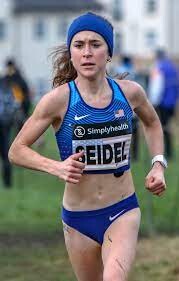
The women’s marathon at the World Championships, to be held in Eugene, Oregon, is on July 18.
Seidel, who won Olympic bronze last year in Sapporo, Japan, was named to the U.S. squad for the marathon based on that performance. But a hip impingement caused her to drop out of the Boston Marathon in April.
On June 8, Seidel, 27, posted to her Instagram account that she had been taking Adderall for ADHD since Boston. Adderall is banned for in-competition use by the World Anti-Doping Agency (WADA). Seidel wrote that taking the medication was “life changing,” and she was able to “get the quiet, functioning brain in my day-to-day life that I could previously only achieve with intense physical activity.”
Seidel had applied to WADA for a therapeutic use exemption (TUE) to be able to take the medication when she was competing, but it had not been granted before the New York Mini 10K—and it wasn’t clear if it would be granted—so she withdrew.
The reason why her spot is going to D’Amato is not clear, and Runner’s World sought clarification from Seidel, her coach, and her agent.
D’Amato, 37, has less than three weeks to prepare for a marathon, but she “is in great shape,” according to her agent, Ray Flynn. She ran 2:19:12 in setting the American marathon record in January in Houston.
She won the BAA 10K last Sunday on a hot day in 31:17. Her Strava training shows she did an 18-miler on June 27 and has been averaging 73 miles per week for the last four weeks. She’s also been racing frequently, finishing third at the New York Mini on June 11.
On June 21, Runner’s World asked D’Amato if, in light of Seidel’s post, she was doing marathon training and was told she was an alternate for the Worlds team. “No one has contacted me,” she said at that time.
Emma Bates and Sara Hall are the other two American women in the World Championships marathon. Galen Rupp, Elkanah Kibet, and Colin Mickow are the men.
USA Track & Field usually names its World Championships marathoners based on a descending order time list. But given many marathons were canceled or postponed in 2021, it announced it would pick top 10 finishers from the Games (Seidel and Rupp) and then top finishers from the Chicago, Boston, and New York City marathons last fall. That decision was controversial because the selection criteria were announced in October after the Chicago and Boston marathons had already taken place.
Login to leave a comment
7 Keys to Recovery From an Elite Runner Who Experienced Long COVID
Kate Grace, an 800-meter specialist who ranked third in the world in 2021, is taking a slow road back to competition.
At first, the COVID symptoms Kate Grace experienced at the end of December 2021 seemed mild enough. She had a sore throat and fever and felt tired. That turned into a cold, which gradually eased over the next several days. And because she had been vaccinated and had a booster shot, she didn’t expect any lasting complications. Within two weeks, the 800-meter specialist, a 2016 Olympic finalist, was back to running.
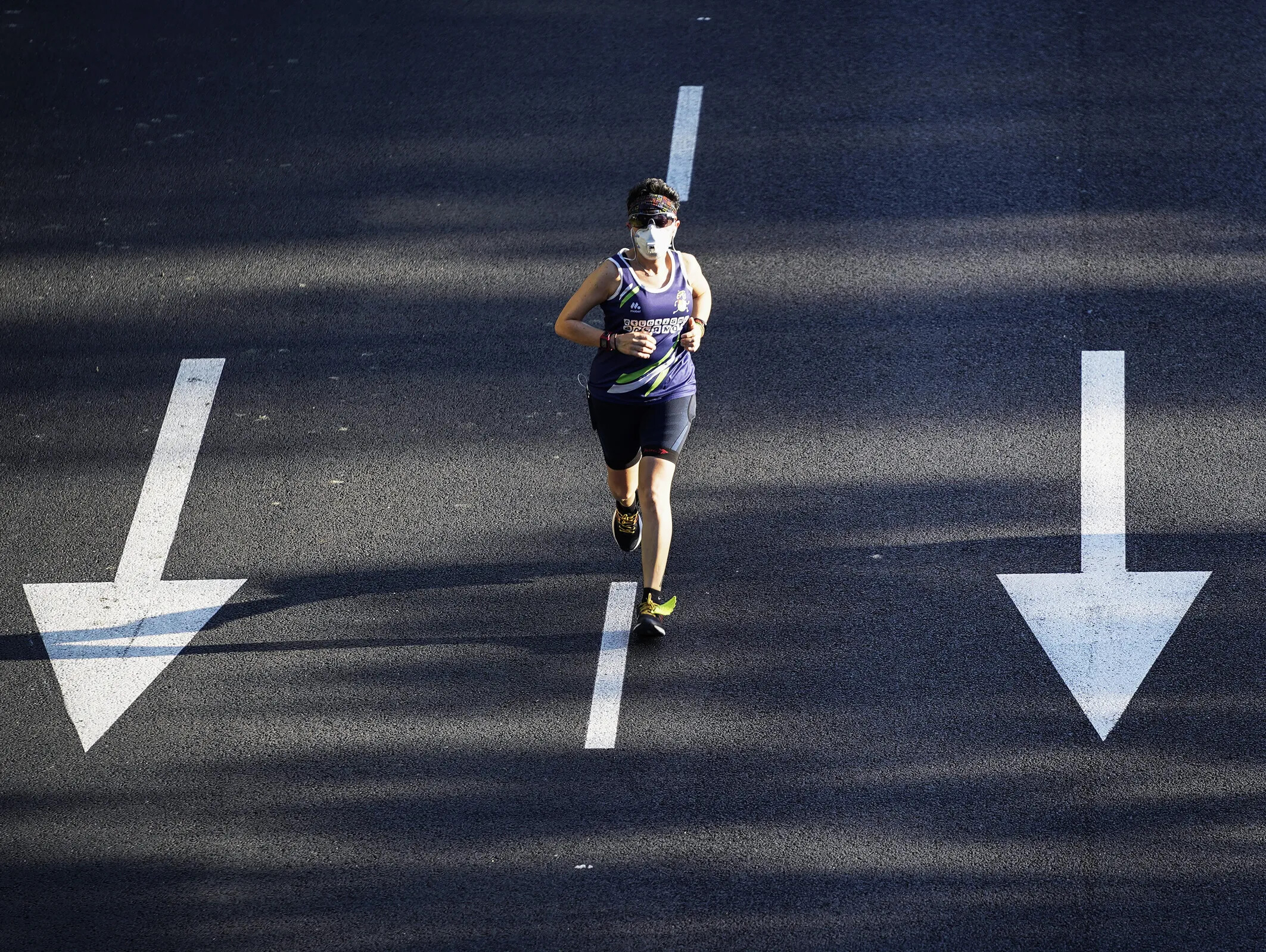
But in January, she began to notice she was struggling in training. She was pushing to hit her usual 7-minute pace during easy runs, and she felt exhausted afterward. In workouts, her difficulties were even more stark. “Paces that should have been pedestrian for me were an all-out effort,” she told Runner’s World. Grace, 33, had had a terrific 2021 track season, setting PRs in the 800 meters (1:57.20) and 1500 meters (4:01.33) and finishing in the top 3 in six of seven Diamond League meets she ran, with three victories. She couldn’t wait for the 2022 season, with the World Championships set to take place in July in Eugene, Oregon, the first time the meet will be held in the United States.
“I was just so excited about getting back to races, I think I pushed myself way too hard,” she said. “In my intense desire to get back into shape, I wasn’t patient. I didn’t listen to the fact that my body was not cooperating.”
After about three weeks, she realized the struggles she was having were out of the ordinary. She stopped trying to train. Her body, she said, “kind of shut down.”
Her primary symptom was crushing fatigue. One easy activity—making lunch, for instance—exhausted her for the rest of the day. Other symptoms included dizziness when she stood up, poor sleep, and excessive sweating. She would have to rest after she climbed the stairs in her Boulder, Colorado, home, because her heart rate would soar. Her feet turned purple in the mornings when she stood up, and she had brain fog.
The U.S. Olympic and Paralympic Committee put Grace in touch with doctors in Denver, who tested her heart and lungs—which checked out fine, with no sign of myocarditis—and confirmed she was experiencing classic long COVID symptoms. They told her there was nothing to do but rest.
That’s what she did. For 10 weeks, Grace did no running, cross-training, or lifting. She did start taking walks—just around the block at first, and she’d need a nap afterward. But over the weeks, those walks gradually grew to an hour. From those, she moved to hiking to get her heart rate up. Then short runs.
Now she’s back to running an hour a day. She’s still slower than she used to be on her easy runs, but she’s improving rapidly. It’s too soon to tell whether Grace will be able to have any kind of racing season in 2022, but she’s relieved to have her normal life and energy back.
“I literally cried on my first run,” she said. “I ran for 20 minutes at 10-minute pace. I was so happy. To be able to go and run and move my body and feel normal afterward, yeah, I laughed and cried. It was amazing.”
Grace struggles to convey how she felt during the worst days. “The fatigue was like nothing I’ve ever experienced,” she said. “I feel like I went to sleep in December and woke up in April. I did nothing. I couldn’t look at my phone. Weeks passed, and I don’t even know what happened. I was like a gray ghost of myself.”
Her physical symptoms were compounded by fear of not knowing when she would ever feel like herself again. Forget about her racing—she just wanted her life back.
Here is what she has learned so far in the process of her recovery—and what she wants other runners who have had COVID to know about coming back.
Rest and be patient. Grace advises anyone who has had COVID to take an extra week or two off before trying to run again, and then to start back to running very conservatively. She doesn’t know for sure if she made herself worse by trying to run before she was fully recovered, but she certainly didn’t help matters. “It’s way more prudent to wait and let yourself heal,” she said. “It’s always a possibility to have a delayed reaction to illness.” Post-viral syndrome is something that happens with other illnesses, such as mononucleosis or the flu. With COVID, too, it’s possible to fall into deep fatigue and need a long time to recover.
Don’t let your identity as a runner obscure what your body needs. Be appropriately humble. Respect the illness. “Just because you are a healthy, in shape person, you’re still human, your body still needs rest,” she said. “You still need time to recover.” Pushing through is counter productive.
One day your body will work for you again the way you expect it to, if you give it what it needs. But it might happen on a very different schedule than you had planned.
Take the timeline pressure off. You have a target race on the calendar? Let it go. Defer your entry, if possible, or transfer the bib to a friend if the race allows it. You will race again, just maybe not when you thought. And fretting about it won’t help.
Grace credits her coach, Joe Bosshard, with telling her to stop worrying about her track season. Every day that she didn’t feel better, she said she would “freak out” about how her season was slipping away. That stress would slow her recovery. “We have to reset mentally,” Grace said Bosshard told her. “Don’t think about races. Let yourself be calm and heal. When that happens, we can revisit racing plans.”
Walk before you run. Runners tend not to count walking as exercise, but a week or two of walking can help runners transition back into their primary activity. As Grace got better and faster at walking, she progressed to hiking.
While physically the walks helped prepare her body for running again, they also served an important psychological purpose. “I had lost confidence in my body,” she said. “I needed to prove myself I could get my heart rate up and not fall back into the hole.” Walking felt less likely to set her back than running, and when her walks went well, she started to lose the fear she felt around running.
Invest in a heart rate monitor. Grace now wears a Polar heart rate monitor and has been very careful so far not to overdo it. Otherwise, she’d likely be worried about her pace. When she started her short walks, she kept her heart rate to only about 50 percent of her maximum heart rate. With hiking, she got up to about 60–65 percent of her max. With her first few runs, she didn’t exceed 70 percent of her max and she wanted to make sure she could recover from those runs without excessive fatigue. Now she runs at between 70–85 percent of her maximum heart rate.
Everyone’s COIVD experience is different. Even though Grace knew plenty of people who had had COVID, she didn’t know any athletes who had suffered from long COVID. So the first few weeks back to running, when she was struggling, it didn’t even dawn on her that her issues were related to the virus.
When she realized she had long COVID, at first she spent long hours searching on social media and message boards for stories of people who had recovered. And she couldn’t find them. (It makes sense, she said. When you get better, you stop visiting the message boards.) But when she posted on her Instagram account on February 13 about her long COVID symptoms, she did hear from a few people who told her they had gotten better, which was helpful. “That was the one time I was thankful for Instagram,” she said. She stayed largely unplugged after that post. Comparing her recovery to others’ didn’t help.
Tell your support team what’s going on. Grace went through a particularly hard three-week stretch when she was scared, confused, and emotional. “I would wake up, feel crappy and tired, and would start crying on my kitchen floor,” she said.
Her fiancé, Patrick, knew what was happening, but she clued in her family and her teammates training under Bosshard about how sad and worried she was feeling. Emma Bates, in particular, was helpful, inviting her over, but understanding when Grace declined. “They made me feel included but very low-impact stuff,” she said. “Check-ins like that were meaningful.” Thanks to her strong network, there was one symptom that never appeared on Grace’s list: isolation.
by Runner’s World
Login to leave a comment
How to Qualify for the Boston Marathon
So you want to qualify for the Boston Marathon? You’re not alone. As an age-group or recreational runner, it’s one of the noblest (and most common) goals to set your sights on.
The history and prestige of the Boston Marathon are unparalleled in the world of running, which is why getting the opportunity to run the famed 26.2-mile route from the start in Hopkinton to the finish line on Boylston Street in downtown Boston is a top-shelf bucket list goal for many runners.
And rightly so. With the challenge it requires to qualify, the experience of running Boston is all that and more.
6 Tips on Qualifying for Boston
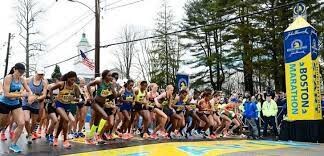
For most age-group runners, qualifying for Boston isn’t a simple task. Every athlete’s journey to trying to earn a Boston-qualifying time (BQ) is unique, and your approach needs to be specifically catered to who you are as a runner. And, like with all things running, there are no shortcuts for earning a BQ—but there are some key points to consider on your quest.
1. State Your Intention.
If you’re truly interested in qualifying for Boston, it’s a good idea to make it one of your primary goals (both in running and in life) so you can focus as much energy as possible toward it and take a smart and healthy approach to achieving it. That doesn’t mean you have to post it on Instagram, but it’s something you should share with your significant other, family members, and running buddies to generate long-term excitement and support as well as keeping you accountable on your journey.
Every age group has a different qualifying time that needs to be attained in a two-year window prior to registration opening in the fall prior to the next race the following April. For women, the age groups and times are:
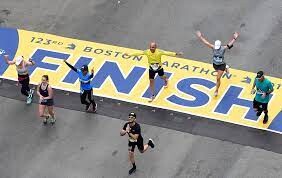
18–34: 3:30.00 (3 hours, 30 minutes, and zero seconds)
35–39: 3:35.00
40–44: 3:40.00
45–49: 3:50.00
50–54: 3:55.00
55–59: 4:05.00
60–64: 4:20.00
65–69: 4:35.00
70–74: 4:50.00
75–79: 5:05.00
80 and over: 5:20.00
Men
18-34: 3 hrs 00 min 00 sec
35-39: 3 hrs 5 min 00 sec
40-44: 3 hrs 10 min 00 sec
45-49: 3 hrs 20 min 00 sec
50-54: 3 hrs 25 min 00 sec
55-59: 3 hrs 35 min 00 sec
60-64: 3 hrs 50 min 00 sec
65-69: 4 hrs 5 min 00 sec
70-74: 4 hrs 20 min 00 sec
75-79: 4 hrs 35 min 00 sec
80 & over: 4 hrs 50 min 00 sec
There’s also the added complication that just hitting the time doesn’t guarantee entry to the race. Runners typically need to also meet faster cut-off times if registration exceeds the race capacity (see tip #6).
“It’s a great goal and a very relevant goal for a lot of a marathoners,” says New York City–based running coach Elizabeth Corkum. “When it’s your first Boston, it’s a big deal and definitely something you should be excited about.”
2. Set a Realistic Goal
For many runners, it takes a full year or two—or maybe even five or more—to develop the aerobic strength and overall fitness to be in position to reach the qualifying time in your age group.
The first step: Understand that the path to running fast enough to earn a BQ standard isn’t a quick process of instant gratification.
“A lot of runners will come to me and say I want to qualify for Boston this year because a lot of runners are always eager to do it now, but the reality is that it might take a few years,” says Chicago-area coach Jenny Spangler, who won the 1996 U.S. Olympic Trials Marathon. “It’s a great goal for many people, but it’s a commitment and you have to be realistic about where you are and where you need to get. For some runners, it will take a while. Sometimes I’ll have runners aim for running a fast half marathon first and then next year start to focus on a fast marathon.”
If you’re serious about qualifying for Boston, it’s best to connect with a coach or local training group that has a history of helping runners achieve a BQ. You’ll want to find a coach who will take into consideration both your history as a runner and as an athlete as well as your current fitness level, previous races, monthly mileage volume, injury history, and, perhaps most important, your ability to commit to a complicated training program amid your work-life balance.
“You don’t like to discourage anyone, but a Boston qualifying time is hard,” Spangler says. “So for people who can’t commit the time for training or maybe just don’t enjoy running or don’t want to put in the mileage, it might not be possible. It’s a commitment and it’s just not for everybody.”
3. Pick a Qualifying Race
One of the keys to qualifying for Boston is running a fast, USATF-certified course with a high probability of running your goal time. Typically, the races with the most qualifiers are the New York City Marathon and the Chicago Marathon, and, of course, Boston itself, but that’s largely based on the volume of runners in those races. However, those marathons can be hard to get into, so unless you already secured an entry, you should plan on another race with a high propensity of Boston-qualifying times.
One of the best options is the California International Marathon (CIM), where 25 to 35 percent of the field typically earns a BQ. The only challenge about qualifying at CIM is that it’s held the first Sunday in December, so you’ll have to wait and enter for the next Boston Marathon 16 months later.
Another great option among mid-sized races is the mid-June Grandma’s Marathon in Duluth, Minnesota, which typically has both a large number of qualifiers and a relatively high percentage of BQers. In 2019, 1,108 of its finishers (18.2 percent) earned BQ qualifiers. From 2010-2021, an average of 15.8 percent of Grandma’s finishers earned BQ times.
“Usually when people come to me, they already know which race they want to run,” says Nell Rojas, a Boulder, Colorado–based professional runner for Adidas who also coaches age-group runners. “But if not, I usually recommend California International Marathon or Grandma’s Marathon, which are fast marathons that are easy to get into with a lot of people that will be running their same speed. And that’s key because that means there will be people to run with at the pace you want to run the whole way.”
Since 2017, some of most prevalent qualifying races have been “last chance” races designed to get runners qualified right before the opening of Boston registration in mid-September. The Last Chance BQ.2 race in Grand Rapids, Michigan, has had an average of about 60 percent BQ’ers every year since 2015, while its sister event, Last Chance BQ.2 race in Geneva, Illinois, has typically had at least 50 percent of its field qualify. But both of those races are small, usually 350 runners, and registration fills up fast every spring. (The Geneva race added a spring race in 2018 and it has also typically had a 50 percent qualifying rate.)
Other small, early September races with high BQ percentages include the Erie Marathon at Presque Isle (Erie, Pennsylvania), Via Marathon (Allentown, Pennsylvania), and Tunnel Light Marathon (North Bend, Washington). A few key marathons with downhill profiles and high qualifying percentages are the St. George Marathon (St. George, Utah), Revel Big Bear Marathon (Big Bear, California), and Mountains 2 Beach Marathon (Ojai, California). Cities with mid-sized marathons that are known to have good courses for qualifying: Philadelphia; Indianapolis; Houston; Eugene, Oregon; and Santa Rosa, California.
4. Get Some Super Shoes
If you’re interested in maximizing your race-day performance, then you should consider investing in a pair of shoes enhanced with carbon-fiber plates. Yes, they’re expensive, ranging in price from $180 to $275, but the technology works—and can give you 3 to 6 percent advantage over shoes with typical foam midsoles. Nike, Adidas, Skechers, ASICS, On Brooks, HOKA, New Balance, and Saucony all make super shoes, and some of their models are among the best. But each fits and feels slightly different, so visit a local running store, if possible, and try on several pairs before buying.
“Super shoes definitely allow you to run faster,” says ASICS-sponsored pro Emma Bates, who was second at the 2021 Chicago Marathon in 2:24:20 wearing a pair of ASICS Metaspeed Sky. “I love them because they’re so comfortable, but the biggest thing is that I feel that I can recover so much quicker after a workout or a race. After Chicago, I felt like I could do a workout the next weekend. That’s insane. I love the shoes and would never imagine running in anything else ever again.”
5. Train Methodically and Consistently
Going through significant training adaptations is a key part of the process for most runners, especially if they’re new to the sport or don’t have a lot of experience with the various types of workouts in most marathon build-ups. Progress occurs based on how well you handle training volume, how much you recover, and how much time and focus you put toward non-running elements like strength work, nutrition, and rest.
“All of those things factor into how you’re going to direct someone to get to that goal, and it’s different for everyone, for sure,” Corkum says. “Some people have all the time in the world to train and that’s fantastic because we can probably stress their bodies a little bit more with training, knowing that they can rebound. But someone who is only able to sleep four hours a night and has a newborn at home, they already have that additional stress so they have to be careful about adding training stimulus so they don’t get injured or burn out.”
Most coaches recommend going through a 16-week training plan to build up to a marathon, though it could be shorter if you’re already pretty fit or longer if you need more time to get used to the rigors of high-mileage running. A good plan will include periodized segments that include two to three weeks of gradual building of aerobic fitness followed by a slightly relaxed week to allow for recovery and the training adaptations to take place.
Depending on your background and fitness, you’re likely going to be running between 50 and 80 miles per week during the peak weeks of your training plan, Rojas says. While pro runners run between 100 and 120 miles per week, she warns that excessive running volume for age-group runners can lead to fatigue, burnout, and injuries.
A training plan should include a once-a-week long run, one or two faster workouts like a tempo run or an interval session, and several recovery runs. As the training plan progresses, there will be a greater emphasis on up-tempo workouts and your long runs will approach 18 to 22 miles and start getting faster.
But even if you’re following a plan that’s the same or very similar to your running partner’s, your quest to reach a Boston qualifying time will be an individual one.
“Runners come from all different levels of fitness,” Rojas says. “It all depends on what a runner can handle, what their strengths are, what their weaknesses are.”
Spangler says most age-group runners who come to her for help in achieving a Boston qualifier typically need more mileage than intensity in their training, but sometimes it’s both. In addition to ramping up mileage gradually, she’ll sprinkle in spicier workouts like fartlek intervals or hill repeat sessions—as much as she thinks an athlete can handle.
She’ll also prescribe periodic longer tempo runs of 8 to 10 miles at marathon race pace and often have them race a half marathon midway through their training program as a way to gauge a runner’s fitness and boost confidence.
“You can just kind of see how they’re starting to handle workload hitting the paces of the workouts they’re doing and feeling good doing it,” Spangler says. “That’s when you start to get a sense that they’re going to be ready, and that’s when I start getting confident they’re ready to handle the marathon at that pace.”
6. Don’t Get Discouraged
Even if you’re well trained and in the best shape of your life, you need everything to go right on a race day to run your best. Achieving a Boston Marathon–qualifying time can take several years and, if you miss it once or twice, it can start to feel like a never-ending process. Unfortunately, even when you achieve the time, you still might not be able to run the race. Because of field size limitations and increased interest, runners usually need to also meet faster cut-off times than the time listed in tip #1 to get in.
While every runner who applied for the 2022 race was granted entry—likely because of a downturn in interest because of the still-lingering COVID-19 pandemic—in the previous 10 years runners needed to be 1 minute, 2 seconds to 7 minutes, 47 seconds faster than their qualifying time to get in. Depending on the year and the volume of qualified runners, that’s meant that the BAA has had to reject between 1,947 and 9,215 qualified runners.
“It’s such a tough thing and to recreational runners, I think it’s a bit jarring because they’re not used to that,” Corkum says. “One of the beautiful things about Boston is that it’s one of those few marathons where you can’t just send in your credit card number and know that you have it on your calendar. You have to earn it. But the other side of that is the emotional investment and highs and lows that you’re accepting along with it.”
Developing an indefatigable sense of optimism and a love for running will be helpful in your quest to qualify for the Boston Marathon and eventually running it. There will be plenty of hiccups along the way (missed workouts, injuries, life events) so it’s best to make it part of the fabric of your life and not merely a box to check off, Corkum says.
“Running is a patient person’s sport and I think that’s why you really have to love it,” Corkum says. “I think some people might not necessarily love running but they love the idea of achieving ‘that thing,’ and you have to realize there are so many hours and steps that go into making it a lifelong thing, and for a lot of us it becomes that.”
by Brian Metzler
Login to leave a comment
Boston Marathon
Among the nation’s oldest athletic clubs, the B.A.A. was established in 1887, and, in 1896, more than half of the U.S. Olympic Team at the first modern games was composed of B.A.A. club members. The Olympic Games provided the inspiration for the first Boston Marathon, which culminated the B.A.A. Games on April 19, 1897. John J. McDermott emerged from a...
more...American record-setter Sara Hall sets sights on NYC Half, says U.S. poised to dominate in 2022
Fleet-footed Sara Hall returns to action at the New York City Half next month having claimed the United States half-marathon record last month ahead of what she sees as a banner year for American athletics.
She set the U.S. record of 1:07:15 in Houston last month, beating Molly Huddle's previous best (2018) by 10 seconds, after finishing on the podium at the 2020 London Marathon and at the Chicago Marathon last year.
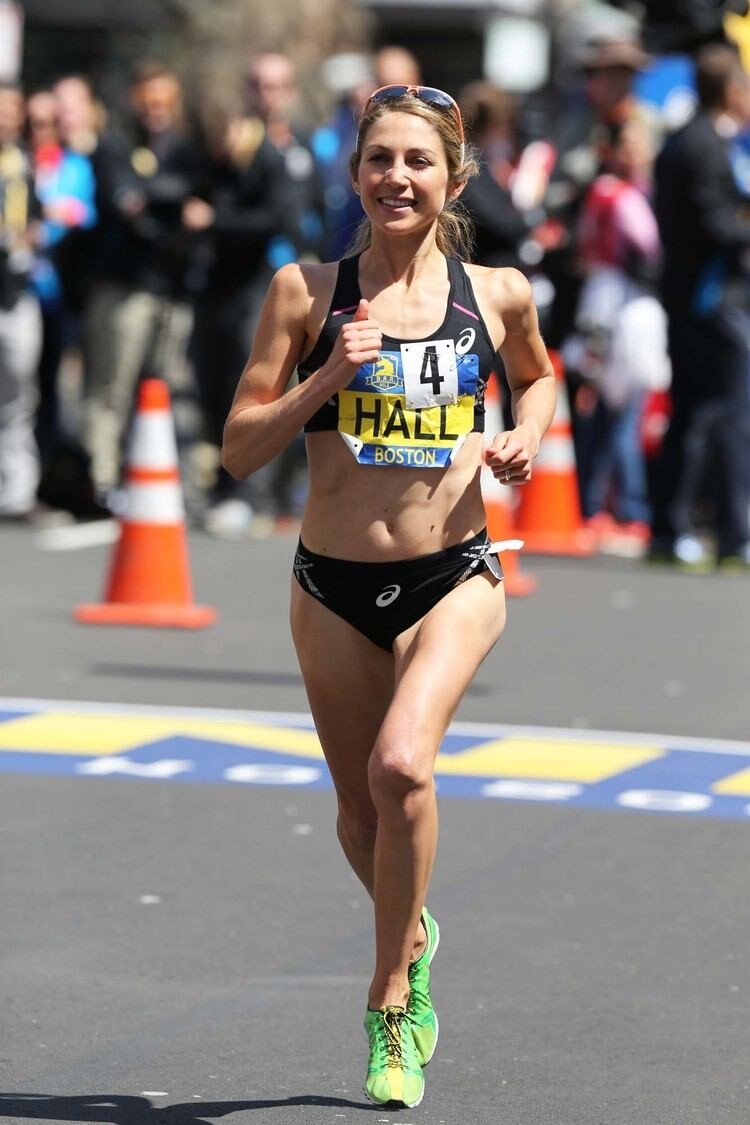
Joining her at the marquee New York race are Tokyo bronze medalist Molly Seidel, who finished fourth in the New York City Marathon in November, and 2021 Chicago runner-up Emma Bates.
"It's been awesome to see U.S. female marathoners either getting on the podium or being in contention every time out at the highest level every time," Hall told Reuters.
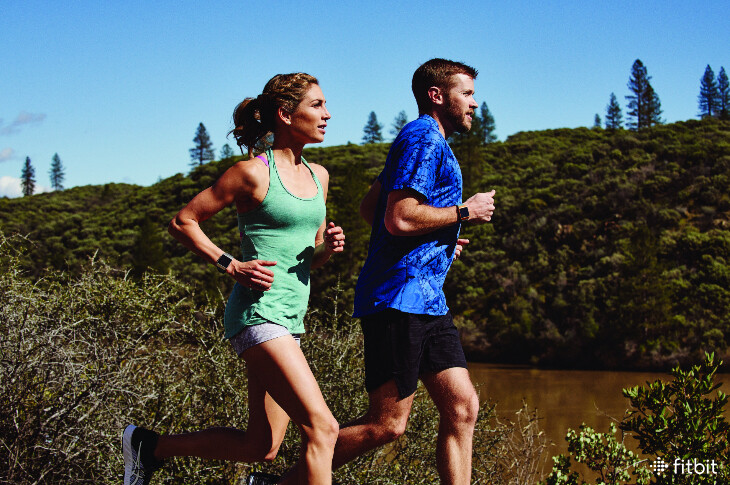
With all eyes on the U.S. when it hosts the World Athletics Championships for the first time this summer, Hall believes the U.S. could dominate at Eugene, Oregon's Hayward Field.
"USA track and field is strong against so many," said Hall. "Every event, we're in medal contention... it's a really exciting time to be a fan of the sport."
She credits her own recent run of success in part to her husband, Ryan Hall, who began coaching her after he retired from professional athletics in 2016. Whereas "tough love" has been widely embraced in athletics coaching for decades, she says his softer approach has made the difference.
Together, they hold the men's and women's American half-marathon records.
"I've had coaches in the past that were like, 'Oh, you just gave up', you know, like that kind of stuff," said Hall.
"That was really detrimental to me because it really made me believe I wasn't mentally tough. And then when you believe that about yourself, it's kind of a self-fulfilling prophecy."
Hall hopes hers can be an example in what can be achieved with a method not based in "fear," as conversation about mental health and wellbeing dominates the upper echelons of sport.
"I hope that people are seeing what creates longevity," Hall told Reuters. "That win at all costs, tough love approach, that doesn't create longevity in the sport."
The NYC Half will take place on March 20.
by Amy Tennery
Login to leave a comment
United Airlines NYC Half-Marathon
The United Airlines NYC Half takes runners from around the city and the globe on a 13.1-mile tour of NYC. Led by a talent-packed roster of American and international elites, runners will stop traffic in the Big Apple this March! Runners will begin their journey on Prospect Park’s Center Drive before taking the race onto Brooklyn’s streets. For the third...
more...Stephanie Bruce announces retirement after 2022 season
American marathoner Stephanie Bruce announced on her blog that her 2022 season will be her last, as she has been diagnosed with a congenital heart condition called Bicuspid Aortic Valve Disease (BAVD), a dysfunction of the aorta valve limiting the amount of blood flowing from your heart to the body.
“I’m just going to cut to the chase and drop the punch line. I am retiring – this year, but not until the end,” Bruce said in her post. “On Oct. 6, I was diagnosed with a congenital heart condition called Bicuspid Aortic Valve Disease.”
Many athletes tend to announce their retirement after the season or before their last competition, but Bruce wanted to go out as the fighter she’s been her entire career. “I’m not done yet,” she said. “This will be my gritty finale!”
Bruce has had a prolific career in cross-country, representing the U.S. twice at the World Cross Country Championships, in 2017 and 2019. Bruce was the second American behind Emma Bates at the 2019 Chicago Marathon, where she ran her personal best time of 2:27:47. Bruce recently comes off a 10th place finish at the NYC Marathon in November (2:31:05).
Bruce had no idea she had the disease until a check-up two months ago. She currently trains with Ben Rosario’s Hoka NAZ Elite team in Flagstaff, Ariz. and will be releasing YouTube videos during her final season. “We are looking to coordinate pre-race group runs at many of my races and host post-race get-togethers,” Bruce said. “Many professional runners just fade out, I want to give back and go out on my terms.
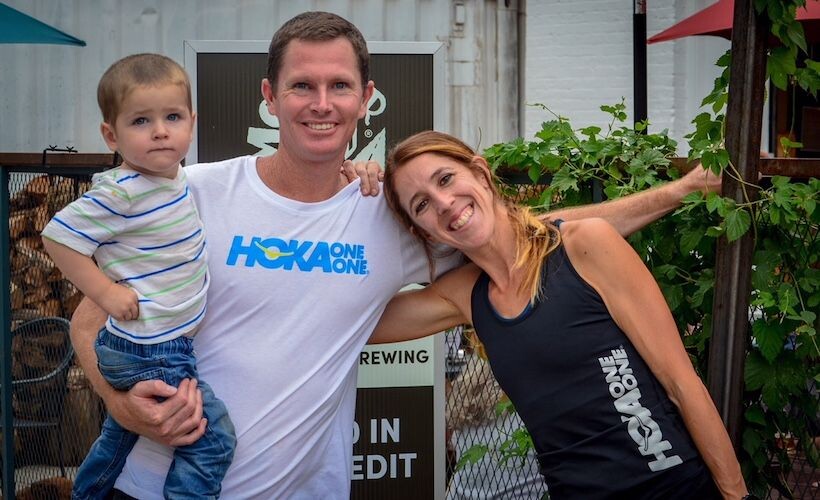
Bruce will be competing this Saturday at the U.S. Cross Country Championships in San Diego, Calif.
by Marley Dickinson
Login to leave a comment
U.S. marathon record holder Scott Fauble announced as Rory Linkletter’s new coach
It has been a busy few weeks for Canada’s Rory Linkletter, as he ran a marathon personal best at the California International Marathon (2:12:52) and left the NAZ Elite track club. Now Linkletter is joining forces with American marathon record holder Ryan Hall as his coach.
In an interview with The Lap Count, Linkletter gave some insight on what’s next for Canada’s up-and-coming marathoner.
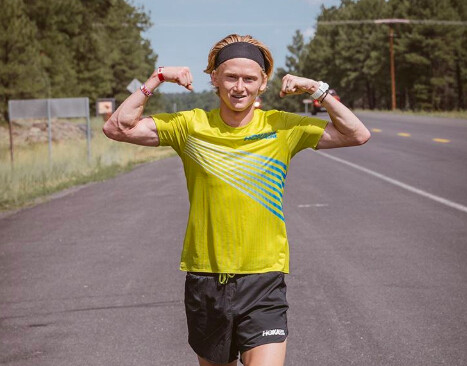
“I have fallen in love with Flagstaff, my wife and I bought a home earlier this year, so ideally I will stay here for the remainder of my career,” says Linkletter. “As for coaching, I’ve decided to work with Ryan Hall.”
This announcement comes days after his departure from HOKA and Ben Rosario’s NAZ Elite. Linkletter is now left unsponsored but believes that Hall’s philosophy will suit his talents and career goals. “I trust that if I perform how I know I can that won’t last forever,” says Linkletter.
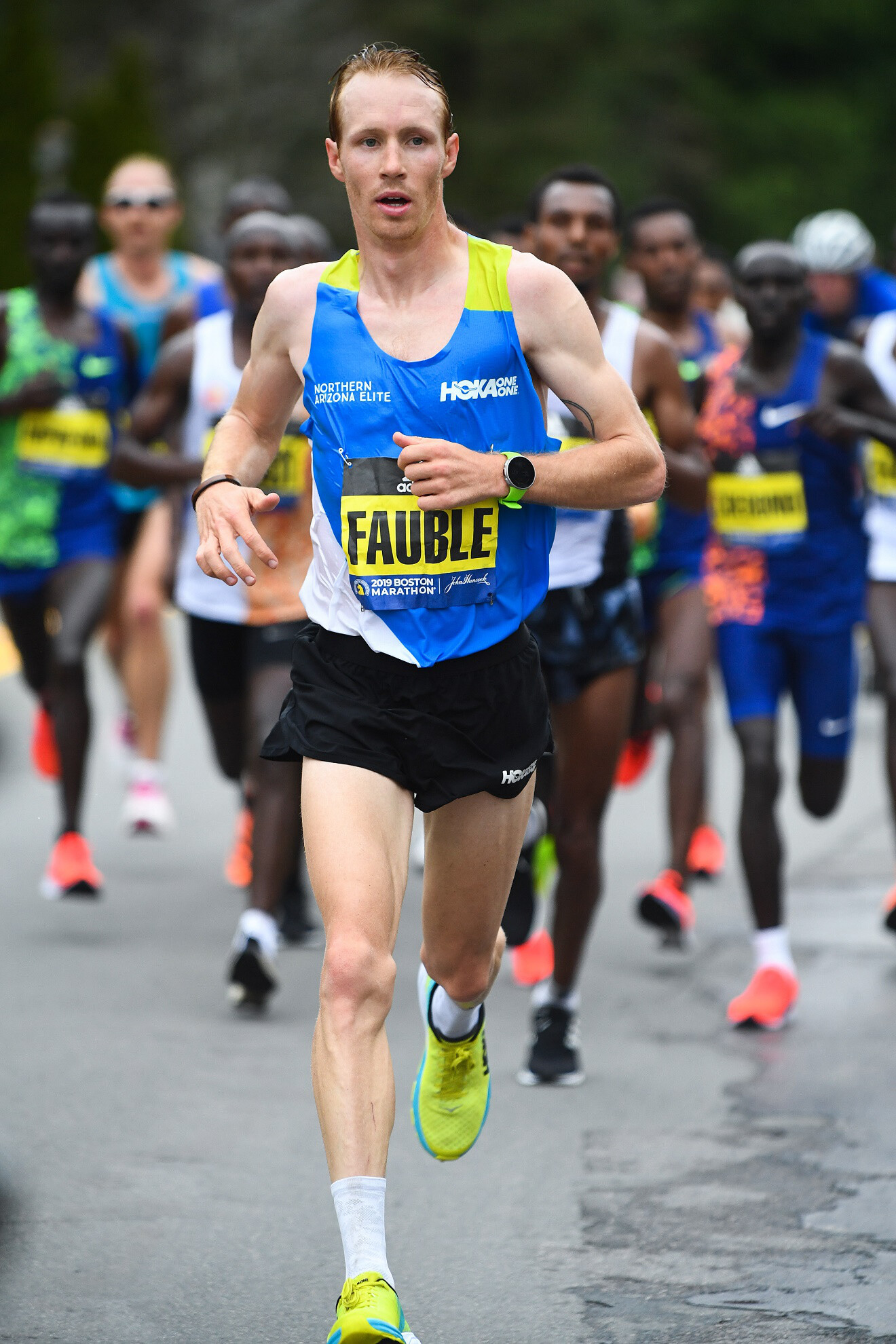
Hall currently coaches his wife Sara Hall, the second-fastest U.S. marathoner, clocking 2:20:32 at The Marathon Project in Chandler, Ariz. Ryan holds the fastest time ever by an American and is the only North-American man to run under 2:05 (Boston 2011). Although Ryan has retired from professional running, he remains as a coach for post-colligate athletes and marathoners in Flagstaff, Ariz.
Linkletter’s previous NAZ Elite teammate, Scott Fauble, also revealed that he will be remaining in Flagstaff. The top American at the 2019 Boston Marathon will be coached virtually by Joe Bosshard, who resides in Colorado and currently coaches Emma Coburn, Emma Bates and Cory McGee.
by Marley Dickinson
Login to leave a comment
World Championships Oregon22 marathon course revealed
The marathon course for the World Athletics Championships Oregon22 has been revealed by the local organising committee (LOC) for the event. Spectators will be able to line the course and experience the world-class competition for free.
The men’s and women’s marathons, taking place on 17 and 18 July 2022, will be contested on a mostly flat 14km looped course that will run through Eugene and Springfield. Athletes will start and finish in front of the University of Oregon’s Autzen Stadium.
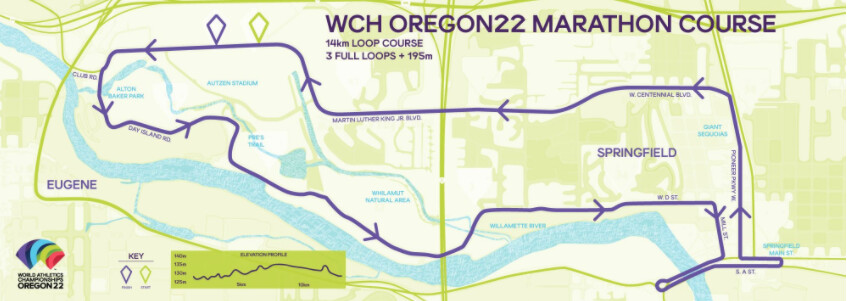
“The opportunity to run a marathon at a World Athletics Championships right here on US soil would be an experience of a lifetime,” said Emma Bates, second place finisher and top US woman at the 2021 Chicago Marathon. “The looped course gives runners the ability to learn and adapt as the race develops, and I think that will result in some fantastic, strategic competition.”
The course follows long sections of the marathon route used for the 1972 and 1976 US Olympic Trials, while also showcasing the beauty and history of Oregon through the landmarks and landscapes of Eugene and Springfield.
“Our objective was to design a course that prioritises the athlete experience while honouring Oregon’s natural landscape, indigenous people, and long-held passion for running,” said WCH Oregon22 Road Events Course Manager Ian Dobson.
“As members of this community, we're proud to give the world’s best runners the opportunity to compete on a course that holds so much history and potential. These marathons will write a new chapter in Oregon’s running story, creating new legends in the footsteps of Frank Shorter, Jacqueline Hansen, Kenny Moore, Joan Benoit and countless others who raced these roads as they helped inspire and redefine what road racing could be – not only in the US, but globally.”
The loop begins on Martin Luther King, Jr. Boulevard, named after the American civil rights leader. From there, it moves into Alton Baker Park, a 413-acre natural area in Eugene.
While on Day Island Road within Alton Baker Park, the route will follow alongside Pre’s Trail. Designated as a City of Eugene historic landmark in 2019, Pre’s Trail is a bark running trail that celebrates University of Oregon track and field legend Steve Prefontaine.
Another feature of this part of the course are the Kalapuya Talking Stones. Showcased in the Whilamut Natural Area of Alton Baker Park, these 15 basalt stones are carved with Kalapuya words and their English translations.
The course will cross over the stunning Willamette River, considered the lifeblood of the Willamette Valley, and then move into the City of Springfield. Competitors will traverse Main Street before running beneath the canopy of a stretch of incredible giant sequoia trees.
The World Athletics Championships Oregon22 will be taking place 15–24 July 2022.
by World Athletics
Login to leave a comment
Ruth Chepngetich went out at world record pace in Chicago
In the first major race in the U.S. since the pandemic began, the American women had their best showing at the Chicago Marathon since 1994 Sunday October 10.
Ruth Chepngetich of Kenya did it the hardest way possible, but after starting the 2021 Chicago Marathon at a blistering pace, she held on for the win on Sunday, finishing in 2:22:31. Emma Bates and Sara Hall placed second and third, respectively—the first time since 1994 that two American women finished the race in the top three.
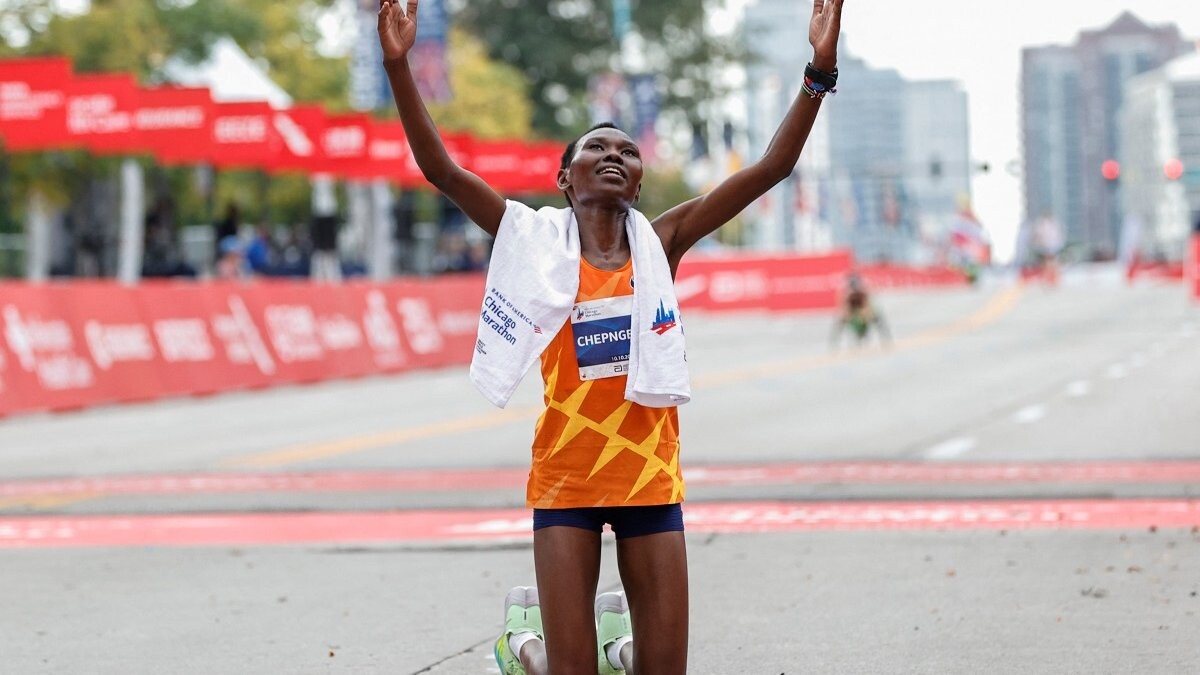
Chepngetich, 27, was racing among some of the elite men in the first half of the race, touching a potential 2:11 finish time at one point (the world record is 2:14:04, set by Brigid Kosgei at the 2019 Chicago Marathon). She began to slow right before hitting 13.1 miles in 1:07:34 and faded drastically over the final miles, her slowest 5K split was her final one, 18:15, compared to her first, which was 15:37. It was Chepngetich’s first race in the United States and she was greeted with some steamy midwest conditions—at the start it was 70 degrees with 70 percent humidity.
The victory was a bit of a redemption run for Chepngetich, who dropped out of the Olympic marathon in August.
“The race was good; it was nice,” she said afterward, “but it was tough. To push alone is not easy.”
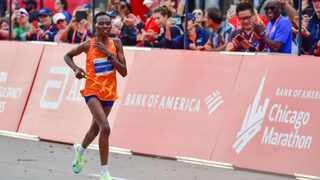
Bates, 29, executed an opposite race strategy, starting off conservatively and closing the last 10K with her fastest miles. It resulted in a personal best on two levels: her time, 2:24:20, and her first podium finish at a World Marathon Major event. Since placing seventh at the U.S. Olympic Marathon Trials, then fourth in December at the Marathon Project (2:25:40), Bates moved from her base in Idaho to Boulder, Colorado, to join Team Boss, the training group coached by Joe Bosshard.
“I didn’t want to push too much, too soon, and so I went through halfway still feeling really, really good,” Bates said. “And then I was like, ‘Oh crap, I don’t know how far ahead all these women are.’ I was getting a little nervous and I needed to pick it up. I just started slowly and surely just like picking it up, just bit by bit.”
As Bates stepped it up, she was able to catch the U.S.’s Keira D’Amato, who ultimately placed fourth in 2:28:22, and Hall, as well as Vivian Kipligat, who had spent most of the race in second place but finished fifth in 2:29:14.
“Having all those people lining the streets again just really gave me the energy to press on and really pick up my legs faster,” said Bates, who is now the ninth-fastest American woman at the 26.2-mile distance.
It was the first major marathon held in the U.S. since the pandemic shut most events down for the past 19 months. The 2021 Boston Marathon, delayed from its typical April date, will also go off on Monday.
Hall, 38, who lives in Flagstaff, Arizona, was able to compete at an impressive level through the pandemic, becoming the second-fastest American woman in history when she finished the Marathon Project in 2:20:32. She had originally planned to go for the American record on Sunday, but changed her objectives because of the weather. Deena Kastor keeps that title for now, running 2:19:36 at the 2006 London Marathon.
It was Hall’s second top-three finish at a World Marathon Major event—she placed second at the 2020 London Marathon, out-sprinting Chepngetich in the final meters of that elite-only race around Buckingham Palace. On Sunday Hall said she thought she had started the race at a conservative pace (she went through the halfway point in 1:11:37) but the humidity caught up with her over the second half. Still, she said she’s “in the best shape of my life” and will continue pursue that record if the opportunity presents itself—it’s a matter of having the fitness on the right day with the right conditions.
“I’m really excited to have a chance to go for [the American record] sometime. I knew today wasn’t going to be the day to do that,” Hall said. “I would have had to be in sub-2:18 shape to try for that today, maybe even faster. It’s going to take preparation meeting opportunity…hopefully in the near future I’ll get a stab at that.”
With all six major marathon events being held within a short window this season, the elite fields were spread thin between them, giving the American women a chance to showcase their talent in Chicago, placing seven in the top 10.
Chepngetich wins $55,000 for first place, while Bates takes home $45,000 for second place, Hall banks $35,000 for third, and D’Amato wins $25,000 for placing fourth.
by Erin Strout (Women’s Running)
Login to leave a comment
Bank of America Chicago
Running the Bank of America Chicago Marathon is the pinnacle of achievement for elite athletes and everyday runners alike. On race day, runners from all 50 states and more than 100 countries will set out to accomplish a personal dream by reaching the finish line in Grant Park. The Bank of America Chicago Marathon is known for its flat and...
more...Ruth Chepngetich Marks First US Race With First-Place Finish in Chicago Marathon
Ruth Chepngetich marked her first appearance racing in the U.S. with a huge victory at the 2021 Bank of America Chicago Marathon.
After dropping out of the Olympic Marathon in August due to an injury, Kenya’s Ruth Chepngetich, 27, came to the Chicago Marathon eager for a victory.
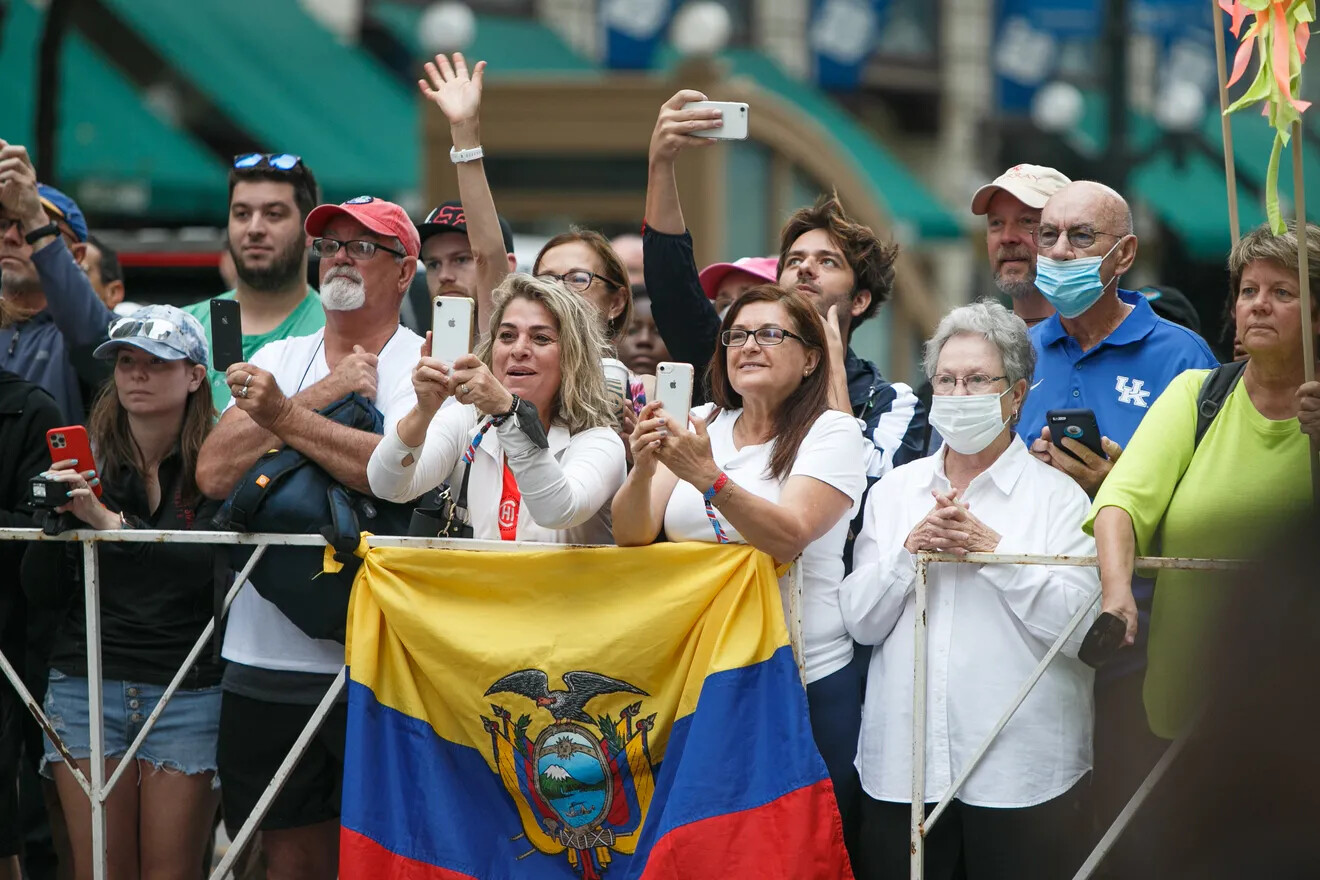
She blasted off at world record pace, running 15:37 for the first 5K and dropping her male pacer, Johnny Rutford, by around mile 8.5. But by mile 10, she'd slowed dramatically. Still—despite running much of the race alone and clocking a 5:53 mile between miles 23 to 24—she’d banked enough of a lead to hang on for the victory, crossing the line in 2:22:31
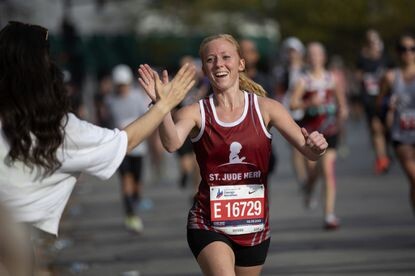
Since the Kenyan sensation made her marathon debut in 2017, she has finished in the top three of every race she has completed and Chicago was no different.
Taking an early lead in the race, Chepngetich beat out American competitors Emma Bates and Sara Hall and crossed the finish line well ahead of the rest of the elite women's field.
Chicago marks just the latest in a series of wins for Chepngetich, who also won in Dubai, Istanbul (twice), and at the 2019 IAAF World Championships. But it also marks a big return after a disappointing performance in the Tokyo Olympics.
While she went into the Olympics as the favorite for gold, she struggled during the race and dropped out around the 30K mark, her first DNF at the marathon distance.
Chepngetich holds a marathon personal best of 2:17:08, making her the fourth fastest woman in history.
“I have never raced in the States and making my debut in such a great race like the Bank of America Chicago Marathon is more than a dream to me,” said Chepngetich. “I will give all myself trying to run as fast as possible. The presence of such a wonderful elite field will boost me.”
Shalane Flanagan finishes 25th in the women's race at the #ChicagoMarathon in 2:46:39. Now she has less than 22 hours to get to the starting line of the #BostonMarathon. Her times so far: Berlin, 9/26, 2:38:32 London, 10/3, 2:35:04 Chicago, 10/10, 2:46:39
Login to leave a comment
Bank of America Chicago
Running the Bank of America Chicago Marathon is the pinnacle of achievement for elite athletes and everyday runners alike. On race day, runners from all 50 states and more than 100 countries will set out to accomplish a personal dream by reaching the finish line in Grant Park. The Bank of America Chicago Marathon is known for its flat and...
more...Seifu Tura Makes a Massive Comeback With 2021 Chicago Marathon Win
After finishing sixth in 2019, Seifu Tura came back in a huge way at the 2021 Bank of America Chicago Marathon, beating out former champion Galen Rupp to claim his first major marathon victory.
Tura, of Ethiopia, set a personal best in Milan, 2:04:29, earlier this year to finish fourth. Now, he can add a Chicago Marathon victory to his list as he stands atop the podium.
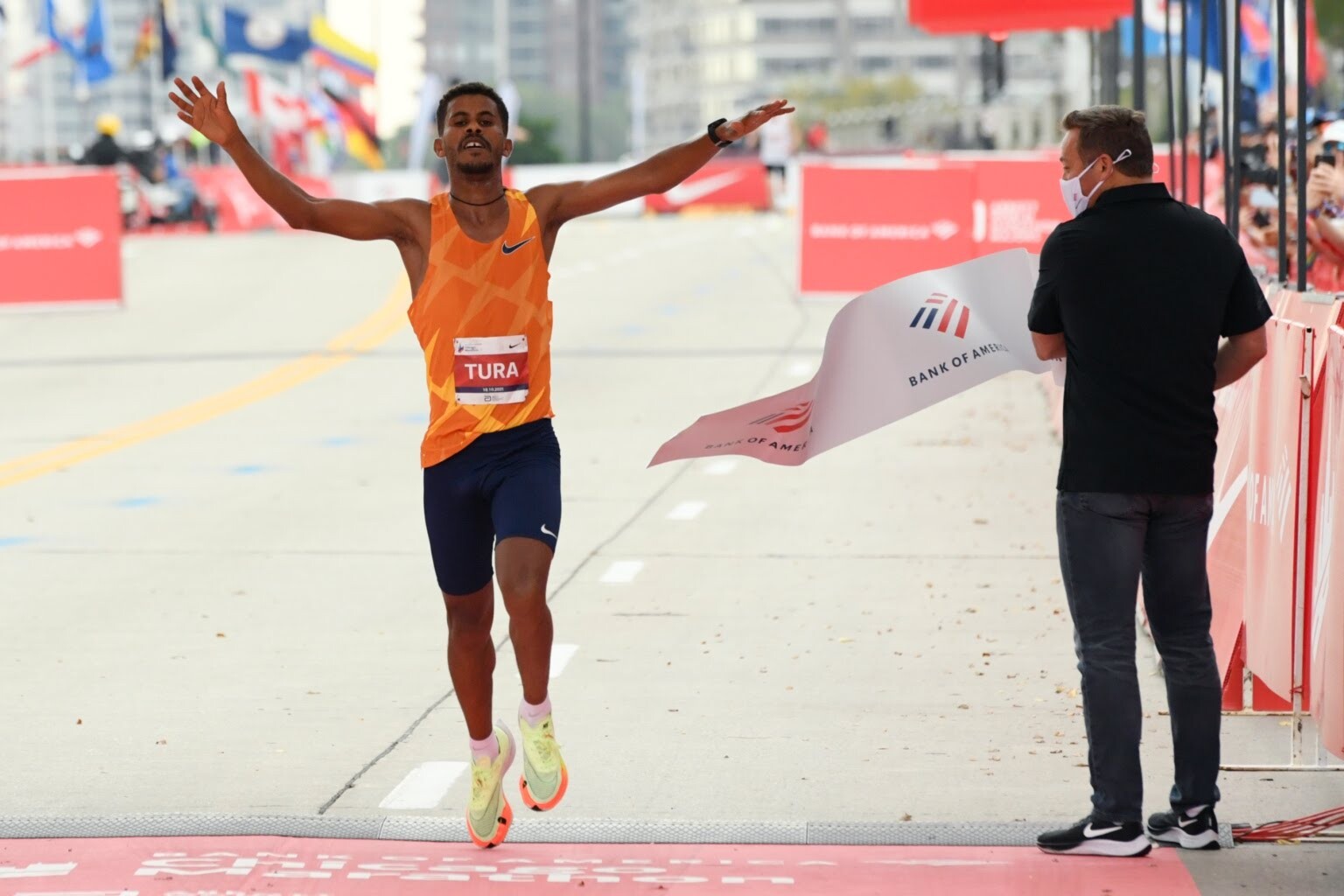
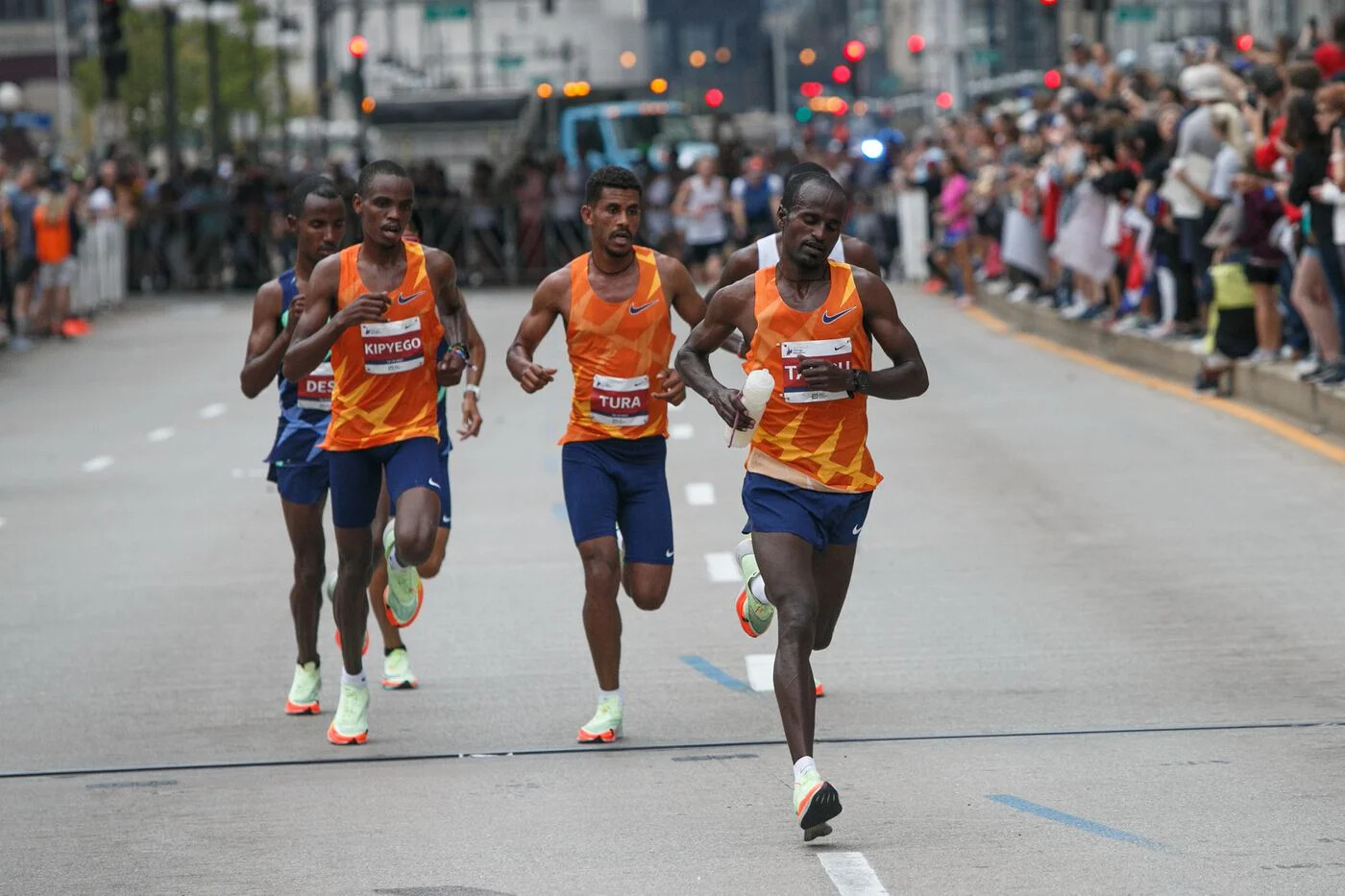
Tura started competing for Ethiopia as a youth competitor on the track, primarily focused on the 3000m and 5000m. He moved to the roads in 2017 and experienced immediate success, landing on the podium in Seoul in second place in his 42K debut (2:09:26). He ran three marathons in 2018, winning in both Milan and Shanghai, and finishing seventh in Dubai.
Chicago marks his first major marathon win. Tura, a 24-year-old from Ethiopia, completed the 26.2-mile course in an official time of 02:06:12, beating out Galen Rupp, who finished closed behind with an official time of 02:06:35.
Chepngetich took the women’s race, finishing in 2:22:31. Emma Bates of the U.S. was second at 2:24:20.
Around 35,000 runners competed in Sunday’s 26.2-mile event. Organizers canceled last year’s race due to health concerns for runners, spectators and volunteers. Registered participants had to provide either proof of a COVID-19 vaccination or negative test results.
Login to leave a comment
Kenya’s Reuben Kipyego and Ruth Chepngetich will target Chicago Marathon crowns
Reuben Kipyego and Ruth Chepngetich head the fields for the Bank of America Chicago Marathon on Sunday (10), with Sara Hall and Galen Rupp leading US hopes at the World Athletics Elite Platinum Label road race.
After action in Berlin and London in recent weeks, Chicago is the next race in a busy period of major marathons and the Boston event follows just one day later. The weather in Chicago looks set to be warm, with temperatures of around 21°C expected for the start of the elite races at 7:30am local time.
The last edition of the Chicago Marathon in 2019 saw a world record fall as Kenya’s Brigid Kosgei clocked 2:14:04 to take 81 seconds from Paula Radcliffe’s 2003 mark. This time her compatriots Chepngetich, who won the 2019 world title, and Vivian Kiplagat are among the athletes in the spotlight.
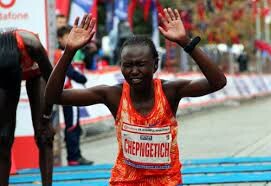
Chepngetich sits fourth on the women’s marathon all-time list thanks to the 2:17:08 PB she set when winning in Dubai in 2019 and she ran a world half marathon record in Istanbul in April with 1:04:02. The 27-year-old was unable to finish the Olympic marathon in Tokyo but is looking forward to her US debut race in Chicago.
“I have never raced in the States and making my debut in such a great race like the Bank of America Chicago Marathon is more than a dream to me,” she said. “I will give all myself trying to run as fast as possible.”
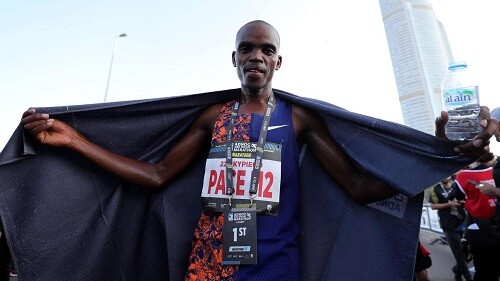
Hall will be among those looking to challenge her. The US athlete beat Chepngetich at last year’s London Marathon, as the pair finished second and third respectively behind Kosgei, and Hall went on to run a PB of 2:20:32 in Arizona a couple of months later. Now she has her eye on Deena Kastor’s 2:19:36 US record, should the conditions allow.
“When I thought about where I wanted to chase the American record, I thought it would be more exciting to do it at home, in the US, and Chicago is such an epic race,” she said.
The other sub-2:25 women in the field are Kiplagat, the USA’s Keira D'Amato and Ethiopia’s Meseret Belete. Kiplagat, who ran her marathon PB of 2:21:11 in 2019, clocked 2:39:18 in Eldoret in June but showed her current form with a personal best performance in the half marathon of 1:06:07 in Copenhagen last month. Like Hall, D'Amato also ran a PB in Arizona in December, clocking 2:22:56, while 22-year-old Belete – who was sixth at the 2018 World Half Marathon Championships and ran a world U20 best of 1:07:51 later that year – has a marathon PB of 2:24:54 set when finishing fourth in Houston last year.
Among those joining them on the start line will be the USA’s Emma Bates, Diane Nukuri and Lindsay Flanagan.
Kipyego ready to turn up the heat
With his PB of 2:03:55 set at the Milan Marathon in May, Kipyego goes into the Chicago race as the second fastest man in 2021. The 25-year-old made his marathon debut in Buenos Aires in 2019, clocking 2:05:18, and later that year he improved to 2:04:40 to win in Abu Dhabi, despite having started the race as a pacemaker. He also seems unfazed by the warmer than expected temperatures, simply replying: ‘No problem’ at the pre-race press conference when asked about the weather.
Ethiopia’s Seifu Tura, meanwhile, explained how he is not as comfortable in the heat but he will go into the race looking to build on the 2:04:29 PB he set when finishing fourth in that same Milan Marathon in May. He also has experience of the Chicago event, having finished sixth in 2019 in 2:08:35.
Rupp leads US hopes as the 2016 Olympic bronze medallist returns to action after his eighth place in the Tokyo Olympic marathon nine weeks ago and third-place finish in the Great North Run half marathon in 1:01:52 last month. Eighth fastest among the entries, his PB of 2:06:07 was set in Prague in 2018 but he will be looking to regain the crown he claimed in 2017.
Kenya’s Dickson Chumba is also a former Chicago winner, having triumphed in 2015, and he set his PB of 2:04:32 in the same city the year before that. The fourth sub-2:05 runner in the field is Kengo Suzuki, who broke the Japanese record with his 2:04:56 to win the Lake Biwa Marathon in February.
Kenya’s Eric Kiptanui is also one to watch. Having helped to pace world record-holder Eliud Kipchoge in the past, the 58:42 half marathon runner made his own marathon debut last year and improved to 2:05:47 to win in Siena in April.
“I was so happy to run 2:06 for my first marathon,” he told NN Running Team. “What it proved to me was, yes, I was in good shape but that I had the mentality to perform over the marathon distance.” Looking ahead to Chicago, he added: “I aim to run 2:03/2:04 but my first priority is to win the race."
Ethiopia’s Chalu Deso and Shifera Tamru have respective bests of 2:04:53 and 2:05:18, while Ian Butler, who is coached by former world record-holder Steve Jones and balances his running with his job as a teacher, is the second-fastest US runner in the field with a PB of 2:09:45 set in Arizona last year.
by Jess Whittington for World Athletics
Login to leave a comment
Bank of America Chicago
Running the Bank of America Chicago Marathon is the pinnacle of achievement for elite athletes and everyday runners alike. On race day, runners from all 50 states and more than 100 countries will set out to accomplish a personal dream by reaching the finish line in Grant Park. The Bank of America Chicago Marathon is known for its flat and...
more...Will Sara Hall take down the American record at Chicago marathon?
The 43rd running of the Bank of America Chicago Marathon is returning to the streets of the Windy City on Sunday, and all eyes will be on Sara Hall, who will be attempting to break Deena Kastor’s 15-year-old American record of 2:19:36, which she set when she won the London Marathon in 2006.
Hall will have an impressive elite field to help her get there, including world half-marathon record-holder Ruth Chepngetich. Newfoundland’s Kate Bazeley will be the only Canadian elite on the start line.
The women’s field
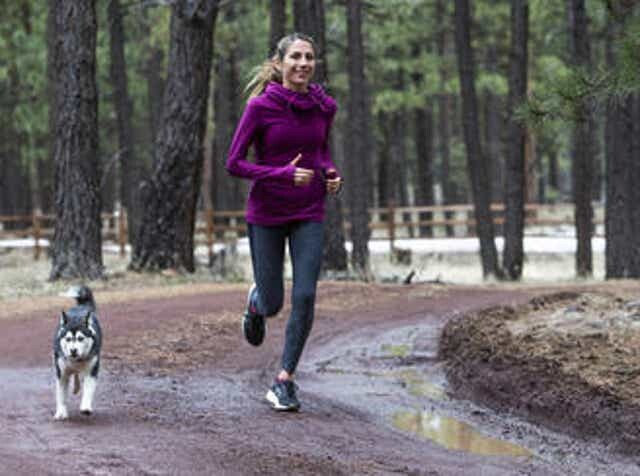
Chepngetich, who is the reigning world champion in the marathon, is the favourite to win on the women’s side, boasting a personal best of 2:17:08, which she ran in Dubai in 2019. Since her marathon debut in 2017, she has finished in the top three in every race she has completed and is the only woman in the field who has run under 2:20 for the marathon. She was one of the favourites to contend for gold at the Tokyo Olympic marathon in August, but struggled under the intense heat and dropped out at 30K, the first DNF of her marathon career. She is the fourth-fastest woman in history, and this will be her first marathon on American soil.
“I have never raced in the States and making my debut in such a great race like the Bank of America Chicago Marathon is more than a dream to me,” she said in an interview with NBC Chicago. “I will give all myself trying to run as fast as possible. The presence of such a wonderful elite field will boost me.”
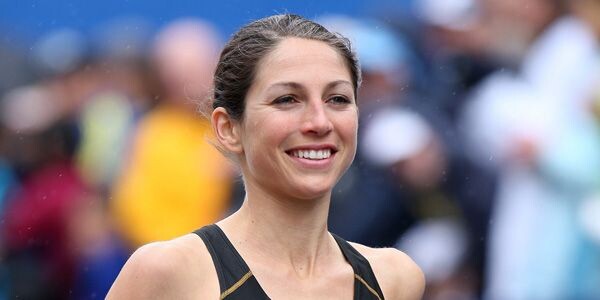
Hall had to drop out of the 2020 U.S. Olympic Marathon Trials, but won the Marathon Project in Arizona in 2:20:32 last December, putting her in second place in the American record books behind Kastor. If she breaks Kastor’s record on Sunday she will be only the second American woman to ever run under 2:20.
Hall will be joined on the start line by several other Americans, including Keira D’Amato, Emma Bates, Lindsay Flanagan and Diane Nukuri, among several others. Canada’s Bazeley has also recently been added to the elite field and will be entering the race with a personal best of 2:36:35, which she ran in 2019.
Live coverage of the event will begin at 8 a.m. ET (7 am local time), with the men’s and women’s wheelchair race setting off at 8:20 and 8:21. The first wave of runners is set to begin at 8:30 a.m. ET (7:30 local time).
Unfortunately, there are no free platforms covering the Chicago Marathon in Canada. Canadians can sign up for a FloTrack membership to watch the action or you can follow the live results here, which will be updated every five kilometers.
The weather is expected to be dry and partly sunny on Sunday, with temperatures starting around 18 C and rising to a high of 26 C later in the day.
by Brittany Hambleton
Login to leave a comment
Bank of America Chicago
Running the Bank of America Chicago Marathon is the pinnacle of achievement for elite athletes and everyday runners alike. On race day, runners from all 50 states and more than 100 countries will set out to accomplish a personal dream by reaching the finish line in Grant Park. The Bank of America Chicago Marathon is known for its flat and...
more...48th Edition of Credit Union Cherry Blossom Ten Mile Run to Feature Strong Men’s and Women’s Fields
It has been a long time coming — too long — and America’s finest distance runners are eager to toe the starting line at the 2021 Credit Union Cherry Blossom Ten Mile (CUCB), to be held in our Nation’s Capital on Sunday, September 12. With $26,000 in U.S. championship prize money on offer as well as a $10,000 bonus for an American Record (the bonus will be split if both the male and female break the American records), road racing fans can look forward to hotly contested races among both the men and women.
“It has been nearly two years since the last time the U.S. Ten Mile Championships for men and women were held,” said event director Phil Stewart. “I know a host of talented Americans are eager to take an important middle-distance test as most of them prepare for fall marathons, of which there are plenty, with all six World Marathon Majors events taking place over a six-week period between September 26 and November 7.”
This will be the third time one or more of the USATF 10 Mile Championships have been hosted by CUCB alongside the traditional international competition: the women’s championships were part of the 2013 Credit Union Cherry Blossom Ten Mile, with Janet Bawcom winning the title in 53:28 while placing fourth overall. A year later in 2014, race organizers hosted both the men’s and women’s championships. Christo Landry (46:41) was the first American to cross the finish line—in sixth place overall—while Bawcom repeated as the U.S. women’s champion by placing second overall in 52:12. Both of Bawcom’s times established American records at the time.
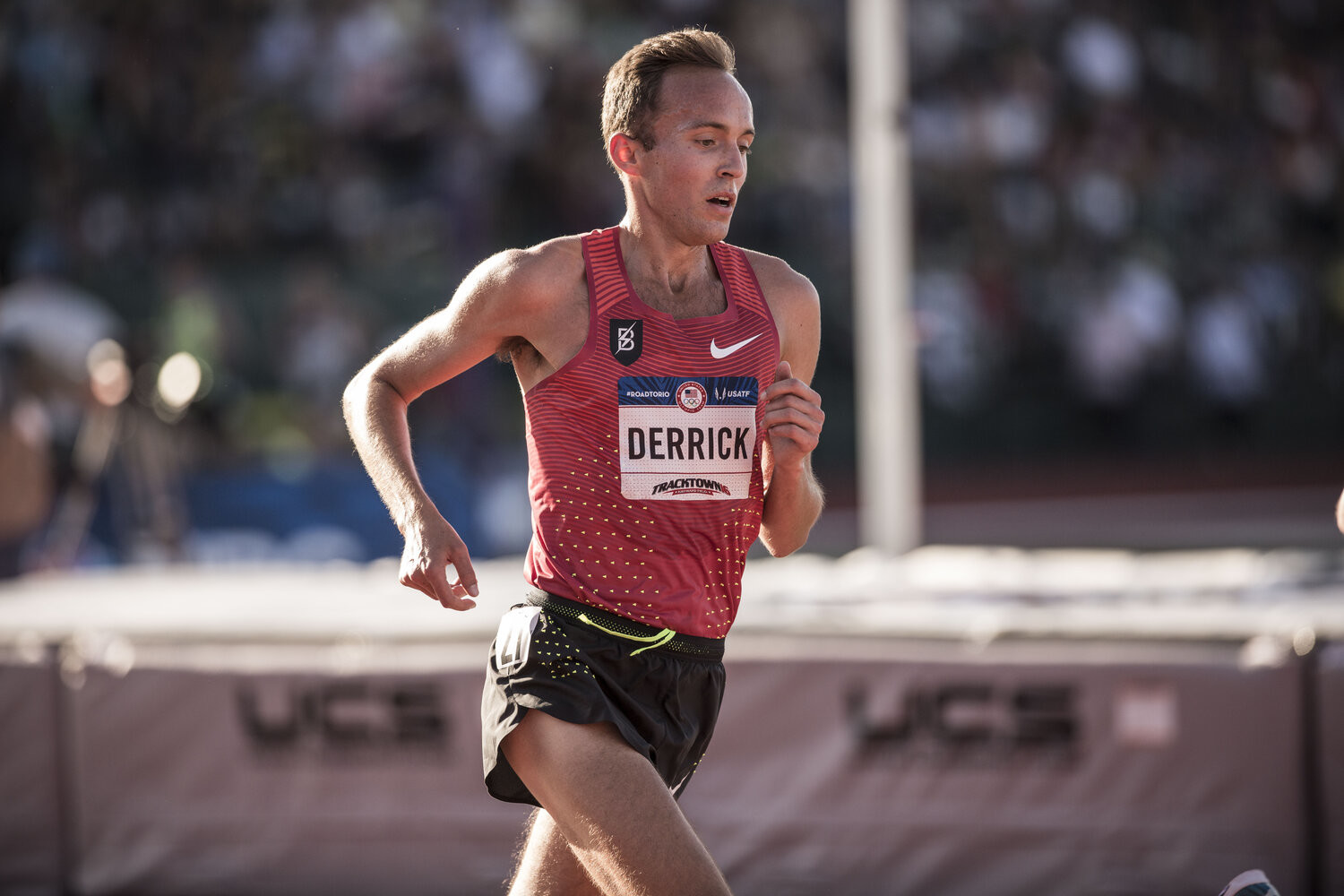
Keira D’Amato broke Bawcom’s American Record last fall at the Up Dawg Ten Mile, running 51:23 in a small invitational race organized by the Cherry Blossom Race Committee specifically for her to chase Bawcom’s record. D’Amato’s effort was recently verified as a women’s only World Record by the Association of Road Racing Statisticians as well. (ARRS is the only organization keeping world records at the 10-mile distance.)
D’Amato will be joined on the starting line by two American women who have broken 53 minutes for 10 miles: Jordan Hasay (52:49) and Emma Bates (52:51). Three other Americans have run 54:00 or faster: Natosha Rogers (53:45), Diane Nukuri (53:56), and Annie Frisbie (54:00).
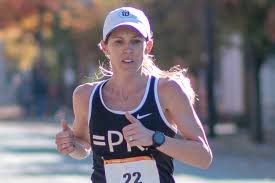
On the men’s side, Futsum Zienasellassie will be defending the USATF 10 Mile Championship he won in Minneapolis in 2019 (the last time American runners competed for this title, thanks to Covid-19). His winning time of 46:55 is one of four sub-47:00 marks among the American men entered in the race. Chris Derrick boasts the fastest personal best (46:53), which he ran at CUCB in 2018 when he was top American and fifth overall. Abbabiya Simbassa ran 46:57 to place second behind Zienasellassie in Minneapolis in 2019, and Kiya Dandena ran 46:58 in 2017 at CUCB. The current pending men’s American record is 45:54 set by Galen Rupp last fall. Rupp’s time bettered Greg Meyer’s time of 46:13 from the 1983 Cherry Blossom Ten Mile.
Here’s a complete listing of elite American athletes who have confirmed their entry into the 2021 Credit Union Cherry Blossom Ten Mile, with personal bests noted in parentheses:
Women:
Keira D’Amato (51:23)
Jordan Hasay (52:49)
Emma Bates (52:51)
Natosha Rogers (53:45)
Diane Nukuri (53:56)
Annie Frisbie (54:00)
Bria Wetsch (54:14)
Susanna Sullivan (54:22)
Bethany Sachtleben (54:42)
Grayson Murphy (54:51)
Carrie Verdon (56:57)
Danielle Shanahan (31:22.9 10K)
Amy Davis (32:13 10K)
Abbie McNulty (33:07 10K)
Stephanie Bruce (1:09:55 half marathon)
Nell Rojas (1:10:45 half marathon)
Men:
Chris Derrick (46:53)
Futsum Zienasellassie (46:55)
Abbabiya Simbassa (46:57)
Kiya Dandena (46:58)
Augustus Maiyo (47:05)
Elkanah Kibet (47:15)
Girma Mecheso (47:22)
Noah Droddy (47:28)
Louis Serafini. (47:35)
Emmanuel Bor (47:39)
Reed Fischer (47:50)
Shadrack Biwott (47:53)
John Raneri (47:53)
Tyler McAndless (47:56)
Dhruvil. Patel (48:37)
Frank Lara (48:37)
Joel Reichow (48:41)
Alex Monroe (48:57)
Willie Milam (49:10)
Robert Brandt (27:39.2 10K)
Brendan Gregg (44:25 15K)
Reid Buchanan (44:40 15K)
Emmanuel Roudolff (1:04:08 half marathon).
by Running USA
Login to leave a comment
Cherry Blossom Ten Mile Run
The Credit Union Cherry Blossom is known as "The Runner's Rite of Spring" in the Nation's Capital. The staging area for the event is on the Washington Monument Grounds, and the course passes in sight of all of the major Washington, DC Memorials. The event serves as a fundraiser for the Children's Miracle Network Hospitals, a consortium of 170 premier...
more...Chicago Marathon organizers have required participants to provide proof of COVID-19 vaccination or a negative test
Chicago Marathon participants required to prove vaccination or negative test.
Organizers confirmed the move as part of updated COVID-19 guidelines published for the annual event.
Around 35,000 people have registered for the 2021 Chicago Marathon, which was cancelled last year due to the COVID-19 pandemic.
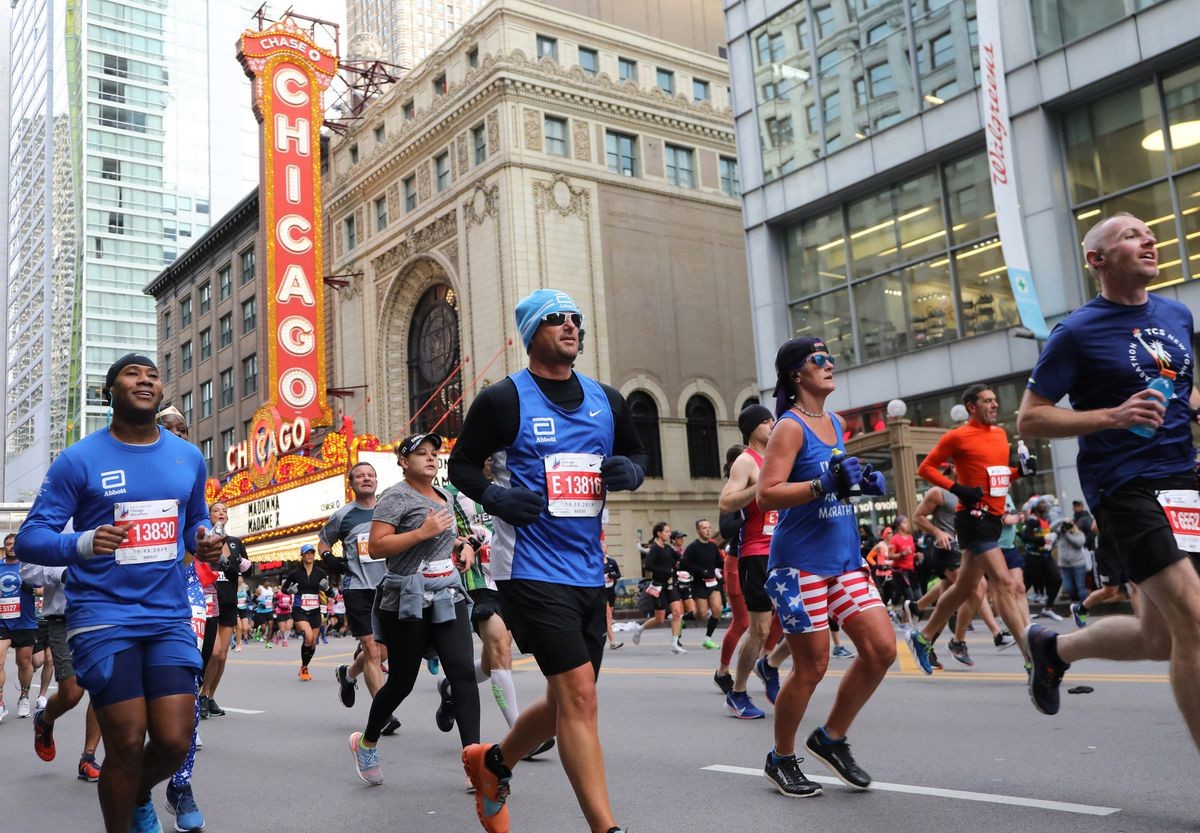
"Registered participants are required to provide proof of a complete COVID-19 vaccination series or a negative COVID-19 test result to participate in the 2021 Bank of America Chicago Marathon," organizers said.
"Registered participants who are not fully vaccinated are required to provide a negative COVID-19 test result for a test administered within 72 hours of attending the Bank of America Chicago Marathon.
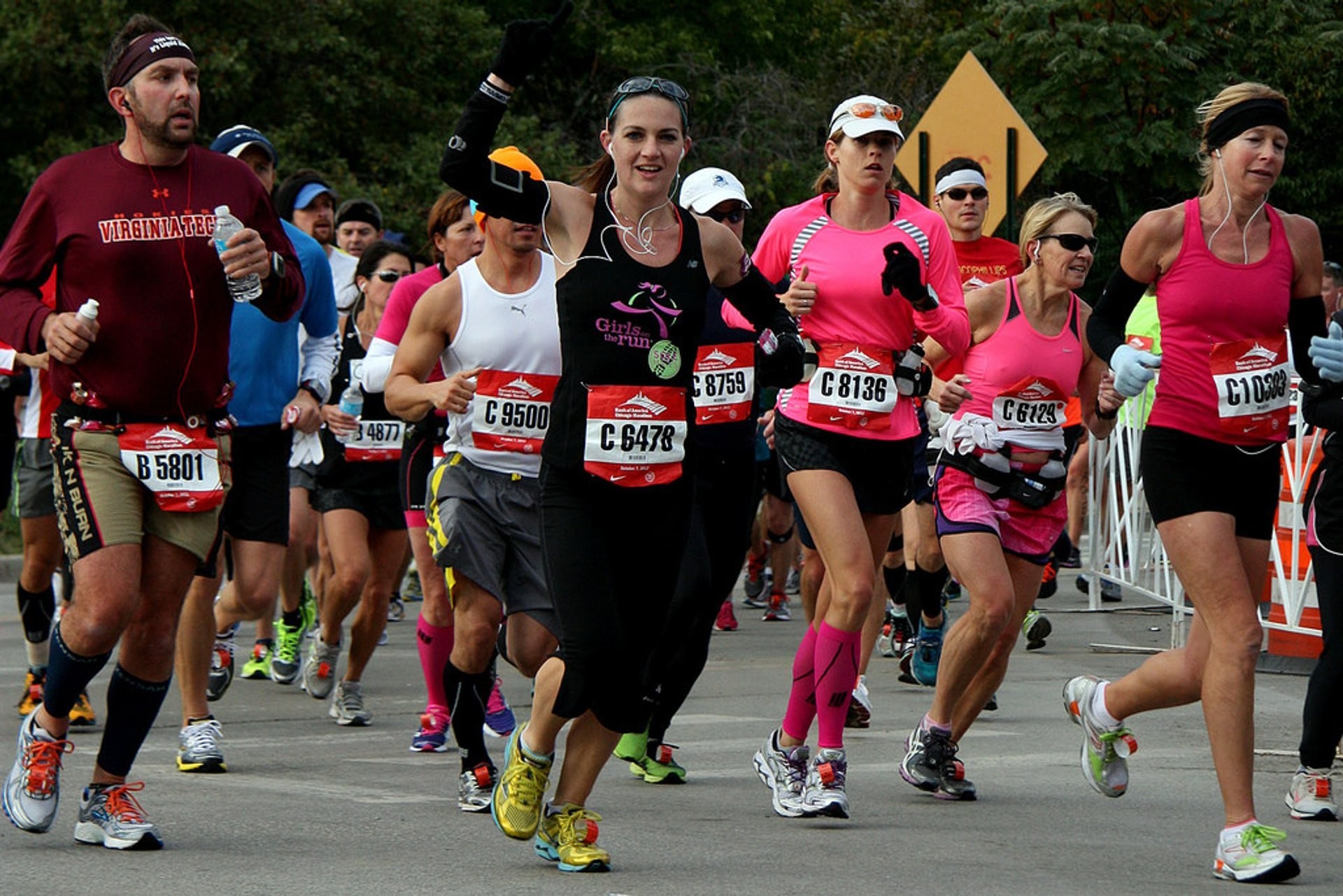
"The event defines 'fully vaccinated' as individuals who are two weeks after their second dose in a two-dose vaccine series or two weeks after a single-dose vaccine.
"Proof of vaccination (hard copy, photocopy or digital version of an immunization record) or a negative COVID-19 test taken within 72 hours of attending the event is required for entrance to the Abbott Health & Fitness Expo.
"Individuals unable to prove full vaccination or negative test will be barred from entering the Health and Fitness Expo and unable to pick up the necessary race materials that allow for participation in the event."
Organizers say RT-PCR, RT-LAMP, lateral flow, and rapid antigen tests are approved.
Attendees will be required to wear face coverings while at indoor event venues, while participants are encouraged to wear face coverings in Grant Park prior to starting the race.
Ethiopia’s Getaneh Molla and Seifu Tura, Kenya’s Ruth Chepngetich, and Americans Keira D’Amato and Emma Bates have become the latest elite athletes to join the start list for this year’s event.
Two-times Olympic medallist Galen Rupp and Sara Hall were announced earlier this year, with the pair expected to lead the United States’ challenge in the men’s and women’s events, respectively.
Molla has the fastest personal best in the men’s field as he clocked 2 hours 3min 34sec to win the 2019 Dubai Marathon.
Chepngetich is the reigning women’s world champion, with the Kenyan poised to make her Chicago Marathon debut.
She set the world record in the half marathon this spring in 1:04:02, while her marathon personal best of 2:17:08 makes her the fourth fastest woman in history.
Daniel Romanchuk and Tatyana McFadden are among the US stars set to feature in the elite wheelchair races, with Switzerland’s Marcel Hug also included on the start list.
by Michael Pavitt
Login to leave a comment
Bank of America Chicago
Running the Bank of America Chicago Marathon is the pinnacle of achievement for elite athletes and everyday runners alike. On race day, runners from all 50 states and more than 100 countries will set out to accomplish a personal dream by reaching the finish line in Grant Park. The Bank of America Chicago Marathon is known for its flat and...
more...Olympians, champions and top americans will lead fields for 2021 Asics Falmouth Road Race
Falmouth Road Race, Inc., organizers of the 49th Annual ASICS Falmouth Road Race, one of America’s premier running events of the summer season, today announced the men’s, women’s, and wheelchair open fields for this year’s race. Defending champions Leonard Korir and Sharon Lokedi lead an accomplished field of Olympians, World Champions and top Americans participating in the August 15, 2021 race.
WOMEN’S OPEN DIVISION
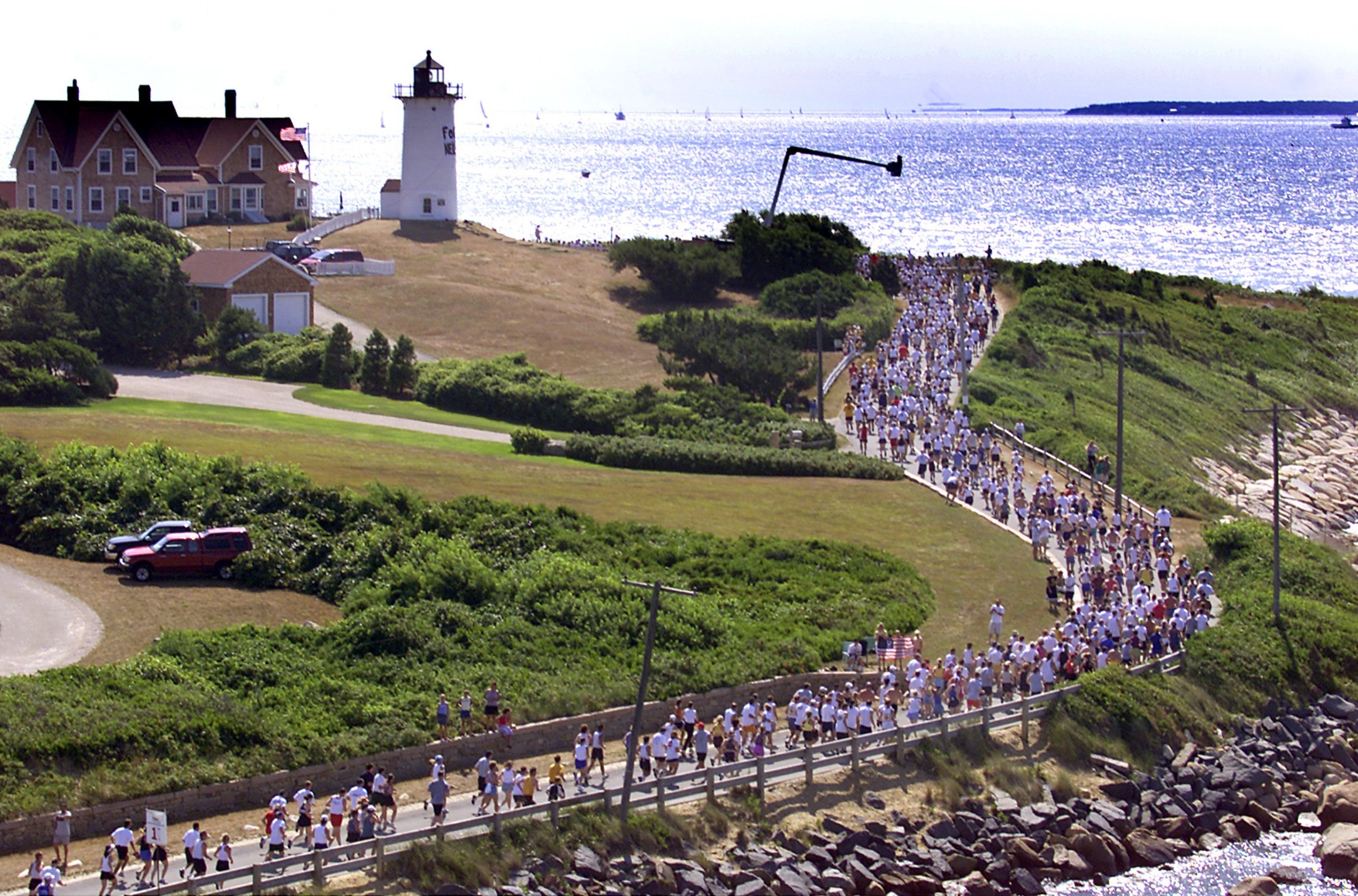
Lokedi, a Kenyan elite and 10-time All American at the University of Kansas, will race 2019 runner-up Sara Hall, who has won 11 U.S. national titles from the mile to the marathon. Hall recently finished sixth at the U.S. Olympic Trials 10,000m and won the AJC Peachtree Road Race, which hosted the National 10K Championships. The duo is joined by Edna Kiplagat, a Boston, London and New York City champion as well as a two-time World Athletics Marathon Championships gold medalist.
Twelve-time All American and NCAA DI 10,000m champion Emma Bates and 2021 Olympic marathoner Molly Seidel will also participate. Bates is gearing up for a fall marathon and Seidel will run, alongside her sister Isabel, as a post-Olympic celebration.
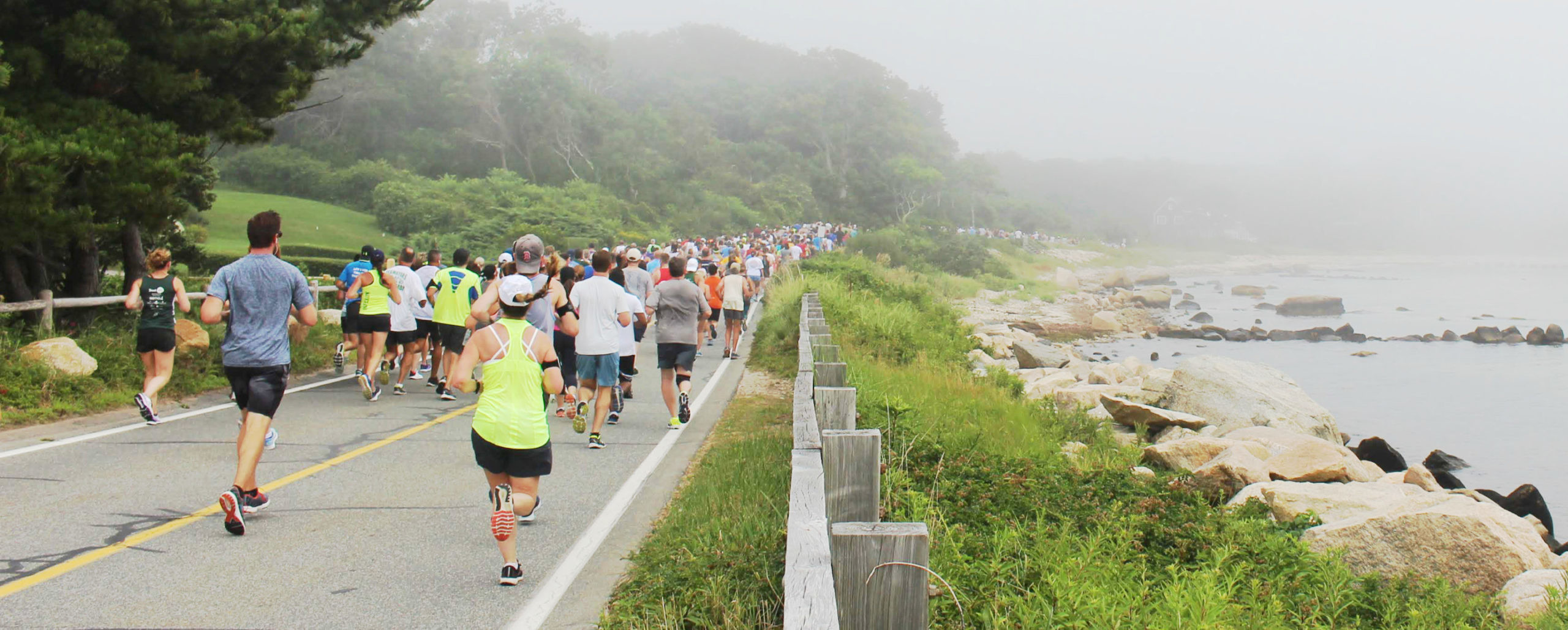
Accomplished women racing the leaders include Jordan Hasay, an 18-time All American and multiple podium finisher at the Boston and Chicago Marathons; former Falmouth champion and three-time Olympian Diane Nukuri; NCAA 10,000m champion Natosha Rogers; young talent Iveen Chepkemoi; Emily Durgin who finished runner-up at the AJC Peachtree Road Race with a 31:49 personal best, and Taylor Werner the recent USATF National 6K champion.
Many of the women in the field raced in the 5,000m and/or 10,000m at the recent U.S. Olympic Track Trials including Rogers, Durgin, Werner, Erika Kemp, Makena Morley, Jaci Smith, Fiona O’Keefe, and Paige Stoner.
MEN’S OPEN DIVISION
The 2019 podium of Leonard Korir, Stephen Sambu, and Edward Cheserek return. Korir, an Olympian, became the first American man to win the Falmouth Road Race since 1988. He has 10 USATF national titles and holds the fastest-ever marathon debut by an American (2:077:56).
Sambu looks to add an impressive fifth Falmouth Road Race title to his name. A road running star, Sambu set the 8K world record at the B.A.A. 10K, a race he has won twice. He is also a four-time champion of the Shamrock Shuffle. Edward Cheserek, the most decorated NCAA distance runner of all time with 17 NCAA Division I titles, ran for the University of Oregon. At Boston University in 2018, Cheserek ran the indoor mile in 3:49.44, which at that time was the second fastest indoor mile in history.
Chasing the trio are 2018 Falmouth Road Race champion and 2018 NCAA 10,000m winner Ben Flanagan, of Canada, and Ben True, who holds five national titles, set a 5K national record at the 2017 B.A.A. 5K and recently finished fourth in the 10,000m at the U.S. Olympic Trials. Fresh from a two second 1-2 finish at the 2021 AJC Peachtree Road Race, Sam Chelanga, a six-time USATF National Champion, and Fred Huxham are in the field, as are B.A.A. 10K champion David Bett, 2018 Falmouth runner-up Scott Fauble and top 5,000m runner Emmanuel Bor.
Many of the men running the ASICS Falmouth Road Race competed at the 2021 U.S. Olympic Track Trials including Korir, Chelanga, Bor, True, Biya Simbassa, Jacob Thomson and Frank Lara.
by Running USA
Login to leave a comment
Falmouth Road Race
The Falmouth Road Race was established in 1973 and has become one of the premier running events of the summer season. Each year the race draws an international field of Olympians, elite runners and recreational runners out to enjoy the scenic 7-mile seaside course. The non-profit Falmouth Road Race organization is dedicated to promoting health and fitness for all in...
more...Molly Seidel, Molly Huddle, Des Linden, Edna Kiplagat and Sara Hall, to Headline Mastercard New York Mini 10K on June 12
The 2021 Mastercard New York Mini 10K, the world’s original women-only road race, will feature the return of professional athletes to NYRR races for the first time since 2019. The all-star lineup on Saturday, June 12 will include U.S. Olympians Molly Seidel, Molly Huddle and Des Linden and past Mini 10K champions Sara Hall, Edna Kiplagat (and Huddle) in the open division, and two-time defending champion Susannah Scaroni and five-time TCS New York City Marathon champion Tatyana McFadden in the wheelchair division.
Seidel was the runner-up at the 2020 U.S. Olympic Marathon Trials, running 2:27:31 in her first-ever marathon to secure a spot on the U.S. Olympic team. She finished in sixth place at the 2020 Virgin Money London Marathon and is also a four-time NCAA champion. This will mark her third race appearance in New York; she won the 2017 NYRR Midnight Run and finished as runner-up at the 2017 USATF 5 km Championships.
“Although it’s my first time running the Mini, I’m well-aware of the race’s significance as the first-ever road race just for women,” Seidel said. “I’m excited that this is another step forward in returning to mass-participation and elite running, especially in a place as important to road racing as New York City. Personally, this race is a great opportunity to come down from the mountains of Flagstaff, Arizona, and test my legs as I prepare for the Olympic Games marathon in August.”
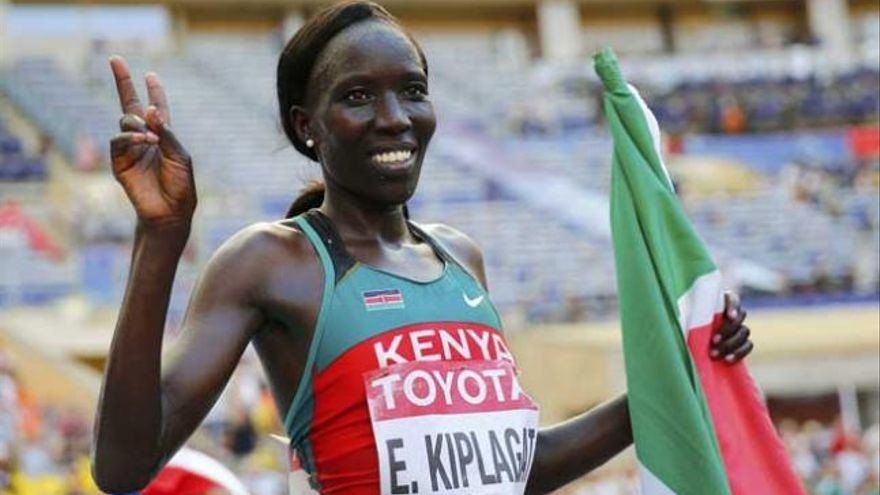
Linden won the Boston Marathon in 2018 and is a two-time U.S. Olympian in the distance, and she just missed out on a third Olympic Games appearance after placing fourth at the U.S. Olympic Marathon Trials last year. To kick off 2021, she ran a 2:59:54 in the 50K, a new world best for the distance.
Huddle is a two-time Olympian, having run the 5,000 meters at the London 2012 Games and setting the 10,000-meter American record at the Rio 2016 Games. In New York, she won the 2014 Mini 10K and is a three-time champion of the United Airlines NYC Half. She made her marathon debut at the 2016 TCS New York City Marathon, taking third place as the top American.
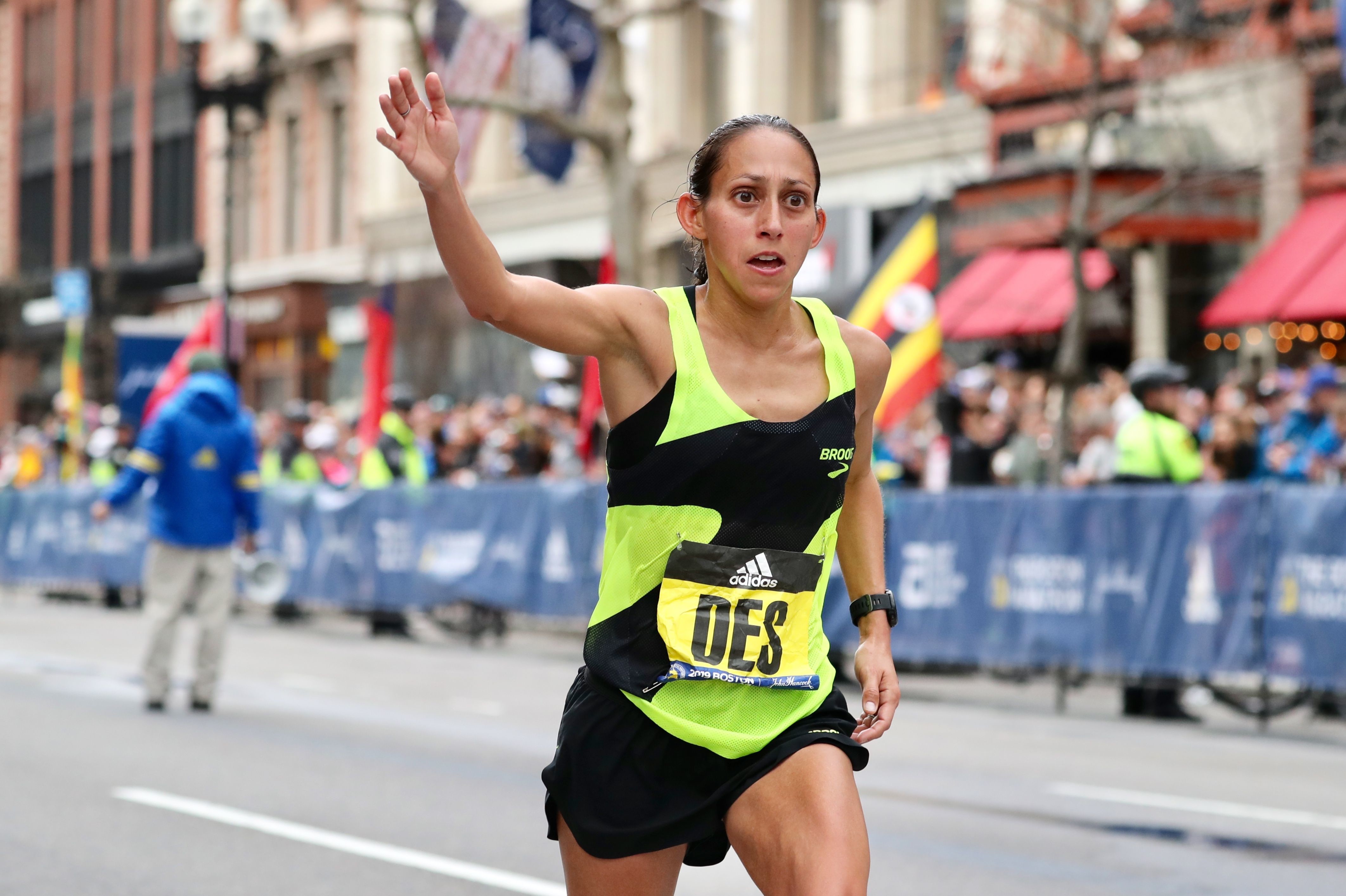
Hall, whose participation was announced last month, won the event in 2019 in 32:27 in a race that doubled as the USATF 10 km Championships. She has eight national titles to her name and was runner-up (2:22:01) at the 2020 Virgin Money London Marathon last October and then in December clocked the second-fastest marathon ever by an American woman (2:20:32) at The Marathon Project in Chandler, Ariz.
Kiplagat has a storied history in New York, having won her New York City Marathon debut in 2010 and followed that with a second-place finish in the 2011 NYC Half and a victory in the 2012 Mini 10K. Outside of New York, she has won the World Championships Marathon in 2011 and 2013, the London Marathon in 2012, and the Boston Marathon in 2017.
“I am excited to return to the Mini 10K for the fifth time,” Kiplagat said. “It is a special feeling to stand on that starting line and feel the support of not only the women running with you, but all of the women who came before you. It is a very special race and I’m happy to be going back to New York City.”
In Central Park, they will be challenged by a number of athletes competing in the U.S. Olympic Track and Field Trials later in June, including Laura Thweatt, Emma Bates, Lindsay Flanagan, Maggie Montoya and Emily Durgin.
The event will also feature a professional wheelchair division for the third time, making it the only all-women professional wheelchair race in the world. U.S. Paralympian Scaroni is the two-time defending champion in the wheelchair division, having raced world-best 10K times in both of her victories, including a 22:22 in 2019. She followed that performance by setting an American best in the marathon of 1:30:42 to win the 2019 Grandma’s Marathon, and then took third place at the TCS New York City Marathon that fall. Scaroni will once again line up against five-time New York City Marathon champion and 17-time Paralympic medalist McFadden, who is in search of her first Mini 10K title.
“The Mini 10K always means so much to me because the feeling of being on that line surrounded by so many women reminds me of how big of a celebration road racing is for the human spirit,” Scaroni said. “This year raises even more emotions – the opportunity to again unite with one another highlights the beauty of road racing and its ability to continuously bring us together through adversity.”
To mitigate the risk of spread of COVID-19, the professional athletes taking part will be in a controlled environment. The field will be required to provide proof of a full vaccination series or negative COVID-19 test before traveling to New York and will undergo daily COVID-19 testing and tracing while in New York for the race. There will be a separation of the pro field and general field at the start, no guests will be allowed to accompany the athletes, and they will be required to wear masks at the start and finish areas. Additionally, there will be an elimination of touchpoints, including no large gatherings or in-person meetings until race morning.
Login to leave a comment
New York Mini 10K
Join us for the NYRR New York Mini 10K, a race just for women. This race was made for you! It’s the world’s original women-only road race, founded in 1972 and named for the miniskirt, and it empowers women of all ages and fitness levels to be active and to look and feel great on the run. Every woman who...
more...

